Ravnica Remastered Release Notes
Compiled by Eric Levine
Document last modified November 20, 2023
PDF Download Links:
English | 中国话,汉语;中文 | Français | Deutsch
Italiano | Português | Español | 日本語
The Release Notes include information concerning the release of a new Magic: The Gathering set, as well as a collection of clarifications and rulings involving that set's cards. It's intended to make playing with the new cards more fun by clearing up the common misconceptions and confusion inevitably caused by new mechanics and interactions. As future sets are released, updates to the Magic rules may cause some of this information to become outdated. Go to Magic.Wizards.com/Rules to find the most up-to-date rules.
The "General Notes" section includes information about card legality and explains some of the mechanics and concepts in the set.
The "Card-Specific Notes" sections contain answers to the most important, most common, and most confusing questions players might ask about cards in the set. Items in the "Card-Specific Notes" sections include full card text for your reference. Not all cards in the set are listed.
GENERAL NOTES
Card Legality
Ravnica Remastered cards are legal for Constructed play in any format that already allows them. Notably, many of these cards are not legal in the Standard or Pioneer formats.
Go to Magic.Wizards.com/Formats for a complete list of formats and their permitted card sets and banned lists.
Go to Magic.Wizards.com/Commander for more information on the Commander variant.
Go to Locator.Wizards.com to find an event or store near you.
Returning Mechanics
Over two dozen keyword abilities, keyword actions, ability words, and unnamed mechanics return in Ravnica Remastered. Some cards with these mechanics have individual notes in the "Card-Specific Notes" section as appropriate. The rules for these mechanics are unchanged in this release.
In this section, you will find notes for some of the mechanics with the most appearances and greatest complexity.
Returning Mechanic: Split Cards
Sometimes one card face per card just isn't enough, and that's where split cards come in. Additional options won't fix everything, but they often help!
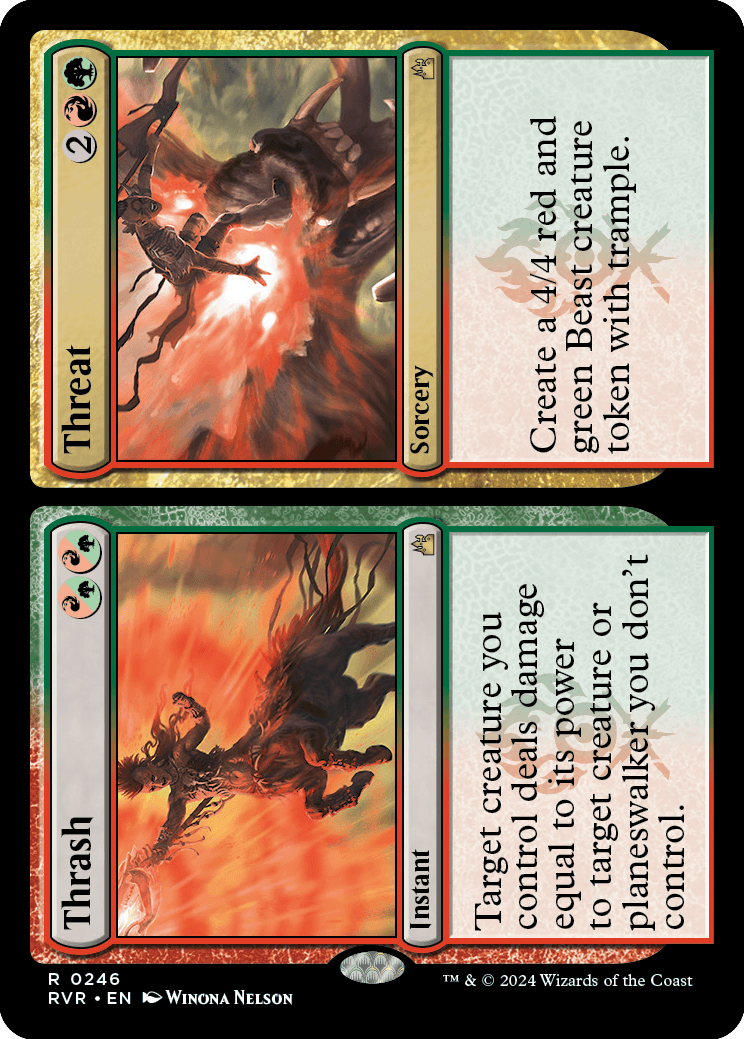
Thrash
{R/G}{R/G}
Instant
Target creature you control deals damage equal to its power to target creature or planeswalker you don't control.
///
Threat
{2}{R}{G}
Sorcery
Create a 4/4 red and green Beast creature token with trample.
- To cast a split card, choose one of its halves to cast. There's no way to cast both halves of any of the split cards featured in this set.
- Split cards have two card faces on a single card. The characteristics of the half you didn't cast are ignored while the spell is on the stack.
- Each split card is a single card. For example, if you discard a split card, you've discarded one card, not two. If an effect counts the number of instant and sorcery cards in your graveyard, Thrash // Threat counts once, not twice.
- Each split card has two names. If an effect instructs you to choose a card name, you may choose one of those names, but not both.
- A split card's characteristics are a combination of its two halves while it is not on the stack. For example, Thrash // Threat has a mana value of 6 while it is in your library. If an effect allows you to search your library for a card with mana value 4 or less, you can't find Thrash // Threat.
- If an effect allows you to cast a spell with certain characteristics, consider only the characteristics of the half you're casting. For example, if an effect allows you to cast an instant or sorcery spell with mana value 2 or less from among cards in your graveyard, you could cast Thrash this way, but not Threat.
Returning Mechanic: Shock Lands
All ten shock lands, originally from Ravnica block, return in Ravnica Remastered.
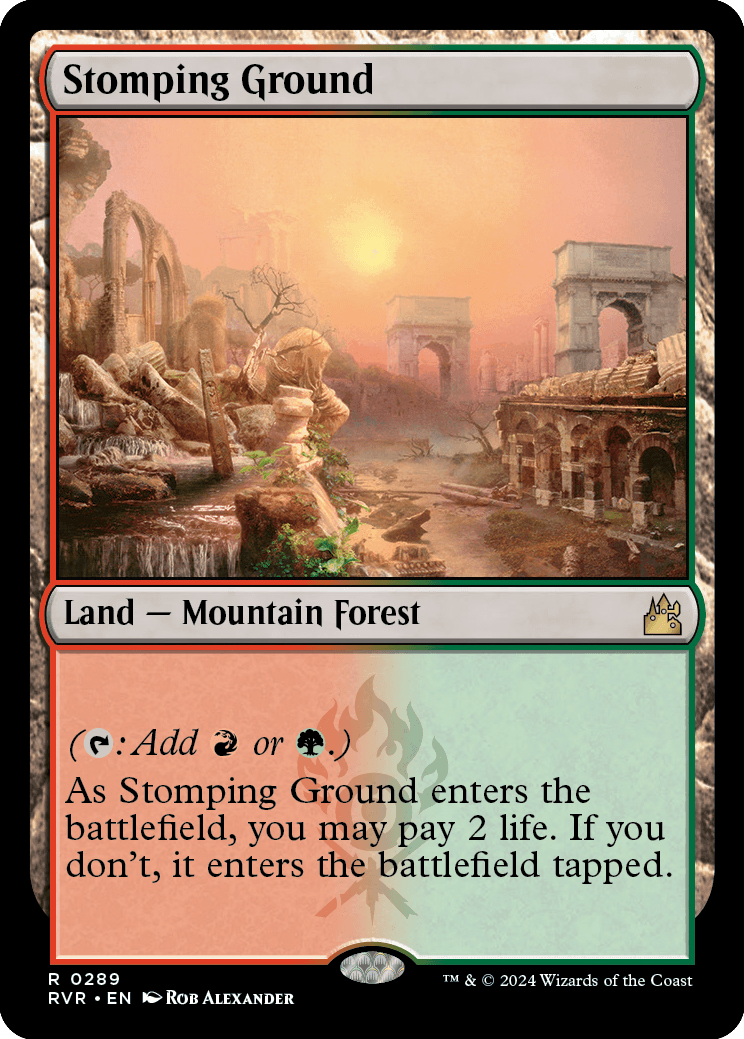
Stomping Ground
Land — Mountain Forest
({T}: Add {R} or {G}.)
As Stomping Ground enters the battlefield, you may pay 2 life. If you don't, it enters the battlefield tapped.
- Unlike most dual lands, this land has two basic land types. It's not basic, so cards such as Open the Gates can't find it, but it does have the appropriate land types for effects such as that of Drowned Catacomb (from the Ixalan set).
- If an effect puts this land onto the battlefield tapped, you may pay 2 life, but it still enters tapped.
Returning Mechanic: Gates
The ten Guildgates, a cycle that debuted in Return to Ravnica block, also return in Ravnica Remastered.
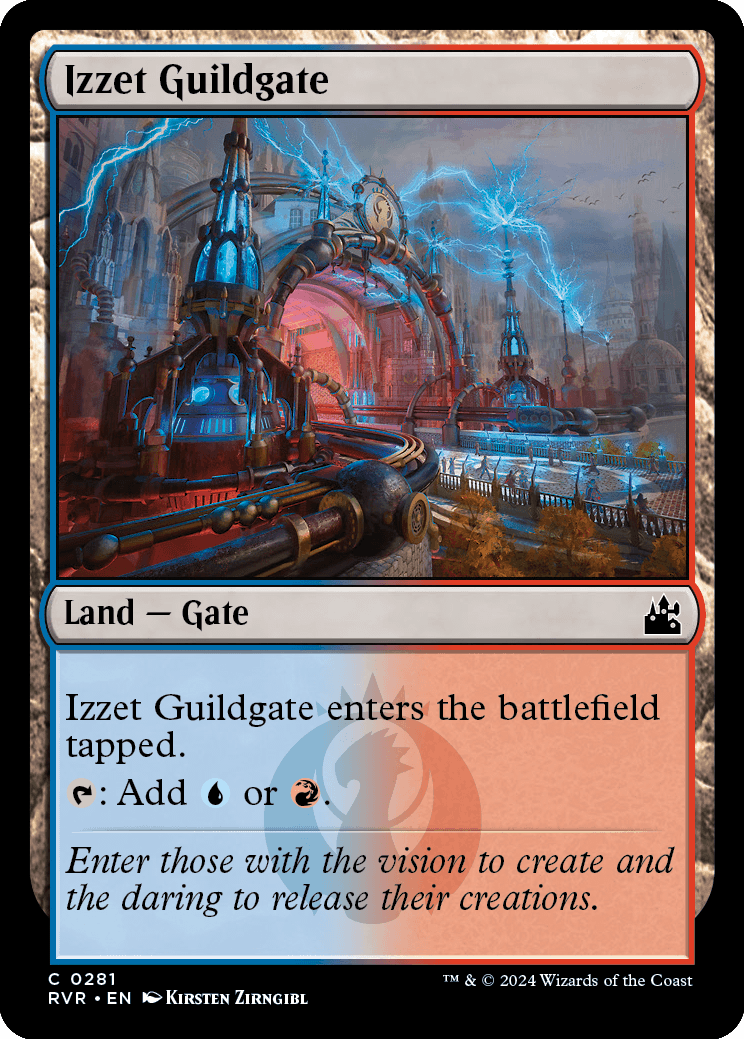
Izzet Guildgate
Land — Gate
Izzet Guildgate enters the battlefield tapped.
{T}: Add {U} or {R}.
- The subtype Gate has no special rules significance, but other spells and abilities may refer to it.
- Gate is not a basic land type.
Returning Mechanic: Convoke
The Selesnya Conclave knows that together, lots of creatures can achieve great things, and not just during combat! Spells with convoke let you tap untapped creatures you control to help pay for them. Each creature you tap pays for one mana of that creature's color or one generic mana.
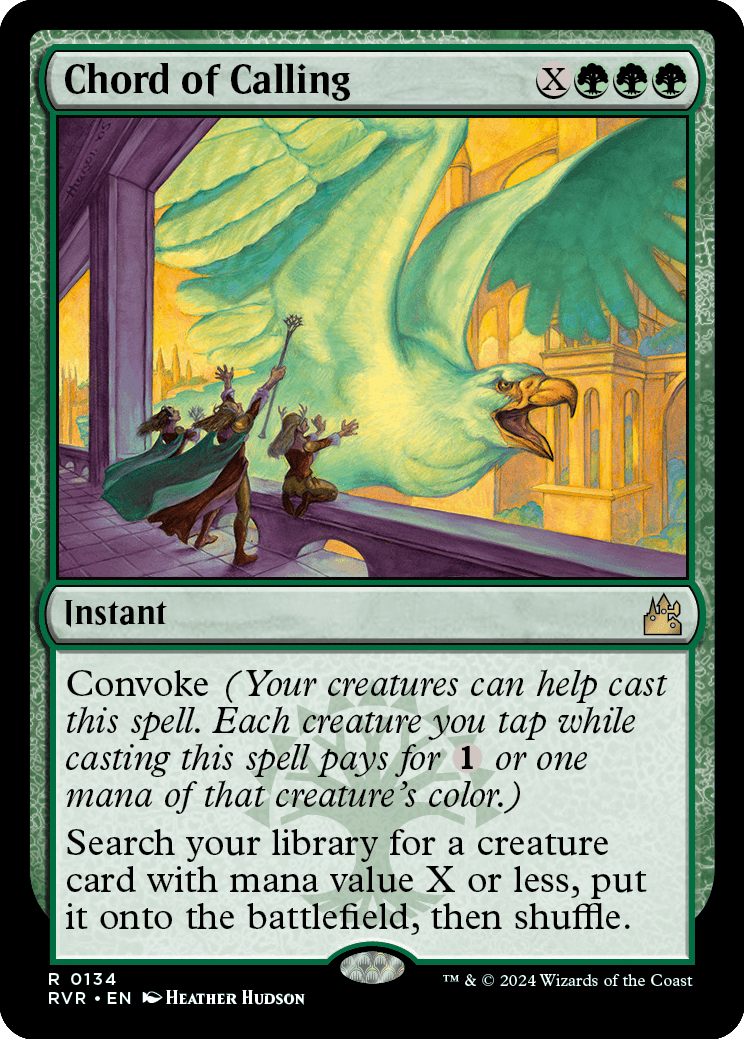
Chord of Calling
{X}{G}{G}{G}
Instant
Convoke (Your creatures can help cast this spell. Each creature you tap while casting this spell pays for {1} or one mana of that creature's color.)
Search your library for a creature card with mana value X or less, put it onto the battlefield, then shuffle.
- You can tap any untapped creature you control to convoke a spell, even one you haven't controlled continuously since the beginning of your most recent turn.
- Tapping an untapped creature that's attacking or blocking to convoke a spell won't cause that creature to stop attacking or blocking.
- When calculating a spell's total cost, include any alternative costs, additional costs, or anything else that increases or reduces the cost to cast the spell. Convoke applies after the total cost is calculated. Convoke doesn't change a spell's mana cost or mana value.
- If a creature you control has a mana ability with {T} in the cost, activating that ability while casting a spell with convoke will result in the creature being tapped before you pay the spell's costs. You won't be able to tap it again for convoke. Similarly, if you sacrifice a creature to activate a mana ability while casting a spell with convoke, that creature won't be on the battlefield when you pay the spell's costs, so you won't be able to tap it for convoke.
Returning Mechanic: Dredge
You can put cards in the graveyard, but that doesn't mean they'll stay in the graveyard. Not with the Golgari Swarm around, anyway. By milling just a few cards, you can return a card with dredge from your graveyard to your hand instead of drawing a card.
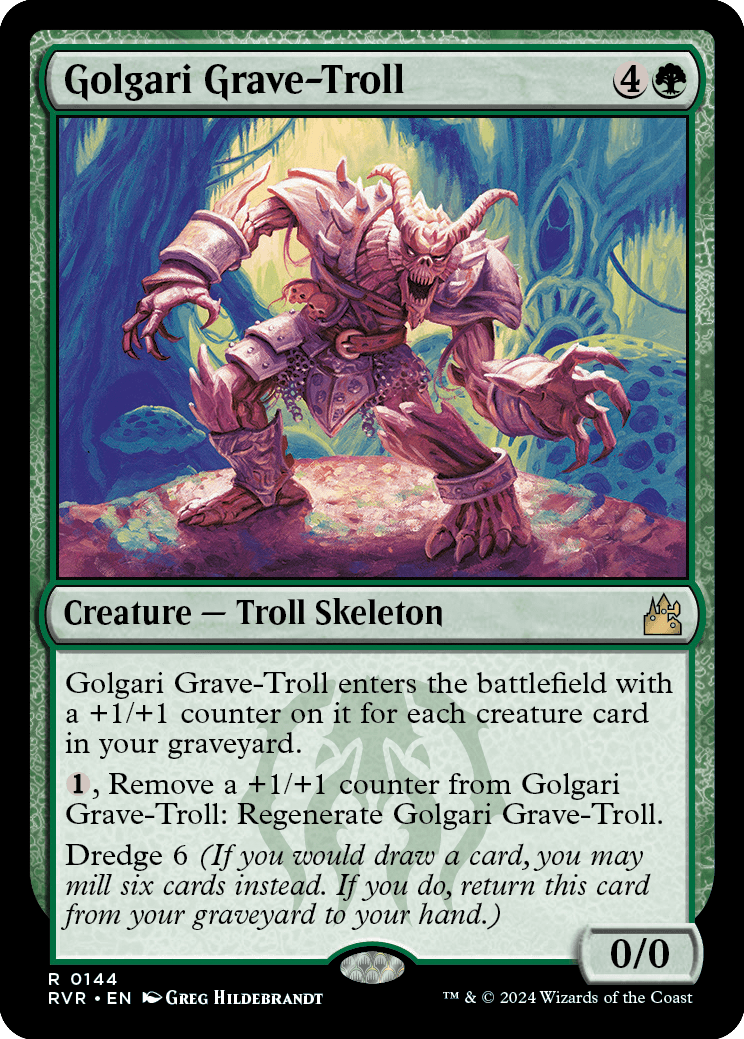
Golgari Grave-Troll
{4}{G}
Creature — Troll Skeleton
0/0
Golgari Grave-Troll enters the battlefield with a +1/+1 counter on it for each creature card in your graveyard.
{1}, Remove a +1/+1 counter from Golgari Grave-Troll: Regenerate Golgari Grave-Troll.
Dredge 6 (If you would draw a card, you may mill six cards instead. If you do, return this card from your graveyard to your hand.)
- Dredge lets you replace any card draw, not only the one during your draw step.
- If an effect puts a card into your hand without specifically using the word "draw," you're not drawing a card. Dredge can't replace this event.
- One card draw can't be replaced by multiple dredge abilities.
- You can't attempt to use a dredge ability if you don't have enough cards in your library.
- Once you've announced that you're applying a card's dredge ability to replace a draw, players can't take any actions until you've put that card into your hand and milled cards.
- If you're drawing multiple cards, each draw is performed one at a time. For example, if you're instructed to draw two cards and you replace the first draw with a dredge ability, another card with a dredge ability (including one that was milled by the first dredge ability) may be used to replace the second draw.
Returning Mechanic: Mentor
How can the lowly creatures among you aspire to greatness? With a little mentorship from the Boros Legion, of course! And they say you can't teach that. When a creature with mentor attacks, you put a +1/+1 counter on an attacking creature with lesser power.
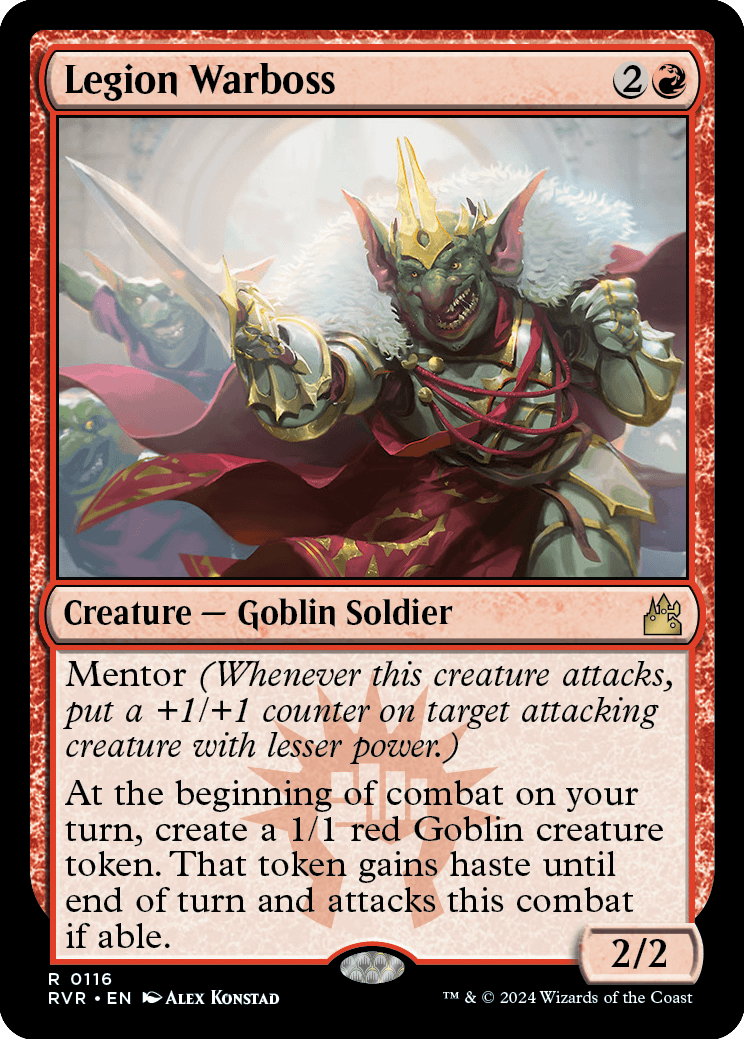
Legion Warboss
{2}{R}
Creature — Goblin Soldier
2/2
Mentor (Whenever this creature attacks, put a +1/+1 counter on target attacking creature with lesser power.)
At the beginning of combat on your turn, create a 1/1 red Goblin creature token. That token gains haste until end of turn and attacks this combat if able.
- Mentor compares the power of the creature with mentor with that of the target creature at two different times: once as the triggered ability is put onto the stack, and once as the triggered ability resolves. If you wish to raise a creature's power so its mentor ability can target a bigger creature, the last chance you have to do so is during the beginning of combat step.
- If the target creature's power is no longer less than the attacking creature's power as the ability resolves, mentor doesn't add a +1/+1 counter. For example, if two 3/3 creatures with mentor attack and both mentor triggers target the same 2/2 creature, the first to resolve puts a +1/+1 counter on it and the second does nothing.
- If the creature with mentor leaves the battlefield with mentor on the stack, use its power as that creature last existed on the battlefield to determine whether the target creature has less power.
Returning Mechanic: Extort
The Orzhov Syndicate likes having everyone else owe them one. In the case of the extort mechanic, that means 1 life, which you'll drain from your opponents by paying {W/B} whenever you cast a spell.
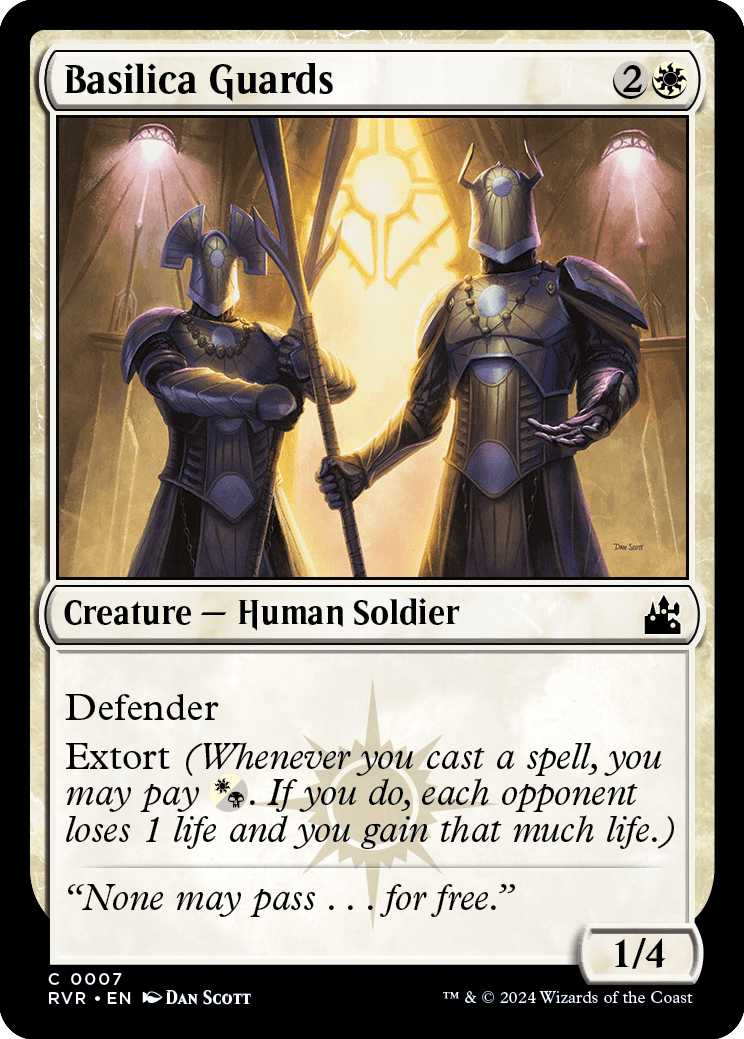
Basilica Guards
{2}{W}
Creature — Human Soldier
1/4
Defender
Extort (Whenever you cast a spell, you may pay {W/B}. If you do, each opponent loses 1 life and you gain that much life.)
- You may pay {(W/B)} a maximum of one time for each extort triggered ability. You decide whether to pay when the ability resolves.
- The amount of life you gain from extort is based on the total amount of life lost, not necessarily the number of opponents you have. For example, if your opponent's life total can't change (perhaps because that player controls Platinum Emperion), you won't gain any life.
- The extort ability doesn't target any player.
- The extort ability resolves before the spell that caused it to trigger. The ability resolves even if that spell is countered.
Returning Mechanic: Spectacle
The Cult of Rakdos loves a good show, and those shows usually involve serious injuries. If an opponent lost life this turn, you can cast spells for their spectacle costs and get discounts or extra effects!
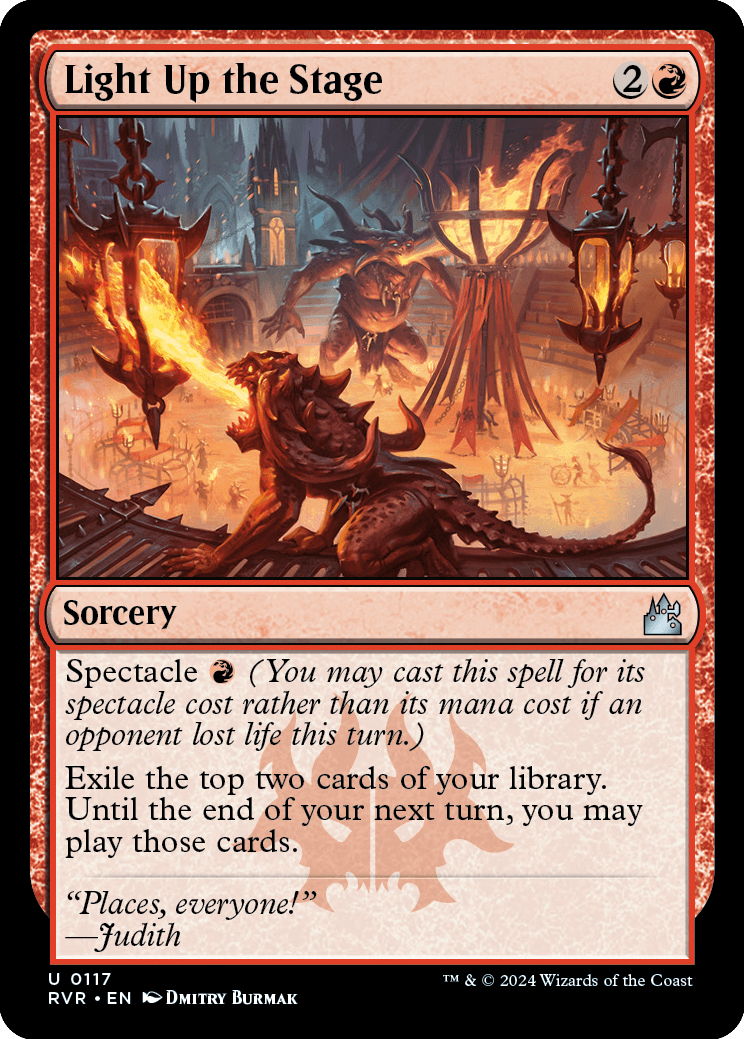
Light Up the Stage
{2}{R}
Sorcery
Spectacle {R} (You may cast this spell for its spectacle cost rather than its mana cost if an opponent lost life this turn.)
Exile the top two cards of your library. Until the end of your next turn, you may play those cards.
- Damage dealt to a player causes that player to lose that much life.
- Spectacle cares only that an opponent lost life during the turn, not that the opponent's life total is currently lower than it was. For example, if an opponent loses 1 life and then gains 2 life in the same turn, you can cast a spell for its spectacle cost that turn.
- Spectacle doesn't change when you can cast the spell. For example, you can't cast a sorcery with spectacle during an opponent's turn unless another effect allows you to do so, even if that player has lost life this turn.
- To determine the total cost of a spell, start with the mana cost or alternative cost you're paying (such as a spectacle cost), add any cost increases, then apply any cost reductions. The mana value of the spell remains unchanged, no matter what the total cost to cast it was.
- A card's spectacle cost is the same no matter how much life your opponents lost or how many opponents lost life.
- In a multiplayer game, if an opponent loses life and later that turn leaves the game, you can cast a spell for its spectacle cost. (If a player leaves the game during their turn, that turn continues without an active player.)
Returning Mechanic: Evolve
Preserving nature is very important to the Simic Combine, but change is an important part of nature's processes. Creatures with evolve embody that by growing whenever a creature with greater power or toughness enters the battlefield under your control.
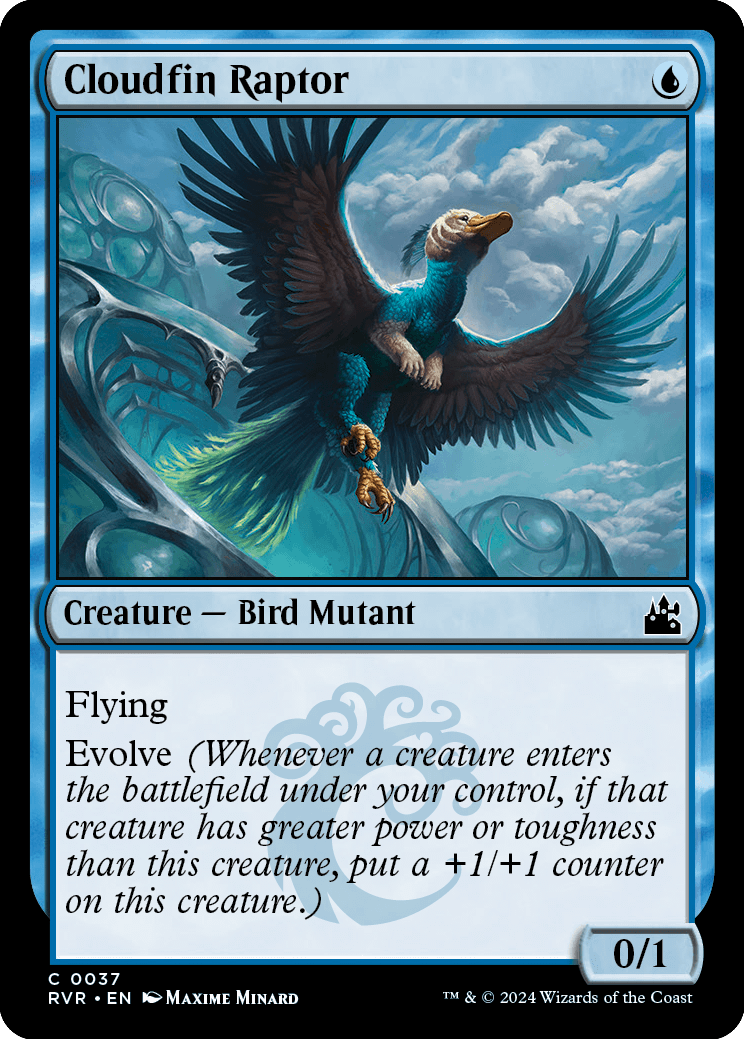
Cloudfin Raptor
{U}
Creature — Bird Mutant
0/1
Flying
Evolve (Whenever a creature enters the battlefield under your control, if that creature has greater power or toughness than this creature, put a +1/+1 counter on this creature.)
- When comparing the stats of the two creatures for evolve, you always compare power to power and toughness to toughness.
- Whenever a creature enters the battlefield under your control, check its power and toughness against the power and toughness of the creature with evolve. If neither stat of the new creature is greater, evolve won't trigger at all.
- If evolve triggers, the stat comparison will happen again when the ability tries to resolve. If neither stat of the new creature is greater, the ability will do nothing. If the creature that entered the battlefield leaves the battlefield before evolve tries to resolve, use its last known power and toughness to compare the stats.
- If a creature enters the battlefield with +1/+1 counters on it, consider those counters when determining if evolve will trigger. For example, a 1/1 creature that enters the battlefield with two +1/+1 counters on it will cause the evolve ability of a 2/2 creature to trigger.
- If multiple creatures enter the battlefield at the same time, evolve may trigger multiple times, although the stat comparison will take place each time one of those abilities tries to resolve. For example, if you control a 2/2 creature with evolve and two 3/3 creatures enter the battlefield, evolve will trigger twice. The first ability will resolve and put a +1/+1 counter on the creature with evolve. When the second ability tries to resolve, neither the power nor the toughness of the new creature is greater than that of the creature with evolve, so that ability does nothing.
- When comparing the stats as the evolve ability resolves, it's possible that the stat that's greater changes from power to toughness or vice versa. If this happens, the ability will still resolve and you'll put a +1/+1 counter on the creature with evolve. For example, if you control a 2/2 creature with evolve and a 1/3 creature enters the battlefield under your control, it toughness is greater so evolve will trigger. In response, the 1/3 creature gets +2/-2. When the evolve trigger tries to resolve, its power is greater. You'll put a +1/+1 counter on the creature with evolve.
Returning Mechanic: Populate
The Selesnya Conclave is always looking for new members. The populate mechanic brings in those recruits by making a copy of a creature token you control.
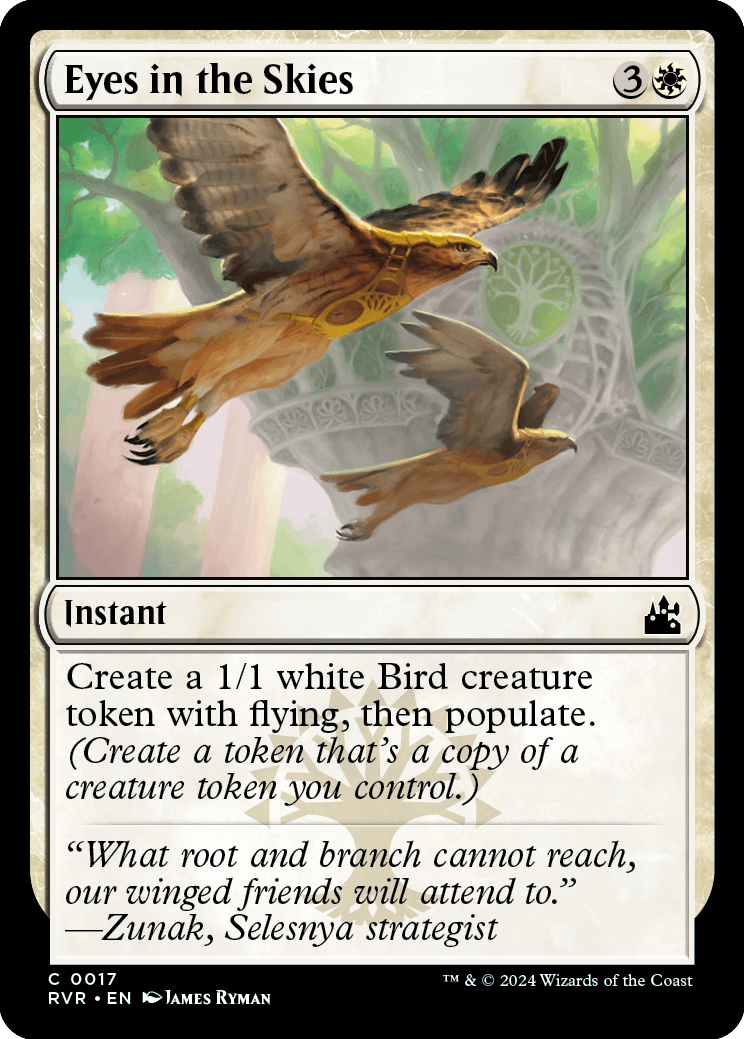
Eyes in the Skies
{3}{W}
Instant
Create a 1/1 white Bird creature token with flying, then populate. (Create a token that's a copy of a creature token you control.)
- Populate doesn't target the creature token you're copying. You choose that creature token as you're taking the populate action. You can choose any creature token you control. If a spell or ability causes you to create a creature token and then instructs you to populate (as Eyes in the Skies does), you may choose to copy the token you just created, or you may choose to copy another creature token you control.
- If you choose to copy a creature token that's a copy of another creature, the new creature token will copy the characteristics of whatever the original token is copying.
- The new creature token copies the characteristics of the original token as stated by the effect that created the original token.
- The new token doesn't copy whether the original token is tapped or untapped, whether it has any counters on it or Auras and Equipment attached to it, or any noncopy effects that have changed its power, toughness, color, and so on.
- Any enters-the-battlefield abilities of the copied token will trigger when the new token enters the battlefield. Any "as [this creature] enters the battlefield" or "[this creature] enters the battlefield with" abilities of the copied token will also work.
- If you control no creature tokens when you populate, nothing will happen.
CARD-SPECIFIC NOTES
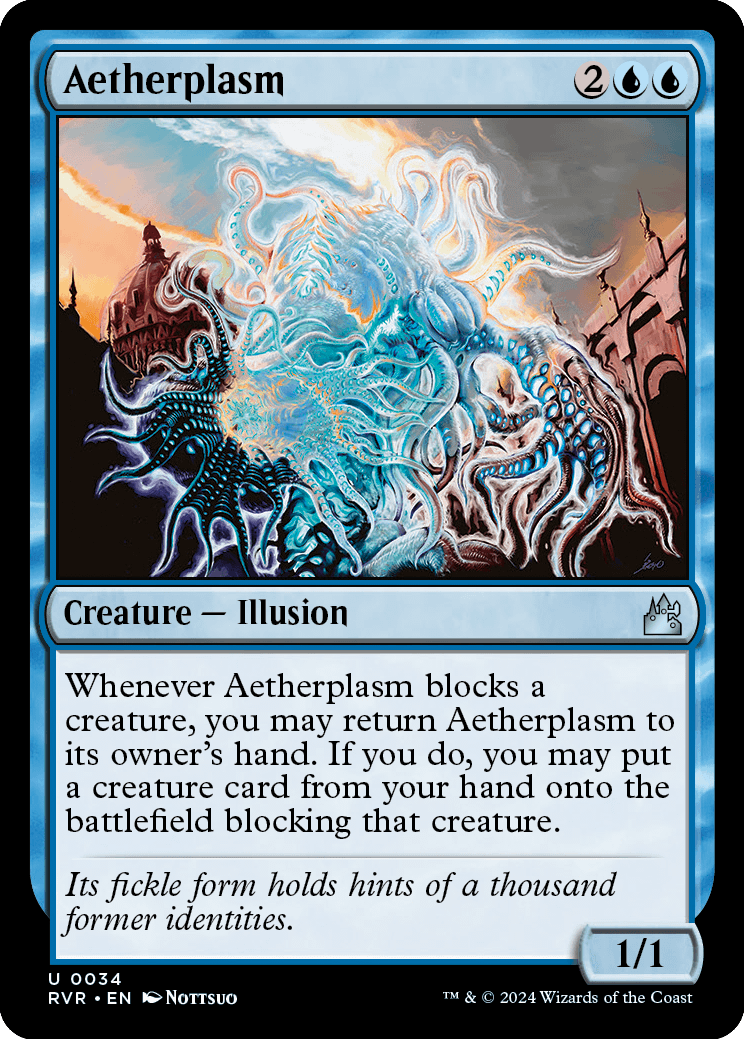
Aetherplasm
{2}{U}{U}
Creature — Illusion
1/1
Whenever Aetherplasm blocks a creature, you may return Aetherplasm to its owner's hand. If you do, you may put a creature card from your hand onto the battlefield blocking that creature.
- Aetherplasm will return to your hand before any combat damage is assigned.
- If you want, you can return Aetherplasm to your hand and not put anything onto the battlefield. The attacking creature will still be considered blocked, so it won't be able to deal combat damage to you unless it has trample or a similar ability.
- The creature you put onto the battlefield may be the Aetherplasm you just returned to your hand.
- The creature you put onto the battlefield from your hand is blocking the attacking creature, even if the block couldn't legally be declared (for example, if that creature enters the battlefield tapped, or it can't block, or the attacking creature has protection from it).
- Although the creature that enters the battlefield is blocking, it was never declared as a blocking creature for the purposes of abilities that trigger whenever a creature blocks (such as Aetherplasm's ability, for example).
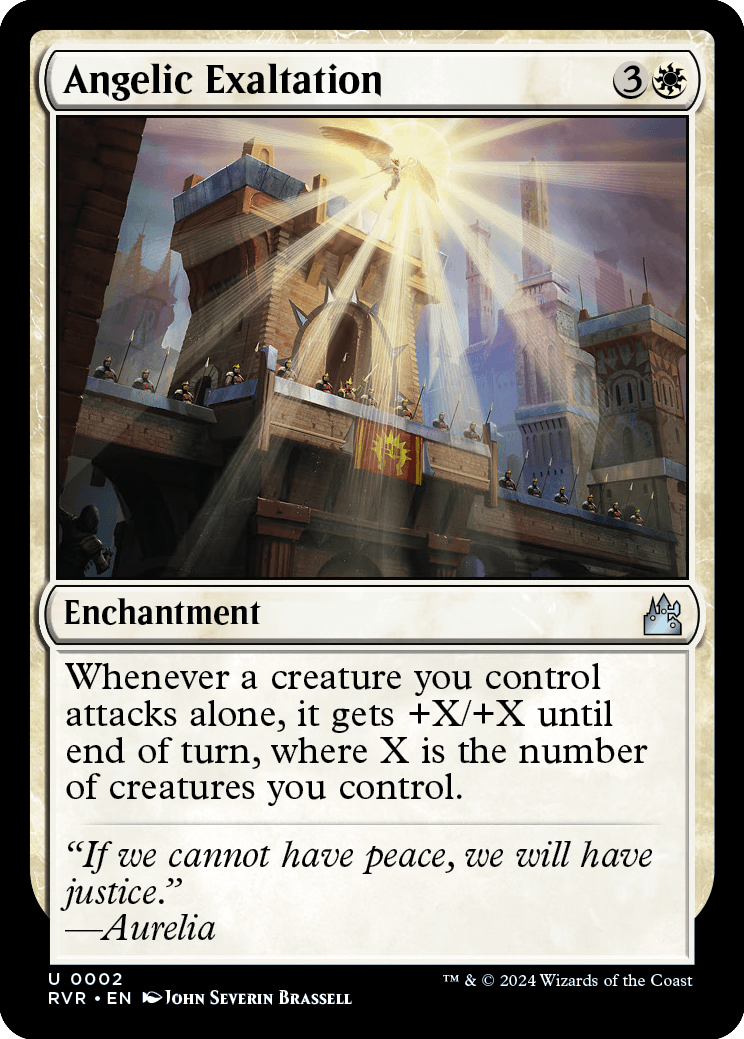
Angelic Exaltation
{3}{W}
Enchantment
Whenever a creature you control attacks alone, it gets +X/+X until end of turn, where X is the number of creatures you control.
- A creature attacks alone if it's the only creature declared as an attacker during the declare attackers step (including creatures controlled by your teammates, if applicable). For example, Angelic Exaltation's ability won't trigger if you attack with multiple creatures and all but one of them are removed from combat.
- The value of X is determined only as Angelic Exaltation's ability begins to resolve. It won't change later in the turn if the number of creatures you control changes.
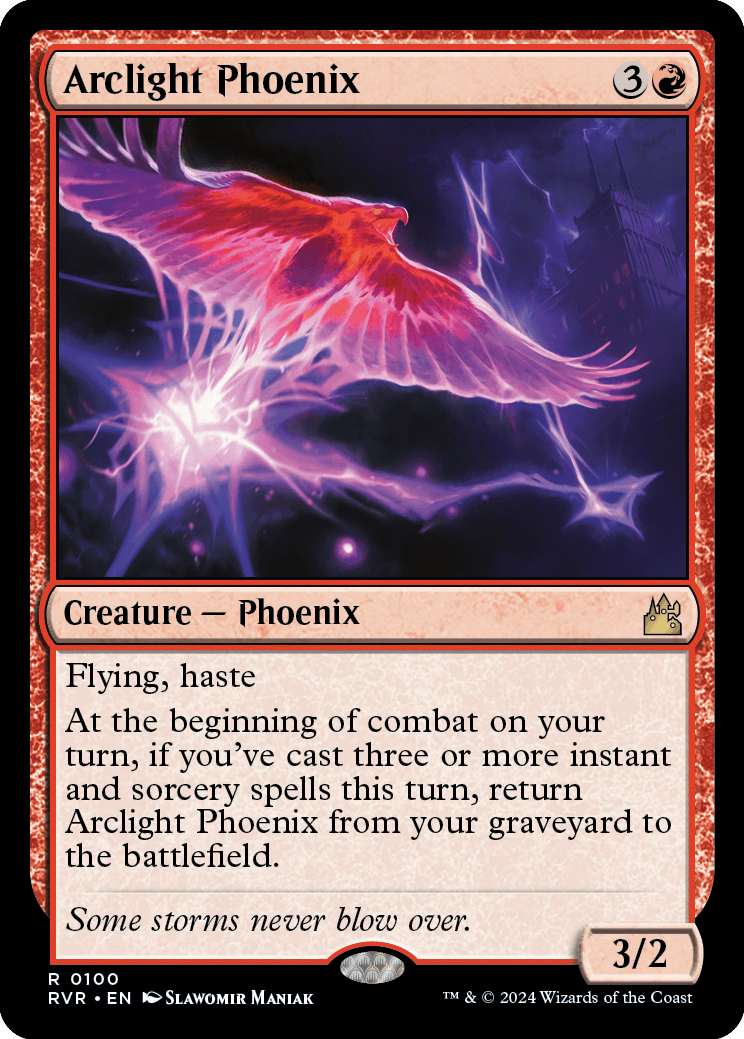
Arclight Phoenix
{3}{R}
Creature — Phoenix
3/2
Flying, haste
At the beginning of combat on your turn, if you've cast three or more instant and sorcery spells this turn, return Arclight Phoenix from your graveyard to the battlefield.
- Because the beginning of combat step is before attackers are declared, you can attack with Arclight Phoenix during the same combat it returns to the battlefield.
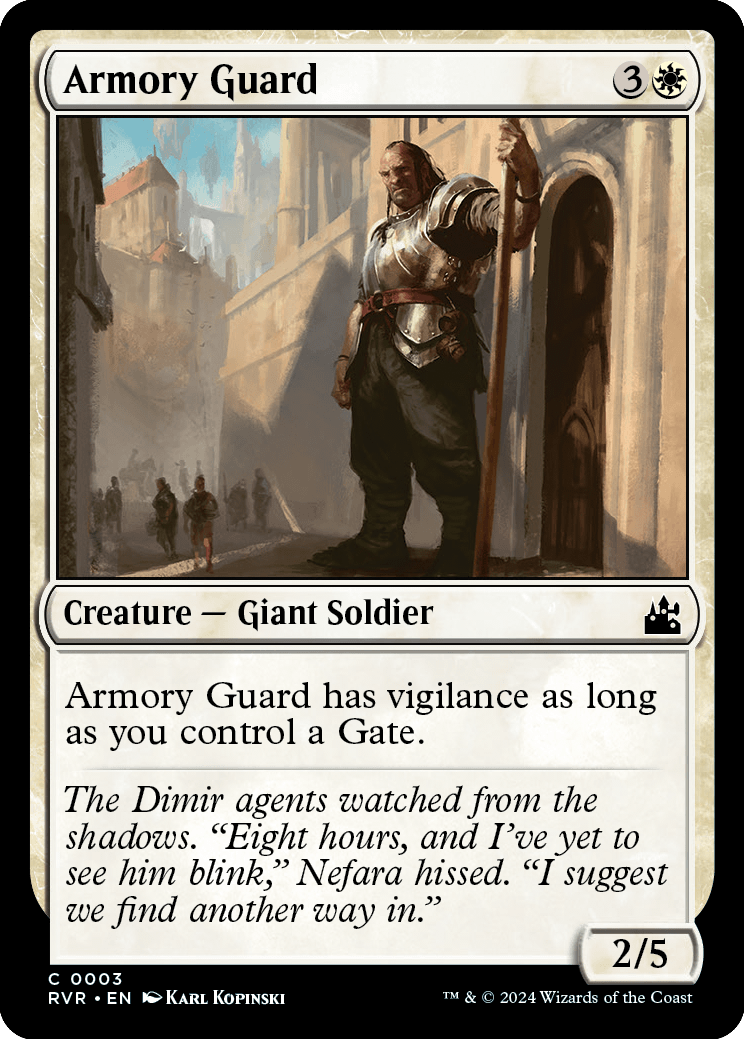
Armory Guard
{3}{W}
Creature — Giant Soldier
2/5
Armory Guard has vigilance as long as you control a Gate.
- Vigilance only matters when Armory Guard is being declared as an attacking creature. If Armory Guard is already attacking, losing control of your only Gate won't cause Armory Guard to become tapped or to leave combat.
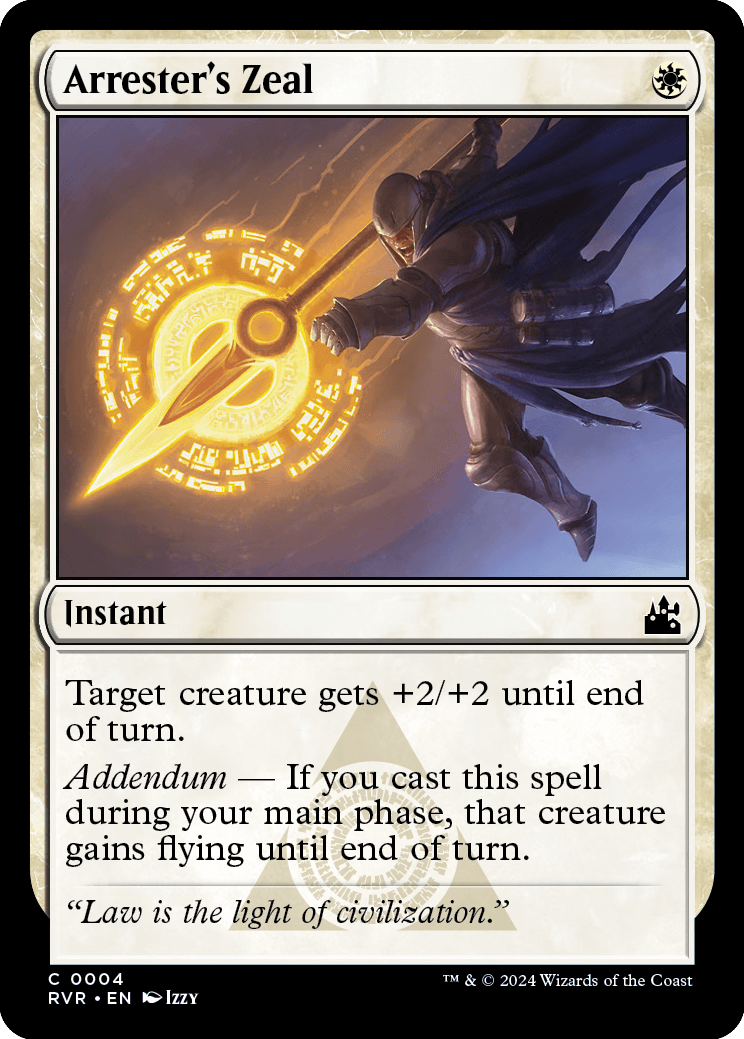
Arrester's Zeal
{W}
Instant
Target creature gets +2/+2 until end of turn.
Addendum — If you cast this spell during your main phase, that creature gains flying until end of turn.
- Addendum abilities of instant spells apply while the spell is resolving, not immediately after casting it. If the spell is countered, you don't get the addendum bonus.
- If an effect copies a spell with an addendum ability while it's on the stack, the copy wasn't cast at all, so you won't get the addendum bonus.
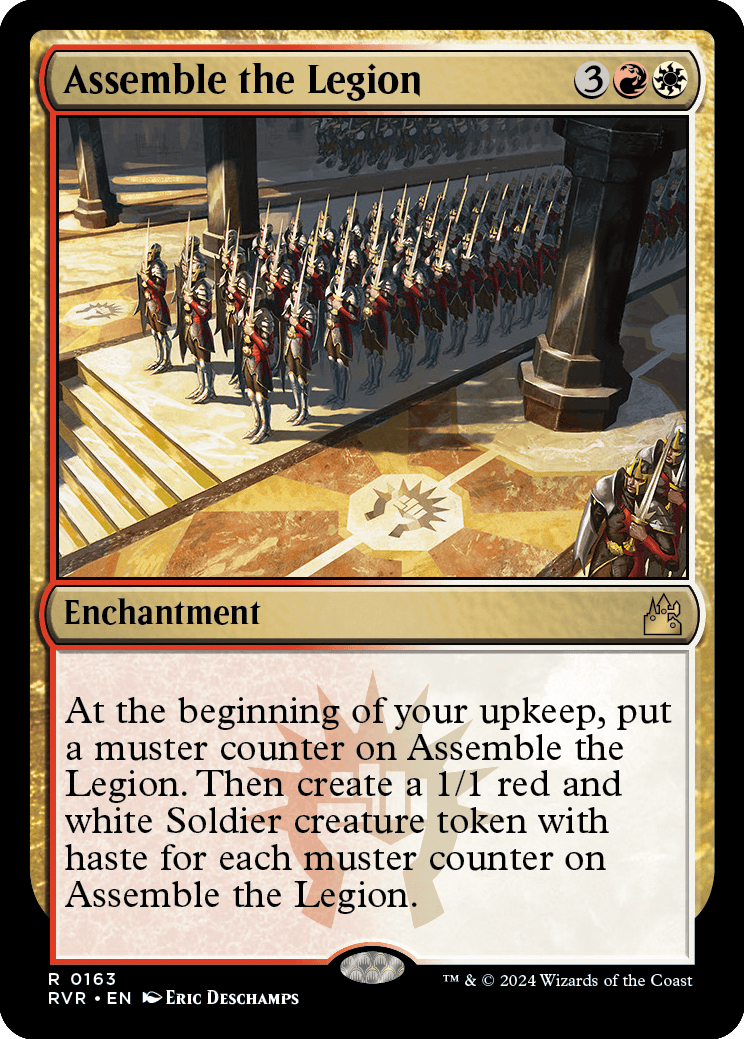
Assemble the Legion
{3}{R}{W}
Enchantment
At the beginning of your upkeep, put a muster counter on Assemble the Legion. Then create a 1/1 red and white Soldier creature token with haste for each muster counter on Assemble the Legion.
- If Assemble the Legion isn't on the battlefield when its ability resolves, use the number of muster counters it had when it was last on the battlefield to determine how many Soldier tokens to create.
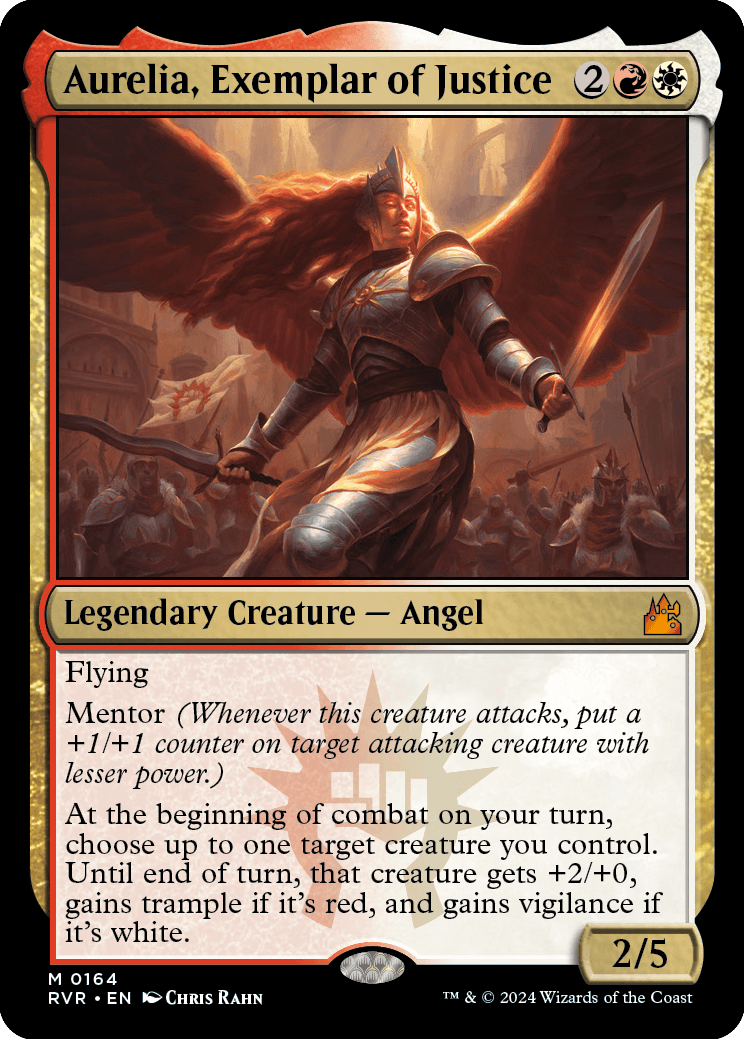
Aurelia, Exemplar of Justice
{2}{R}{W}
Legendary Creature — Angel
2/5
Flying
Mentor (Whenever this creature attacks, put a +1/+1 counter on target attacking creature with lesser power.)
At the beginning of combat on your turn, choose up to one target creature you control. Until end of turn, that creature gets +2/+0, gains trample if it's red, and gains vigilance if it's white.
- Aurelia's last ability resolves before attackers are chosen.
- The target creature gains trample and vigilance if it's both red and white. It gets +2/+0 only once, even if it's both red and white, and even if it's neither red nor white.
- Once Aurelia's last ability has resolved, the creature keeps whatever bonuses it got from that ability even if its colors change.
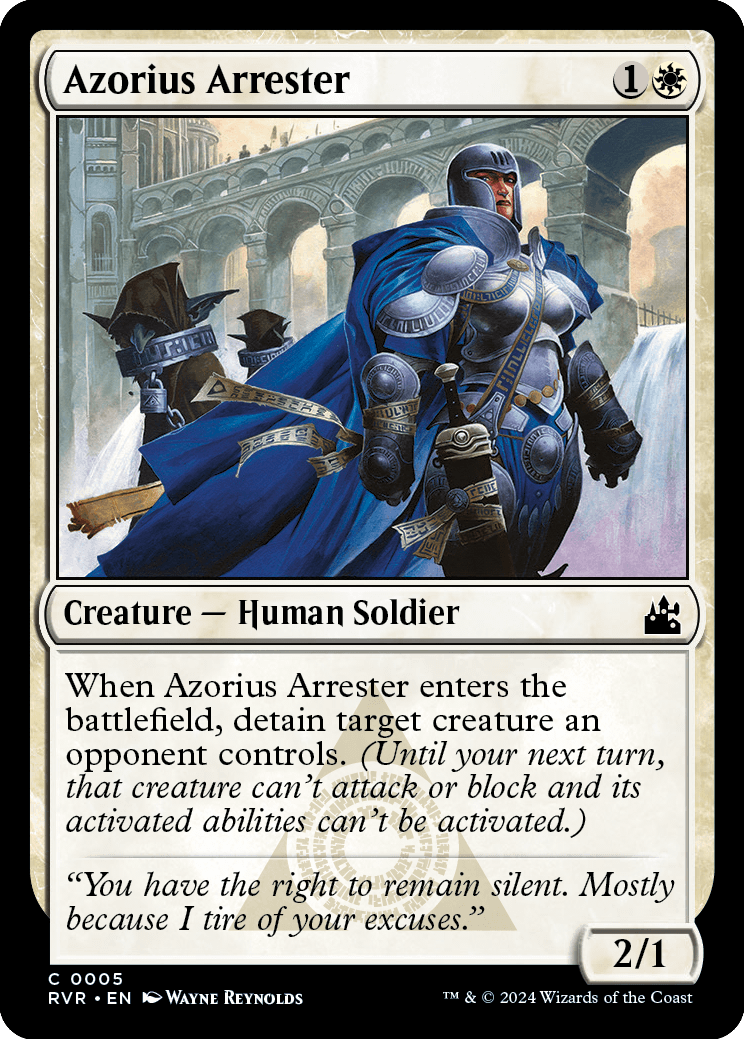
Azorius Arrester
{1}{W}
Creature — Human Soldier
2/1
When Azorius Arrester enters the battlefield, detain target creature an opponent controls. (Until your next turn, that creature can't attack or block and its activated abilities can't be activated.)
- Activated abilities contain a colon. They're generally written "[Cost]: [Effect]." Some keywords are activated abilities and will have colons in their reminder text. No one can activate any activated abilities, including mana abilities, of a detained permanent.
- The static abilities of a detained permanent still apply. The triggered abilities of a detained permanent can still trigger.
- If a creature is already attacking or blocking when it's detained, it won't be removed from combat. It will continue to attack or block.
- If a permanent's activated ability is on the stack when that permanent is detained, the ability will be unaffected.
- If a noncreature permanent is detained and later turns into a creature, it won't be able to attack or block.
- When a player leaves a multiplayer game, any continuous effects with durations that last until that player's next turn or until a specific point in that turn will last until that turn would have begun. They neither expire immediately nor last indefinitely.
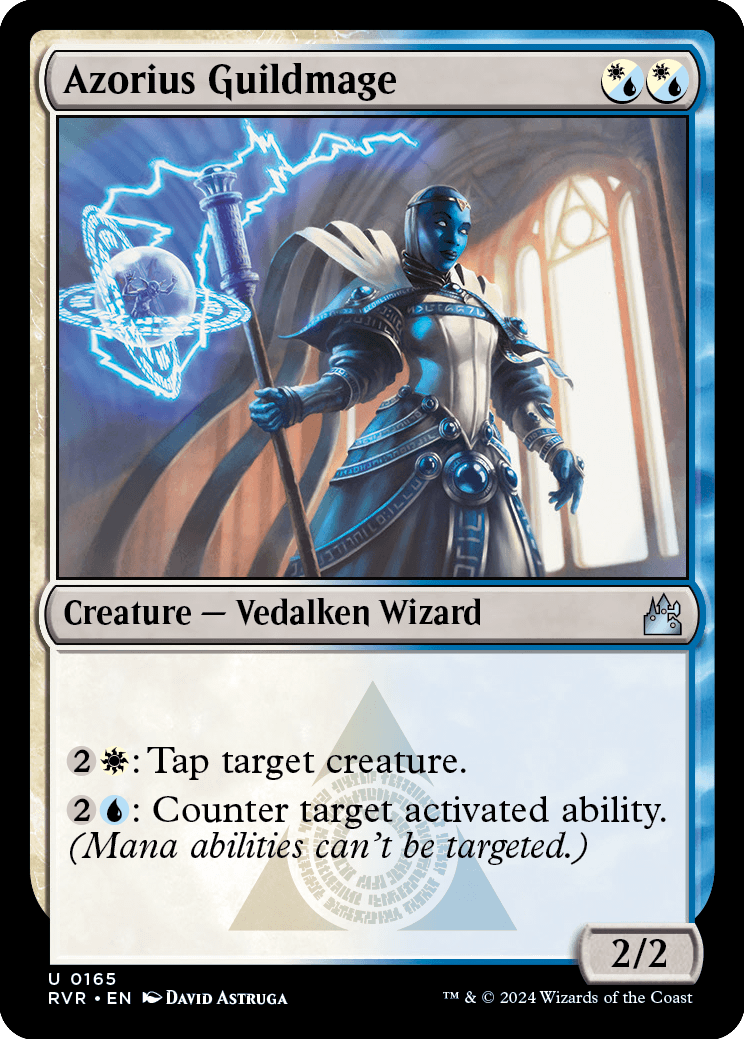
Azorius Guildmage
{W/U}{W/U}
Creature — Vedalken Wizard
2/2
{2}{W}: Tap target creature.
{2}{U}: Counter target activated ability. (Mana abilities can't be targeted.)
- Activated abilities contain a colon. They're generally written "[Cost]: [Effect]." Some keywords are activated abilities and will have colons in their reminder text. Loyalty abilities of planeswalkers are activated abilities.
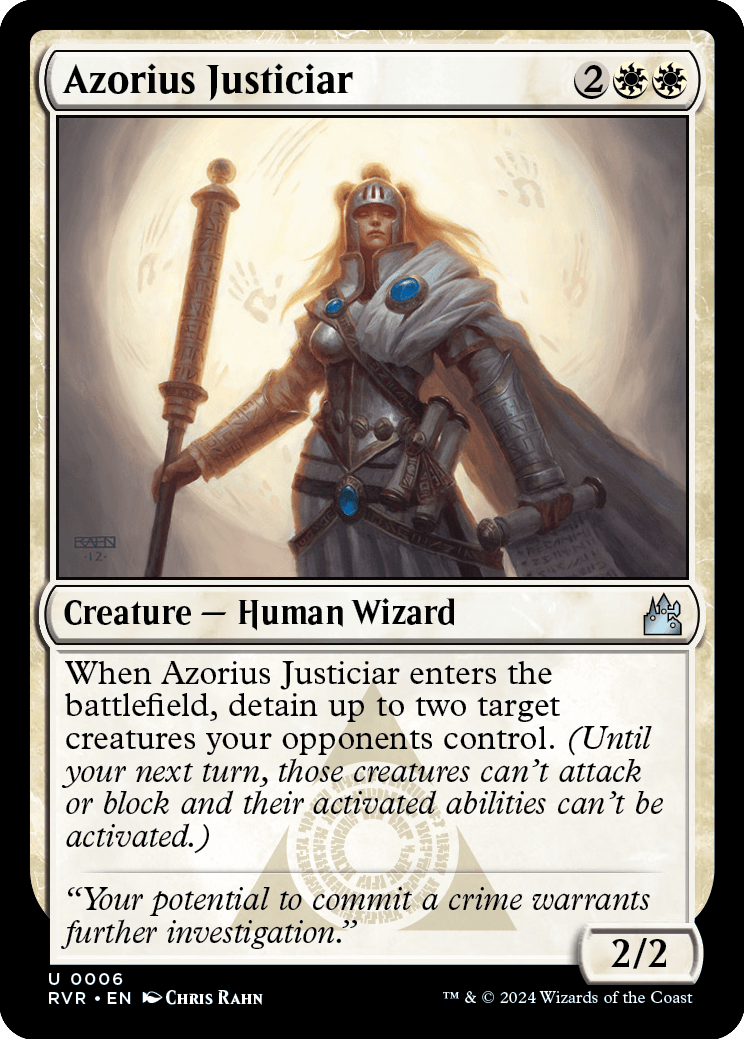
Azorius Justiciar
{2}{W}{W}
Creature — Human Wizard
2/2
When Azorius Justiciar enters the battlefield, detain up to two target creatures your opponents control. (Until your next turn, those creatures can't attack or block and their activated abilities can't be activated.)
- The two creatures can be controlled by the same opponent or by different opponents.
- Activated abilities contain a colon. They're generally written "[Cost]: [Effect]." Some keywords are activated abilities and will have colons in their reminder text. No one can activate any activated abilities, including mana abilities, of a detained permanent.
- The static abilities of a detained permanent still apply. The triggered abilities of a detained permanent can still trigger.
- If a creature is already attacking or blocking when it's detained, it won't be removed from combat. It will continue to attack or block.
- If a permanent's activated ability is on the stack when that permanent is detained, the ability will be unaffected.
- If a noncreature permanent is detained and later turns into a creature, it won't be able to attack or block.
- When a player leaves a multiplayer game, any continuous effects with durations that last until that player's next turn or until a specific point in that turn will last until that turn would have begun. They neither expire immediately nor last indefinitely.
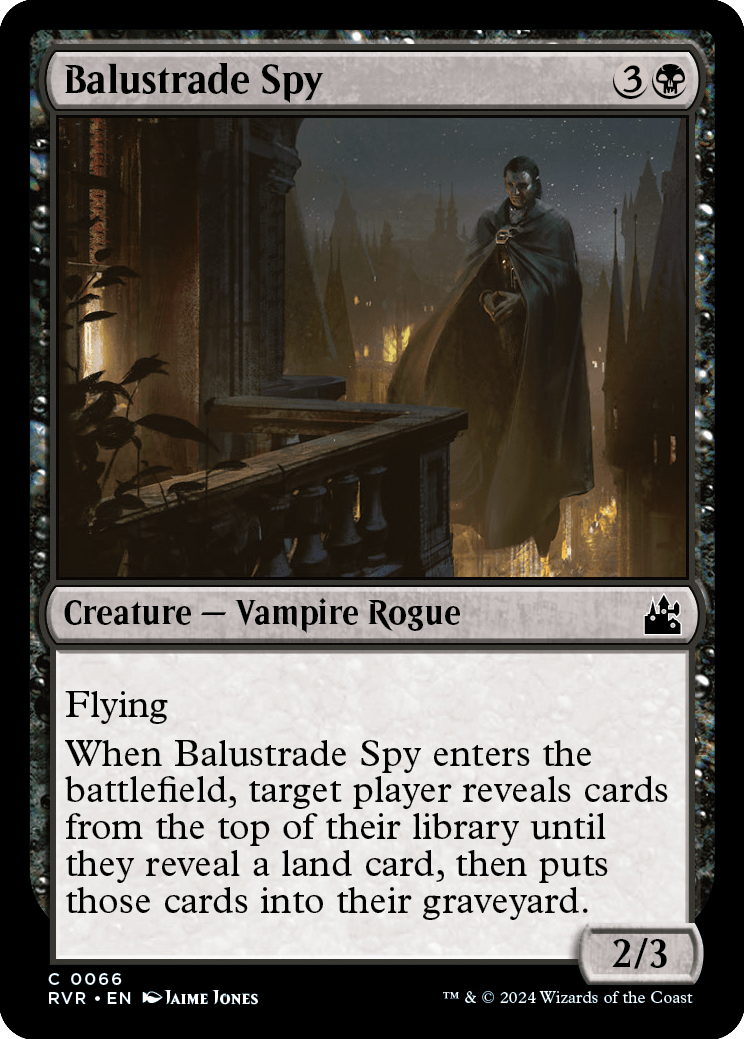
Balustrade Spy
{3}{B}
Creature — Vampire Rogue
2/3
Flying
When Balustrade Spy enters the battlefield, target player reveals cards from the top of their library until they reveal a land card, then puts those cards into their graveyard.
- The land card they reveal, if any, is included in the cards put into their graveyard.
- If the target player has no land cards in their library, all cards from that library will be revealed and put into their graveyard.
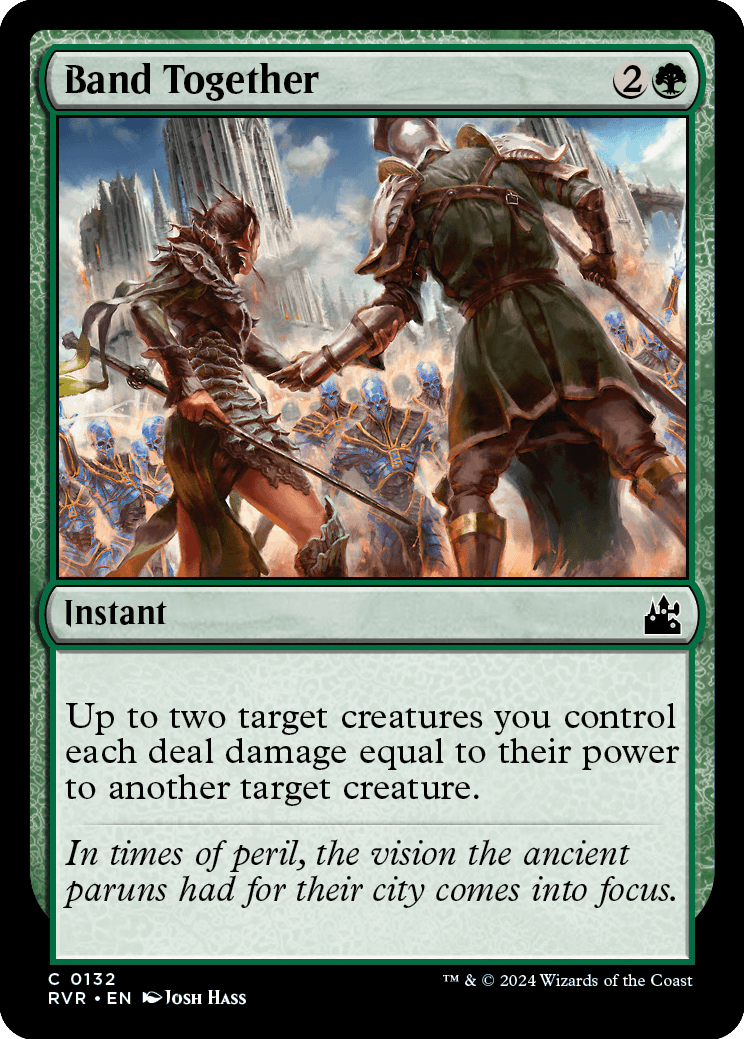
Band Together
{2}{G}
Instant
Up to two target creatures you control each deal damage equal to their power to another target creature.
- If one of the two target creatures you control is an illegal target as Band Together resolves, the other will still deal damage equal to its power.
- If the last target creature is an illegal target as Band Together resolves, or if both of the first targets are illegal targets, no creature deals or is dealt damage.
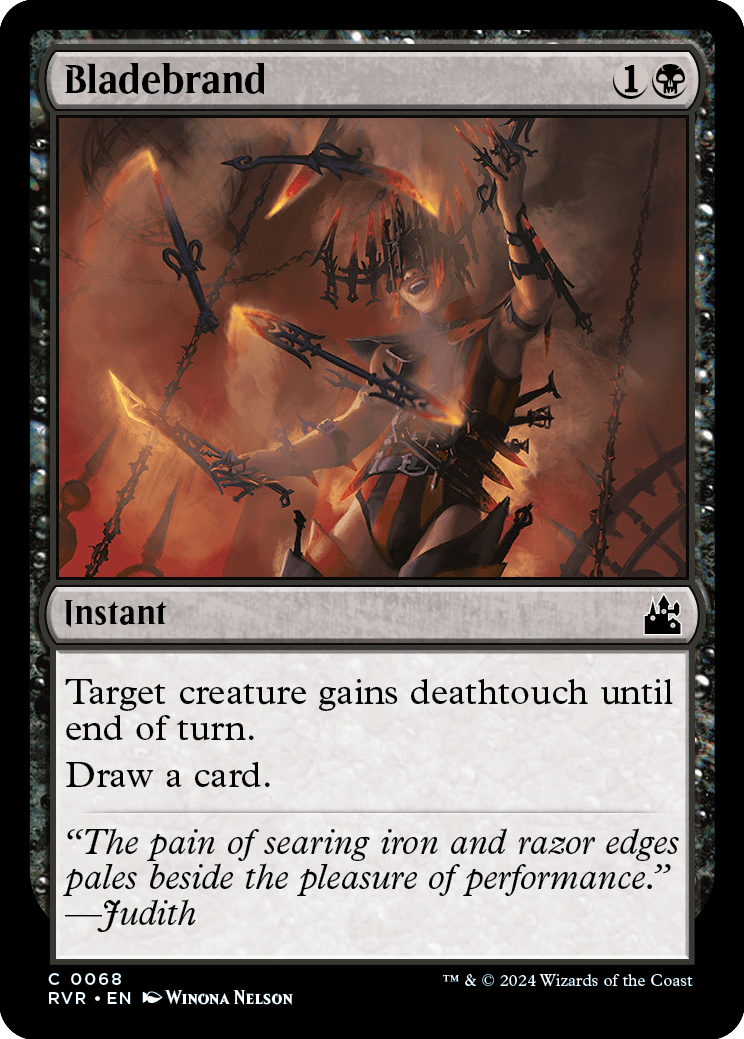
Bladebrand
{1}{B}
Instant
Target creature gains deathtouch until end of turn.
Draw a card.
- If the target creature is an illegal target by the time Bladebrand tries to resolve, the spell doesn't resolve. You don't draw a card.
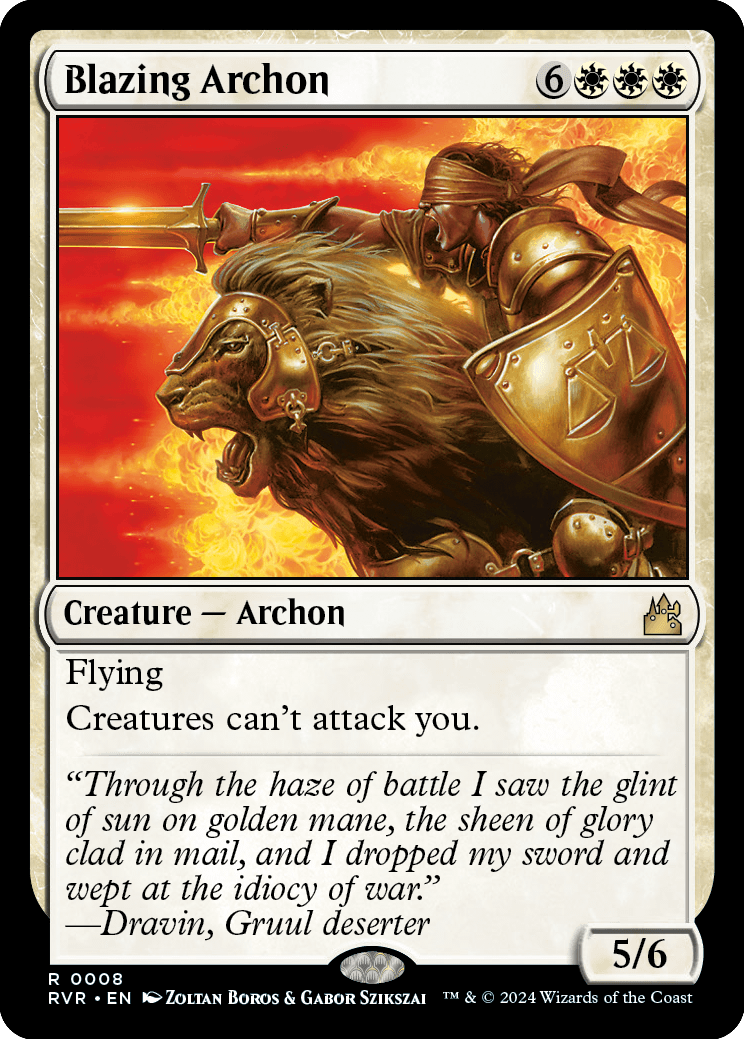
Blazing Archon
{6}{W}{W}{W}
Creature — Archon
5/6
Flying
Creatures can't attack you.
- Unless some effect explicitly says otherwise, a creature that can't attack you can still attack a planeswalker you control or a battle you protect.
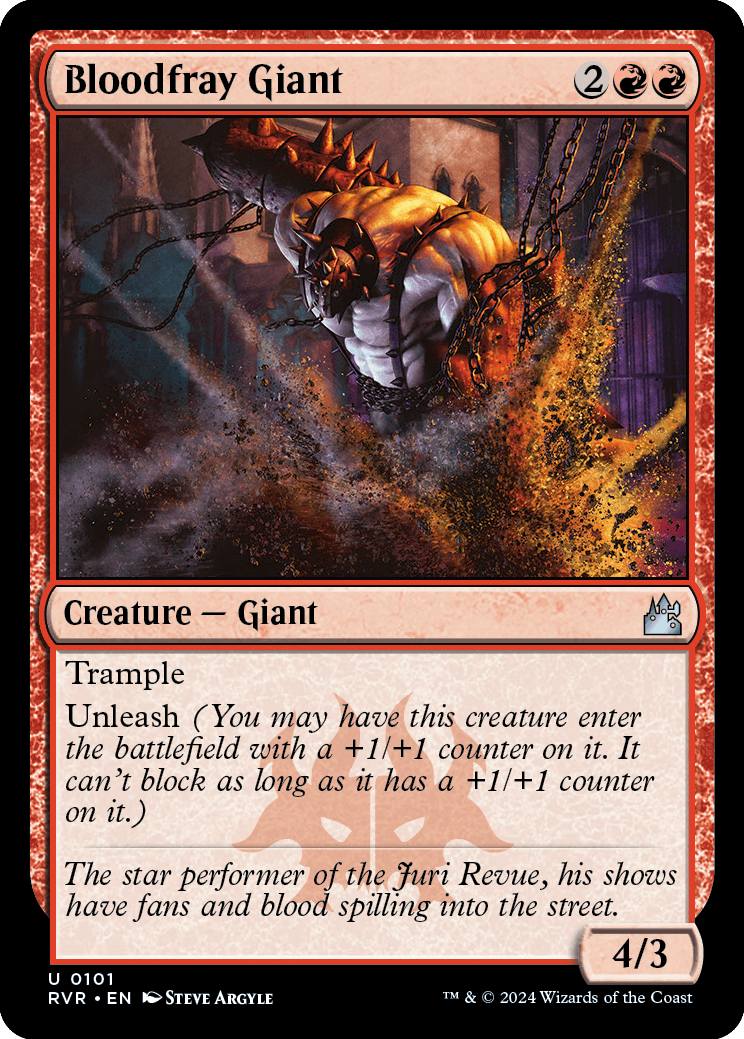
Bloodfray Giant
{2}{R}{R}
Creature — Giant
4/3
Trample
Unleash (You may have this creature enter the battlefield with a +1/+1 counter on it. It can't block as long as it has a +1/+1 counter on it.)
- You make the choice to have the creature with unleash enter the battlefield with a +1/+1 counter or not as it's entering the battlefield. At that point, it's too late for a player to respond to the creature spell by trying to counter it, for example.
- The unleash ability applies no matter where the creature is entering the battlefield from.
- A creature with unleash can't block if it has any +1/+1 counter on it, not just one put on it by the unleash ability.
- Putting a +1/+1 counter on a creature with unleash that's already blocking won't remove it from combat. It will continue to block.
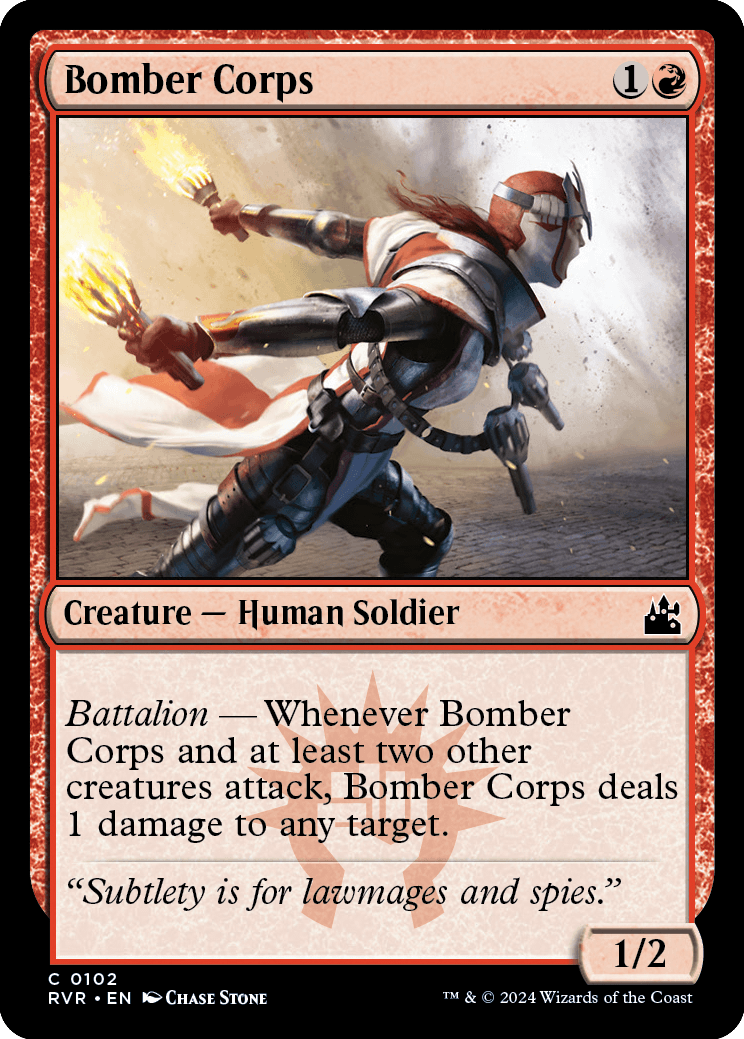
Bomber Corps
{1}{R}
Creature — Human Soldier
1/2
Battalion — Whenever Bomber Corps and at least two other creatures attack, Bomber Corps deals 1 damage to any target.
- The three attacking creatures don't have to be attacking the same player, planeswalker, or battle.
- Once a battalion ability has triggered, it doesn't matter how many creatures are still attacking when that ability resolves.
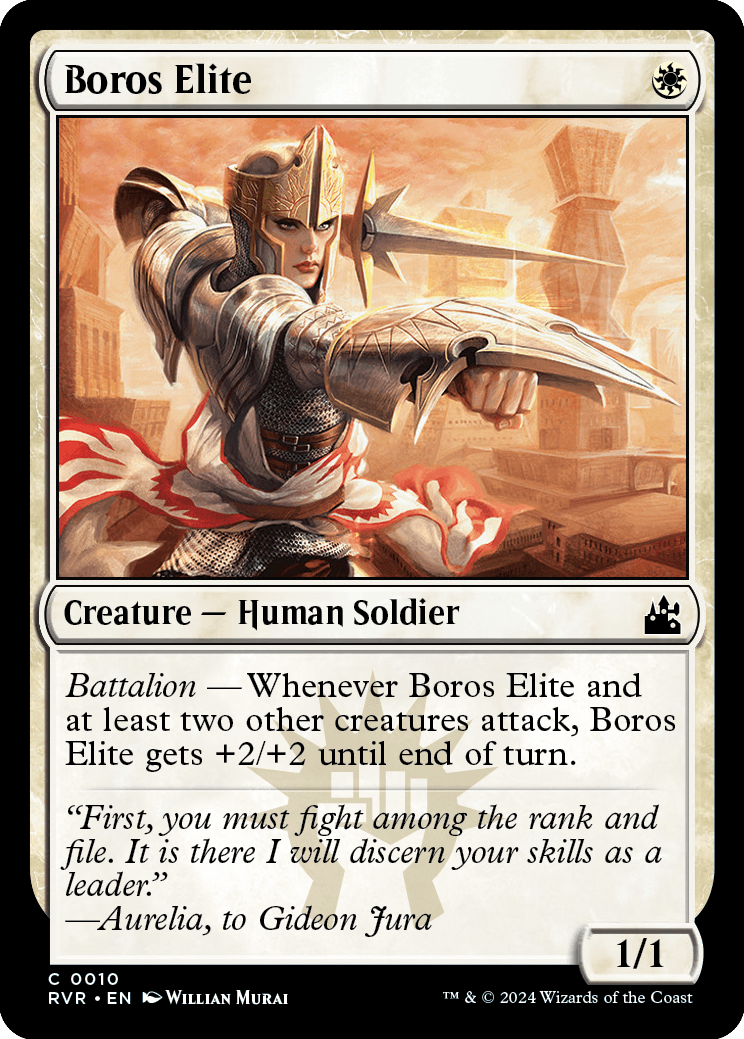
Boros Elite
{W}
Creature — Human Soldier
1/1
Battalion — Whenever Boros Elite and at least two other creatures attack, Boros Elite gets +2/+2 until end of turn.
- The three attacking creatures don't have to be attacking the same player, planeswalker, or battle.
- Once a battalion ability has triggered, it doesn't matter how many creatures are still attacking when that ability resolves.
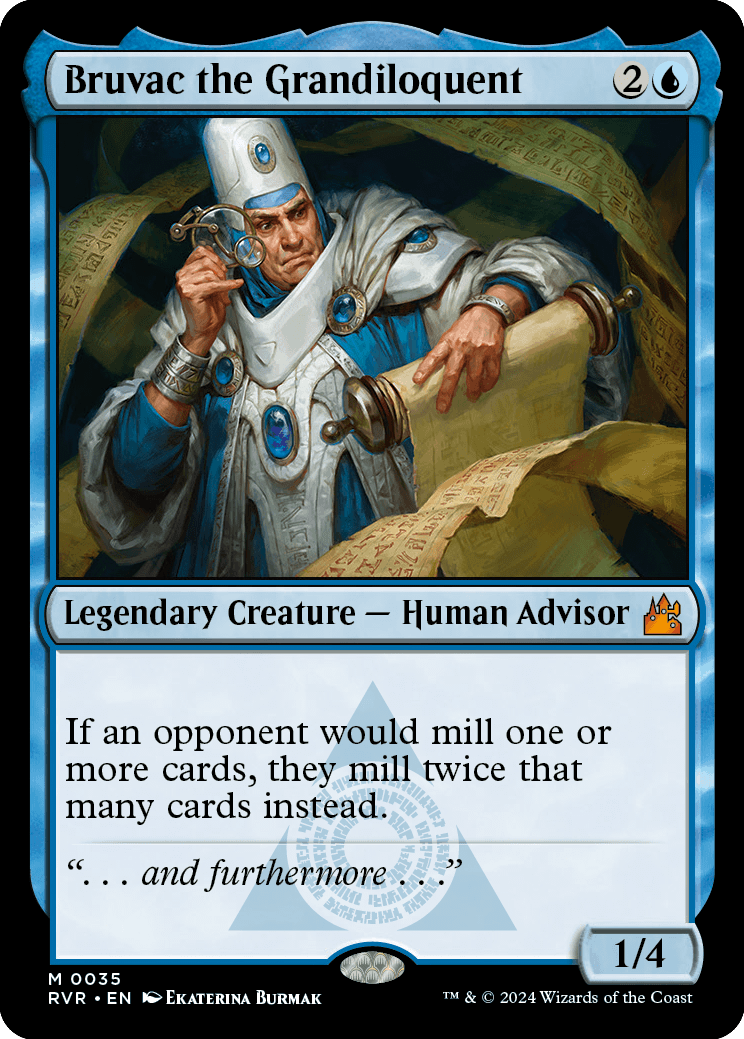
Bruvac the Grandiloquent
{2}{U}
Legendary Creature — Human Advisor
1/4
If an opponent would mill one or more cards, they mill twice that many cards instead.
- If a player is instructed to put a card into their graveyard without using the word "mill," (by Balustrade Spy's triggered ability, for example) Bruvac's ability doesn't apply.
- Because Bruvac is legendary, it's unlikely that one player will control two. However, if that happens, each opponent mills four times as many cards as originally instructed. If they control three, their opponents mill eight times as many, and so on.
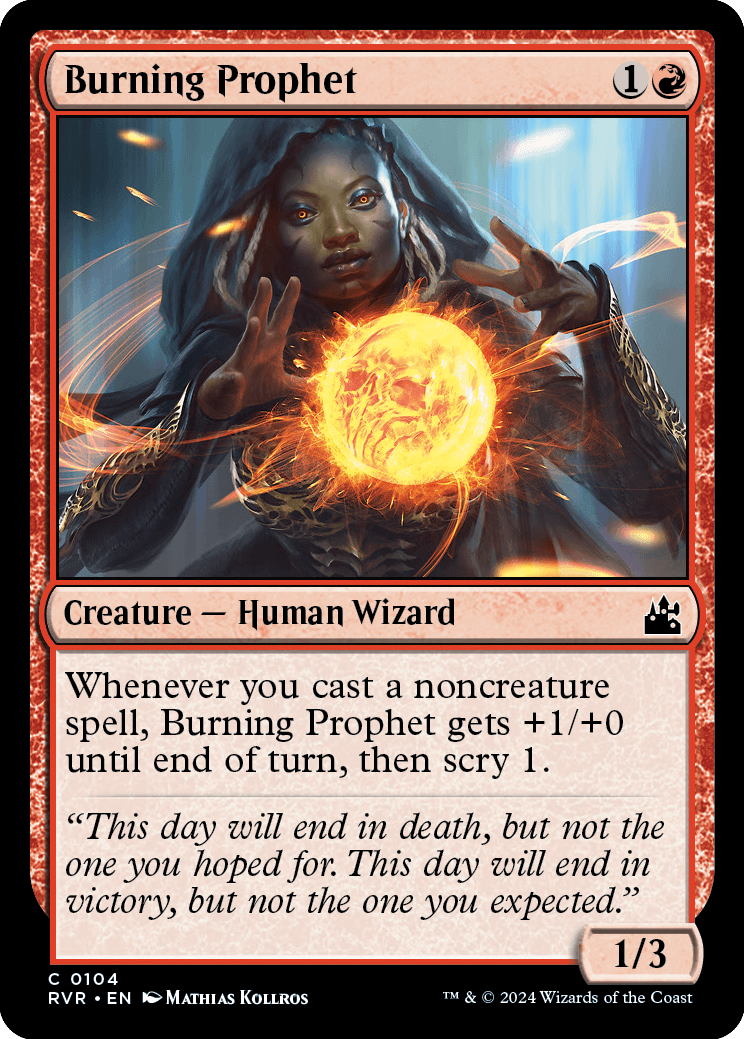
Burning Prophet
{1}{R}
Creature — Human Wizard
1/3
Whenever you cast a noncreature spell, Burning Prophet gets +1/+0 until end of turn, then scry 1.
- Burning Prophet's ability resolves before the spell that caused it to trigger. It resolves even if that spell is countered.
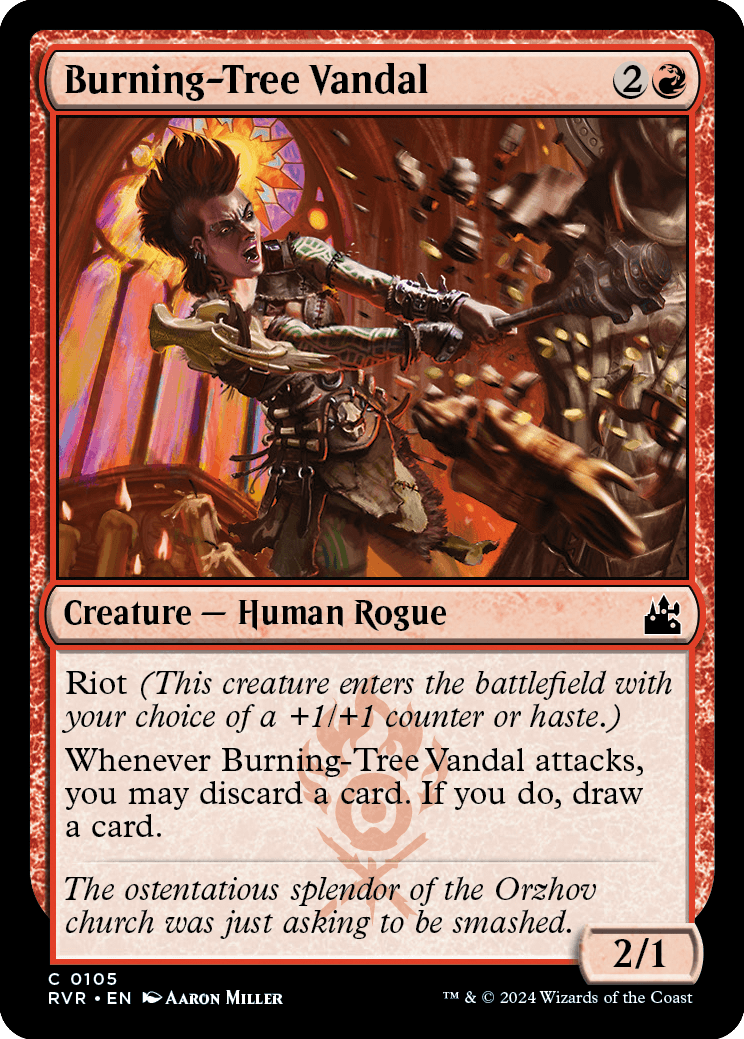
Burning-Tree Vandal
{2}{R}
Creature — Human Rogue
2/1
Riot (This creature enters the battlefield with your choice of a +1/+1 counter or haste.)
Whenever Burning-Tree Vandal attacks, you may discard a card. If you do, draw a card.
- Riot is a replacement effect. Players can't respond to your choice of +1/+1 counter or haste, and they can't take actions while the creature is on the battlefield without one or the other.
- If a creature entering the battlefield has riot but can't have a +1/+1 counter put onto it, it gains haste.
- If you choose for the creature to gain haste, it gains haste indefinitely. It won't lose it as the turn ends or as another player gains control of it.
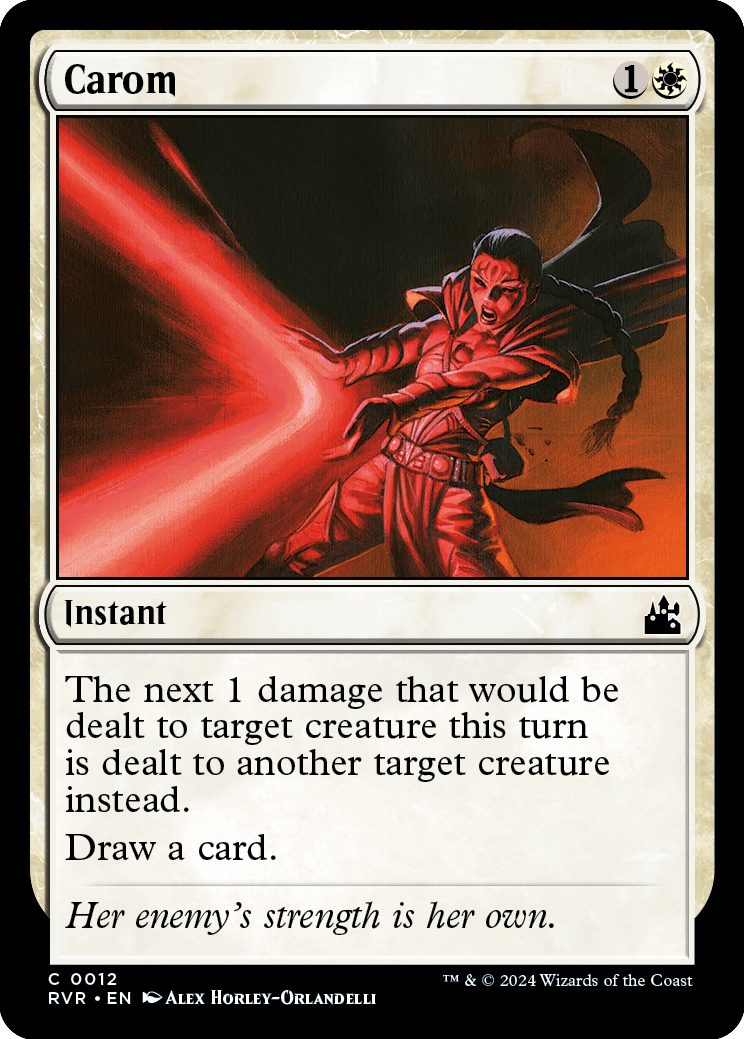
Carom
{1}{W}
Instant
The next 1 damage that would be dealt to target creature this turn is dealt to another target creature instead.
Draw a card.
- If either target has left the battlefield before the damage would be dealt, that damage isn't redirected.
- Carom's controller draws a card when Carom resolves, not when the damage is redirected.
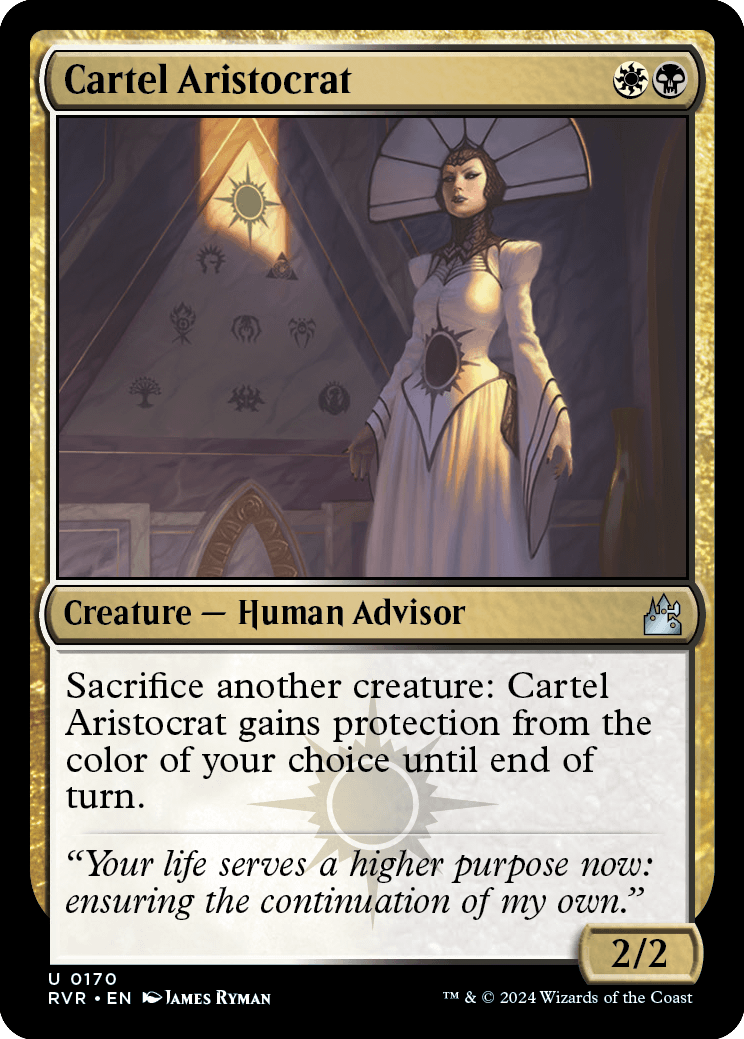
Cartel Aristocrat
{W}{B}
Creature — Human Advisor
2/2
Sacrifice another creature: Cartel Aristocrat gains protection from the color of your choice until end of turn.
- You choose the color when the ability resolves.

Chord of Calling
{X}{G}{G}{G}
Instant
Convoke (Your creatures can help cast this spell. Each creature you tap while casting this spell pays for {1} or one mana of that creature's color.)
Search your library for a creature card with mana value X or less, put it onto the battlefield, then shuffle.
- If a card in a player's library has {X} in its mana cost, X is considered to be 0.
- When using convoke to cast a spell with {X} in its mana cost, first choose the value for X. That choice, plus any cost increases or decreases, will determine the spell's total cost. Then you can tap creatures you control to help pay that cost. For example, if you cast Chord of Calling and choose X to be 3, the total cost is {3}{G}{G}{G}. If you tap two green creatures and two red creatures, you'll have to pay {1}{G}.
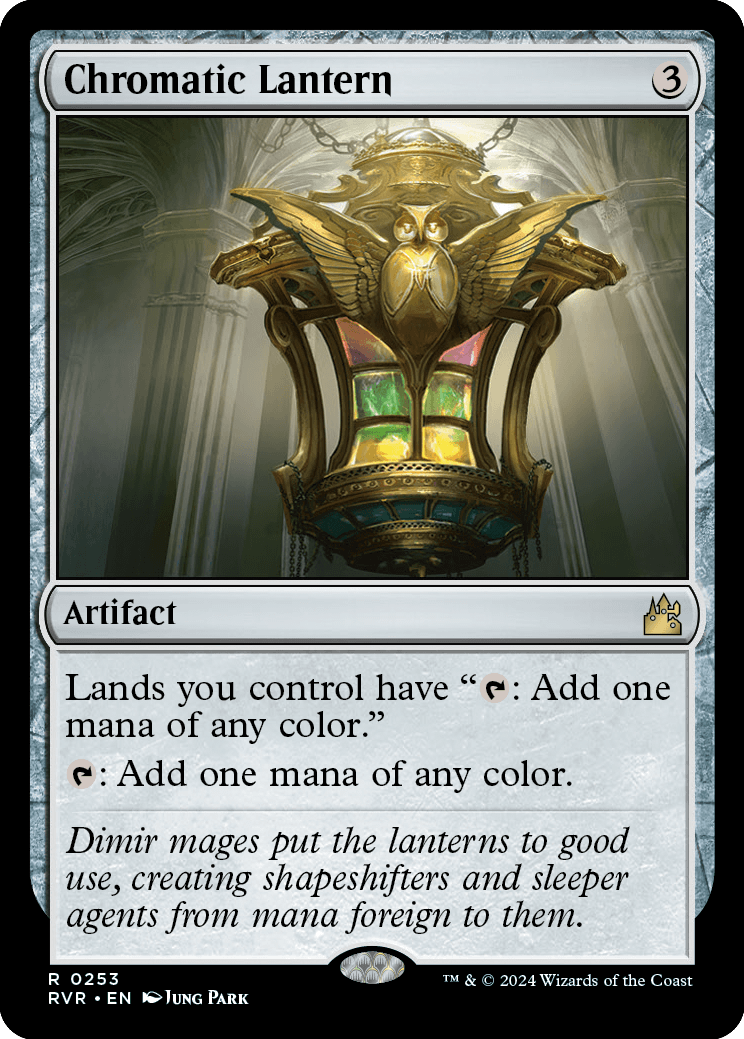
Chromatic Lantern
{3}
Artifact
Lands you control have "{T}: Add one mana of any color."
{T}: Add one mana of any color.
- Lands you control won't lose any other abilities they had. They also won't gain or lose any land types.
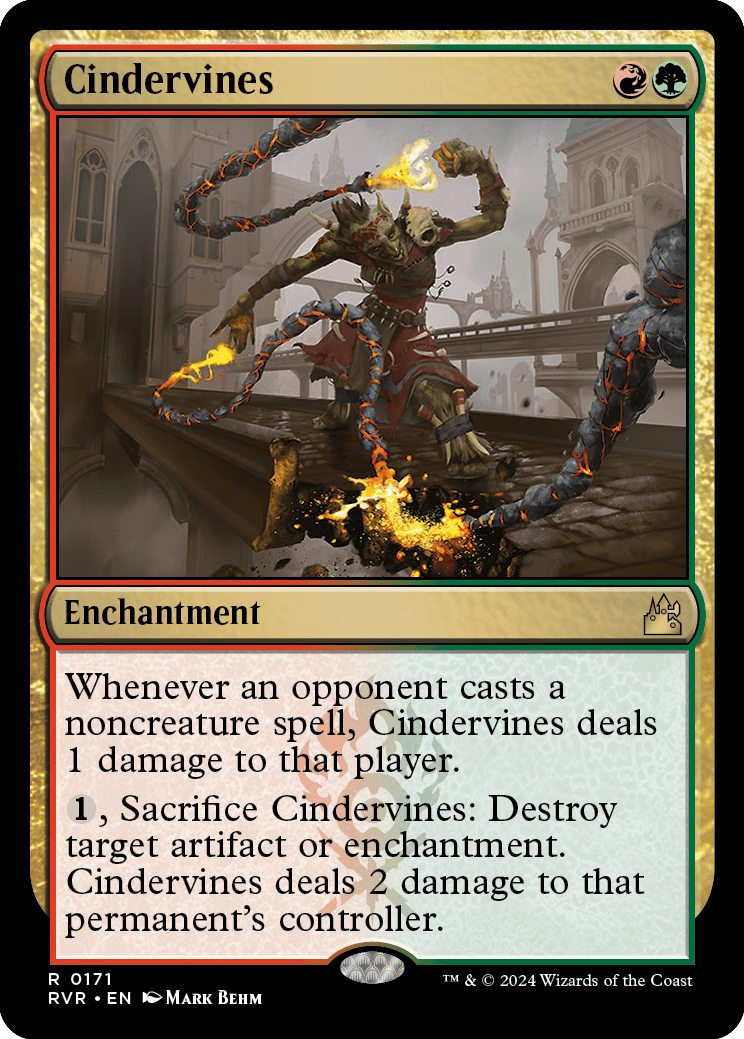
Cindervines
{R}{G}
Enchantment
Whenever an opponent casts a noncreature spell, Cindervines deals 1 damage to that player.
{1}, Sacrifice Cindervines: Destroy target artifact or enchantment. Cindervines deals 2 damage to that permanent's controller.
- Cindervines's triggered ability resolves before the spell that caused it to trigger. It resolves even if that spell is countered.
- If the target permanent is an illegal target by the time Cindervines's activated ability tries to resolve, the ability doesn't resolve. No player is dealt damage. If the target is legal but not destroyed (most likely because it has indestructible), its controller is dealt damage.
- Cindervines can be the target of its own activated ability. The ability won't resolve since it won't have a legal target, and no player will be dealt damage, but this does allow you to sacrifice Cindervines without anything else to target if you want to.
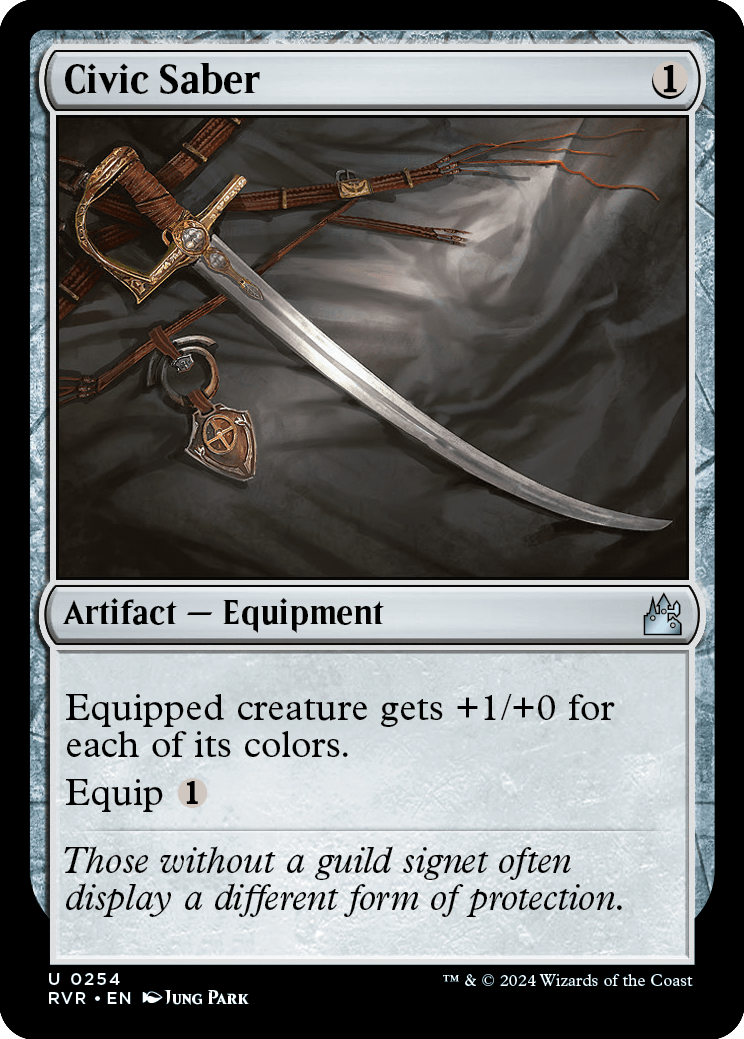
Civic Saber
{1}
Artifact — Equipment
Equipped creature gets +1/+0 for each of its colors.
Equip {1}
- Civic Saber's bonus can range from +0/+0 (for a colorless creature) to +5/+0 (for a creature that's all five colors).
- If the equipped creature becomes a different number of colors, the bonus will change accordingly.
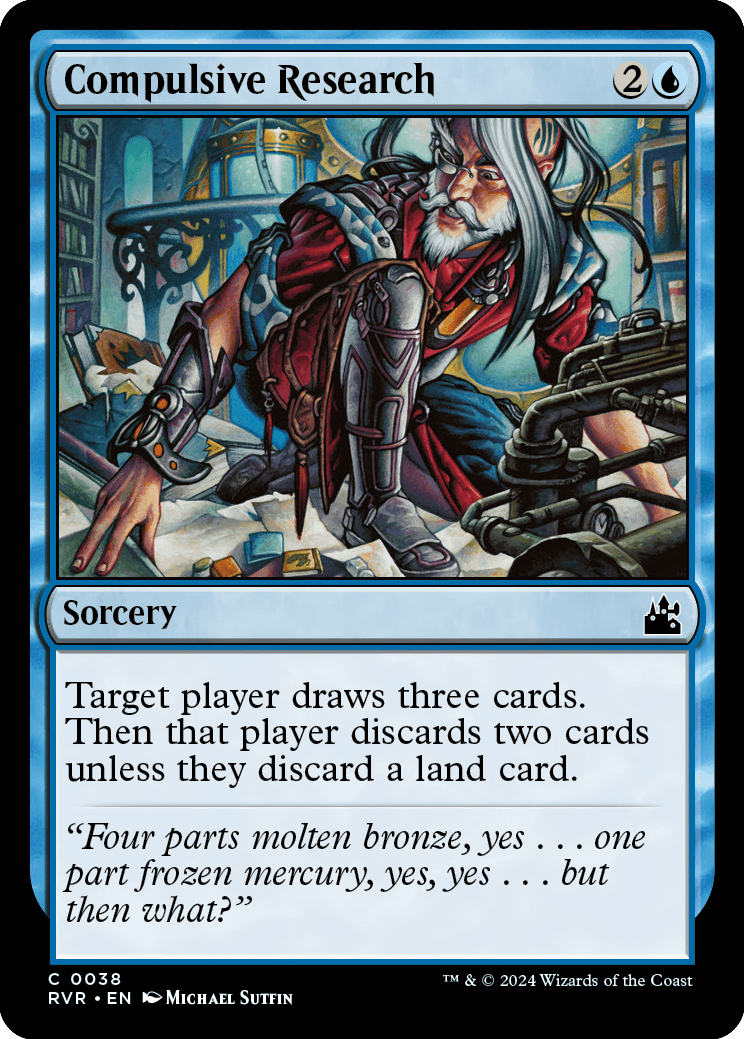
Compulsive Research
{2}{U}
Sorcery
Target player draws three cards. Then that player discards two cards unless they discard a land card.
- The target player can discard either one land card or two cards which may or may not be lands. The player can discard one land and one other card or two land cards if they choose.
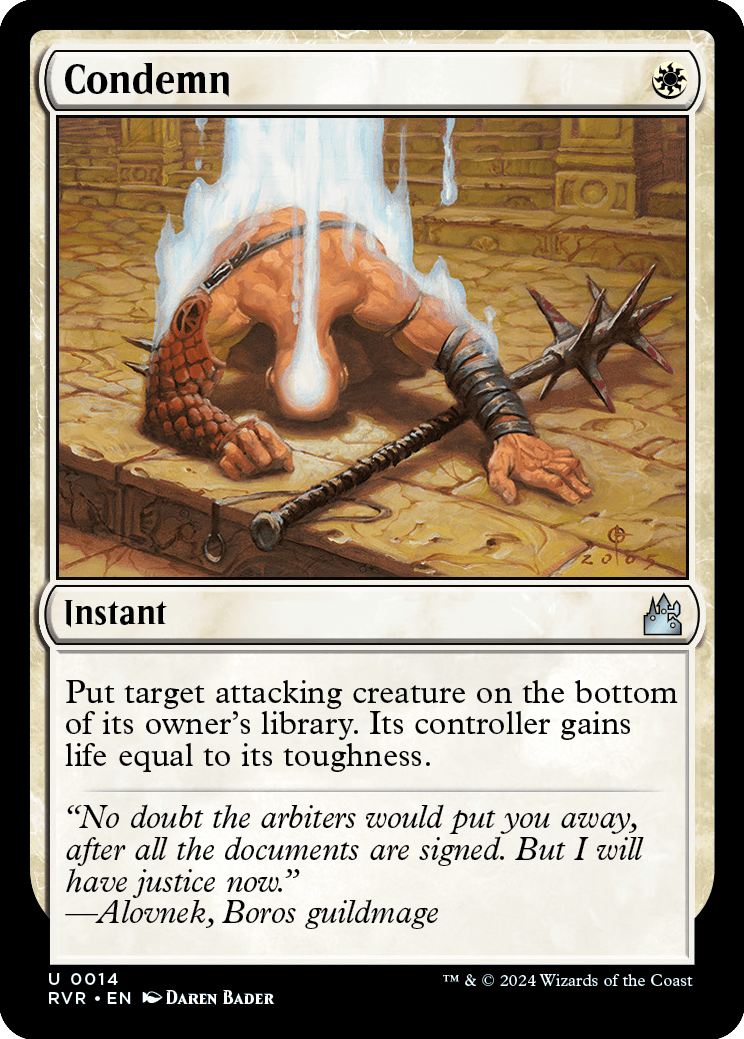
Condemn
{W}
Instant
Put target attacking creature on the bottom of its owner's library. Its controller gains life equal to its toughness.
- Use the creature's toughness as it last existed on the battlefield to determine how much life its controller gains.
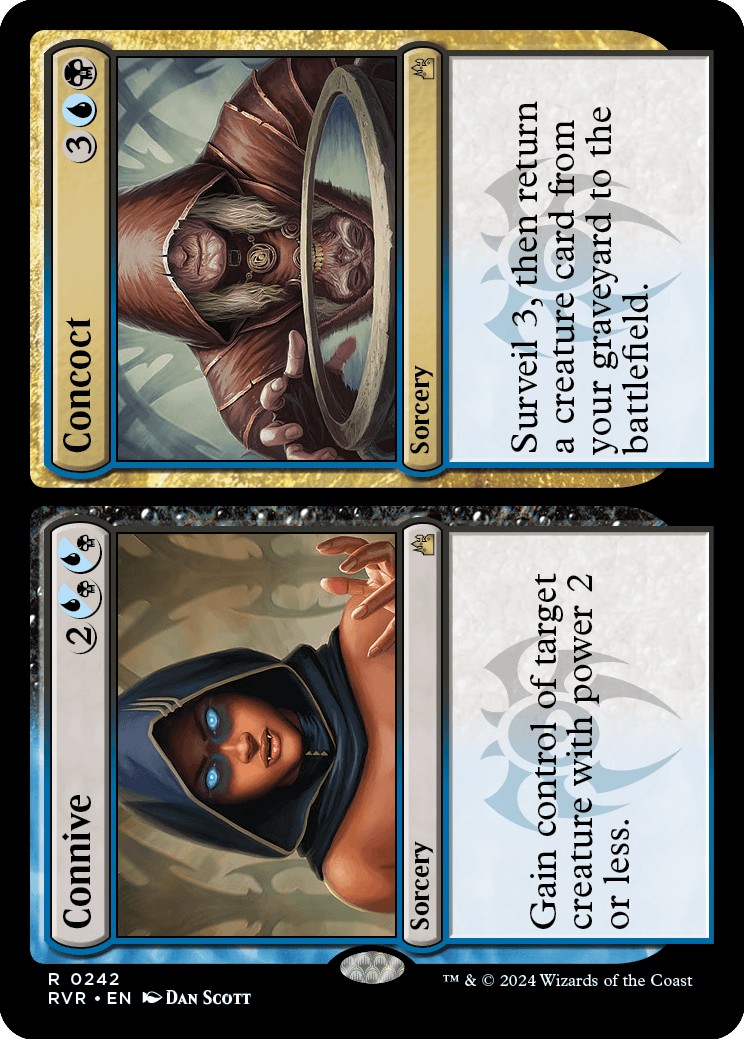
Connive
{2}{U/B}{U/B}
Sorcery
Gain control of target creature with power 2 or less.
///
Concoct
{3}{U}{B}
Sorcery
Surveil 3, then return a creature card from your graveyard to the battlefield.
- Connive's effect lasts indefinitely. It doesn't wear off during the cleanup step, and it doesn't expire if the creature's power becomes greater after Connive has resolved.
- The creature card you return with Concoct may be one that you just surveilled into your graveyard.
- No player may take actions between the time you surveil and the time you return a creature card to the battlefield.
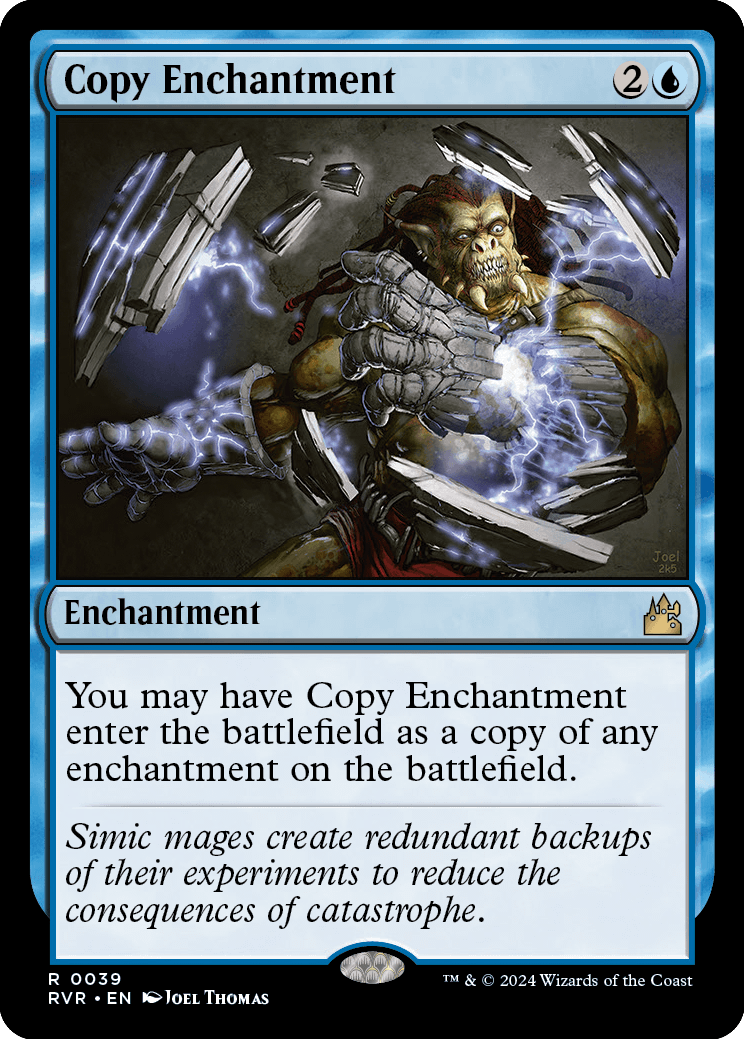
Copy Enchantment
{2}{U}
Enchantment
You may have Copy Enchantment enter the battlefield as a copy of any enchantment on the battlefield.
- Copy Enchantment copies exactly what was printed on the original permanent and nothing more (unless that permanent is itself copying something or is a token; see below). It doesn't copy whether that permanent is tapped or untapped, whether it has any counters on it or Auras attached to it, or any noncopy effects that have changed its power, toughness, types, color, and so on.
- If the chosen permanent has {X} in its mana cost, X is 0.
- If the chosen permanent is copying something else (for example, if the chosen permanent is another Copy Enchantment), then your Copy Enchantment enters the battlefield as whatever the chosen permanent copied.
- If the chosen permanent is a token, Copy Enchantment copies the original characteristics of that token as stated by the effect that created the token. Copy Enchantment does not become a token.
- If Copy Enchantment copies an Aura this way, you choose what the Aura will enchant just before it enters the battlefield. You can't choose any permanents entering the battlefield at the same time as that Aura. This doesn't target the player or permanent it will enchant, so an opponent's permanent with hexproof may be chosen this way. The chosen recipient must be able to legally be enchanted by the Aura, so a player or permanent with protection from one of the Aura's qualities can't be chosen this way. If there's nothing legal for the Aura to enchant, Copy Enchantment stays in its current zone (unless it's a spell, in which case it's put into its owner's graveyard).
- Any enters-the-battlefield abilities of the copied permanent will trigger when Copy Enchantment enters the battlefield. Any "as [this enchantment] enters the battlefield" or "[this enchantment] enters the battlefield with" abilities of the chosen permanent will also work.
- If Copy Enchantment somehow enters the battlefield at the same time as another permanent, Copy Enchantment can't become a copy of that permanent. You may choose only a permanent that's already on the battlefield.
- You can choose not to copy anything. In that case, Copy Enchantment simply enters the battlefield as an enchantment with an irrelevant ability. We're sure you had your reasons.
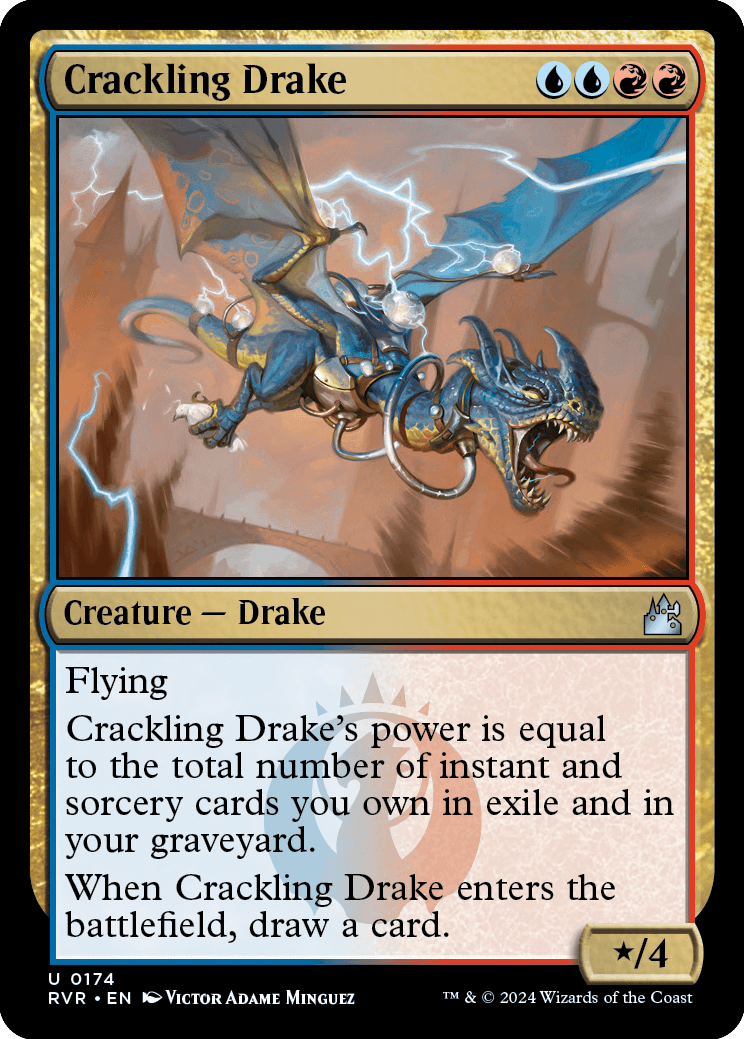
Crackling Drake
{U}{U}{R}{R}
Creature — Drake
*/4
Flying
Crackling Drake's power is equal to the total number of instant and sorcery cards you own in exile and in your graveyard.
When Crackling Drake enters the battlefield, draw a card.
- If any exiled cards you own are face down, they have no characteristics. If they're normally instants or sorceries, they won't be counted.
- The ability that defines Crackling Drake's power works in all zones.
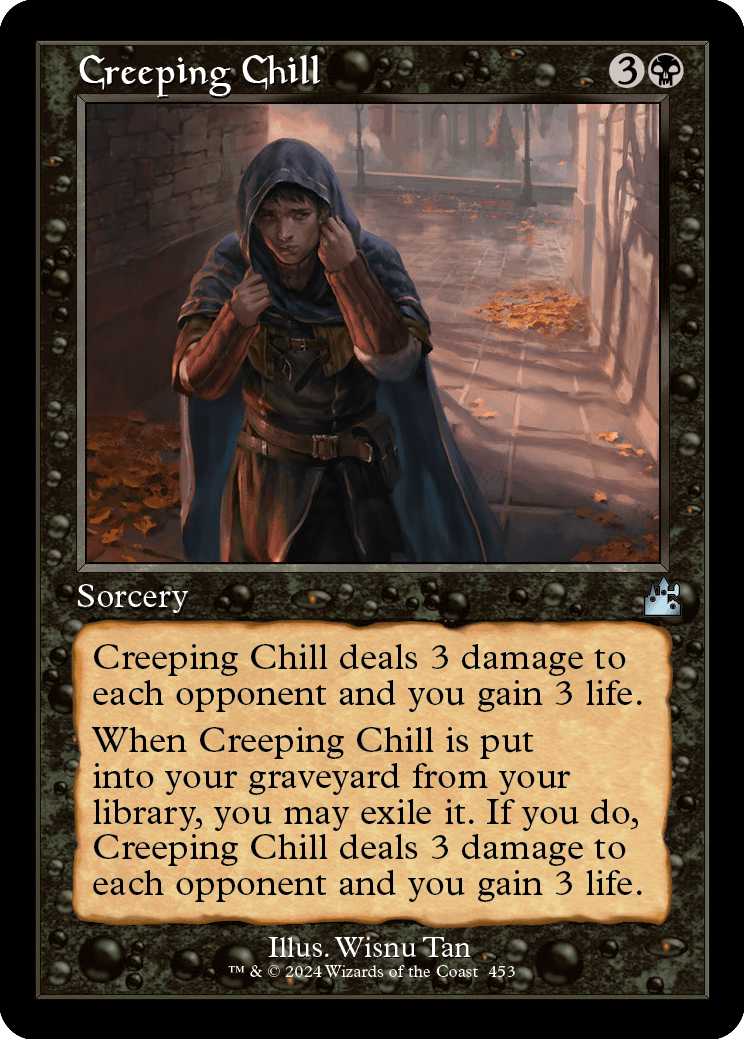
Creeping Chill
{3}{B}
Sorcery
Creeping Chill deals 3 damage to each opponent and you gain 3 life.
When Creeping Chill is put into your graveyard from your library, you may exile it. If you do, Creeping Chill deals 3 damage to each opponent and you gain 3 life.
- In a Two-Headed Giant game, Creeping Chill causes the opposing team to lose 6 life and you to gain 3 life.
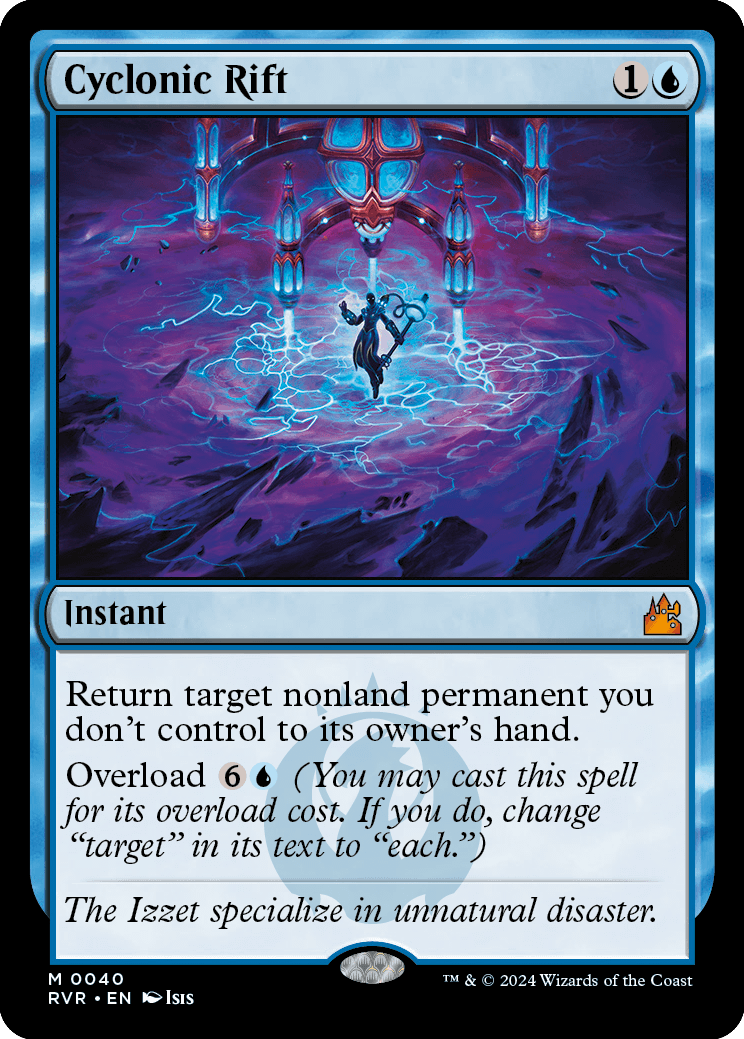
Cyclonic Rift
{1}{U}
Instant
Return target nonland permanent you don't control to its owner's hand.
Overload {6}{U} (You may cast this spell for its overload cost. If you do, change "target" in its text to "each.")
- If you don't pay the overload cost of Cyclonic Rift, that spell will have a single target. If you pay the overload cost, the spell won't have any targets.
- Because a spell with overload doesn't target when its overload cost is paid, it may affect permanents with hexproof or with protection from the appropriate color.
- To determine the total cost of a spell, start with the mana cost or alternative cost you're paying (such as an overload cost), add any cost increases, then apply any cost reductions. The mana value of the spell remains unchanged, no matter what the total cost to cast it was.
- If you are instructed to cast a spell with overload "without paying its mana cost," you can't choose to pay its overload cost instead.
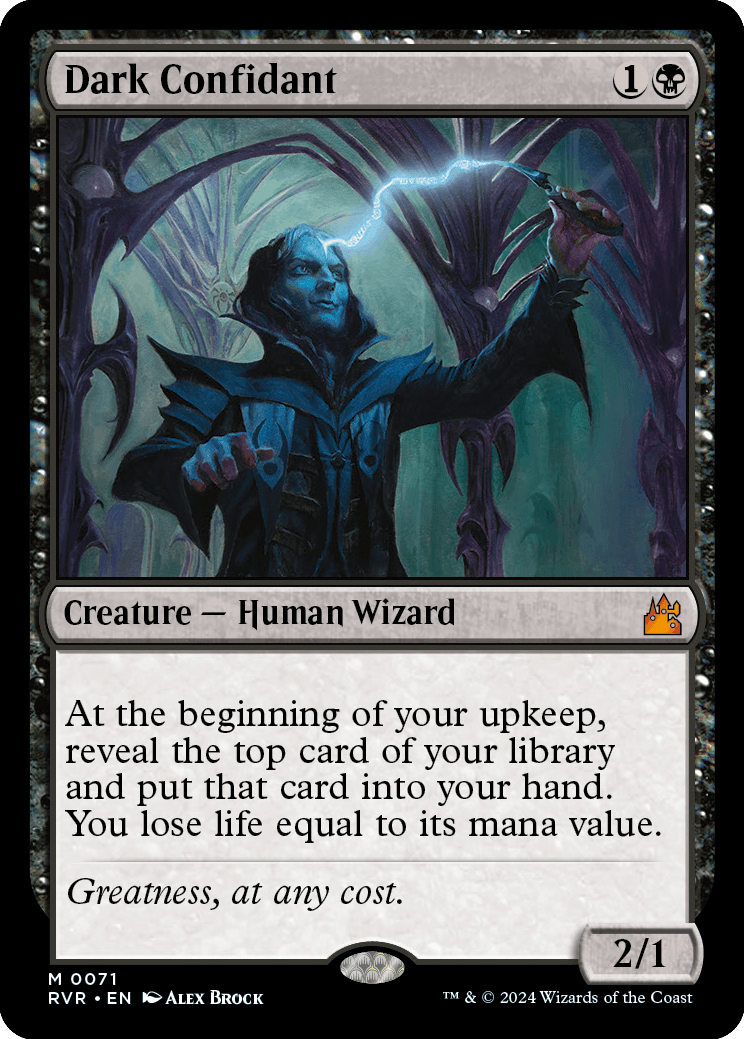
Dark Confidant
{1}{B}
Creature — Human Wizard
2/1
At the beginning of your upkeep, reveal the top card of your library and put that card into your hand. You lose life equal to its mana value.
- If a card in a player's library has {X} in its mana cost, X is considered to be 0.
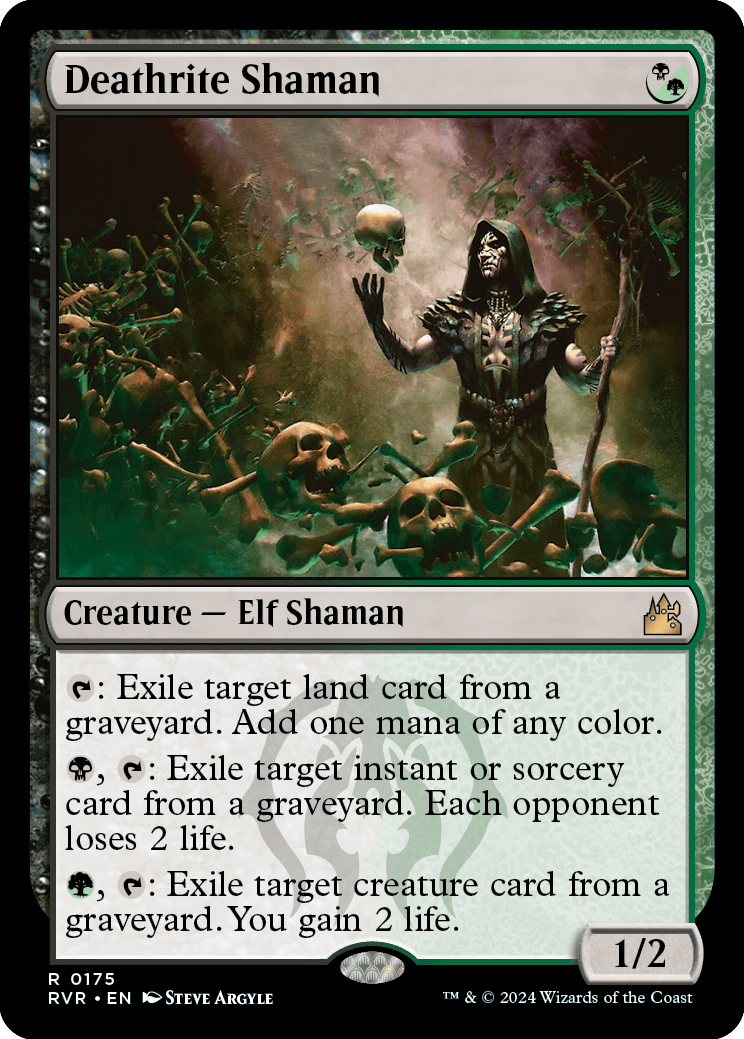
Deathrite Shaman
{B/G}
Creature — Elf Shaman
1/2
{T}: Exile target land card from a graveyard. Add one mana of any color.
{B}, {T}: Exile target instant or sorcery card from a graveyard. Each opponent loses 2 life.
{G}, {T}: Exile target creature card from a graveyard. You gain 2 life.
- Because the first ability requires a target, it is not a mana ability. It uses the stack and can be responded to.
- If the target of any of Deathrite Shaman's three abilities is an illegal target when that ability tries to resolve, it won't resolve and none of its effects will happen. You won't add mana, no opponent will lose life, or you won't gain life, as appropriate.
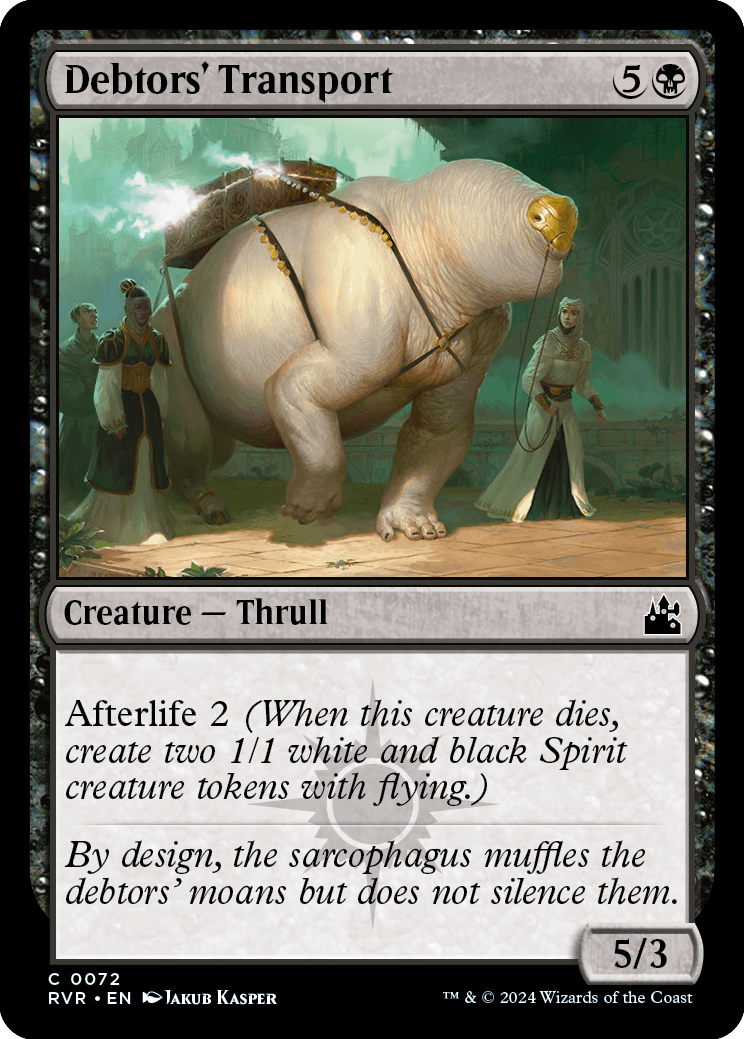
Debtors' Transport
{5}{B}
Creature — Thrull
5/3
Afterlife 2 (When this creature dies, create two 1/1 white and black Spirit creature tokens with flying.)
- Because blockers are chosen all at once, you can't block with a creature with afterlife, wait for it to die, then block with the resulting Spirit tokens.
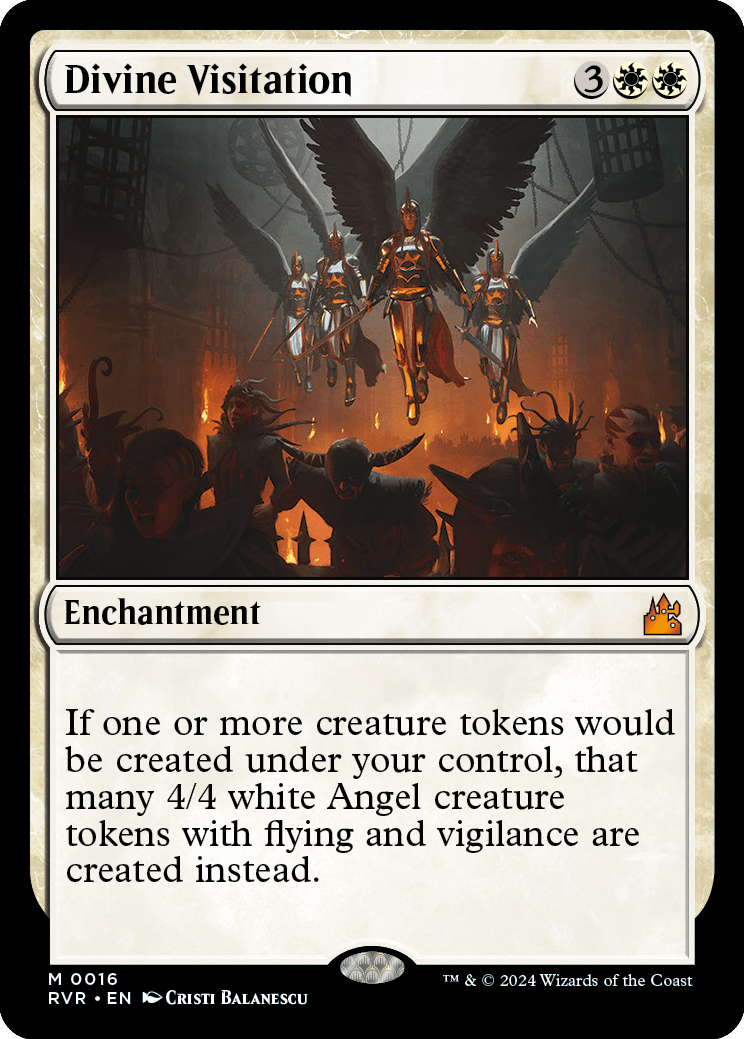
Divine Visitation
{3}{W}{W}
Enchantment
If one or more creature tokens would be created under your control, that many 4/4 white Angel creature tokens with flying and vigilance are created instead.
- The token's characteristics are entirely replaced by a 4/4 white Angel creature token with flying and vigilance. It doesn't have any abilities the token would have been created with. Anything else specified in the effect creating the token (such as tapped, attacking, "That token gains haste," or "Exile that token at end of combat") still applies.
- If you create a noncreature token that will be a creature as it enters the battlefield, perhaps because of an effect such as that of March of the Machines, Divine Visitation's effect doesn't apply to that token's creation. (This is because Divine Visitation's effect modifies how the tokens are created, and March of the Machines's effect doesn't apply until you consider how the tokens are entering the battlefield.)
- If an effect changes under whose control a token would be created, that effect applies before Divine Visitation's effect applies. If an effect changes under whose control a token would enter the battlefield, that effect applies after Divine Visitation's effect is able to be applied.
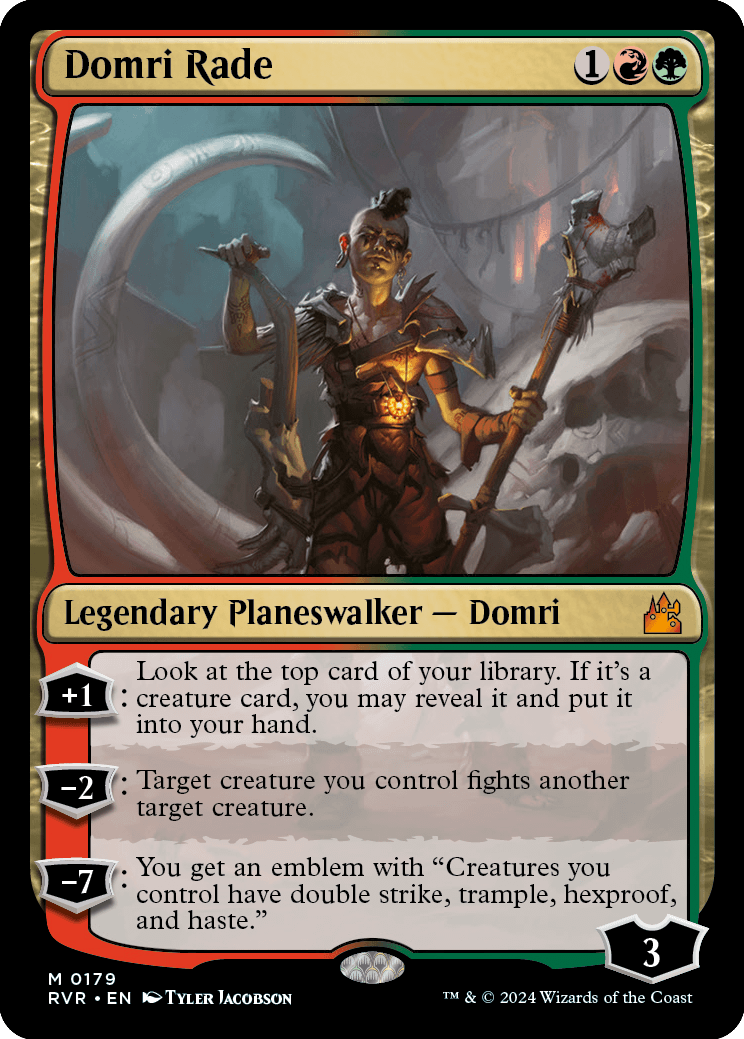
Domri Rade
{1}{R}{G}
Legendary Planeswalker — Domri
3
+1: Look at the top card of your library. If it's a creature card, you may reveal it and put it into your hand.
−2: Target creature you control fights another target creature.
−7: You get an emblem with "Creatures you control have double strike, trample, hexproof, and haste."
- When resolving Domri's first ability, if the card you look at isn't a creature card, or if it's a creature card you don't want to put into your hand, you simply put it back on top of your library. You don't reveal it or say why you're putting it back.
- The second target of Domri's second ability can be another creature you control, but it can't be the same creature as the first target.
- If either target of Domri's second ability is an illegal target when the ability tries to resolve, neither creature will deal or be dealt damage.
- If a creature has both double strike and trample, the combat damage it assigned during the first combat damage step will be considered when determining how much damage can trample through in the second combat damage step. If each creature blocking it is destroyed during the first combat damage step, then all of the damage must be assigned to the defending player, planeswalker, or battle during the second combat damage step.
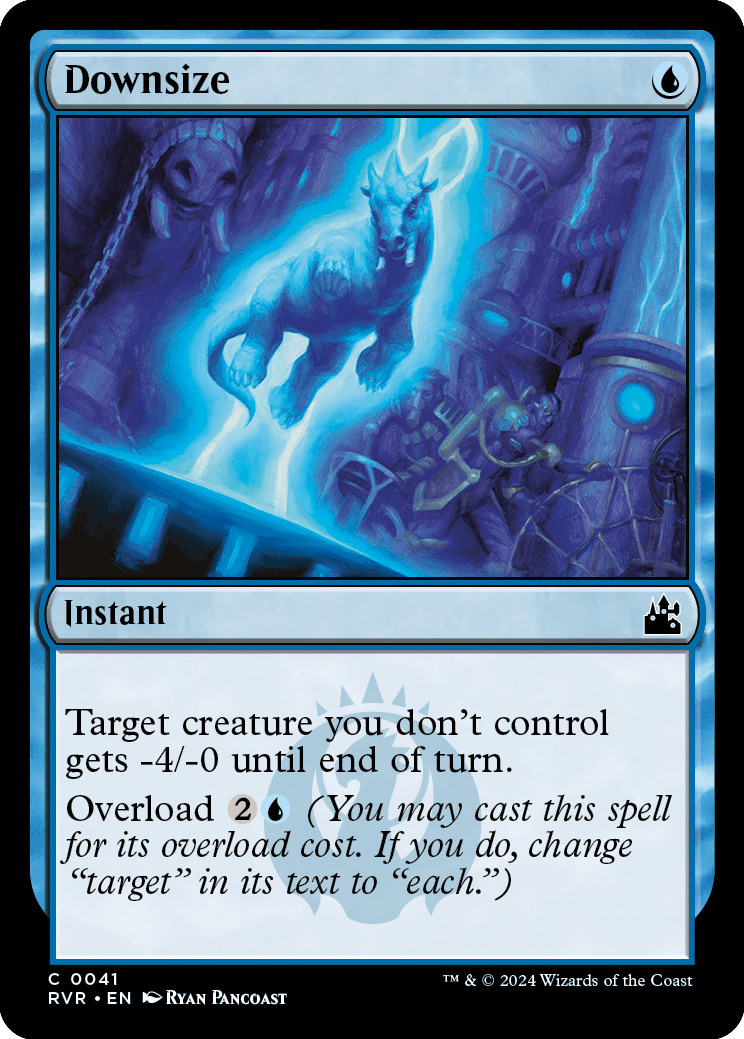
Downsize
{U}
Instant
Target creature you don't control gets -4/-0 until end of turn.
Overload {2}{U} (You may cast this spell for its overload cost. If you do, change "target" in its text to "each.")
- If you don't pay the overload cost of Downsize, that spell will have a single target. If you pay the overload cost, the spell won't have any targets.
- Because a spell with overload doesn't target when its overload cost is paid, it may affect permanents with hexproof or with protection from the appropriate color.
- To determine the total cost of a spell, start with the mana cost or alternative cost you're paying (such as an overload cost), add any cost increases, then apply any cost reductions. The mana value of the spell remains unchanged, no matter what the total cost to cast it was.
- If you are instructed to cast a spell with overload "without paying its mana cost," you can't choose to pay its overload cost instead.
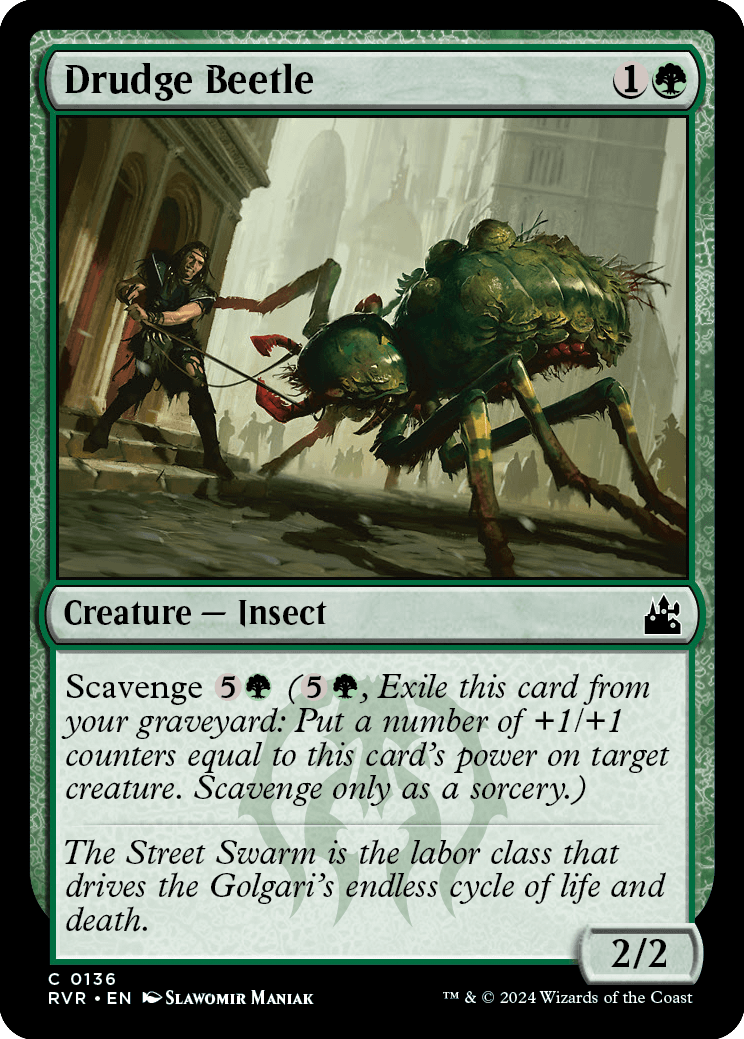
Drudge Beetle
{1}{G}
Creature — Insect
2/2
Scavenge {5}{G} ({5}{G}, Exile this card from your graveyard: Put a number of +1/+1 counters equal to this card's power on target creature. Scavenge only as a sorcery.)
- Exiling the creature card with scavenge is part of the cost of activating the scavenge ability. Once the ability is activated and the cost is paid, it's too late to stop the ability from being activated by trying to remove the creature card from the graveyard.
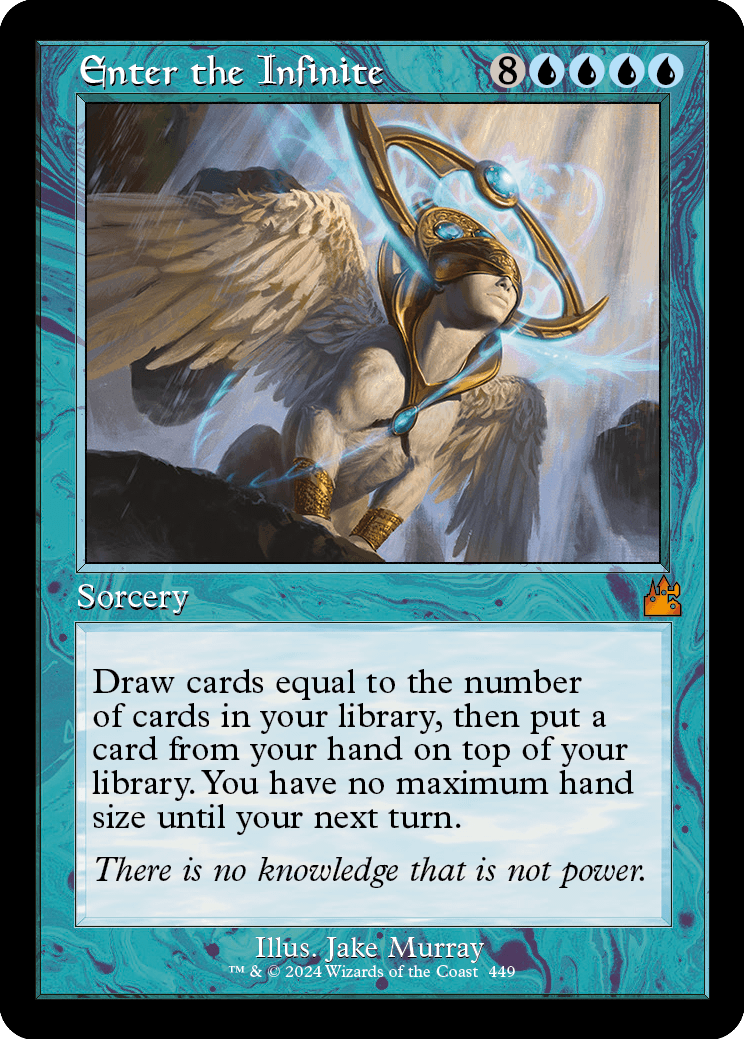
Enter the Infinite
{8}{U}{U}{U}{U}
Sorcery
Draw cards equal to the number of cards in your library, then put a card from your hand on top of your library. You have no maximum hand size until your next turn.
- You won't have to discard any cards during the cleanup step of the turn you cast Enter the Infinite. You will have to discard down to your maximum hand size during the cleanup step of your next turn.
- If you are playing with the top card of your library revealed, you'll reveal each card before you draw it.
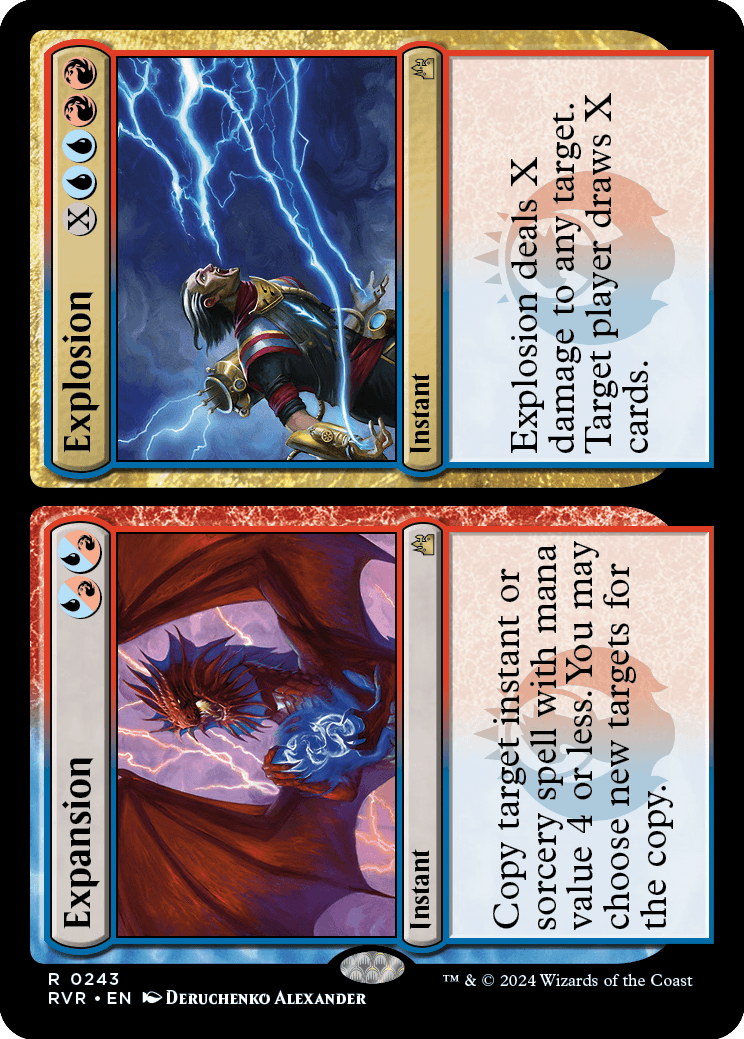
Expansion
{U/R}{U/R}
Instant
Copy target instant or sorcery spell with mana value 4 or less. You may choose new targets for the copy.
///
Explosion
{X}{U}{U}{R}{R}
Instant
Explosion deals X damage to any target. Target player draws X cards.
- Expansion can copy any instant or sorcery spell with an appropriate mana value, not just one with targets.
- If a spell has {X} in its mana cost, include the value chosen for that X when determining the mana value of that spell.
- The copy is created on the stack, so it's not "cast." Abilities that trigger when a player casts a spell won't trigger.
- The copy will have the same targets as the spell it's copying unless you choose new ones. You may change any number of the targets, including all of them or none of them. If, for one of the targets, you can't choose a new legal target, then it remains unchanged (even if the current target is illegal).
- If the spell that's copied is modal (that is, it says "Choose one —" or the like), the copy will have the same mode or modes. You can't choose different ones.
- If the spell has damage divided as it was cast, the division can't be changed (although the targets receiving that damage still can). The same is true of spells that distribute counters.
- The controller of a copy can't choose to pay any alternative or additional costs for the copy. However, effects based on any alternative or additional costs that were paid for the original spell are copied as though those same costs were paid for the copy.
- Any choices made as a spell resolves won't have been made yet once it's copied. Any such choices will be made separately as the copy resolves.
- If you copy a spell, you control the copy. It will resolve before the original spell does.
- If one of Explosion's two targets becomes illegal, the other is affected as appropriate.
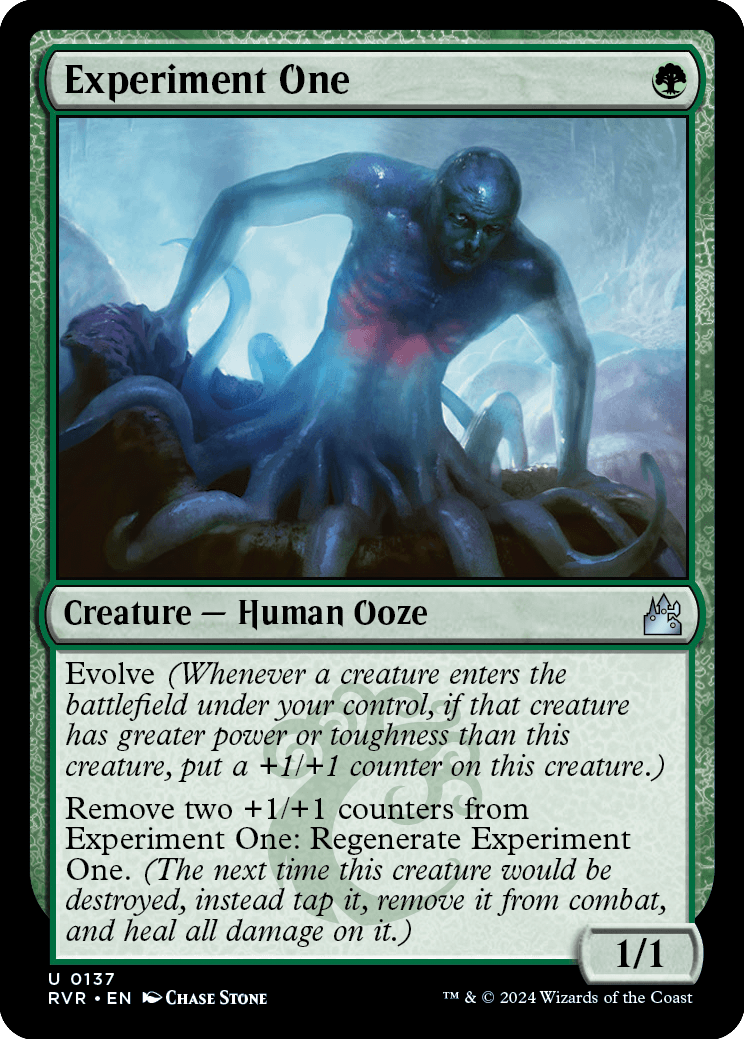
Experiment One
{G}
Creature — Human Ooze
1/1
Evolve (Whenever a creature enters the battlefield under your control, if that creature has greater power or toughness than this creature, put a +1/+1 counter on this creature.)
Remove two +1/+1 counters from Experiment One: Regenerate Experiment One. (The next time this creature would be destroyed, instead tap it, remove it from combat, and heal all damage on it.)
- Because damage remains marked on a creature until it's removed as the turn ends, nonlethal damage dealt to Experiment One may become lethal if you remove +1/+1 counters from it during that turn. In this case, it dies before the activated ability that would regenerate it resolves.
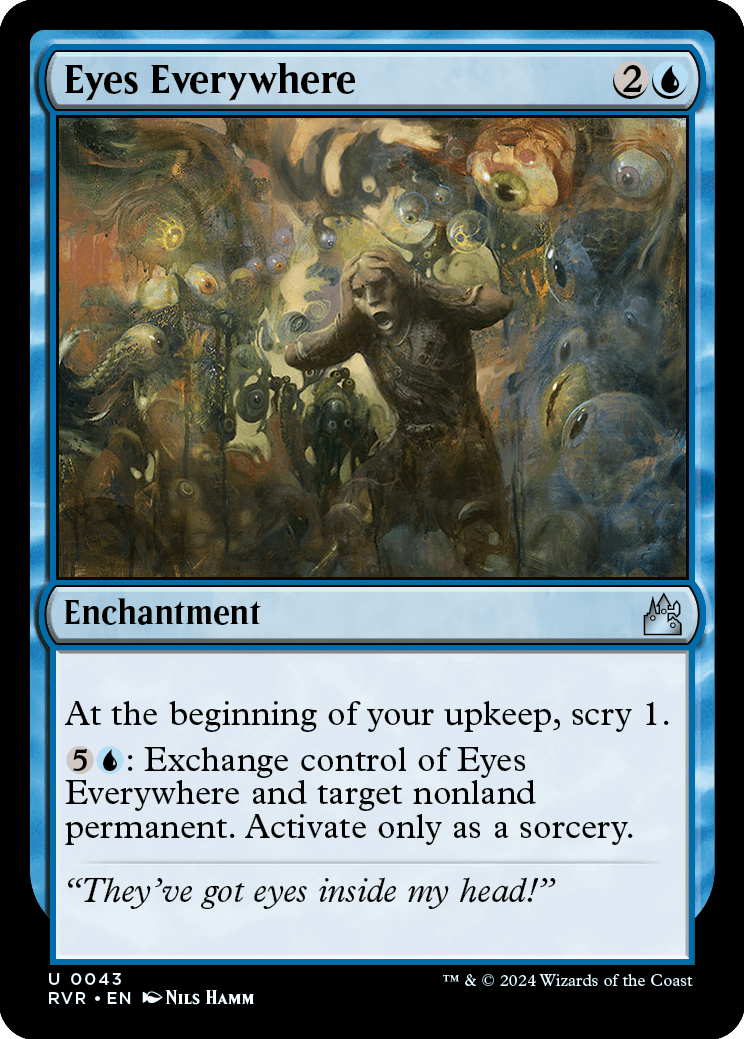
Eyes Everywhere
{2}{U}
Enchantment
At the beginning of your upkeep, scry 1.
{5}{U}: Exchange control of Eyes Everywhere and target nonland permanent. Activate only as a sorcery.
- The effect of Eyes Everywhere's last ability lasts indefinitely. It doesn't wear off during the cleanup step, and it doesn't expire if Eyes Everywhere leaves the battlefield.
- As Eyes Everywhere's last ability resolves, Eyes Everywhere must be on the battlefield and the target nonland permanent must be a legal target. If either of these things isn't true, the ability does nothing.
- In a multiplayer game, if a player leaves the game, all cards that player owns leave as well. If you leave the game, the effect giving you control of the target nonland permanent ends.
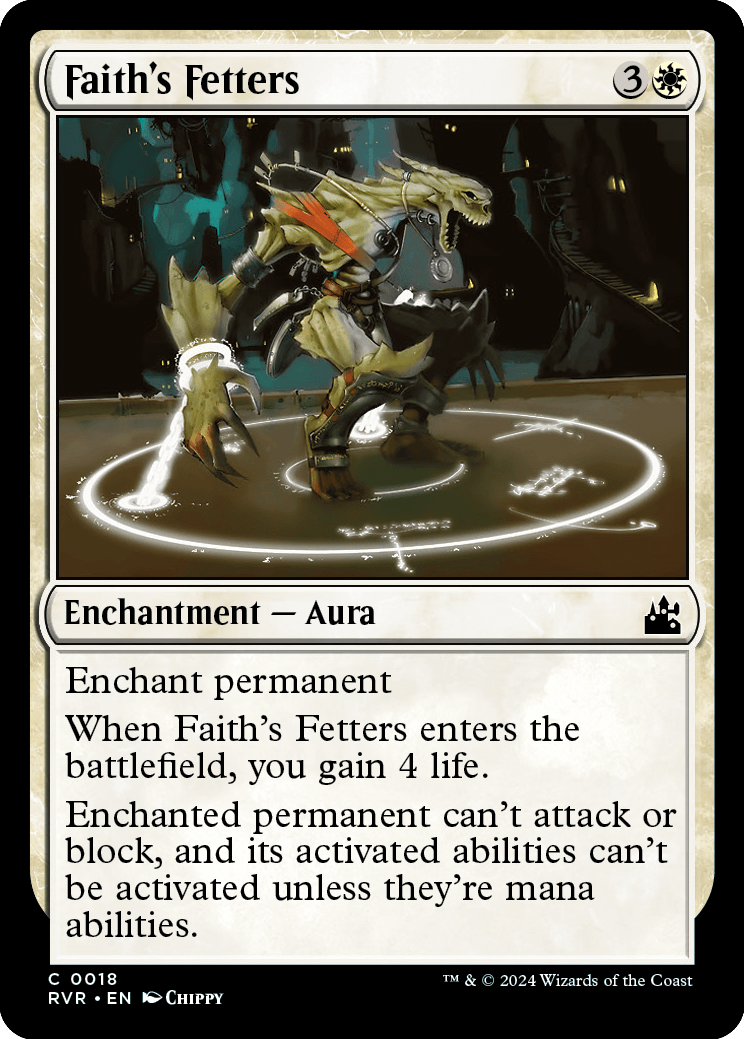
Faith's Fetters
{3}{W}
Enchantment — Aura
Enchant permanent
When Faith's Fetters enters the battlefield, you gain 4 life.
Enchanted permanent can't attack or block, and its activated abilities can't be activated unless they're mana abilities.
- If the target permanent is an illegal target by the time Faith's Fetters tries to resolve, it doesn't resolve. It won't enter the battlefield, so its enters-the-battlefield ability won't trigger.
- Activated abilities contain a colon. They're generally written "[Cost]: [Effect]." Some keywords (such as equip) are activated abilities and will have colons in their reminder text. Loyalty abilities of planeswalkers are activated abilities.
- Faith's Fetters doesn't stop static abilities, triggered abilities, or mana abilities from working. A mana ability is an ability that produces mana, not an ability that costs mana.
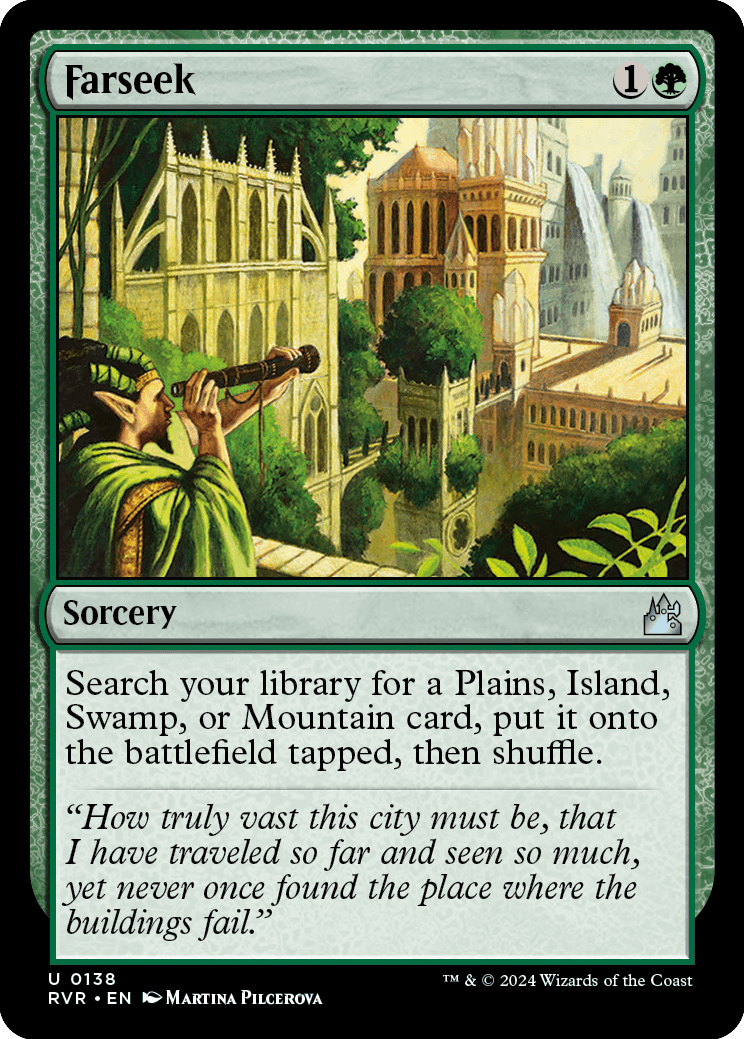
Farseek
{1}{G}
Sorcery
Search your library for a Plains, Island, Swamp, or Mountain card, put it onto the battlefield tapped, then shuffle.
- Farseek can find any land with any of the listed land types, including nonbasic ones, even if that land is a Forest in addition to one or more of those types.
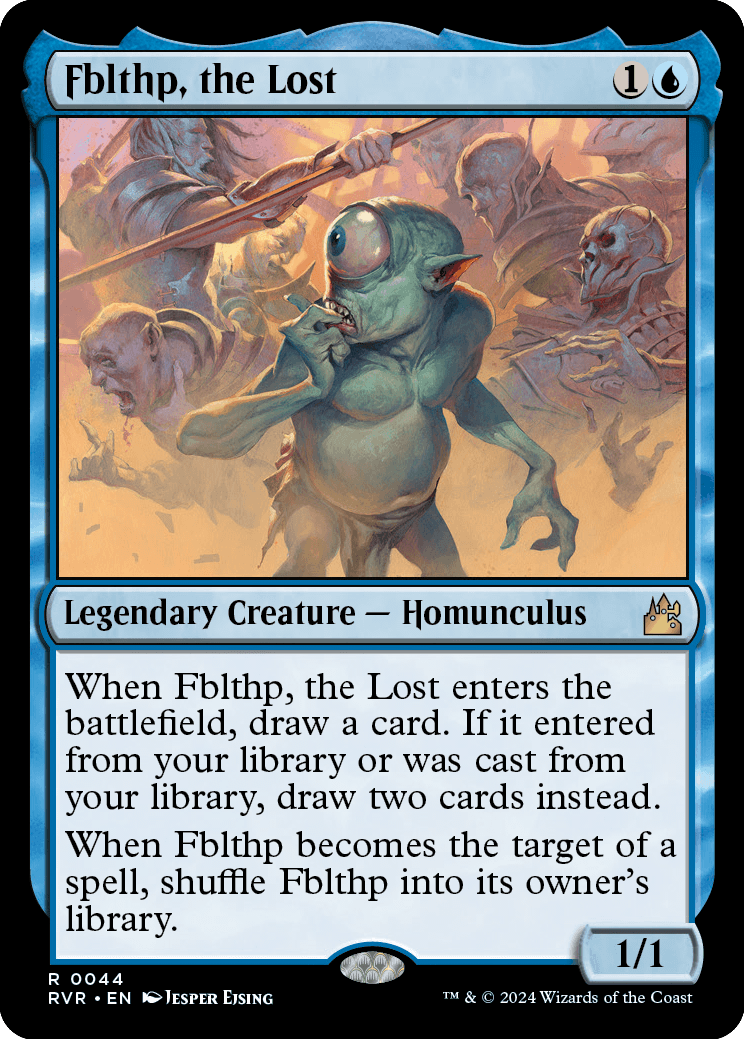
Fblthp, the Lost
{1}{U}
Legendary Creature — Homunculus
1/1
When Fblthp, the Lost enters the battlefield, draw a card. If it entered from your library or was cast from your library, draw two cards instead.
When Fblthp becomes the target of a spell, shuffle Fblthp into its owner's library.
- There's normally no way to cast Fblthp from your library or to have it enter the battlefield from your library. You'll have to use other effects to find Fblthp for the bonus card draw.
- If an effect exiles Fblthp from your library and then lets you cast that card, it's cast from exile, not from your library.
- Fblthp's last ability triggers only if it's on the battlefield when it becomes the target of a spell.
- Fblthp's last ability resolves before the spell that caused it to trigger. It resolves even if that spell is countered.
- If the spell that targets Fblthp has no other targets, it won't resolve (because it no longer has a legal target after Fblthp has gotten totally lost in your library).
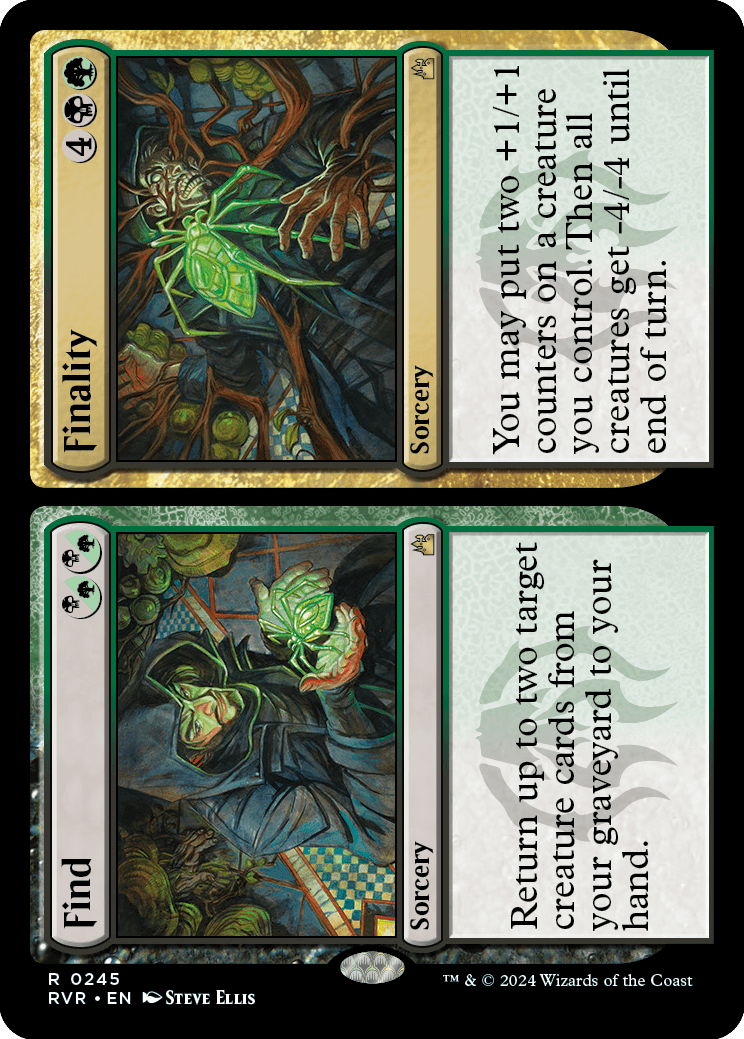
Find
{B/G}{B/G}
Sorcery
Return up to two target creature cards from your graveyard to your hand.
///
Finality
{4}{B}{G}
Sorcery
You may put two +1/+1 counters on a creature you control. Then all creatures get -4/-4 until end of turn.
- Finality doesn't target the creature to receive +1/+1 counters. You can cast it even if you control no creatures.
- Finality affects only creatures on the battlefield at the time it resolves. Creatures that enter the battlefield later in the turn won't get -4/-4.
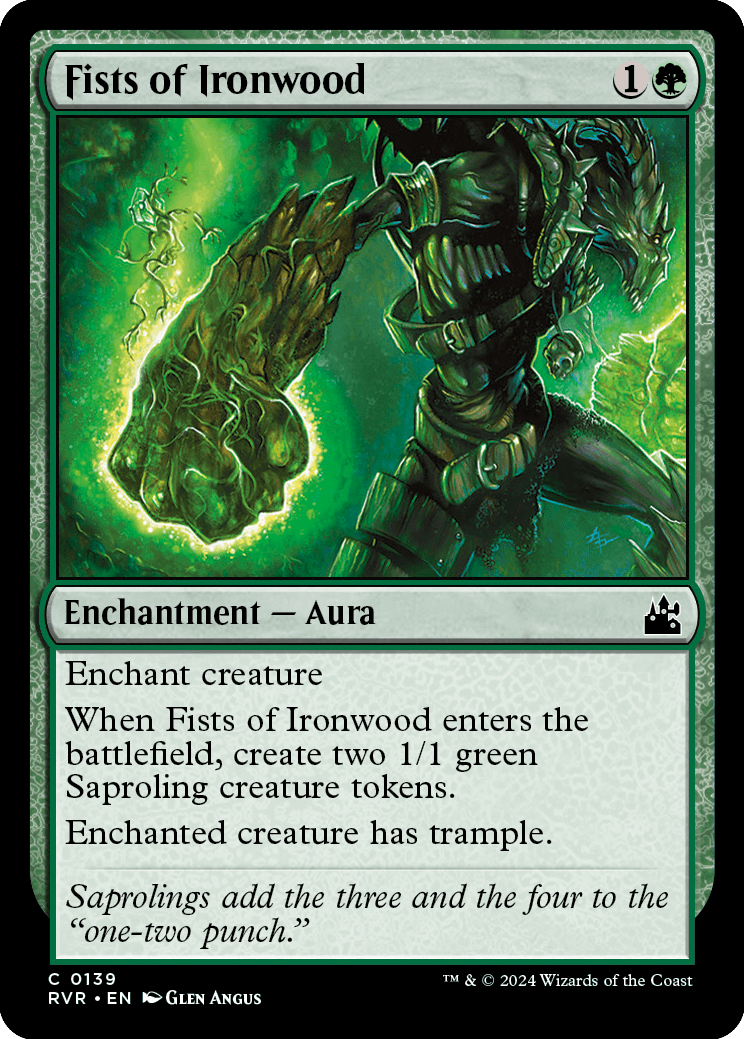
Fists of Ironwood
{1}{G}
Enchantment — Aura
Enchant creature
When Fists of Ironwood enters the battlefield, create two 1/1 green Saproling creature tokens.
Enchanted creature has trample.
- You create the Saproling tokens, even if Fists of Ironwood enters the battlefield attached to another player's creature.
- The Saproling tokens aren't created until after Fists of Ironwood is on the battlefield, so you can't cast Fists of Ironwood on one of those tokens.
- If the target creature is an illegal target when Fists of Ironwood tries to resolve, Fists of Ironwood won't resolve and won't enter the battlefield. You won't create Saproling tokens.
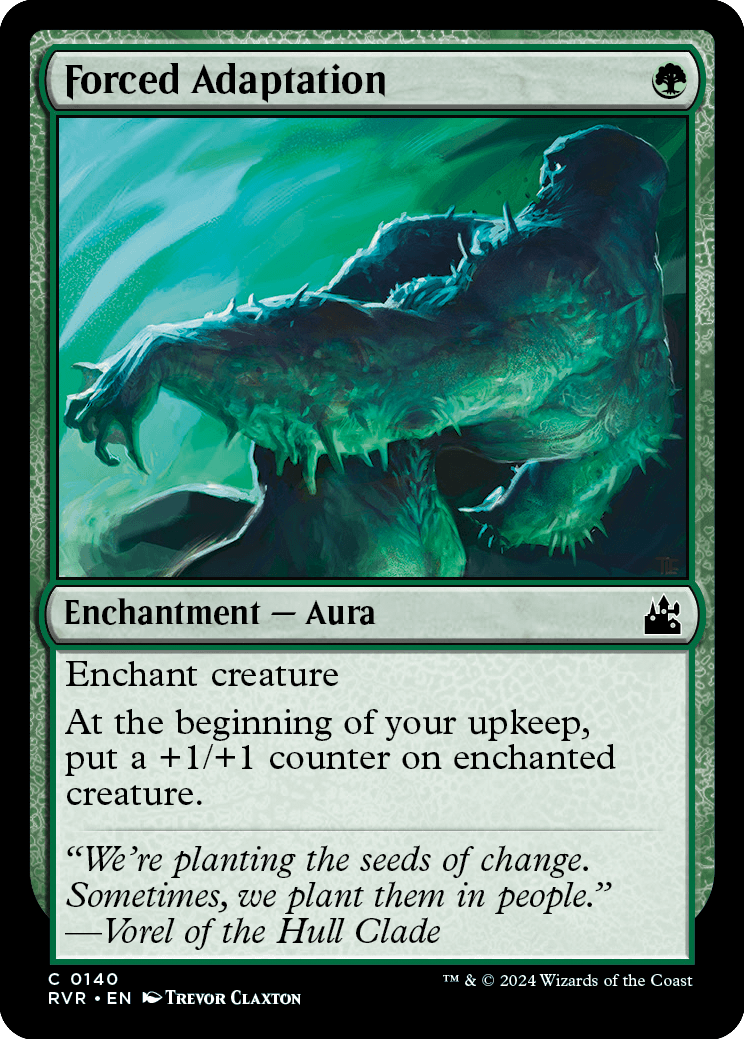
Forced Adaptation
{G}
Enchantment — Aura
Enchant creature
At the beginning of your upkeep, put a +1/+1 counter on enchanted creature.
- The creature that gets the +1/+1 counter is the creature enchanted by Forced Adaptation when the ability resolves.
- If Forced Adaptation's ability triggers but Forced Adaptation isn't on the battlefield when the ability resolves, put a +1/+1 counter on the creature it was enchanting when it left the battlefield.
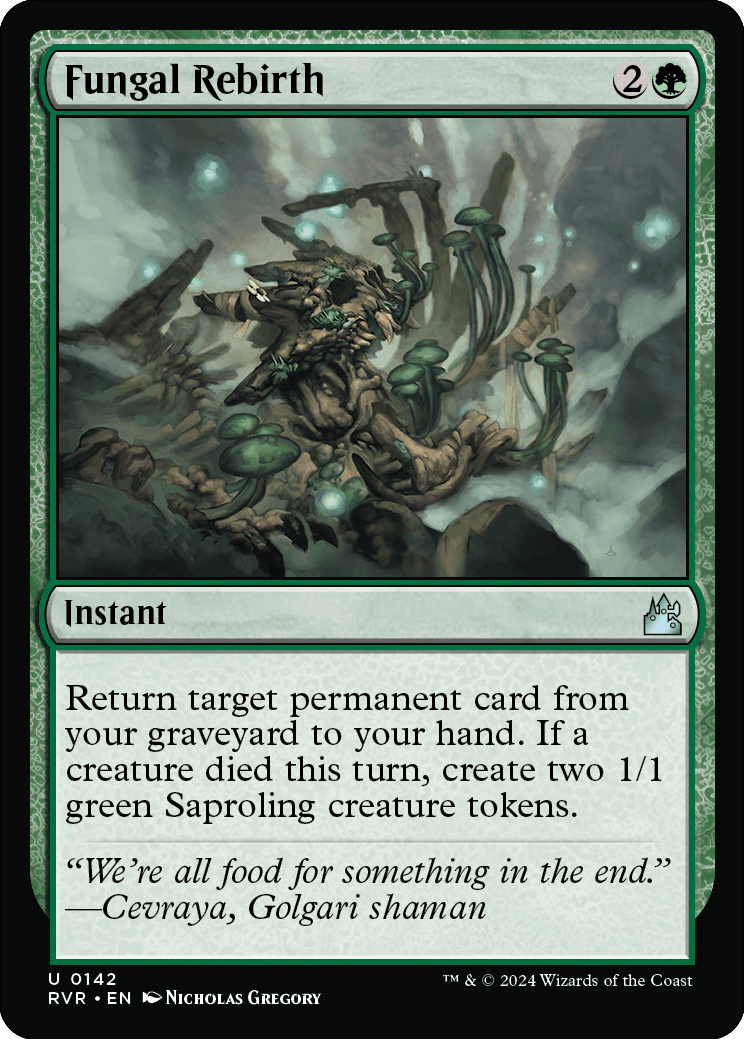
Fungal Rebirth
{2}{G}
Instant
Return target permanent card from your graveyard to your hand. If a creature died this turn, create two 1/1 green Saproling creature tokens.
- A permanent card is an artifact, battle, creature, enchantment, land, or planeswalker card.
- If a creature died this turn, you get Saproling tokens in addition to the permanent card being returned to your hand.
- Fungal Rebirth checks only whether a creature died this turn. It doesn't give you additional Saprolings if more than one creature died.
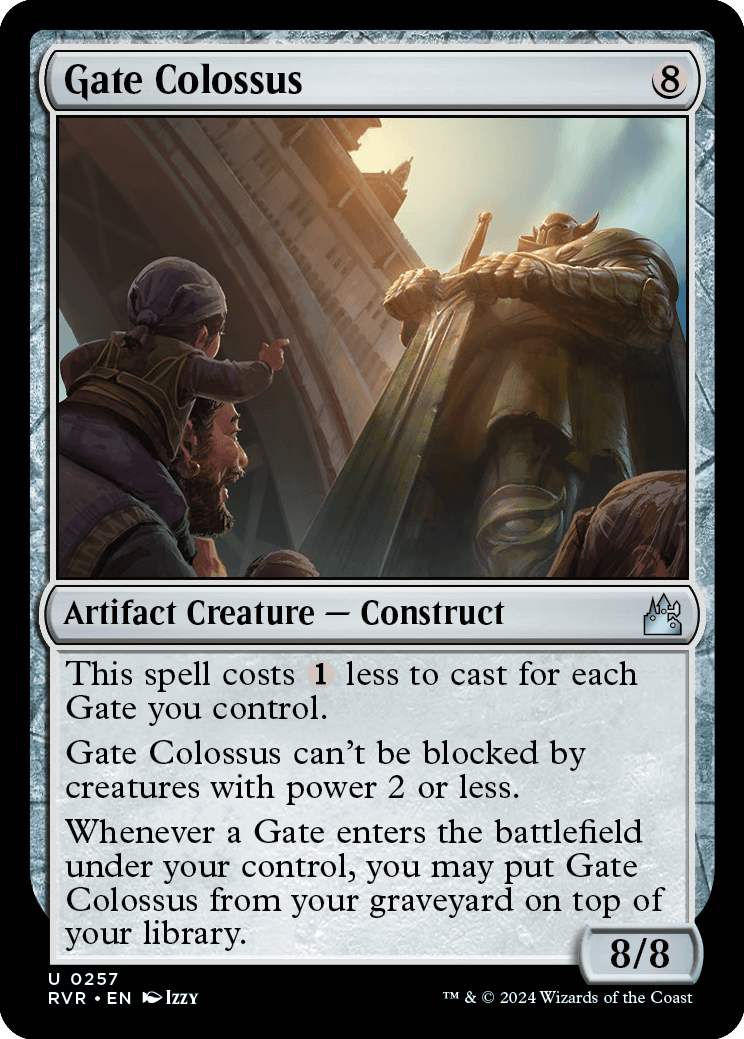
Gate Colossus
{8}
Artifact Creature — Construct
8/8
This spell costs {1} less to cast for each Gate you control.
Gate Colossus can't be blocked by creatures with power 2 or less.
Whenever a Gate enters the battlefield under your control, you may put Gate Colossus from your graveyard on top of your library.
- Once a creature with power 3 or greater has blocked Gate Colossus, changing the power of the blocking creature won't cause Gate Colossus to become unblocked.
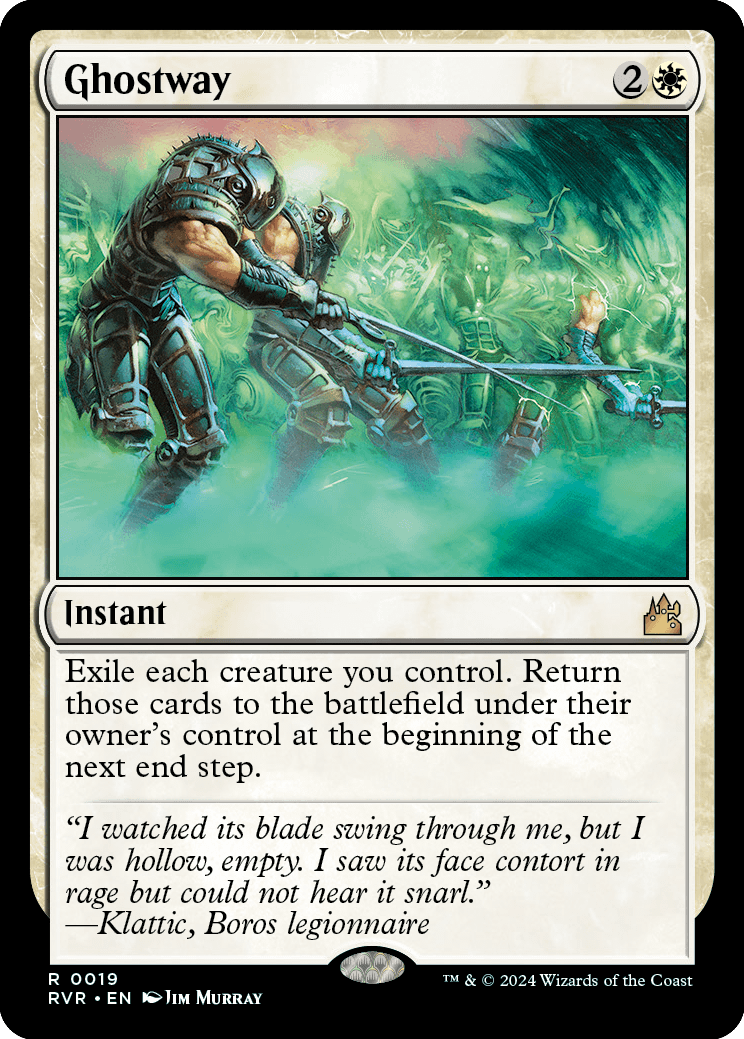
Ghostway
{2}{W}
Instant
Exile each creature you control. Return those cards to the battlefield under their owner's control at the beginning of the next end step.
- Auras attached to the exiled creatures will be put into their owners' graveyards. Equipment attached to the exiled creatures will become unattached and remain on the battlefield. Any counters on the exiled creatures will cease to exist.
- If a creature token is exiled, it ceases to exist. It won't be returned to the battlefield.
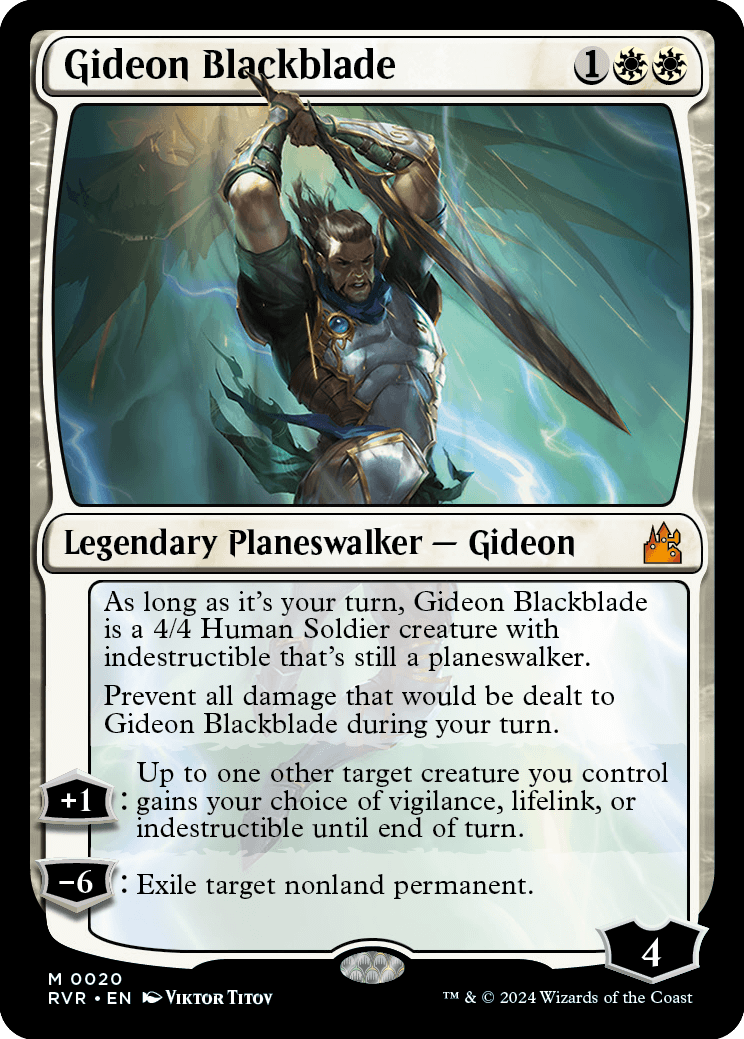
Gideon Blackblade
{1}{W}{W}
Legendary Planeswalker — Gideon
4
As long as it's your turn, Gideon Blackblade is a 4/4 Human Soldier creature with indestructible that's still a planeswalker.
Prevent all damage that would be dealt to Gideon Blackblade during your turn.
+1: Up to one other target creature you control gains your choice of vigilance, lifelink, or indestructible until end of turn.
−6: Exile target nonland permanent.
- If an effect causes Gideon to lose all abilities during your turn, he's still a Human Soldier creature and a Gideon planeswalker. This is because his first ability applies before that ability is lost.
- If an Equipment becomes attached to Gideon while he's a creature, it'll become unattached during the next upkeep that isn't yours. The same is true of any Auras that become attached to Gideon that can't enchant a noncreature planeswalker.
- Any counters that are put on Gideon remain on him while he's not a creature, even if they have no effect on a noncreature planeswalker.
- If damage that can't be prevented is dealt to Gideon during your turn, that damage will have all applicable results: specifically, the damage is marked on Gideon (since he's a creature) and that damage causes that many loyalty counters to be removed from him (since he's a planeswalker). Even though he has indestructible, if Gideon has no loyalty counters on him, he's put into his owner's graveyard.
- You choose which ability the target creature gains as Gideon's first loyalty ability resolves, not as you activate it.
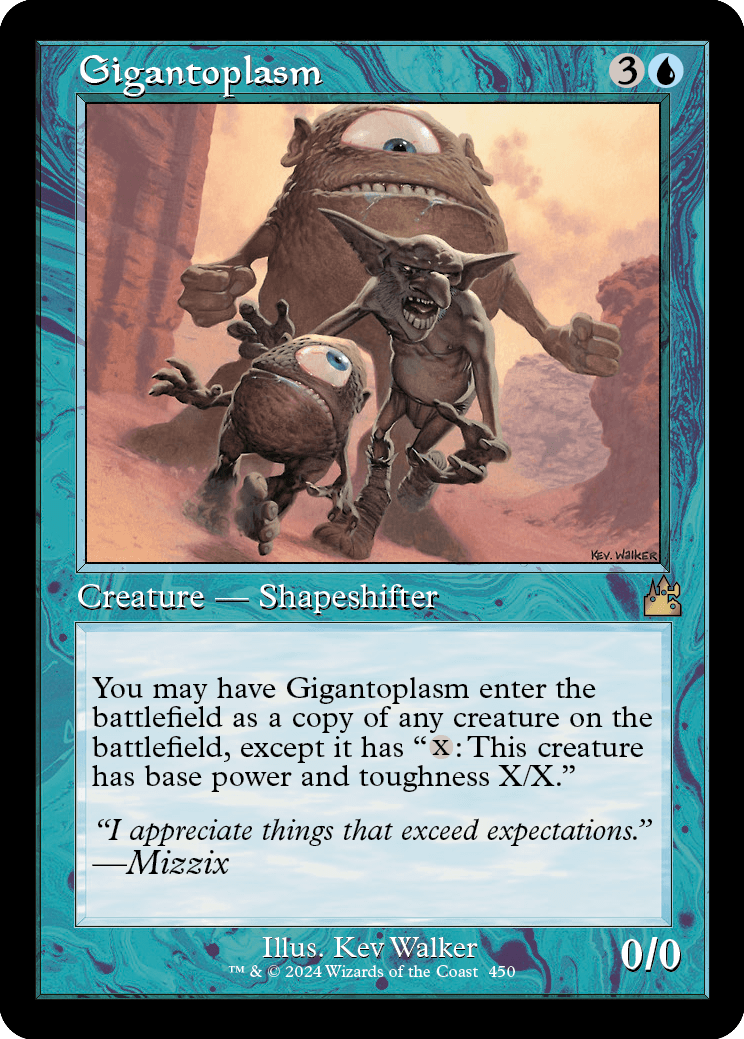
Gigantoplasm
{3}{U}
Creature — Shapeshifter
0/0
You may have Gigantoplasm enter the battlefield as a copy of any creature on the battlefield, except it has "{X}: This creature has base power and toughness X/X."
- The activated ability Gigantoplasm gives itself becomes part of its copiable values. Unless the ability is overwritten by another copy effect, a creature that's a copy of Gigantoplasm will have that ability.
- However, the effect of that ability isn't copiable. That is, if Gigantoplasm is a copy of a creature with base power and toughness 2/2 and you activate its ability making it a 4/4 creature, another creature that becomes a copy of Gigantoplasm will have base power and toughness 2/2.
- The activated ability that Gigantoplasm gives itself doesn't have a duration. It lasts until Gigantoplasm leaves the battlefield or another effect overwrites it (for example, if you activate the ability again once you have more mana available). Each time the ability resolves, it will overwrite any previous effects that set its power and toughness, including previous activations of the ability. Effects that otherwise modify Gigantoplasm's power and/or toughness, including +1/+1 counters, will still apply no matter when they took effect.
- Gigantoplasm copies exactly what was printed on the original creature and nothing more (unless that creature is copying something else or is a token; see below). It doesn't copy whether that creature is tapped or untapped, whether it has any counters on it or Auras attached to it, or any non-copy effects that have changed its power, toughness, types, color, etc.
- If Gigantoplasm isn't a creature (perhaps because it copied a land that had temporarily become a creature), you can still activate the ability "{X}: This creature has base power and toughness X/X." However, this ability won't have any effect, and it won't turn Gigantoplasm into a creature.
- If the chosen creature has {X} in its mana cost, X is 0. The ability that Gigantoplasm gives itself doesn't affect an {X} in its mana cost.
- If the chosen creature is copying something else (for example, if the chosen creature is another Gigantoplasm), then Gigantoplasm enters the battlefield as whatever the chosen creature was copying (plus any abilities it gained as part of the copy process, if applicable).
- If the chosen creature is a token, Gigantoplasm copies the original characteristics of that token as stated by the effect that created the token. Gigantoplasm isn't a token, even if it's copying one.
- Any enters-the-battlefield abilities of the copied creature will trigger when Gigantoplasm enters the battlefield. Any "as [this creature] enters the battlefield" or "[this creature] enters the battlefield with" abilities of the chosen creature will also work.
- If Gigantoplasm somehow enters the battlefield at the same time as another creature, it can't become a copy of that creature. You may choose only a creature that's already on the battlefield.
- You can choose not to copy anything. In that case, Gigantoplasm enters the battlefield as a 0/0 Shapeshifter creature, and is probably put into the graveyard immediately.
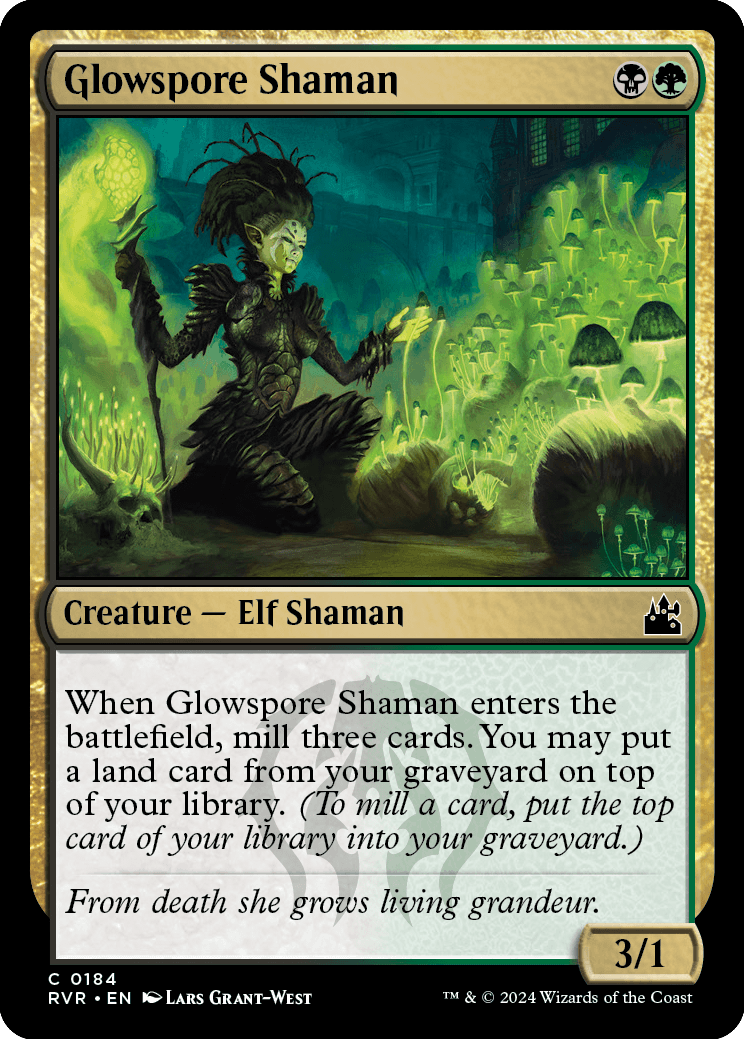
Glowspore Shaman
{B}{G}
Creature — Elf Shaman
3/1
When Glowspore Shaman enters the battlefield, mill three cards. You may put a land card from your graveyard on top of your library. (To mill a card, put the top card of your library into your graveyard.)
- The land card you put on top of your library may be one that you just milled or one that was already there.
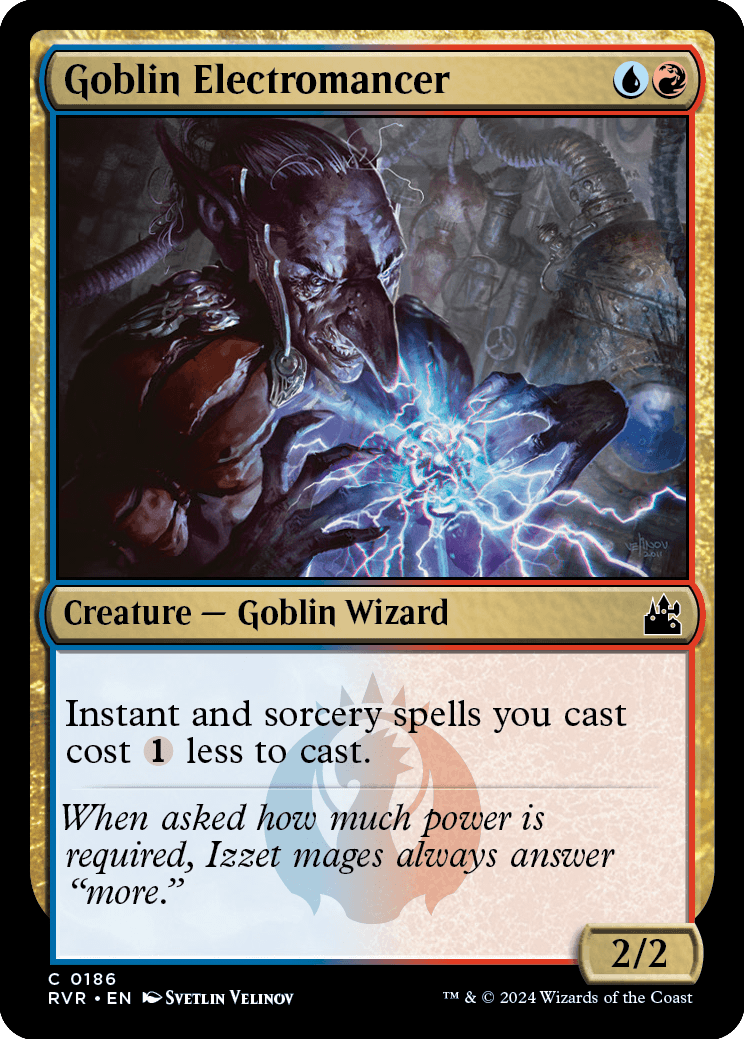
Goblin Electromancer
{U}{R}
Creature — Goblin Wizard
2/2
Instant and sorcery spells you cast cost {1} less to cast.
- Two Goblin Electromancers will make instant and sorcery spells you cast cost {2} less to cast, and so on.
- To determine the total cost of a spell, start with the mana cost or alternative cost you're paying, add any cost increases, then apply any cost reductions. The mana value of the spell remains unchanged, no matter what the total cost to cast it was.
- Goblin Electromancer's effect reduces only generic mana in the spell's total cost.

Golgari Grave-Troll
{4}{G}
Creature — Troll Skeleton
0/0
Golgari Grave-Troll enters the battlefield with a +1/+1 counter on it for each creature card in your graveyard.
{1}, Remove a +1/+1 counter from Golgari Grave-Troll: Regenerate Golgari Grave-Troll.
Dredge 6 (If you would draw a card, you may mill six cards instead. If you do, return this card from your graveyard to your hand.)
- If you return Golgari Grave-Troll from your graveyard directly to the battlefield, its first ability counts itself.
- Because damage remains marked on a creature until it's removed as the turn ends, nonlethal damage dealt to Golgari Grave-Troll may become lethal if you remove +1/+1 counters from it during that turn. In this case, it dies before the activated ability that would regenerate it resolves.
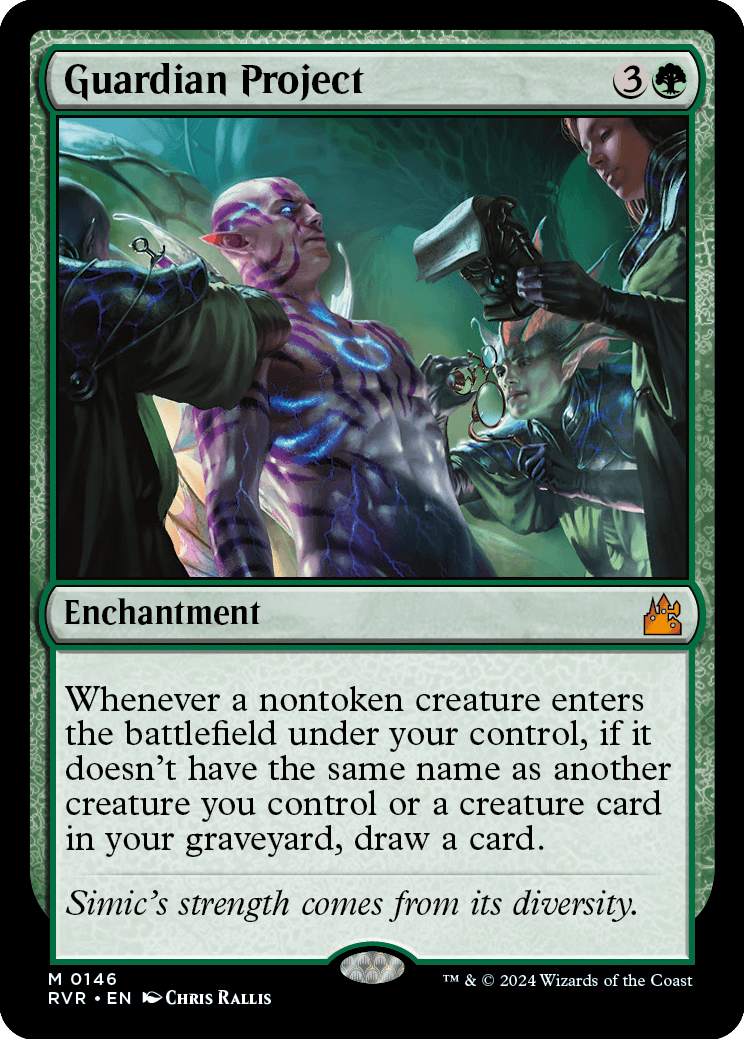
Guardian Project
{3}{G}
Enchantment
Whenever a nontoken creature enters the battlefield under your control, if it doesn't have the same name as another creature you control or a creature card in your graveyard, draw a card.
- Whether the entering creature shares a name with a creature you control or a creature card in your graveyard is checked both as that creature enters and as Guardian Project's ability resolves. If the entering creature isn't the first of its name as it enters, the ability doesn't trigger at all; if its name is shared as the ability resolves, you don't draw a card.
- If the entering creature is put into your graveyard while Guardian Project's ability is on the stack, that same card will be a creature card in your graveyard that shares a name with the creature that was on the battlefield, so you won't draw a card.
- If the entering creature leaves the battlefield and returns while Guardian Project's ability is on the stack, that same card will be a new creature you control that shares a name with the creature that was on the battlefield, so you won't draw a card. However, Guardian Project's ability may trigger for the new creature and you may draw a card as that ability resolves.
- A face-down creature has no name, so it can't share a name with anything. This includes other creatures with no name.
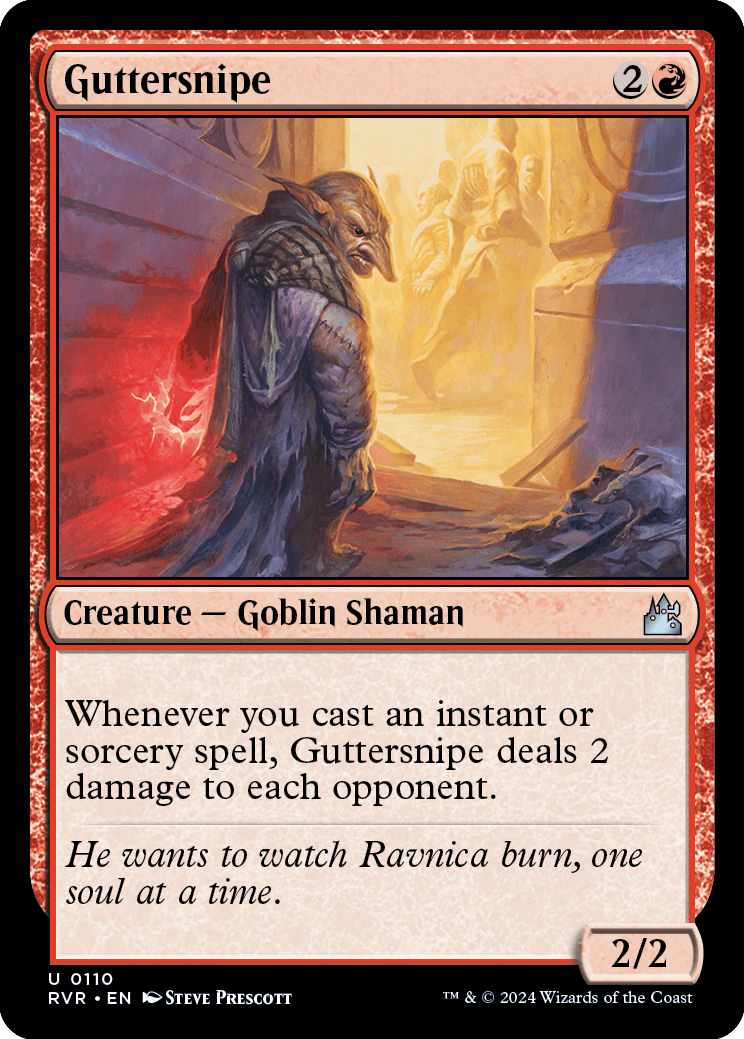
Guttersnipe
{2}{R}
Creature — Goblin Shaman
2/2
Whenever you cast an instant or sorcery spell, Guttersnipe deals 2 damage to each opponent.
- Guttersnipe's triggered ability resolves before the spell that caused it to trigger. It resolves even if that spell is countered.
- In a Two-Headed Giant game, Guttersnipe's ability causes the opposing team to lose 4 life.
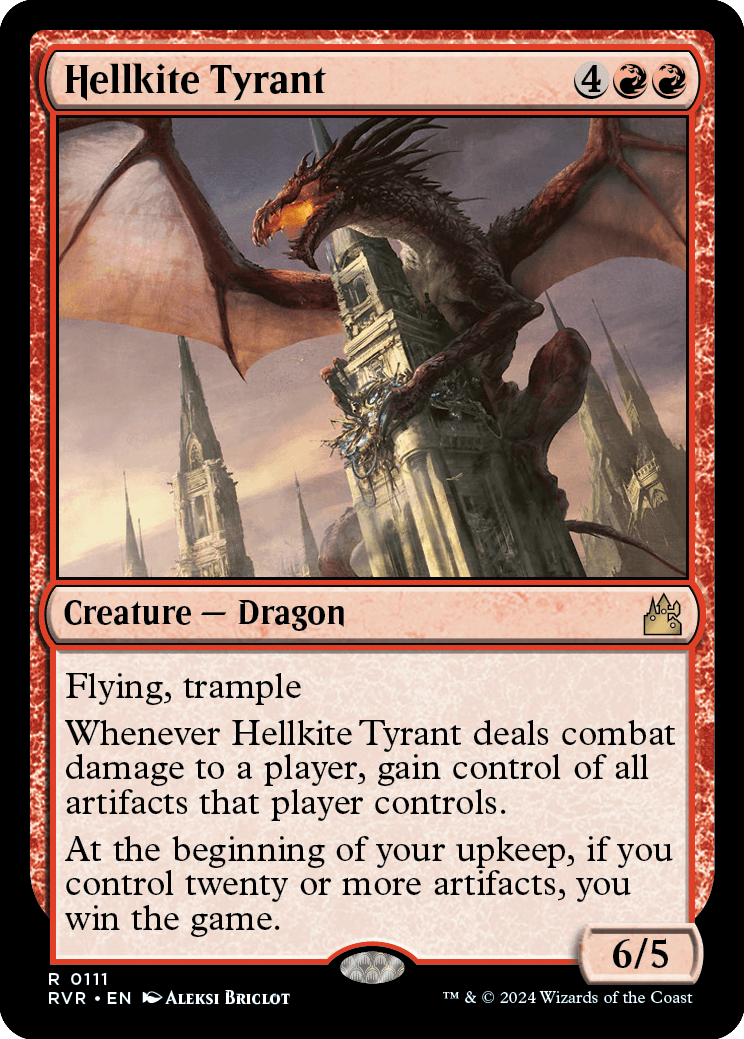
Hellkite Tyrant
{4}{R}{R}
Creature — Dragon
6/5
Flying, trample
Whenever Hellkite Tyrant deals combat damage to a player, gain control of all artifacts that player controls.
At the beginning of your upkeep, if you control twenty or more artifacts, you win the game.
- If you don't control twenty or more artifacts at the beginning of your upkeep, Hellkite Tyrant's last ability won't trigger. If it does trigger, it will check again when it tries to resolve. If you don't control twenty or more artifacts at that time, the ability will do nothing.
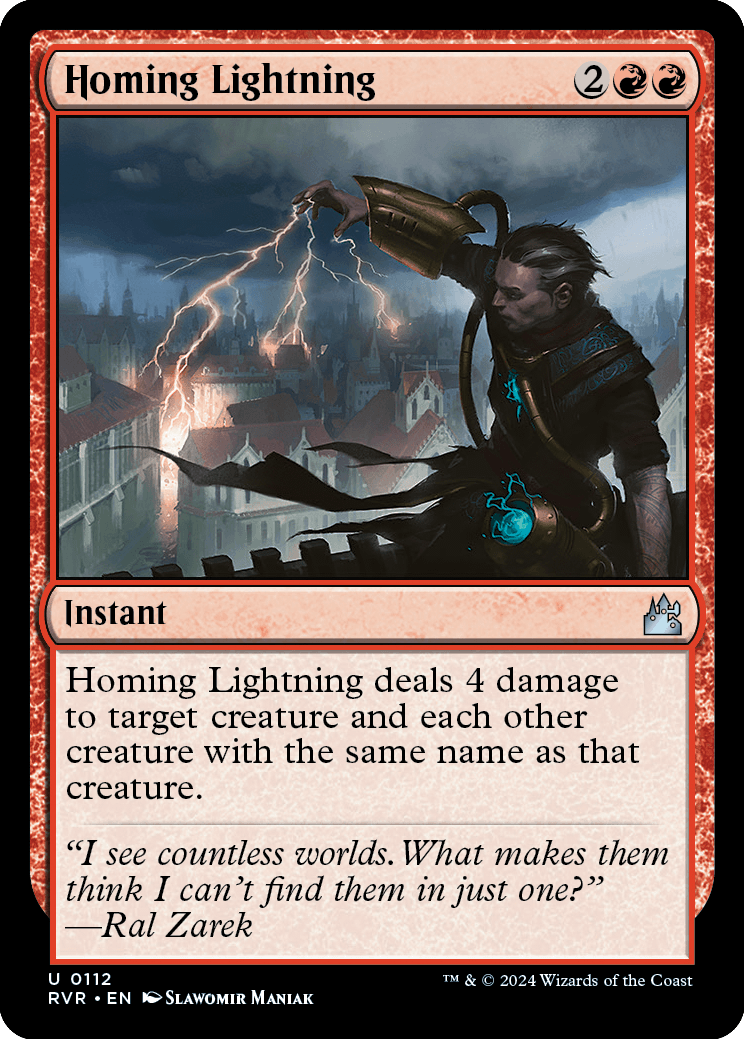
Homing Lightning
{2}{R}{R}
Instant
Homing Lightning deals 4 damage to target creature and each other creature with the same name as that creature.
- Homing Lightning has only one target. Other creatures with that name are not targeted. For example, a creature with hexproof will be dealt damage if it has the same name as the target creature.
- Unless a token is a copy of another permanent or was explicitly given a name by the effect that created it, its name is the subtypes it was given when it was created plus the word "Token." For example, if an effect creates a 1/1 Soldier creature token, that token is named "Soldier Token."
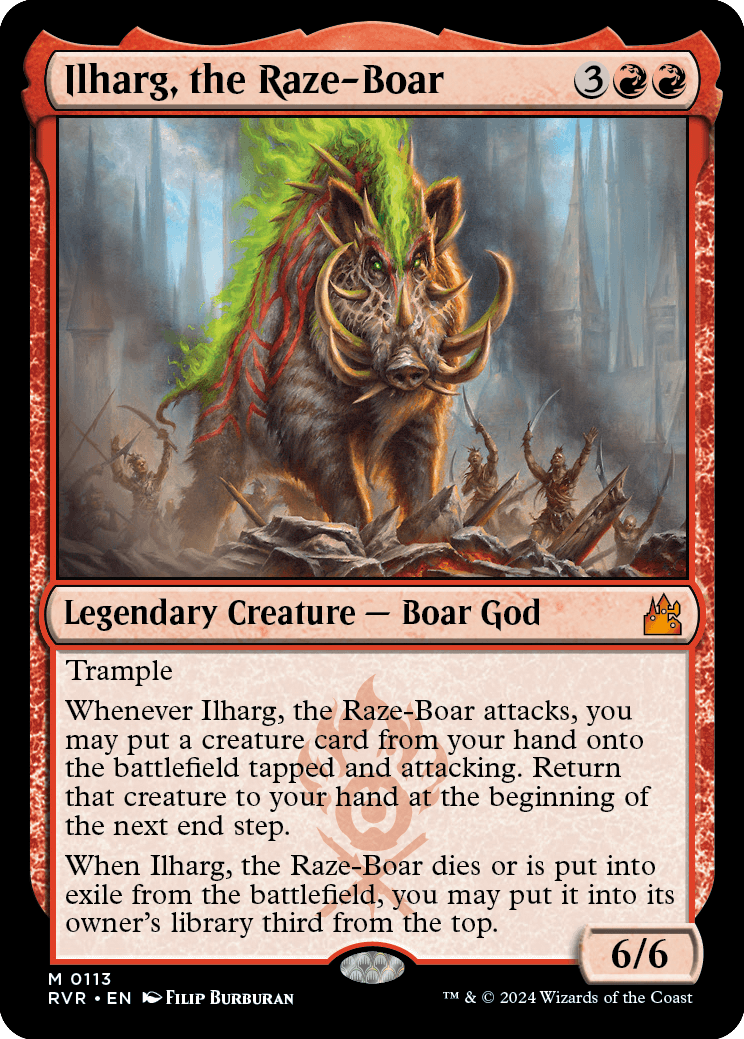
Ilharg, the Raze-Boar
{3}{R}{R}
Legendary Creature — Boar God
6/6
Trample
Whenever Ilharg, the Raze-Boar attacks, you may put a creature card from your hand onto the battlefield tapped and attacking. Return that creature to your hand at the beginning of the next end step.
When Ilharg, the Raze-Boar dies or is put into exile from the battlefield, you may put it into its owner's library third from the top.
- You choose which player, planeswalker, or battle the new creature is attacking. It doesn't have to be attacking the same player, planeswalker, or battle that Ilharg is attacking.
- Although the new creature is attacking, it was never declared as an attacking creature (for the purposes of abilities that trigger whenever a creature attacks, such as that of Makeshift Battalion).
- If the new creature leaves the battlefield before the end step, most likely because it died in combat, that card remains in its current zone. It won't return to your hand.
- If the new creature has an ability that triggers at the beginning of the end step, that ability will trigger and resolve even if the creature is returned to your hand during the end step before that ability resolves.
- If Ilharg leaves the graveyard or exile while its last ability is on the stack, it will remain in its new zone, even if that zone is a graveyard or exile.
- If Ilharg's owner has two or fewer cards in their library, it's put on the bottom of their library as its last ability resolves.
- If you control another player's Ilharg when it dies, you decide whether to put that card into its owner's library.
- If an effect exiles Ilharg and immediately returns it to the battlefield, its last ability triggers but will have no effect. However, if an effect exiles it and would return it to the battlefield at a later time, Ilharg's ability may return that card to its owner's library first. If it does, the effect that exiled it won't return it later.
- In a multiplayer game, if you put another player's Ilharg onto the battlefield under your control, it will be exiled as you leave the game. If you were still the controller of that Ilharg, you would control its triggered ability but you have left the game; that ability won't resolve and the card remains in exile. Similarly, if you lose the game at the same time that another player's Ilharg that you put onto the battlefield is destroyed, it remains in its owner's graveyard.
- If Ilharg dies and it's your commander, you may put it into the command zone before its ability puts it into your library. If you save your commander this way, it won't be put it into your library. The same is true if it would be exiled.
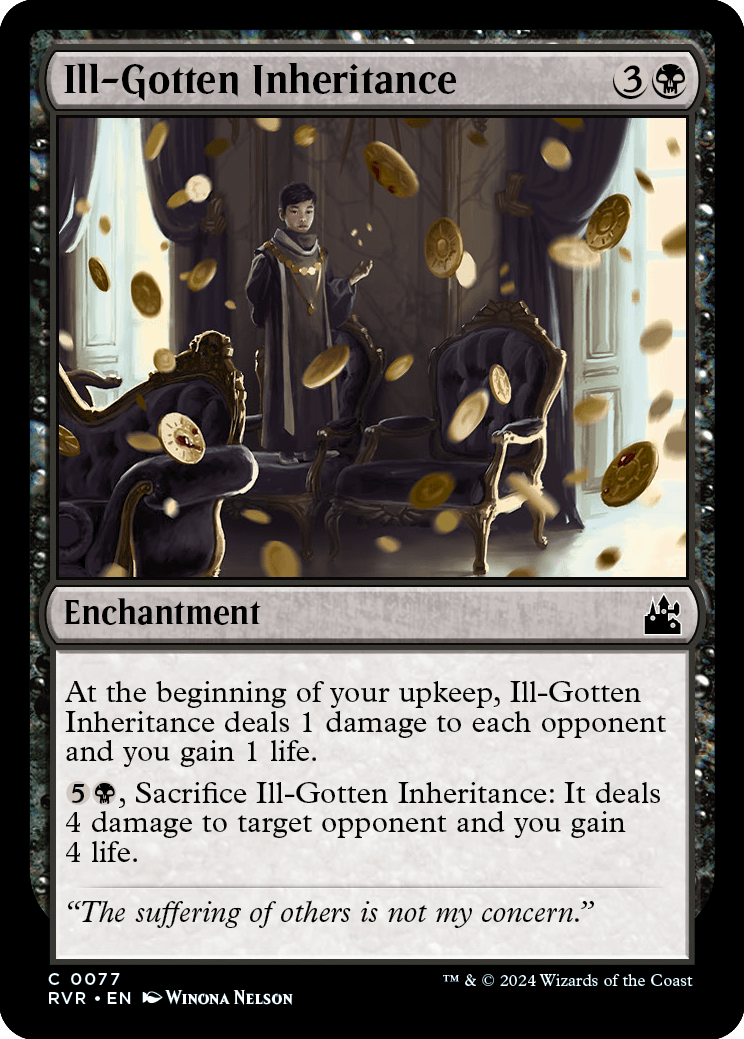
Ill-Gotten Inheritance
{3}{B}
Enchantment
At the beginning of your upkeep, Ill-Gotten Inheritance deals 1 damage to each opponent and you gain 1 life.
{5}{B}, Sacrifice Ill-Gotten Inheritance: It deals 4 damage to target opponent and you gain 4 life.
- In a Two-Headed Giant game, Ill-Gotten Inheritance's first ability causes the opposing team to lose 2 life and you gain 1 life.
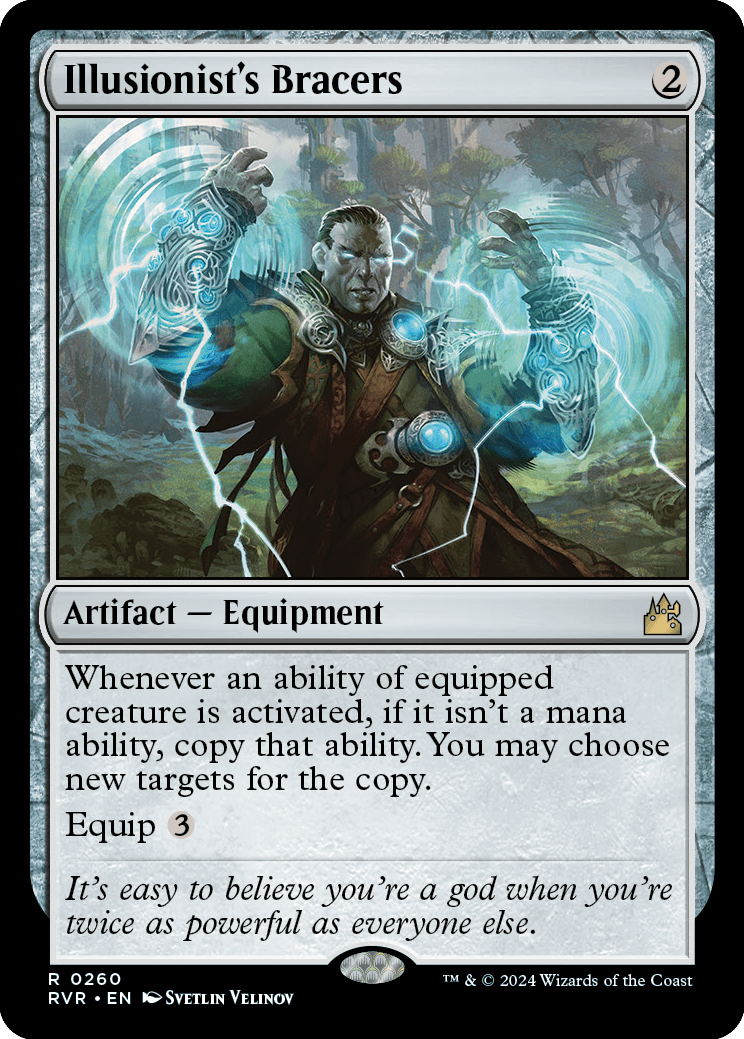
Illusionist's Bracers
{2}
Artifact — Equipment
Whenever an ability of equipped creature is activated, if it isn't a mana ability, copy that ability. You may choose new targets for the copy.
Equip {3}
- Activated abilities contain a colon. They're generally written "[Cost]: [Effect]." Some keywords are activated abilities and will have colons in their reminder text.
- The copy will have the same targets as the ability it's copying unless you choose new ones. You may change any number of the targets, including all of them or none of them. If, for one of the targets, you can't choose a new legal target, then it remains unchanged (even if the current target is illegal).
- If the ability is modal (that is, it says "Choose one —" or the like), the copy will have the same mode. You can't choose a different one.
- If the ability has {X} in its cost, the value of X is copied.
- If the cost of an activated ability requires Illusionist's Bracers or the equipped creature to be sacrificed, the ability won't be copied. At the time the ability is considered activated (after all costs are paid), Illusionist's Bracers is no longer equipped to that creature.
- If Illusionist's Bracers somehow becomes equipped to a creature an opponent controls, and an activated ability (that isn't a mana ability) of that creature is activated, you will control the copy of that ability.
- A mana ability is an ability that (1) isn't a loyalty ability, (2) doesn't target, and (3) could add mana when it resolves.
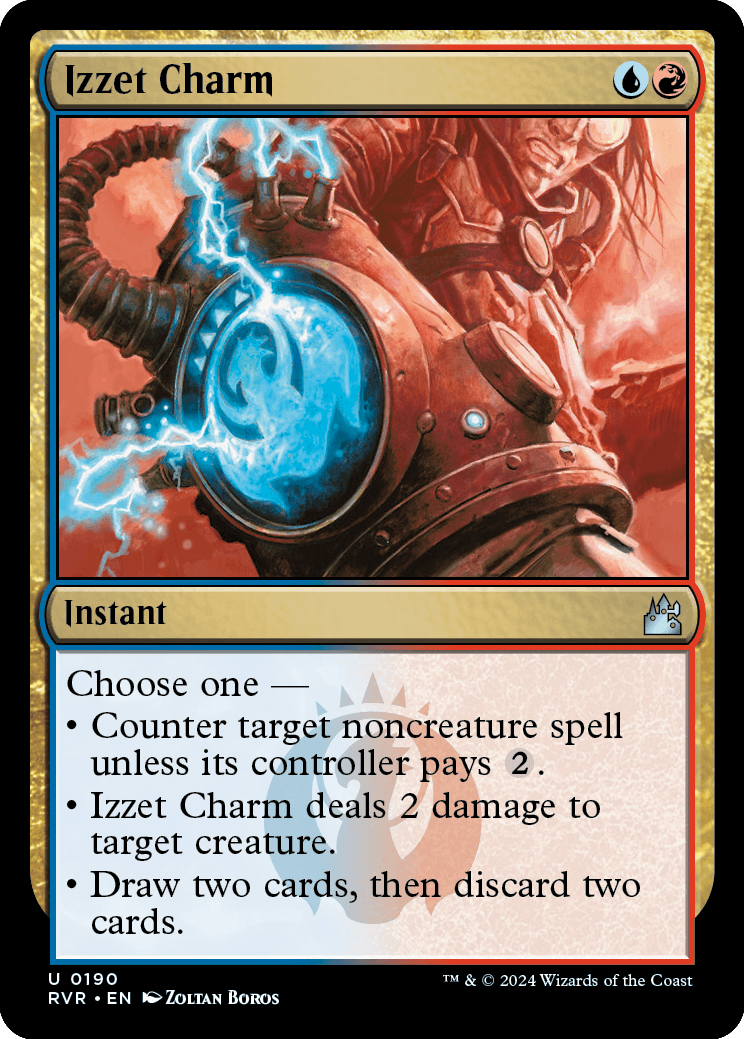
Izzet Charm
{U}{R}
Instant
Choose one —
• Counter target noncreature spell unless its controller pays {2}.
• Izzet Charm deals 2 damage to target creature.
• Draw two cards, then discard two cards.
- If you choose the last mode, you draw two cards and discard two cards all while Izzet Charm is resolving. Nothing can happen between the two, and no player may choose to take actions.
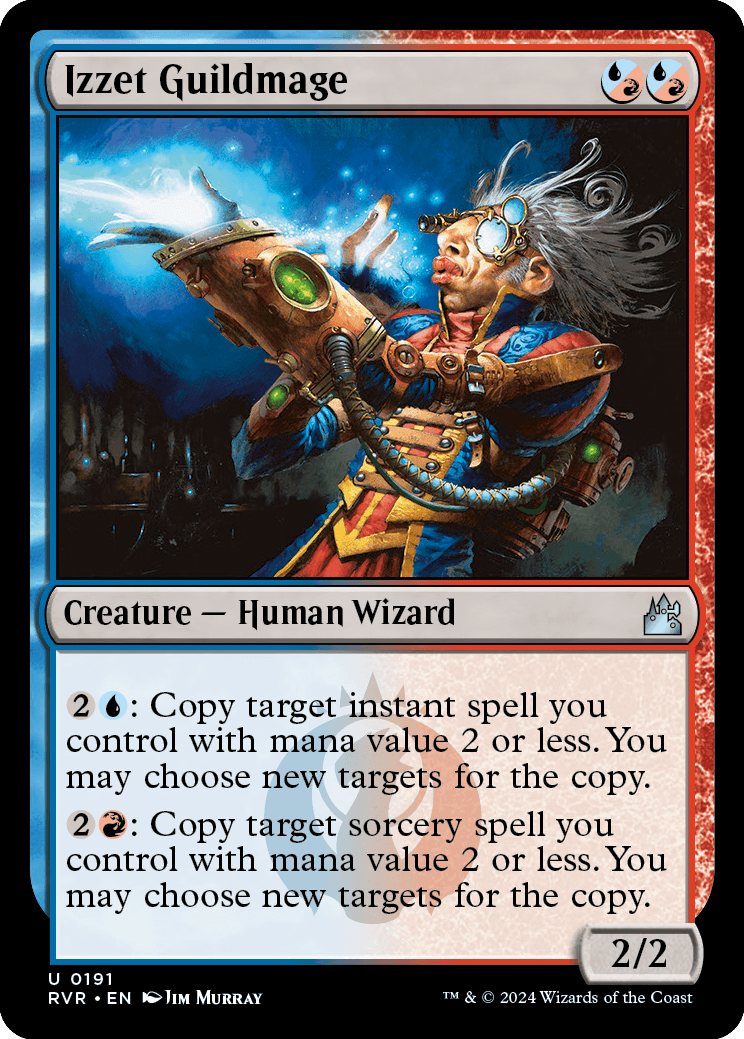
Izzet Guildmage
{U/R}{U/R}
Creature — Human Wizard
2/2
{2}{U}: Copy target instant spell you control with mana value 2 or less. You may choose new targets for the copy.
{2}{R}: Copy target sorcery spell you control with mana value 2 or less. You may choose new targets for the copy.
- Izzet Guildmage's abilities can copy any instant or sorcery spell with an appropriate mana value, not just one with targets.
- If a spell has {X} in its mana cost, include the value chosen for that X when determining the mana value of that spell.
- The copy is created on the stack, so it's not "cast." Abilities that trigger when a player casts a spell won't trigger.
- The copy will have the same targets as the spell it's copying unless you choose new ones. You may change any number of the targets, including all of them or none of them. If, for one of the targets, you can't choose a new legal target, then it remains unchanged (even if the current target is illegal).
- If the spell that's copied is modal (that is, it says "Choose one —" or the like), the copy will have the same mode or modes. You can't choose different ones.
- If the spell has damage divided as it was cast, the division can't be changed (although the targets receiving that damage still can). The same is true of spells that distribute counters.
- The controller of a copy can't choose to pay any alternative or additional costs for the copy. However, effects based on any alternative or additional costs that were paid for the original spell are copied as though those same costs were paid for the copy.
- Any choices made as a spell resolves won't have been made yet once it's copied. Any such choices will be made separately as the copy resolves.
- If you copy a spell, you control the copy. It will resolve before the original spell does.
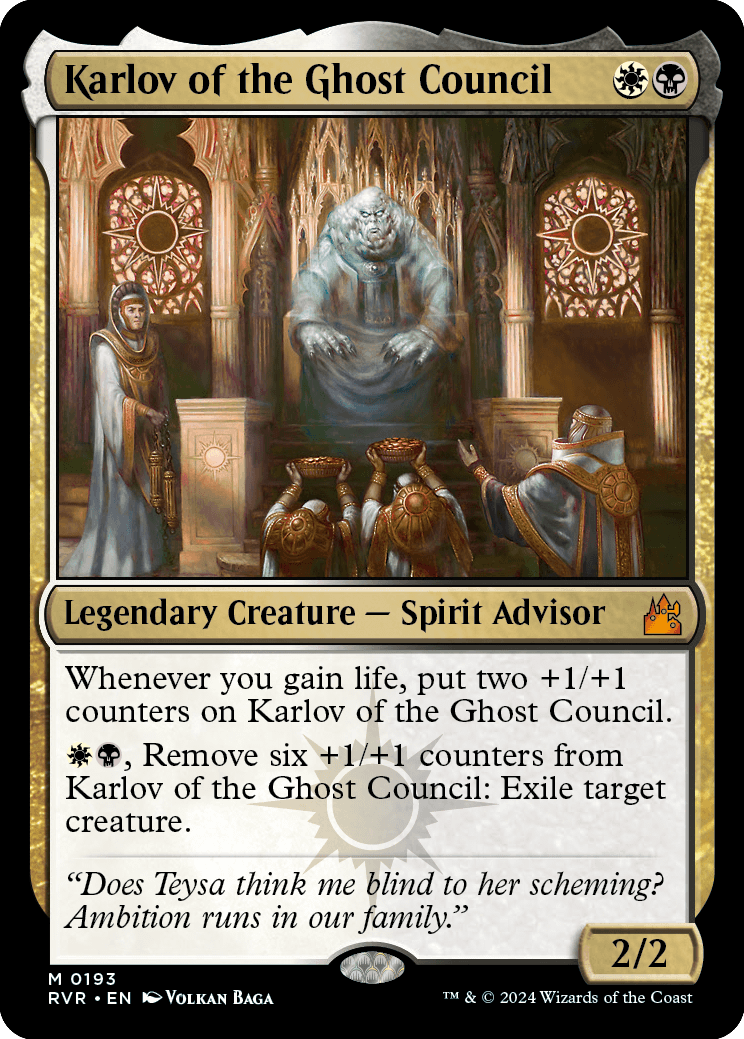
Karlov of the Ghost Council
{W}{B}
Legendary Creature — Spirit Advisor
2/2
Whenever you gain life, put two +1/+1 counters on Karlov of the Ghost Council.
{W}{B}, Remove six +1/+1 counters from Karlov of the Ghost Council: Exile target creature.
- The ability triggers just once for each life-gaining event, whether it's 1 life from an attacking creature with lifelink or 4 life from Faith's Fetters.
- A creature with lifelink dealing combat damage is a single life-gaining event. For example, if two creatures you control with lifelink deal combat damage at the same time, the ability will trigger twice. However, if a single creature with lifelink deals combat damage to multiple players or permanents at the same time (perhaps because it has trample or was blocked by more than one creature), the ability will trigger only once.
- In a Two-Headed Giant game, life gained by your teammate won't cause the ability to trigger, even though it causes your team's life total to increase.
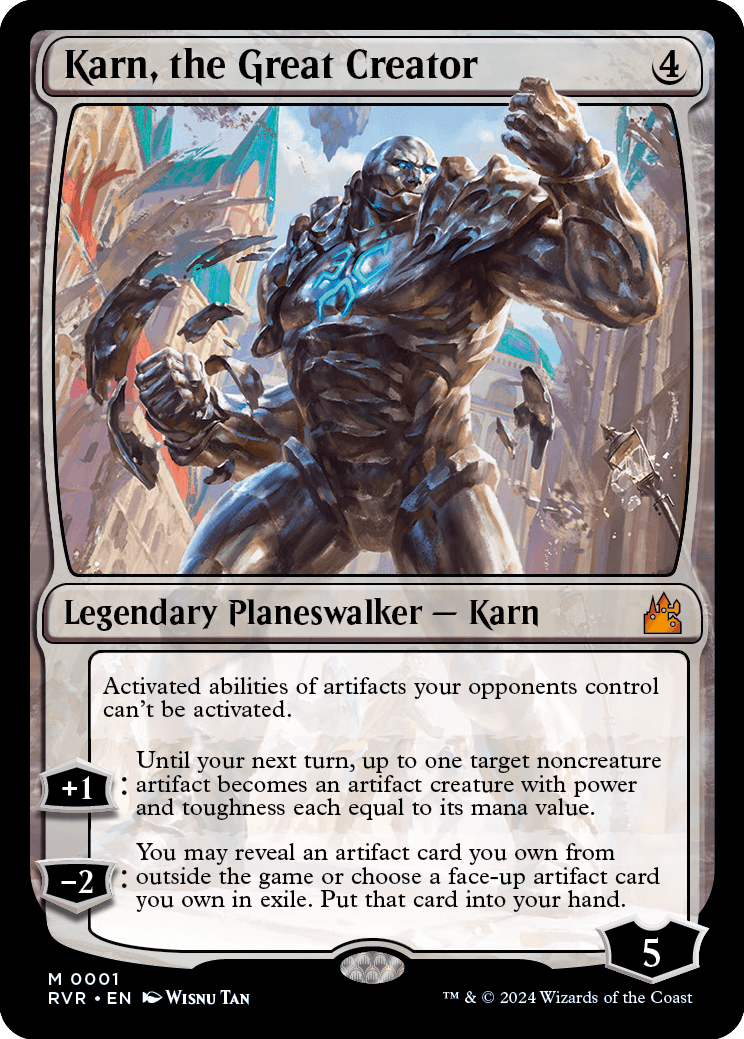
Karn, the Great Creator
{4}
Legendary Planeswalker — Karn
5
Activated abilities of artifacts your opponents control can't be activated.
+1: Until your next turn, up to one target noncreature artifact becomes an artifact creature with power and toughness each equal to its mana value.
−2: You may reveal an artifact card you own from outside the game or choose a face-up artifact card you own in exile. Put that card into your hand.
- Activated abilities contain a colon. They're generally written "[Cost]: [Effect]." Some keyword abilities are activated abilities and will have colons in their reminder text. Triggered abilities (starting with "when," "whenever," or "at") are unaffected by Karn.
- Karn's first ability affects only artifacts on the battlefield. Activated abilities that work in other zones can still be activated.
- A noncreature permanent that turns into a creature can attack, and its {T} abilities can be activated, only if its controller has continuously controlled that permanent since the beginning of their most recent turn. It doesn't matter how long the permanent has been a creature.
- If a permanent has {X} in its mana cost, X is considered to be 0.
- Karn's last ability can't get a face-down card in exile, even if you know it's an artifact card.
- In a casual game, a card you choose from outside the game comes from your personal collection. In a tournament event, a card you choose from outside the game must come from your sideboard. You may look at your sideboard at any time.
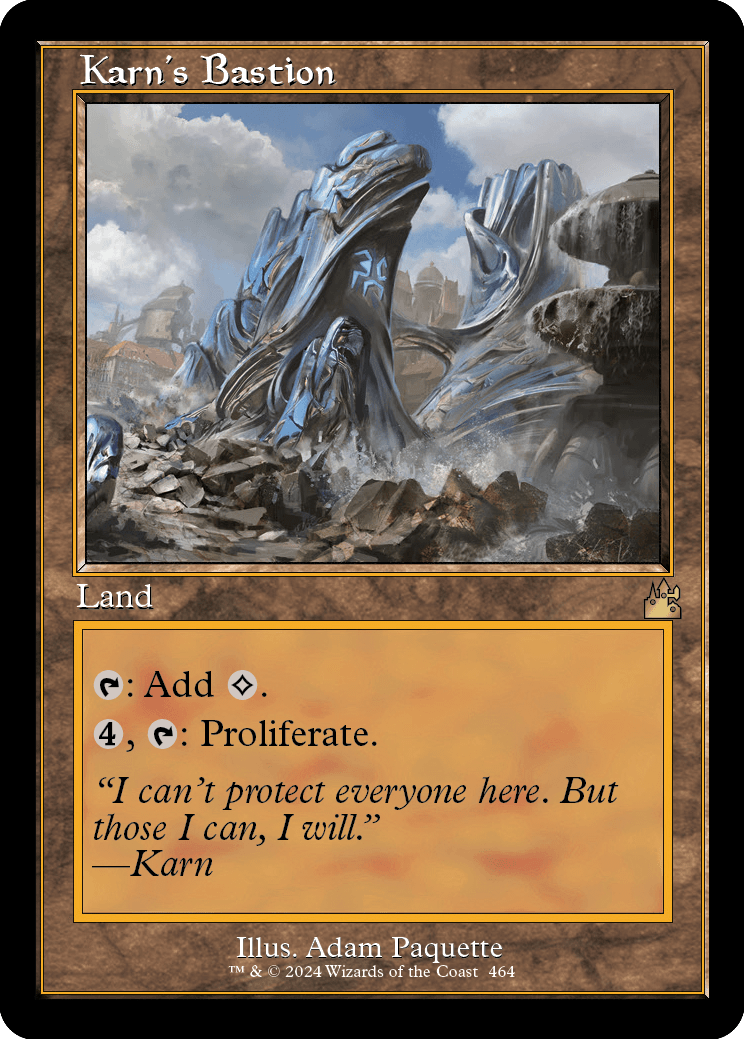
Karn's Bastion
Land
{T}: Add {C}.
{4}, {T}: Proliferate.
- To proliferate, you can choose any permanent that has a counter, including ones controlled by opponents. You can choose any player who has a counter, including opponents. You can't choose cards in any zone other than the battlefield, even if they have counters on them.
- You don't have to choose every permanent or player that has a counter, only the ones you want to add another counter to. Since "any number" includes zero, you don't have to choose any permanents at all, and you don't have to choose any players at all.
- If a player or permanent has more than one kind of counter on it, and you choose for it to get additional counters, it must get one of each kind of counter it already has. You can't have it get just one kind of counter it already has and not the others.
- An ability that triggers "Whenever you proliferate" triggers even if you chose no permanents or players while doing so.
- Players can respond to a spell or ability whose effect includes proliferating. Once that spell or ability starts to resolve, however, and its controller chooses which permanents and players will get new counters, it's too late for anyone to respond.
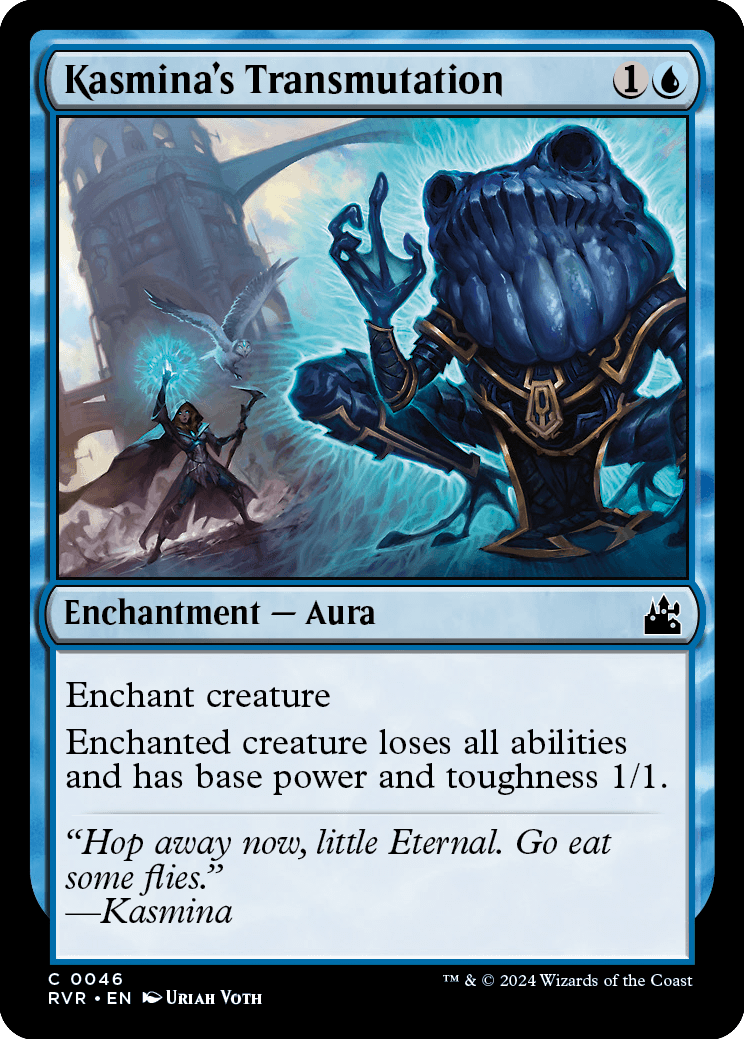
Kasmina's Transmutation
{1}{U}
Enchantment — Aura
Enchant creature
Enchanted creature loses all abilities and has base power and toughness 1/1.
- Kasmina's Transmutation overwrites all previous effects that set the creature's base power and toughness to specific values. Any power- or toughness-setting effects that start to apply after Kasmina's Transmutation becomes attached to a creature will overwrite this effect.
- Effects that modify a creature's power and/or toughness, such as the effect of Last Gasp, will apply to the creature no matter when they started to take effect. The same is true for any counters that change its power and/or toughness.
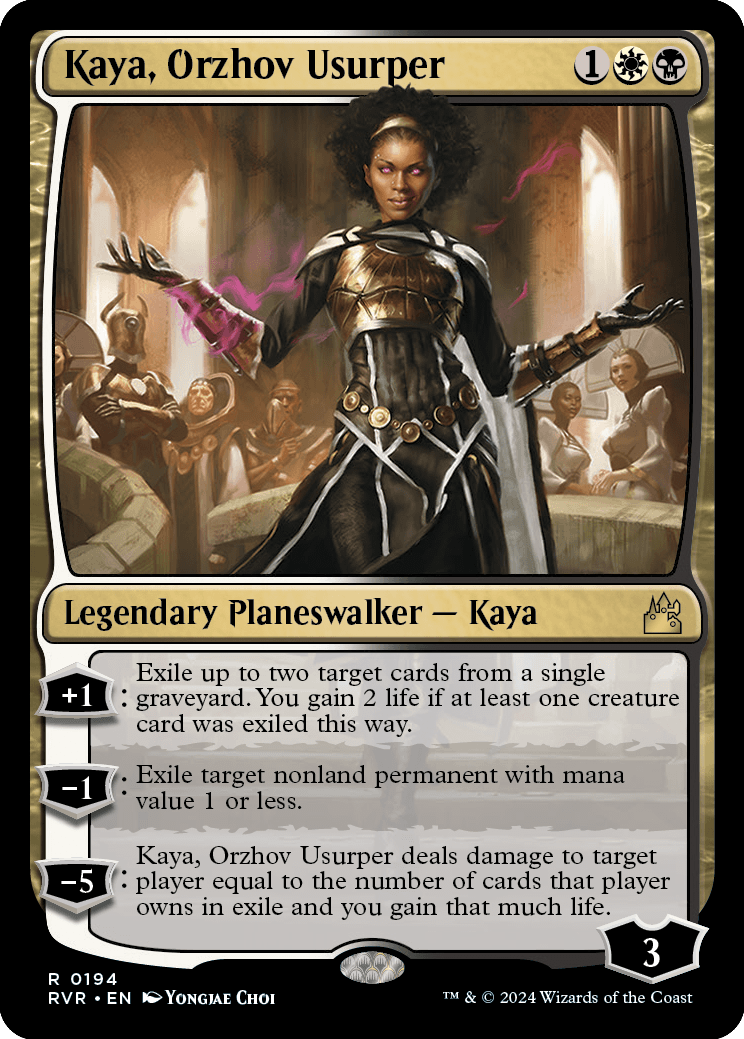
Kaya, Orzhov Usurper
{1}{W}{B}
Legendary Planeswalker — Kaya
3
+1: Exile up to two target cards from a single graveyard. You gain 2 life if at least one creature card was exiled this way.
−1: Exile target nonland permanent with mana value 1 or less.
−5: Kaya, Orzhov Usurper deals damage to target player equal to the number of cards that player owns in exile and you gain that much life.
- If a permanent has {X} in its mana cost, X is considered to be 0.
- Tokens that aren't a copy of something else don't have a mana cost. Anything without a mana cost normally has a mana value of 0.
- Kaya's last ability causes you to gain life equal to the number of cards the target player owns in exile, even if an effect causes her to deal more or less than that amount of damage to that player.
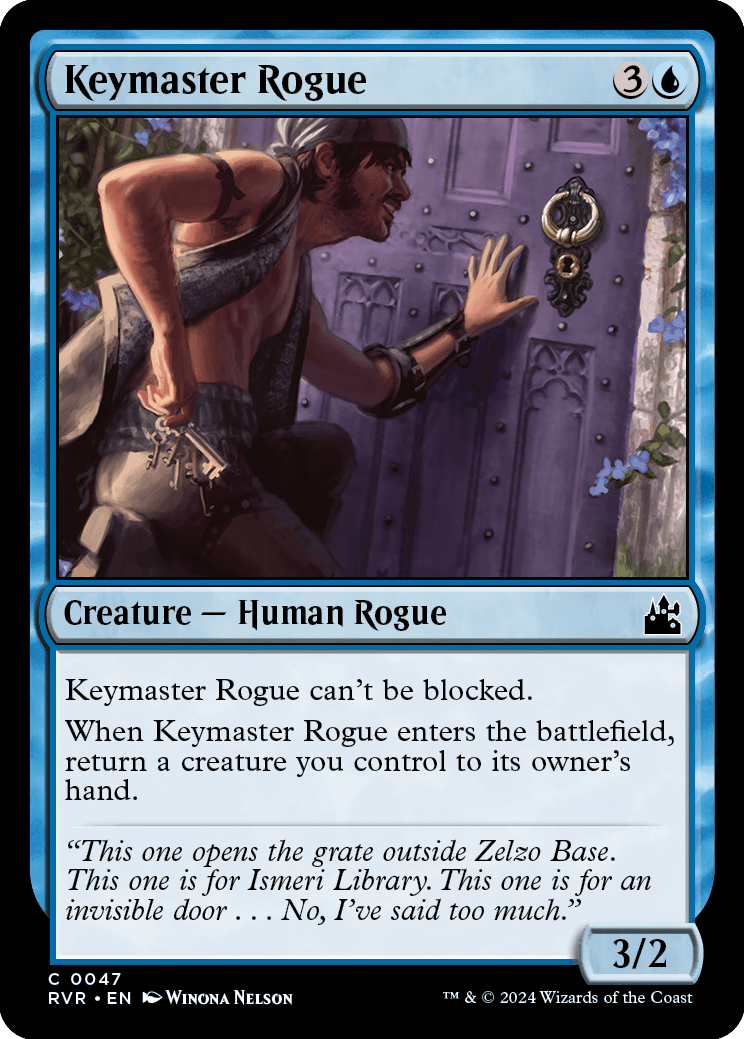
Keymaster Rogue
{3}{U}
Creature — Human Rogue
3/2
Keymaster Rogue can't be blocked.
When Keymaster Rogue enters the battlefield, return a creature you control to its owner's hand.
- Keymaster Rogue's last ability isn't optional. If Keymaster Rogue is the only creature you control when the ability resolves, you'll have to return it to its owner's hand.
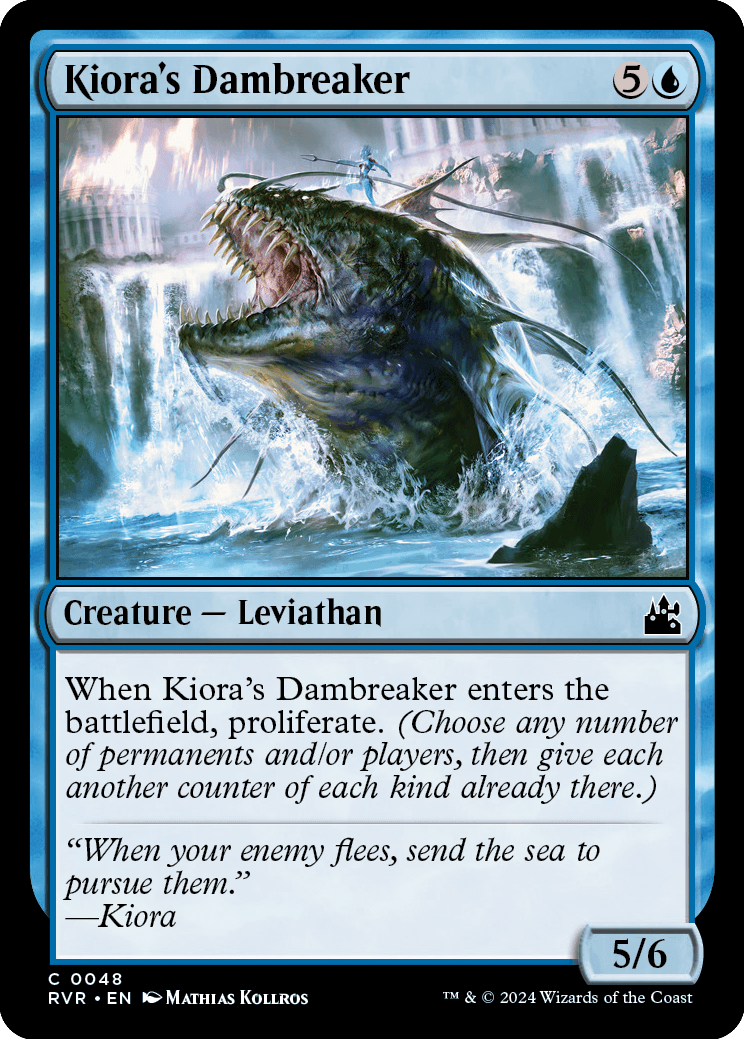
Kiora's Dambreaker
{5}{U}
Creature — Leviathan
5/6
When Kiora's Dambreaker enters the battlefield, proliferate. (Choose any number of permanents and/or players, then give each another counter of each kind already there.)
- To proliferate, you can choose any permanent that has a counter, including ones controlled by opponents. You can choose any player who has a counter, including opponents. You can't choose cards in any zone other than the battlefield, even if they have counters on them.
- You don't have to choose every permanent or player that has a counter, only the ones you want to add another counter to. Since "any number" includes zero, you don't have to choose any permanents at all, and you don't have to choose any players at all.
- If a player or permanent has more than one kind of counter on it, and you choose for it to get additional counters, it must get one of each kind of counter it already has. You can't have it get just one kind of counter it already has and not the others.
- An ability that triggers "Whenever you proliferate" triggers even if you chose no permanents or players while doing so.
- Players can respond to a spell or ability whose effect includes proliferating. Once that spell or ability starts to resolve, however, and its controller chooses which permanents and players will get new counters, it's too late for anyone to respond.
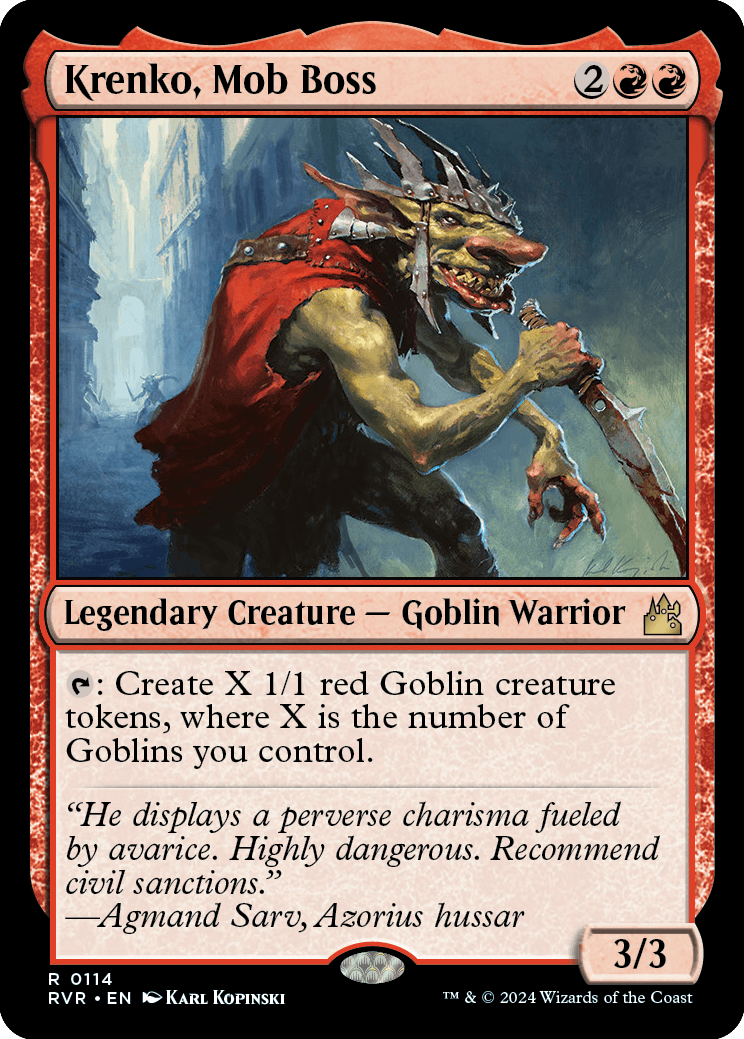
Krenko, Mob Boss
{2}{R}{R}
Legendary Creature — Goblin Warrior
3/3
{T}: Create X 1/1 red Goblin creature tokens, where X is the number of Goblins you control.
- The ability counts each Goblin you control, including Krenko itself, not just the tokens it creates.
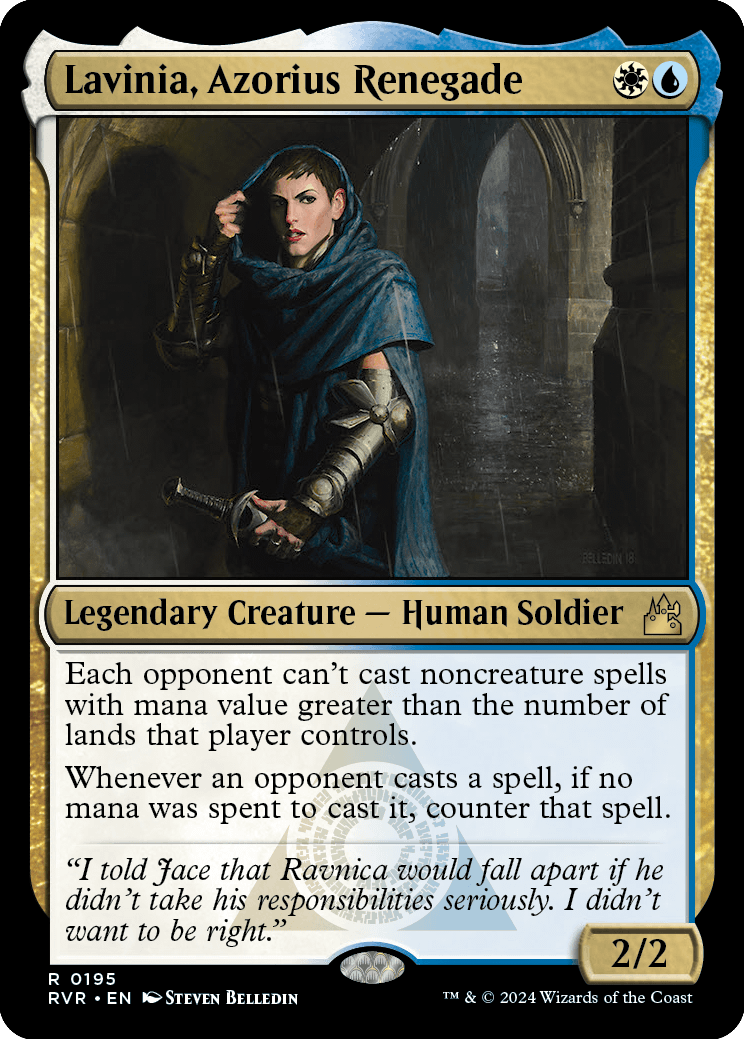
Lavinia, Azorius Renegade
{W}{U}
Legendary Creature — Human Soldier
2/2
Each opponent can't cast noncreature spells with mana value greater than the number of lands that player controls.
Whenever an opponent casts a spell, if no mana was spent to cast it, counter that spell.
- Effects that modify or replace the cost to cast a spell (such as flashback or casting a spell without paying its mana cost due to suspend) don't affect the spell's mana value, so they won't change whether Lavinia's first ability restricts that spell from being cast.
- Players may cast spells that they know Lavinia's second ability will counter. Any abilities that trigger when spells are cast will trigger and resolve if appropriate, and any effects that count spells cast will count those spells if appropriate.
- For spells with {X} in their mana costs, use the value chosen for X to determine the spell's mana value.
- If an effect allows a player to cast a spell without paying its mana cost, that player can't choose to cast it and pay its mana cost unless another rule or effect allows that player to cast it that way. However, if that spell also has additional costs that require mana, paying that mana will stop Lavinia's last ability from triggering.
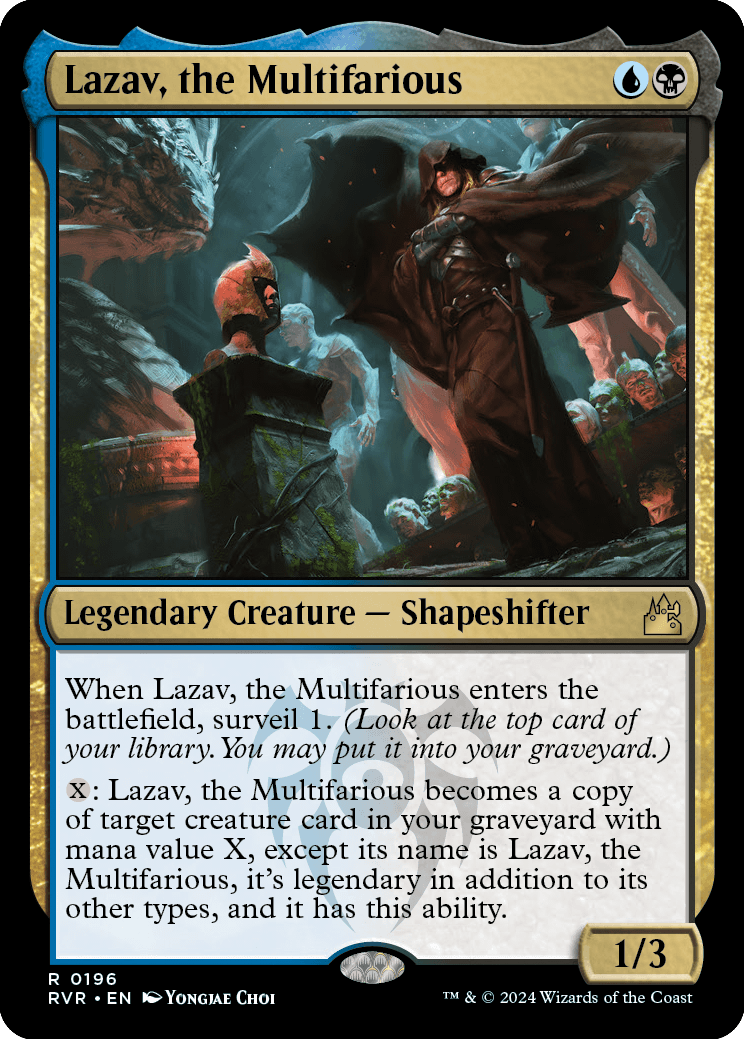
Lazav, the Multifarious
{U}{B}
Legendary Creature — Shapeshifter
1/3
When Lazav, the Multifarious enters the battlefield, surveil 1. (Look at the top card of your library. You may put it into your graveyard.)
{X}: Lazav, the Multifarious becomes a copy of target creature card in your graveyard with mana value X, except its name is Lazav, the Multifarious, it's legendary in addition to its other types, and it has this ability.
- Lazav copies exactly what was printed on the original card and nothing else, except the characteristics it specifically modifies. It doesn't copy any information about the object the card was before it was put into your graveyard.
- Any effects that applied to Lazav before it becomes a copy of another card will continue to apply once it's become a copy. The same is true of any counters that are on Lazav.
- If a card in your graveyard has {X} in its mana cost, X is considered to be 0.
- Because Lazav isn't entering the battlefield when it becomes a copy of a card, any "When [this creature] enters the battlefield" or "[This creature] enters the battlefield with" abilities of the copied card won't apply.
- If the copied card has an ability that can be activated only once each turn, copying that card a second time will allow you to activate the new instance of that ability.

Legion Warboss
{2}{R}
Creature — Goblin Soldier
2/2
Mentor (Whenever this creature attacks, put a +1/+1 counter on target attacking creature with lesser power.)
At the beginning of combat on your turn, create a 1/1 red Goblin creature token. That token gains haste until end of turn and attacks this combat if able.
- If the token can't attack for any reason (such as becoming tapped), then it doesn't attack. If there's a cost associated with having it attack, its controller isn't forced to pay that cost, so it doesn't have to attack in that case either.

Light Up the Stage
{2}{R}
Sorcery
Spectacle {R} (You may cast this spell for its spectacle cost rather than its mana cost if an opponent lost life this turn.)
Exile the top two cards of your library. Until the end of your next turn, you may play those cards.
- Light Up the Stage doesn't change when you can play the exiled cards. For example, if you exile a sorcery card, you can cast it only during your main phase when the stack is empty. If you exile a land card, you can play it only during your main phase and only if you have an available land play remaining.
- Playing an exiled card causes it to leave exile. You can't play it multiple times.
- If you don't play a card exiled this way, it remains in exile.
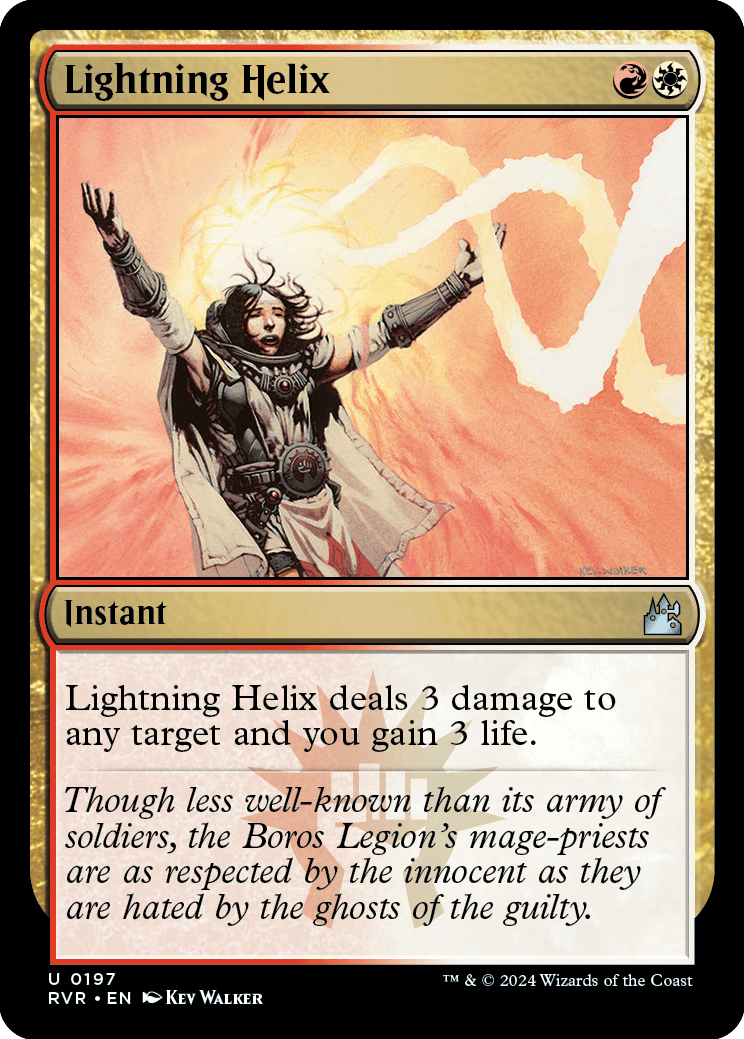
Lightning Helix
{R}{W}
Instant
Lightning Helix deals 3 damage to any target and you gain 3 life.
- If the chosen target is illegal when Lightning Helix tries to resolve, it won't resolve and none of its effects will happen. You won't gain 3 life.
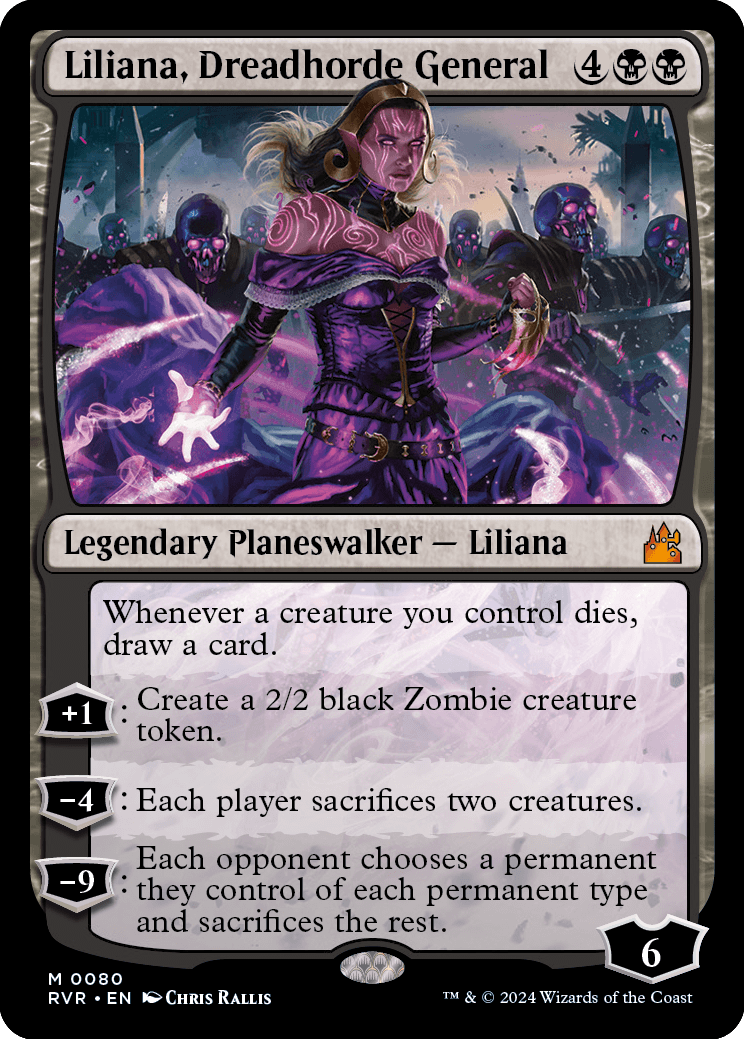
Liliana, Dreadhorde General
{4}{B}{B}
Legendary Planeswalker — Liliana
6
Whenever a creature you control dies, draw a card.
+1: Create a 2/2 black Zombie creature token.
−4: Each player sacrifices two creatures.
−9: Each opponent chooses a permanent they control of each permanent type and sacrifices the rest.
- If Liliana dies at the same time as one or more creatures you control, her first ability triggers for each of those creatures.
- If Liliana somehow becomes a creature and dies, her first ability will trigger.
- As Liliana's second loyalty ability resolves, first the player whose turn it is chooses two creatures they control, then each other player in turn order does the same, knowing the choices made before them. Then all the chosen creatures are sacrificed at the same time. If any player can choose only one creature, that player does so.
- As Liliana's last ability resolves, the next opponent in turn order (or, if it's somehow an opponent's turn, that opponent) makes all of their choices for it, then each other opponent in turn order does the same, knowing the choices made before them. Then all the unchosen permanents are sacrificed at the same time.
- The permanent types are artifact, battle, creature, enchantment, land, and planeswalker. Supertypes, like legendary, aren't permanent types.
- While making choices for Liliana's last ability, if a permanent has more than one permanent type, it can count for any of them. For example, you could choose an artifact creature as the artifact you're sparing, another creature as the creature, and an enchantment creature as the enchantment. Similarly, you could choose an enchantment creature as both the creature and the enchantment that you're sparing, even if you control another creature and/or another enchantment.
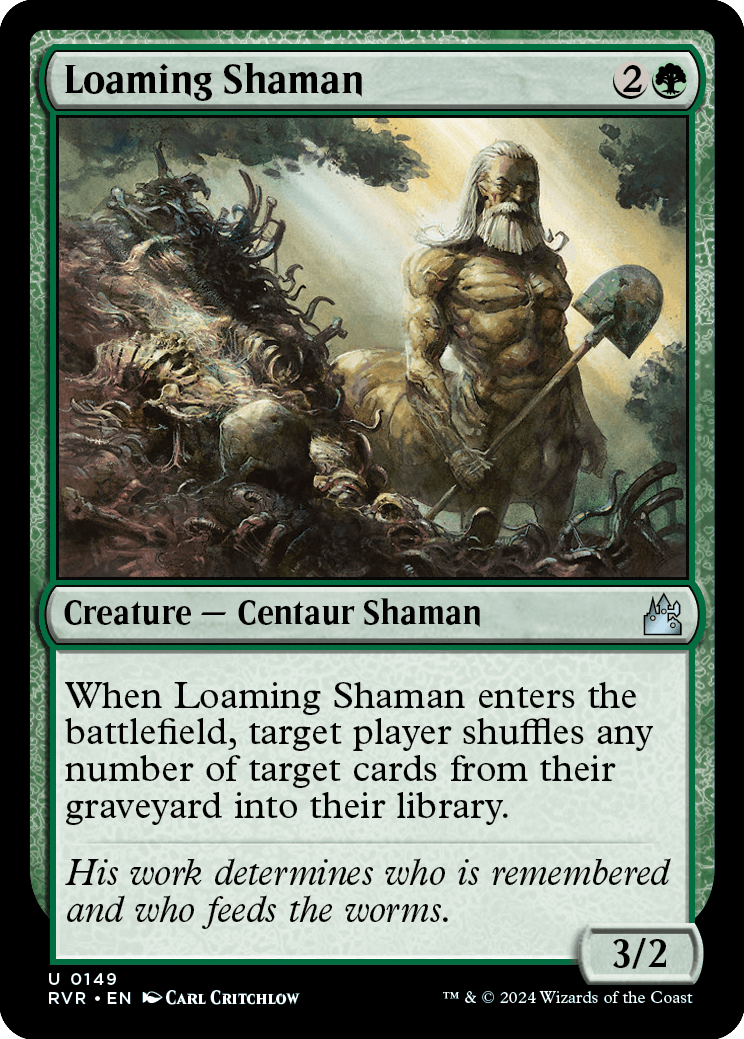
Loaming Shaman
{2}{G}
Creature — Centaur Shaman
3/2
When Loaming Shaman enters the battlefield, target player shuffles any number of target cards from their graveyard into their library.
- If Loaming Shaman's triggered ability targets a player but doesn't target any cards in that player's graveyard, that player just shuffles their library.
- If the target cards become illegal targets, the target player shuffles their library. If the target player becomes an illegal target, Loaming Shaman's ability has no effect.

Lord of the Void
{4}{B}{B}{B}
Creature — Demon
7/7
Flying
Whenever Lord of the Void deals combat damage to a player, exile the top seven cards of that player's library, then put a creature card from among them onto the battlefield under your control.
- Lord of the Void's ability isn't optional. If there is a creature card among the seven cards you exiled, you must put one onto the battlefield under your control.
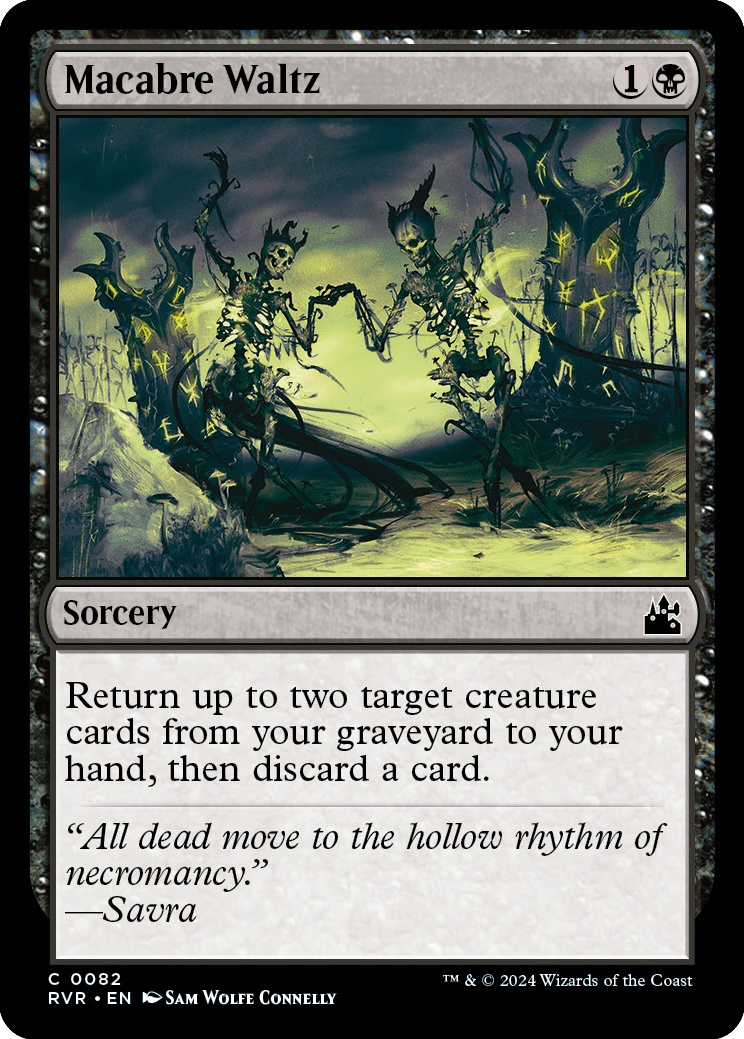
Macabre Waltz
{1}{B}
Sorcery
Return up to two target creature cards from your graveyard to your hand, then discard a card.
- If you have no other cards in hand, you'll have to discard one of the creature cards you return to your hand.
- You may cast Macabre Waltz targeting one or zero creature cards. You'll still discard a card, even if you target no creature cards.
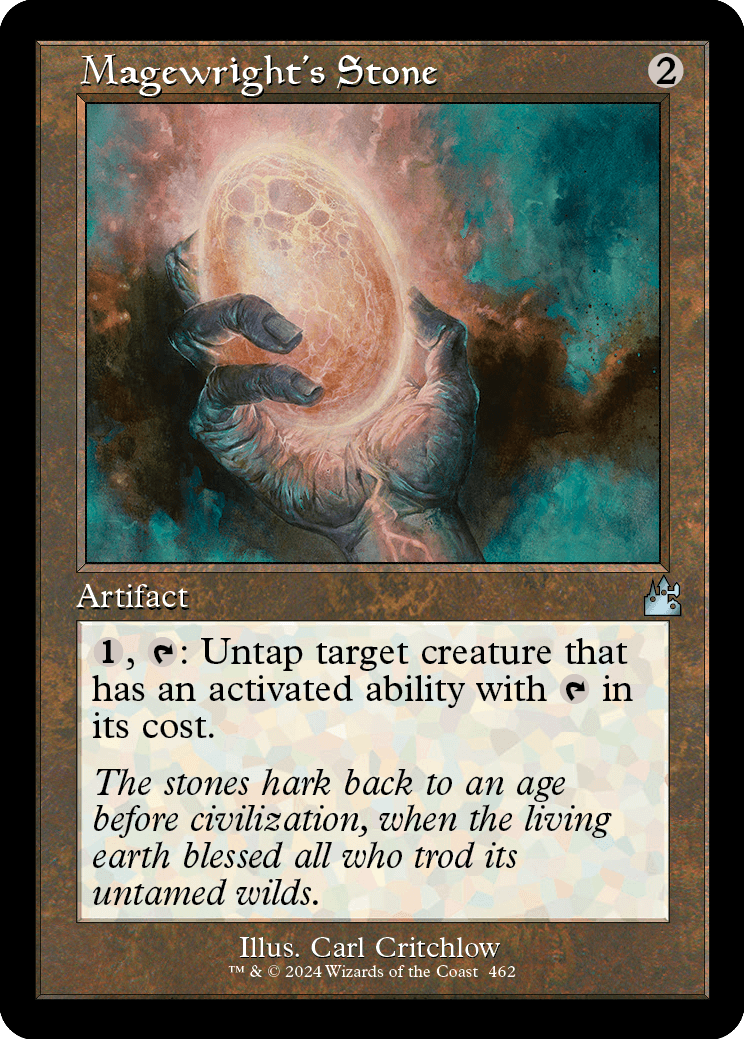
Magewright's Stone
{2}
Artifact
{1}, {T}: Untap target creature that has an activated ability with {T} in its cost.
- Activated abilities contain a colon. They're generally written "[Cost]: [Effect]." Some keywords are activated abilities and will have colons in their reminder text.
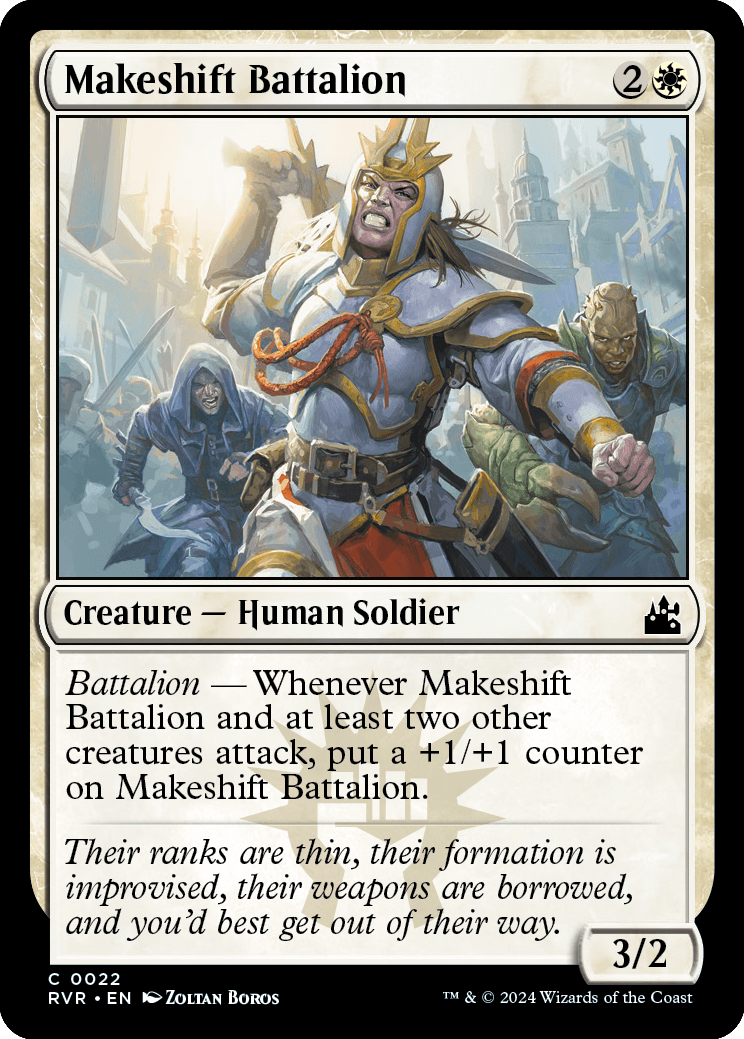
Makeshift Battalion
{2}{W}
Creature — Human Soldier
3/2
Battalion — Whenever Makeshift Battalion and at least two other creatures attack, put a +1/+1 counter on Makeshift Battalion.
- Makeshift Battalion and the other attacking creatures don't have to be attacking the same player, planeswalker, or battle.
- Once Makeshift Battalion's ability has triggered, it doesn't matter how many creatures are still attacking when that ability resolves.
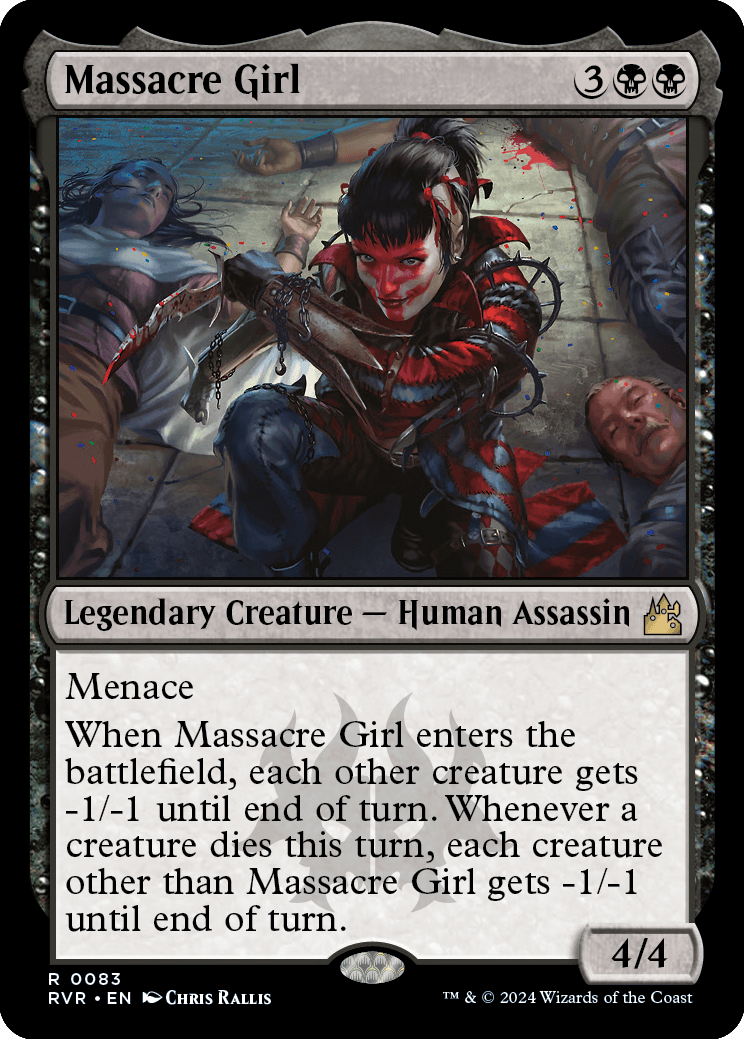
Massacre Girl
{3}{B}{B}
Legendary Creature — Human Assassin
4/4
Menace
When Massacre Girl enters the battlefield, each other creature gets -1/-1 until end of turn. Whenever a creature dies this turn, each creature other than Massacre Girl gets -1/-1 until end of turn.
- Massacre Girl's enters-the-battlefield triggered ability and its delayed triggered ability each affect only creatures on the battlefield at the time that those abilities resolve. Creatures that enter the battlefield or become creatures later in the turn won't get -1/-1 unless the delayed triggered ability triggers and resolves again later.
- Once Massacre Girl's enters-the-battlefield ability has triggered, it doesn't matter whether Massacre Girl remains on the battlefield. The delayed triggered ability will be created as the enters-the-battlefield ability resolves.
- Creatures that die while Massacre Girl's triggered ability is still on the stack won't cause its delayed triggered ability to trigger since that delayed triggered ability hasn't been created yet.
- A creature with 0 toughness doesn't die immediately. Rather, the creature dies the next time a player would receive priority. This means that any creatures whose toughness becomes 0 as Massacre Girl's enters-the-battlefield ability resolves will remain on the battlefield until just after the delayed triggered ability has been created.
- If more than one creature dies at once, Massacre Girl's delayed triggered ability triggers that many times.
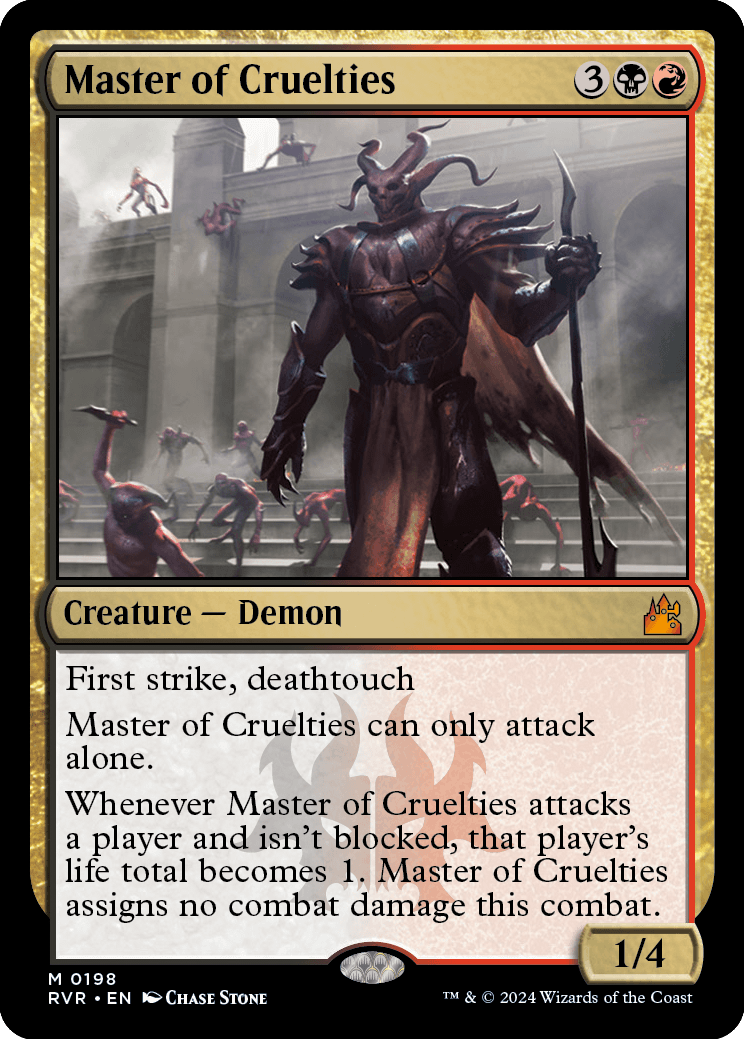
Master of Cruelties
{3}{B}{R}
Creature — Demon
1/4
First strike, deathtouch
Master of Cruelties can only attack alone.
Whenever Master of Cruelties attacks a player and isn't blocked, that player's life total becomes 1. Master of Cruelties assigns no combat damage this combat.
- An ability that triggers when something "attacks and isn't blocked" triggers in the declare blockers step after blockers are declared if (1) that creature is attacking and (2) no creatures are declared to block it. It will trigger even if that creature was put onto the battlefield attacking rather than having been declared as an attacker in the declare attackers step.
- Master of Cruelties isn't forced to attack, but if it does, it must do so alone. If you control another creature with an ability that says it must attack if able, that creature must attack and Master of Cruelties won't be able to.
- If Master of Cruelties attacks alone, another creature entering the battlefield attacking will have no effect on it. Master of Cruelties continues to be an attacking creature. The other attacking creature will assign combat damage normally, regardless of whether Master of Cruelties's last ability triggers.
- Master of Cruelties's last ability won't trigger if it attacks a planeswalker or a battle.
- For a player's life total to become 1, what actually happens is that the player loses (or in some rare cases, gains) the appropriate amount of life. For example, if the player's life total is 4 when the last ability resolves, it will cause that player to lose 3 life. Other effects that interact with life loss (or gain) will interact with this effect accordingly.
- Assigning no combat damage isn't the same as preventing that damage. Effects that make damage unpreventable will have no effect if no combat damage can be assigned.
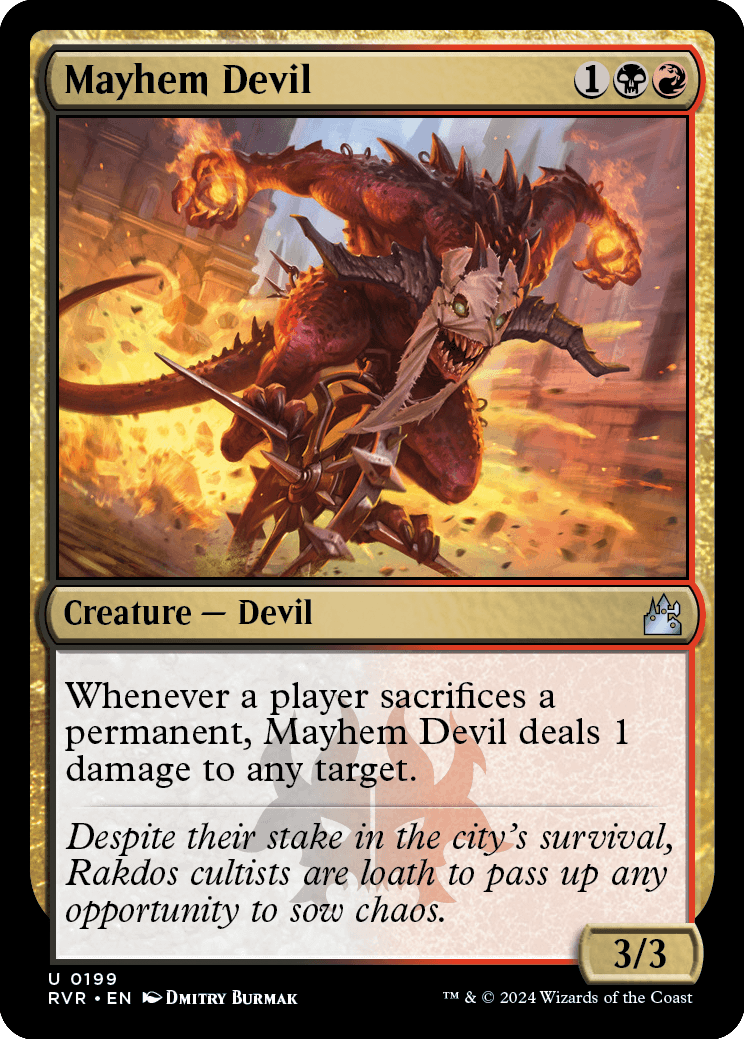
Mayhem Devil
{1}{B}{R}
Creature — Devil
3/3
Whenever a player sacrifices a permanent, Mayhem Devil deals 1 damage to any target.
- You control Mayhem Devil's triggered ability and choose the target, no matter who sacrificed the permanent.
- If a permanent is sacrificed to pay a cost of a spell or ability, Mayhem Devil's ability will resolve before that spell or ability. Conversely, if a permanent is sacrificed during the resolution of a spell or ability, that spell or ability will finish resolving before Mayhem Devil's ability is put onto the stack.
- Mayhem Devil itself doesn't allow any player to sacrifice any permanents. Its ability triggers whenever a player sacrifices a permanent because some other spell, ability, or cost instructed the player to do so.
- If you sacrifice Mayhem Devil, its ability triggers.
- A legendary permanent that is put into a graveyard because of the "legend rule" isn't sacrificed.
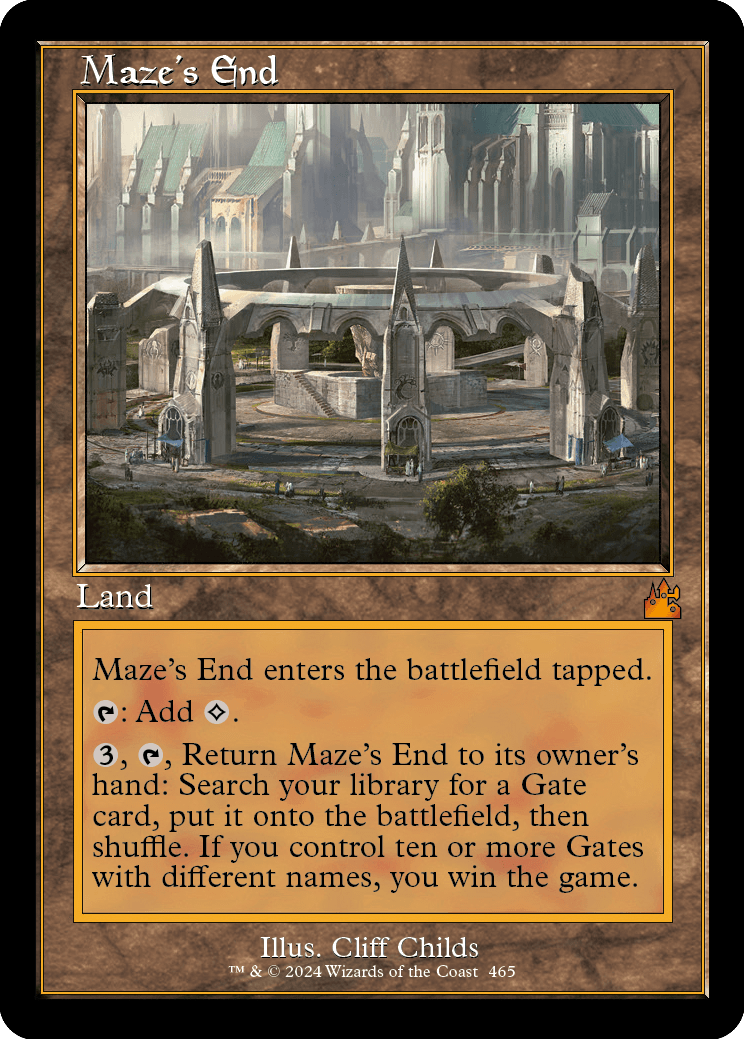
Maze's End
Land
Maze's End enters the battlefield tapped.
{T}: Add {C}.
{3}, {T}, Return Maze's End to its owner's hand: Search your library for a Gate card, put it onto the battlefield, then shuffle. If you control ten or more Gates with different names, you win the game.
- Returning Maze's End to its owner's hand is part of the cost to activate its last ability. Once that ability is announced, players can't respond to it until after you've paid its activation cost and returned Maze's End to hand.
- When the last ability of Maze's End resolves, you'll search for a Gate and put it onto the battlefield before checking to see if you win the game. This check will happen even if you don't put a Gate onto the battlefield this way. This check will happen only as the ability resolves, not at other times.
- Putting a Gate onto the battlefield with Maze's End doesn't count as the one land you can play during your turn. If it's your turn, you can play Maze's End or a different land card from your hand after its ability has resolved.
- Controlling multiple Gates with the same name has no effect on your ability to win the game with Maze's End. The excess Gates are simply ignored.
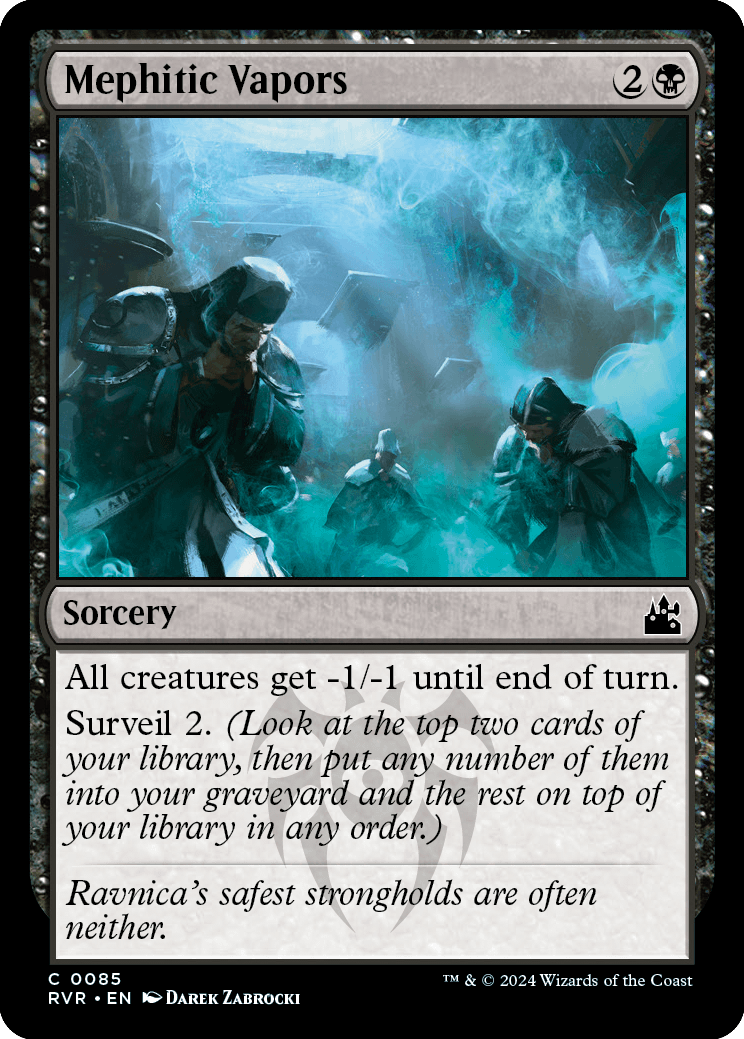
Mephitic Vapors
{2}{B}
Sorcery
All creatures get -1/-1 until end of turn.
Surveil 2. (Look at the top two cards of your library, then put any number of them into your graveyard and the rest on top of your library in any order.)
- Creatures that are going to die after getting -1/-1 will still be on the battlefield while you surveil. They won't be put into their owners' graveyards until after Mephitic Vapors is entirely finished resolving. If any of their abilities trigger on surveilling, those abilities will trigger but won't resolve until after the creatures have left the battlefield.
- Mephitic Vapors affects only creatures on the battlefield at the time it resolves. Creatures that enter the battlefield later in the turn won't get -1/-1.
- When you surveil, you may put all the cards you look at back on top of your library, you may put all of those cards into your graveyard, or you may put some of those cards on top and the rest of them into your graveyard.
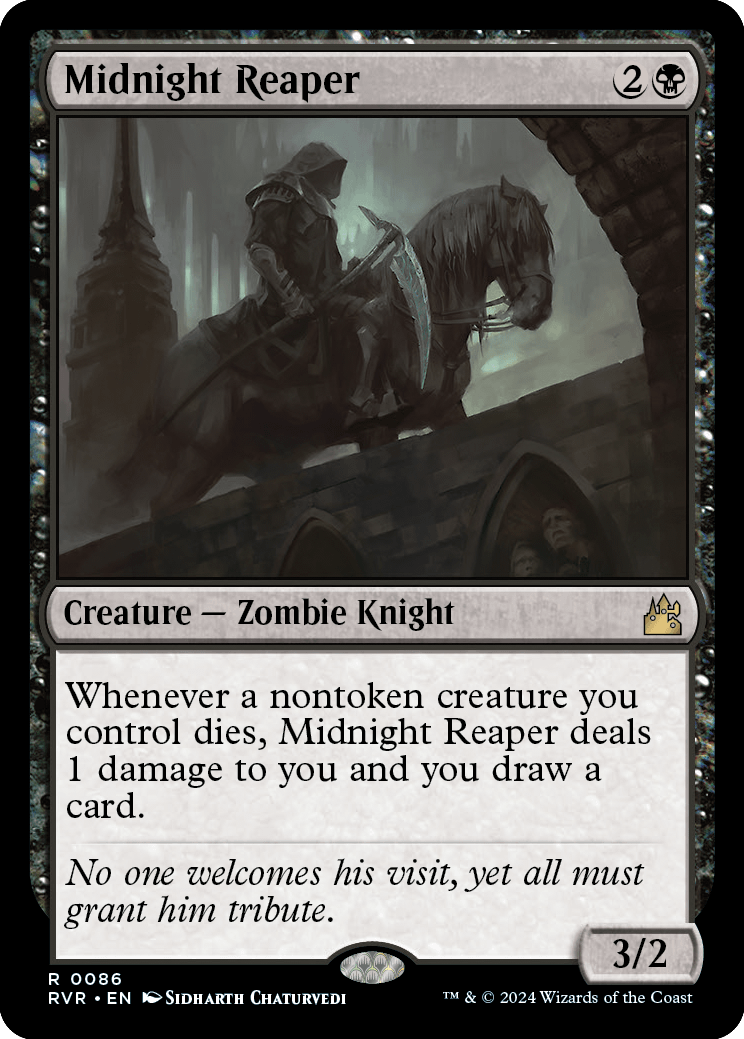
Midnight Reaper
{2}{B}
Creature — Zombie Knight
3/2
Whenever a nontoken creature you control dies, Midnight Reaper deals 1 damage to you and you draw a card.
- Midnight Reaper's ability triggers when it dies if it's not a token.
- If Midnight Reaper dies at the same time as one or more other nontoken creatures you control, Midnight Reaper's ability triggers for each of them.
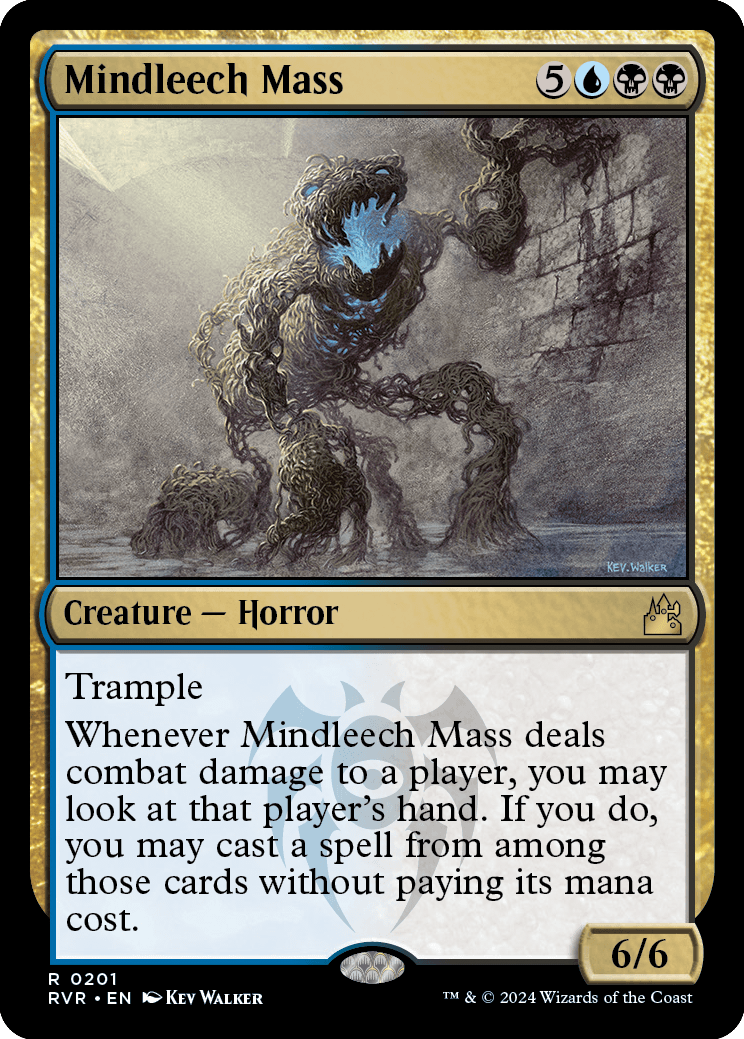
Mindleech Mass
{5}{U}{B}{B}
Creature — Horror
6/6
Trample
Whenever Mindleech Mass deals combat damage to a player, you may look at that player's hand. If you do, you may cast a spell from among those cards without paying its mana cost.
- If you cast a permanent spell this way, it will enter the battlefield under your control when it resolves. If you cast an instant or sorcery spell this way, that card will be put into its owner's graveyard when it resolves.
- The spell you cast via the triggered ability is cast as part of the resolution of that ability. Timing restrictions based on the card's type are ignored. Other restrictions, such as "Cast [this spell] only during an opponent's turn," are not.
- If you cast a spell without paying its mana cost, you can't choose to cast it for any alternative costs, such as overload costs. You can pay additional costs, such as kicker costs. If the spell has any mandatory additional costs, you must pay those.
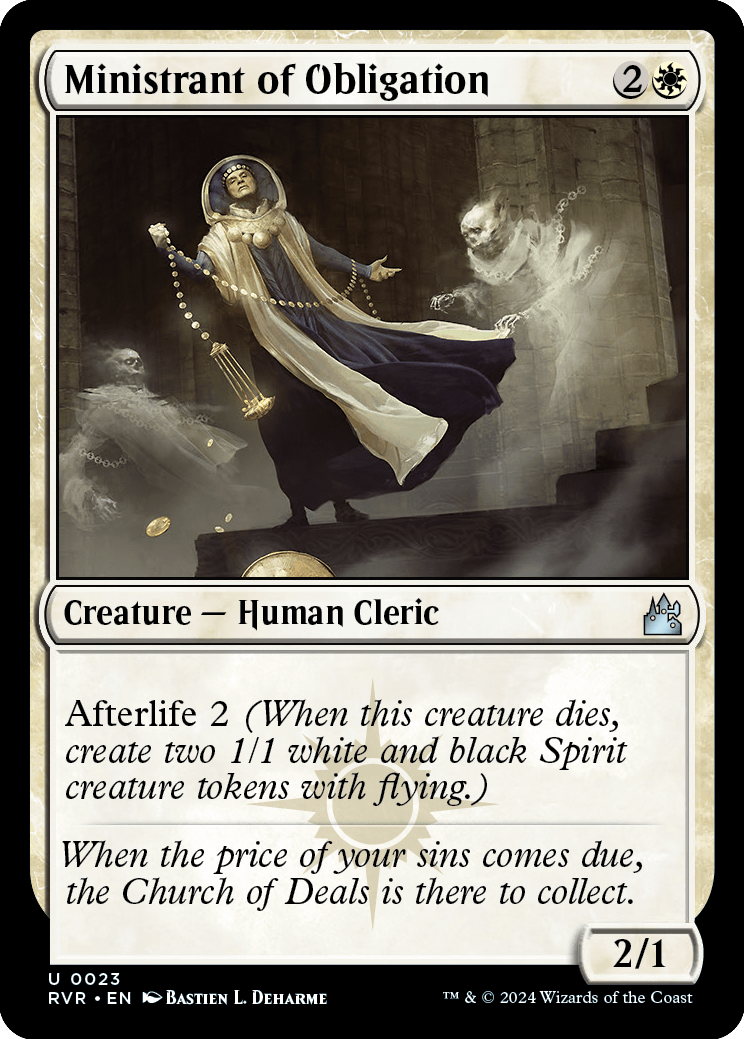
Ministrant of Obligation
{2}{W}
Creature — Human Cleric
2/1
Afterlife 2 (When this creature dies, create two 1/1 white and black Spirit creature tokens with flying.)
- Because blockers are chosen all at once, you can't block with a creature with afterlife, wait for it to die, then block with the resulting Spirit tokens.
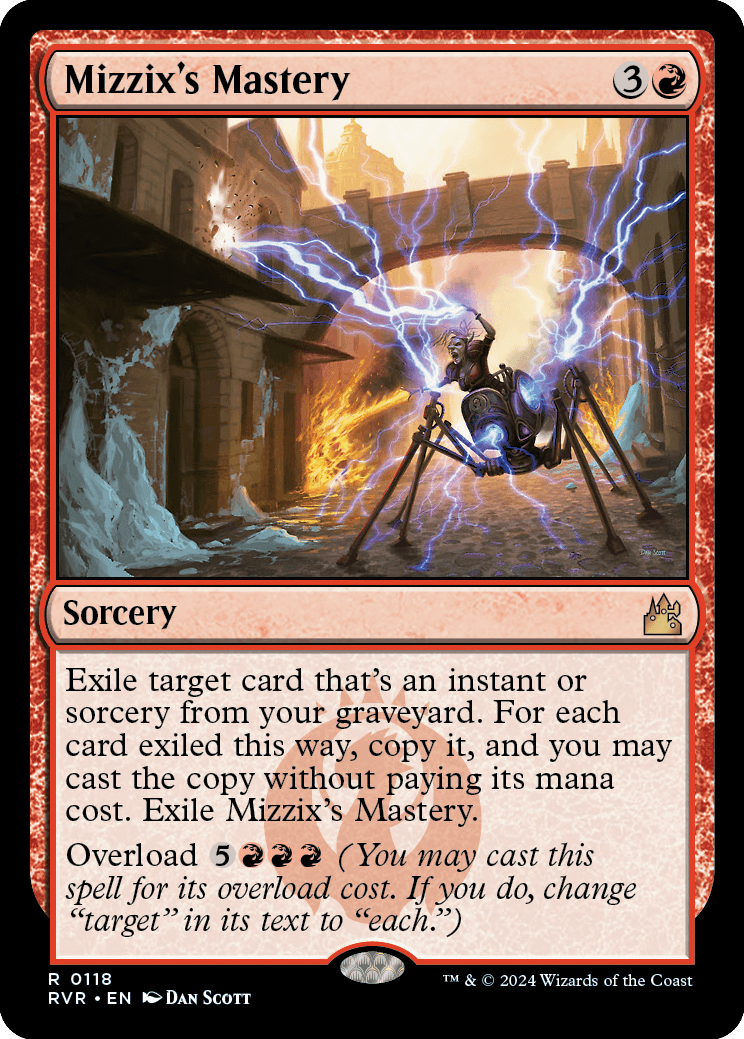
Mizzix's Mastery
{3}{R}
Sorcery
Exile target card that's an instant or sorcery from your graveyard. For each card exiled this way, copy it, and you may cast the copy without paying its mana cost. Exile Mizzix's Mastery.
Overload {5}{R}{R}{R} (You may cast this spell for its overload cost. If you do, change "target" in its text to "each.")
- If Mizzix's Mastery exiled multiple cards, you may cast the copies in any order. The last copy you cast will be the first one to resolve.
- If you don't cast one of the copies (perhaps because there are no legal targets available or you don't want to), the copy will cease to exist.
- Mizzix's Mastery is still on the stack as it resolves. If you pay the overload cost, Mizzix's Mastery won't copy itself.
- The copies are created and cast during the resolution of Mizzix's Mastery. You can't wait to cast them later in the turn. Timing restrictions based on the copy's type are ignored. Other restrictions (such as "Cast [this spell] only during combat") are not.
- If you cast a spell "without paying its mana cost," you can't pay any alternative costs. You can, however, pay additional costs, such as kicker costs. If the card has any mandatory additional costs, you must pay those.
- If the copy has {X} in its mana cost, you must choose 0 as the value of X.
- The cards remain exiled no matter what happens to the copies.
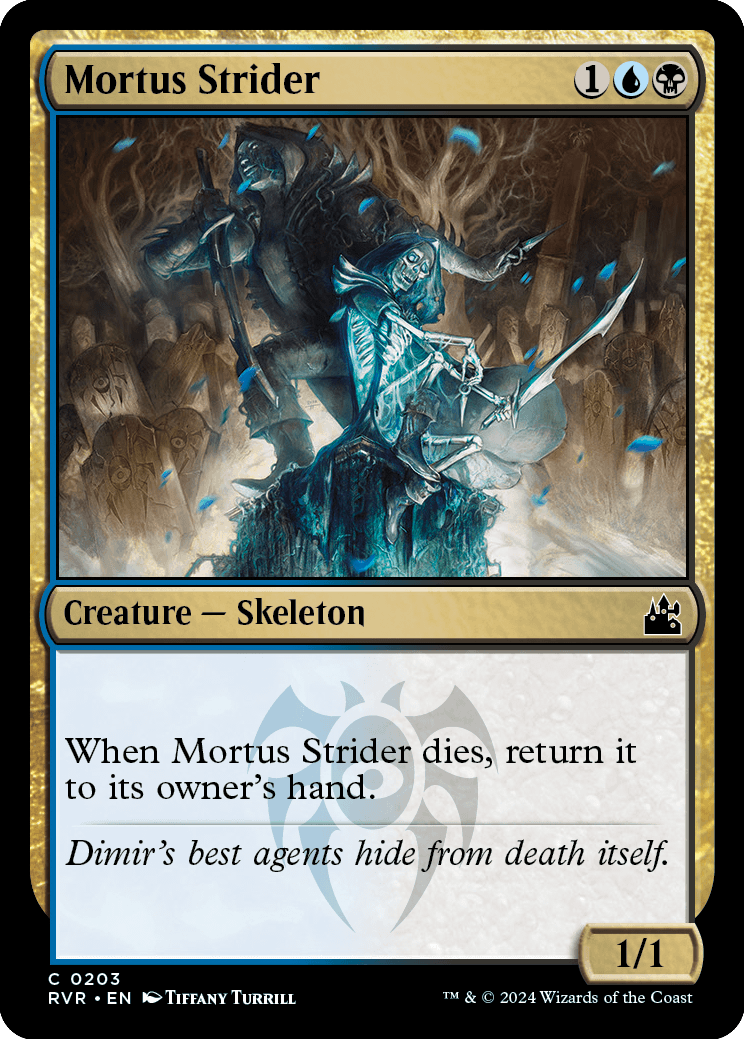
Mortus Strider
{1}{U}{B}
Creature — Skeleton
1/1
When Mortus Strider dies, return it to its owner's hand.
- Mortus Strider will return to its owner's hand only if it is still in the graveyard when its ability resolves.
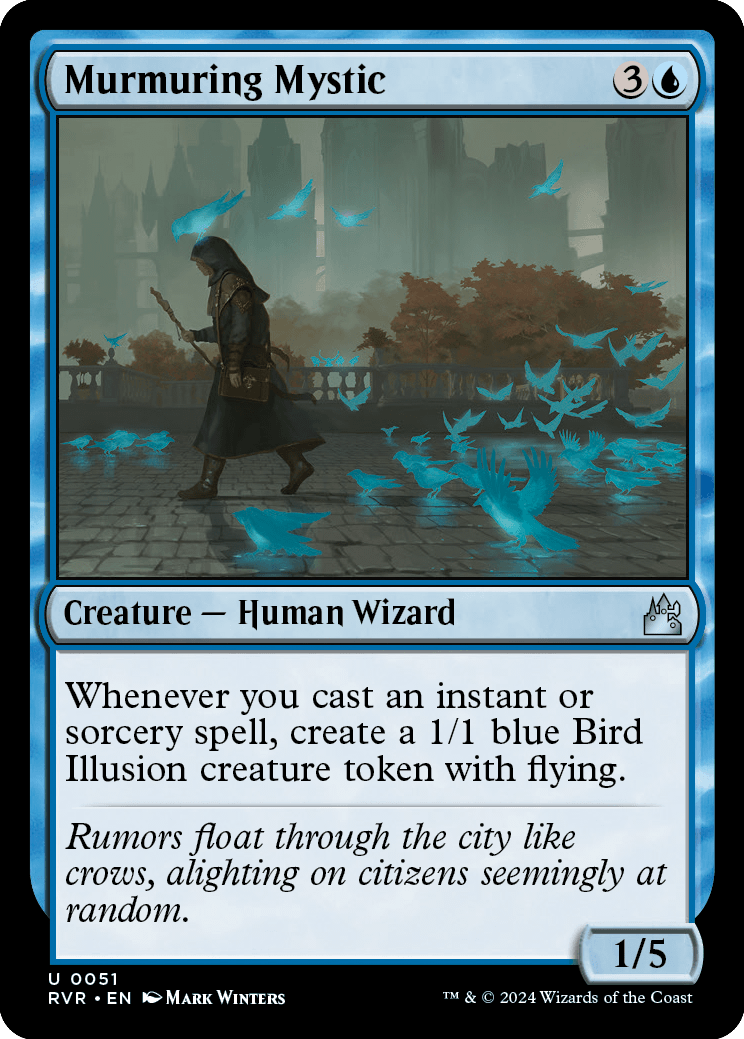
Murmuring Mystic
{3}{U}
Creature — Human Wizard
1/5
Whenever you cast an instant or sorcery spell, create a 1/1 blue Bird Illusion creature token with flying.
- Murmuring Mystic's triggered ability resolves before the spell that caused it to trigger. It resolves even if that spell is countered.
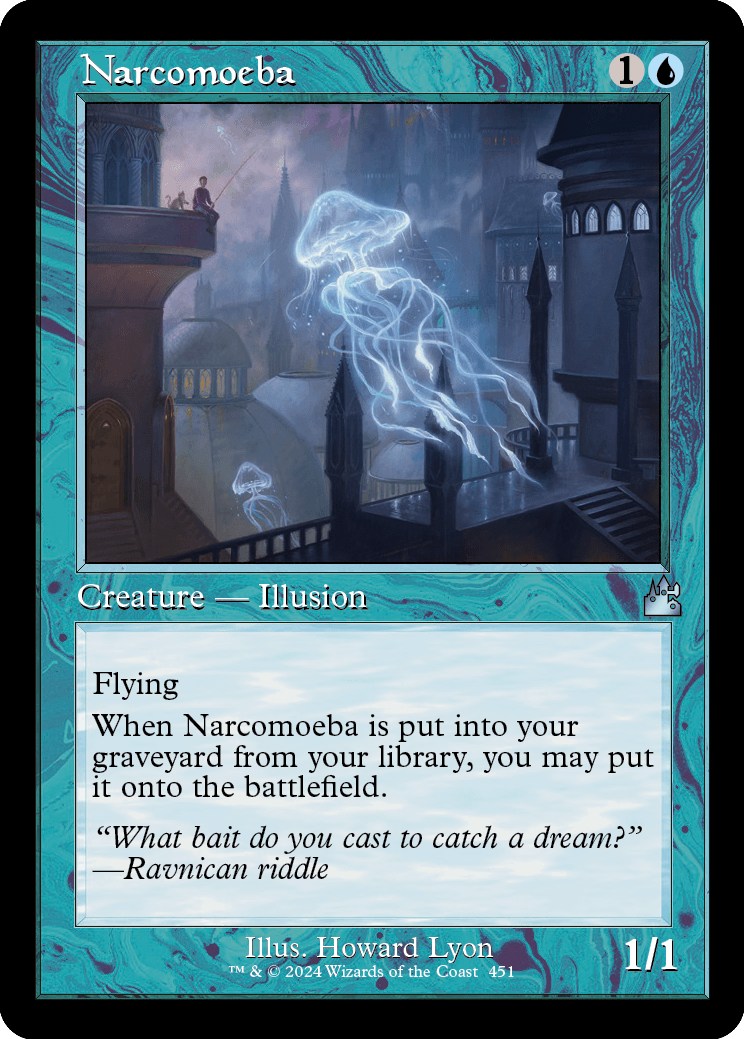
Narcomoeba
{1}{U}
Creature — Illusion
1/1
Flying
When Narcomoeba is put into your graveyard from your library, you may put it onto the battlefield.
- If Narcomoeba is revealed or looked at while moving from your library to your graveyard (such as with Balustrade Spy), its ability will trigger when it's put into your graveyard. It was still in your library while it was revealed or being looked at.
- If Narcomoeba is removed from your graveyard before its ability resolves, you can't put it onto the battlefield.
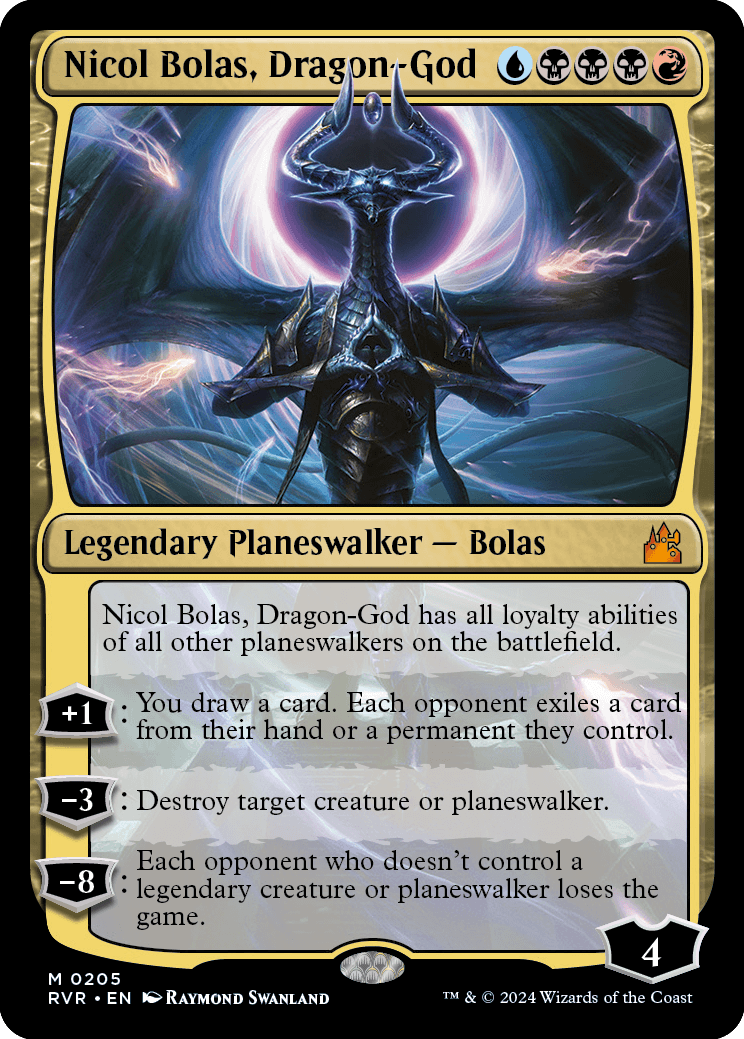
Nicol Bolas, Dragon-God
{U}{B}{B}{B}{R}
Legendary Planeswalker — Bolas
4
Nicol Bolas, Dragon-God has all loyalty abilities of all other planeswalkers on the battlefield.
+1: You draw a card. Each opponent exiles a card from their hand or a permanent they control.
−3: Destroy target creature or planeswalker.
−8: Each opponent who doesn't control a legendary creature or planeswalker loses the game.
- Nicol Bolas doesn't remove loyalty abilities from the other planeswalkers.
- Nicol Bolas doesn't gain any static or triggered abilities of other planeswalkers or any activated abilities they may have that aren't loyalty abilities.
- While Nicol Bolas may end up with an astonishing number of loyalty abilities, you can still activate only one loyalty ability of Nicol Bolas, Dragon-God during each of your turns.
- If a loyalty ability of a planeswalker references the card it's printed on by name, treat Nicol Bolas's instance of that ability as though it referenced Nicol Bolas, Dragon-God by name instead. For instance, if Ral Zarek is on the battlefield, Nicol Bolas deals the damage if you activate the second ability he gained from Ral.
- If an ability of a planeswalker exiles cards and another loyalty ability of that planeswalker references the exiled cards, those abilities are linked. If Nicol Bolas gains both abilities from the same planeswalker, the instances he has are similarly linked. Cards exiled by any other abilities Nicol Bolas has (such as his own first loyalty ability) won't be seen by those linked abilities.
- If any abilities trigger as you draw a card while resolving Nicol Bolas's first loyalty ability, those abilities don't resolve until after your opponents have exiled a card or permanent.
- After you draw a card as Nicol Bolas's first loyalty ability resolves, the next opponent in turn order (or, if it's somehow an opponent's turn, that opponent) chooses a permanent they control or chooses a card in hand without revealing that card. Then each other opponent in turn order does the same, knowing the choices made before them. Finally, all of the chosen permanents and cards are exiled simultaneously.
- In a Two-Headed Giant game, if one player on a team loses the game, the entire team loses the game, even if the other player controls a legendary creature or planeswalker.
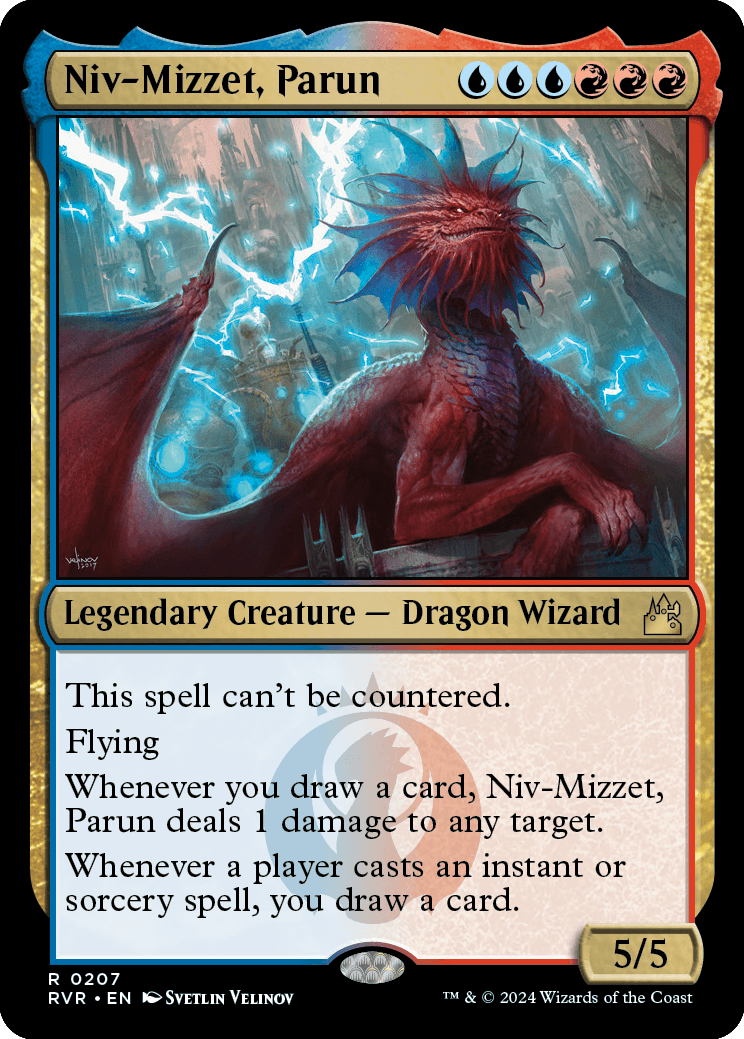
Niv-Mizzet, Parun
{U}{U}{U}{R}{R}{R}
Legendary Creature — Dragon Wizard
5/5
This spell can't be countered.
Flying
Whenever you draw a card, Niv-Mizzet, Parun deals 1 damage to any target.
Whenever a player casts an instant or sorcery spell, you draw a card.
- If an effect instructs you to draw multiple cards, Niv-Mizzet's first triggered ability triggers that many times. You choose targets for those abilities after you've drawn all of the cards.
- If a spell or ability causes you to put cards into your hand without specifically using the word "draw," Niv-Mizzet's first triggered ability won't trigger.
- Niv-Mizzet's second triggered ability resolves before the spell that caused it to trigger. It resolves even if that spell is countered. This causes its first triggered ability to trigger, and that also resolves before the spell.
- Players can cast spells and activate abilities after Niv-Mizzet's second triggered ability resolves but before the spell that caused it to trigger does. Notably, the card you draw may be able to counter that spell.
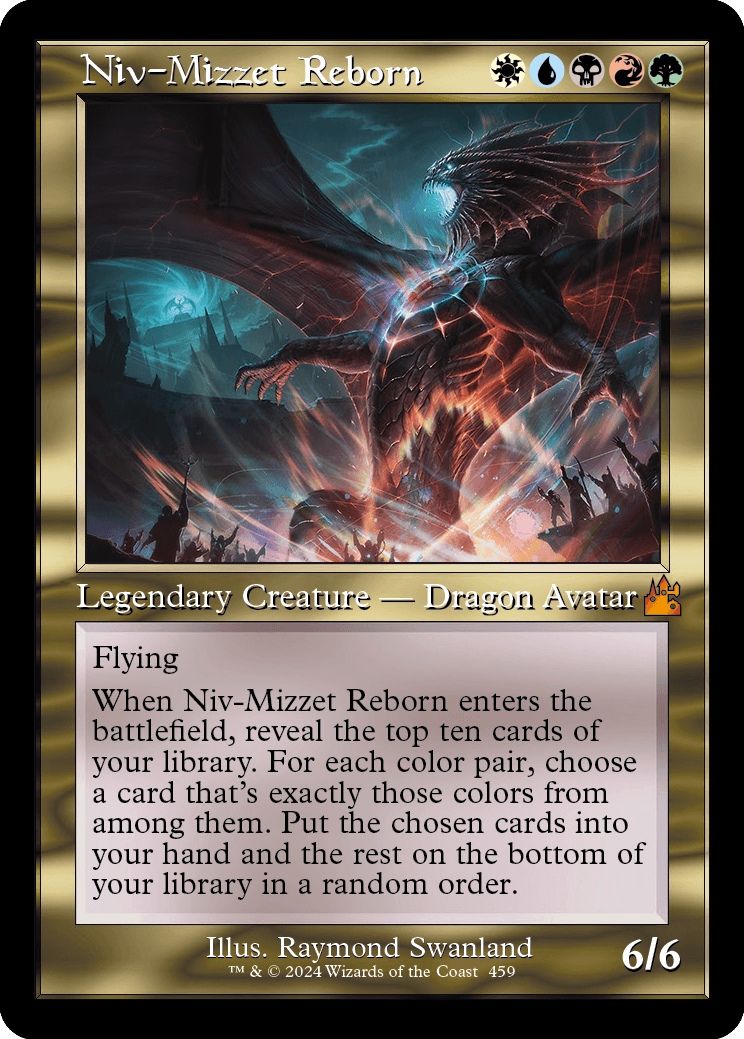
Niv-Mizzet Reborn
{W}{U}{B}{R}{G}
Legendary Creature — Dragon Avatar
6/6
Flying
When Niv-Mizzet Reborn enters the battlefield, reveal the top ten cards of your library. For each color pair, choose a card that's exactly those colors from among them. Put the chosen cards into your hand and the rest on the bottom of your library in a random order.
- A "color pair" is exactly two colors. There are ten color pairs in Magic: white-blue, white-black, blue-black, blue-red, black-red, black-green, red-green, red-white, green-white, and green-blue.
- If the top ten cards of your library don't contain all ten color pairs, you choose as many cards as you can and put those cards into your hand.
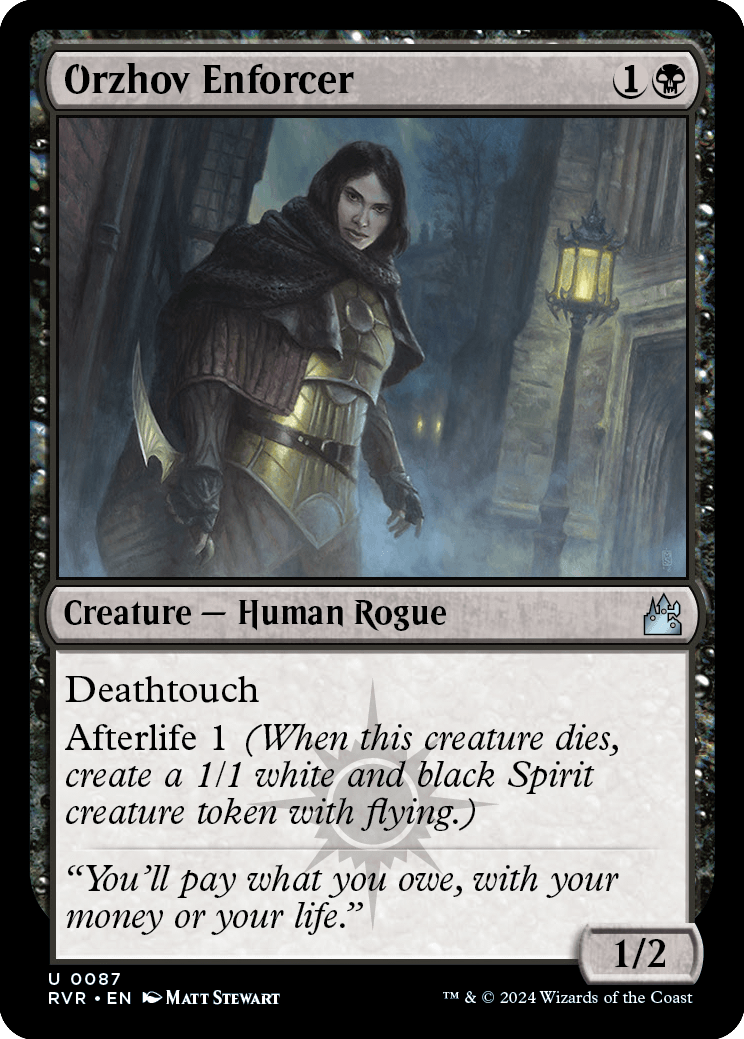
Orzhov Enforcer
{1}{B}
Creature — Human Rogue
1/2
Deathtouch
Afterlife 1 (When this creature dies, create a 1/1 white and black Spirit creature token with flying.)
- Because blockers are chosen all at once, you can't block with a creature with afterlife, wait for it to die, then block with the resulting Spirit tokens.
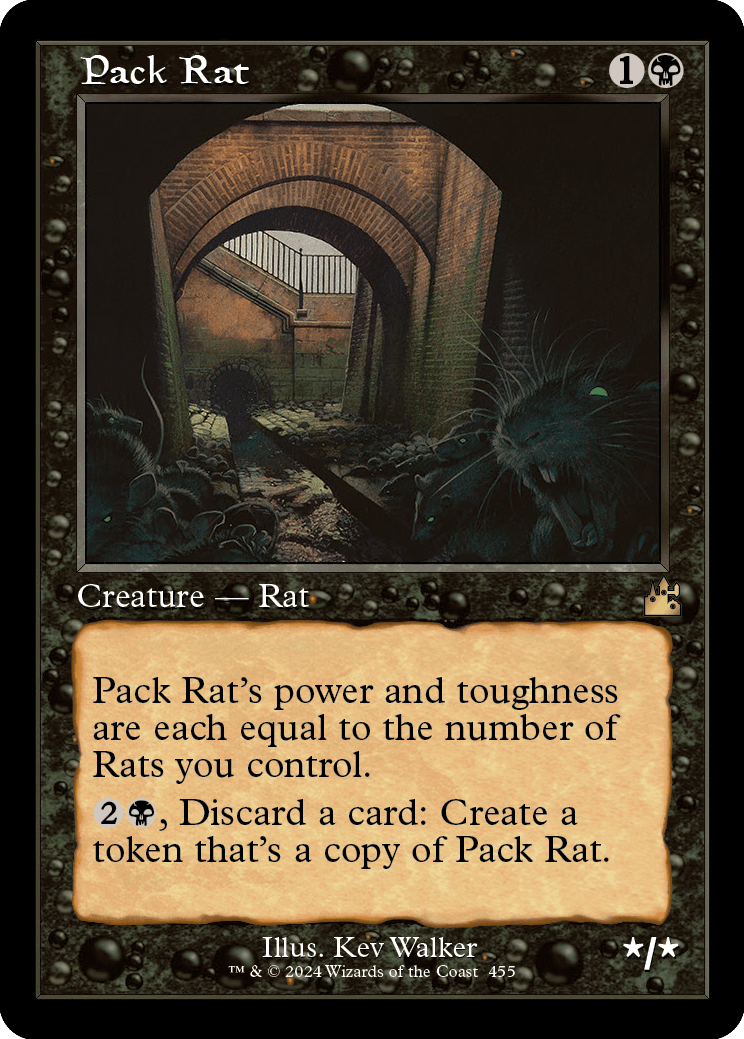
Pack Rat
{1}{B}
Creature — Rat
*/*
Pack Rat's power and toughness are each equal to the number of Rats you control.
{2}{B}, Discard a card: Create a token that's a copy of Pack Rat.
- Pack Rat's first ability counts any creature you control with the creature type Rat, not just Pack Rats. That ability works in all zones, not only the battlefield.
- The token will copy Pack Rat's two abilities. Its power and toughness will be equal to the number of Rats you control (not the number of Rats you controlled when the token entered the battlefield). It will also be able to create copies of itself.
- The token won't copy counters on Pack Rat, nor will it copy other effects that have changed Pack Rat's power, toughness, types, color, or so on. Normally, this means the token will simply be a Pack Rat. But if any copy effects have affected that Pack Rat, they're taken into account.
- If Pack Rat leaves the battlefield before its activated ability resolves, the token will still enter the battlefield as a copy of Pack Rat, using Pack Rat's copiable values from when it was last on the battlefield.
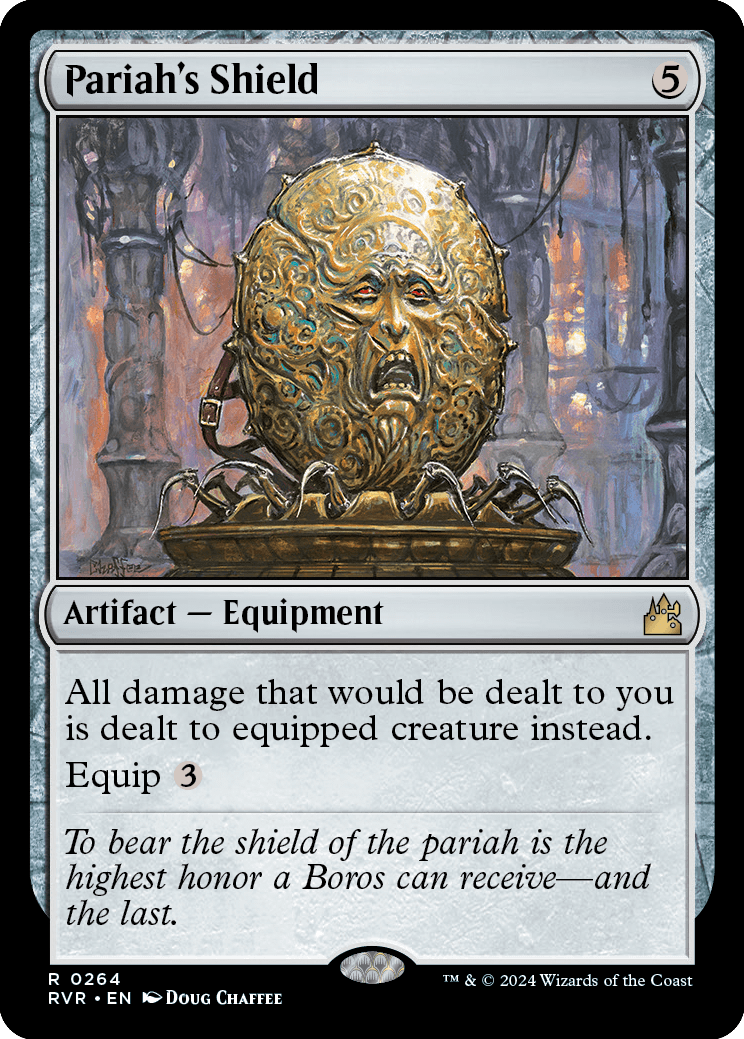
Pariah's Shield
{5}
Artifact — Equipment
All damage that would be dealt to you is dealt to equipped creature instead.
Equip {3}
- If Pariah's Shield isn't attached to a creature, all damage that would be dealt to you is dealt to you normally.
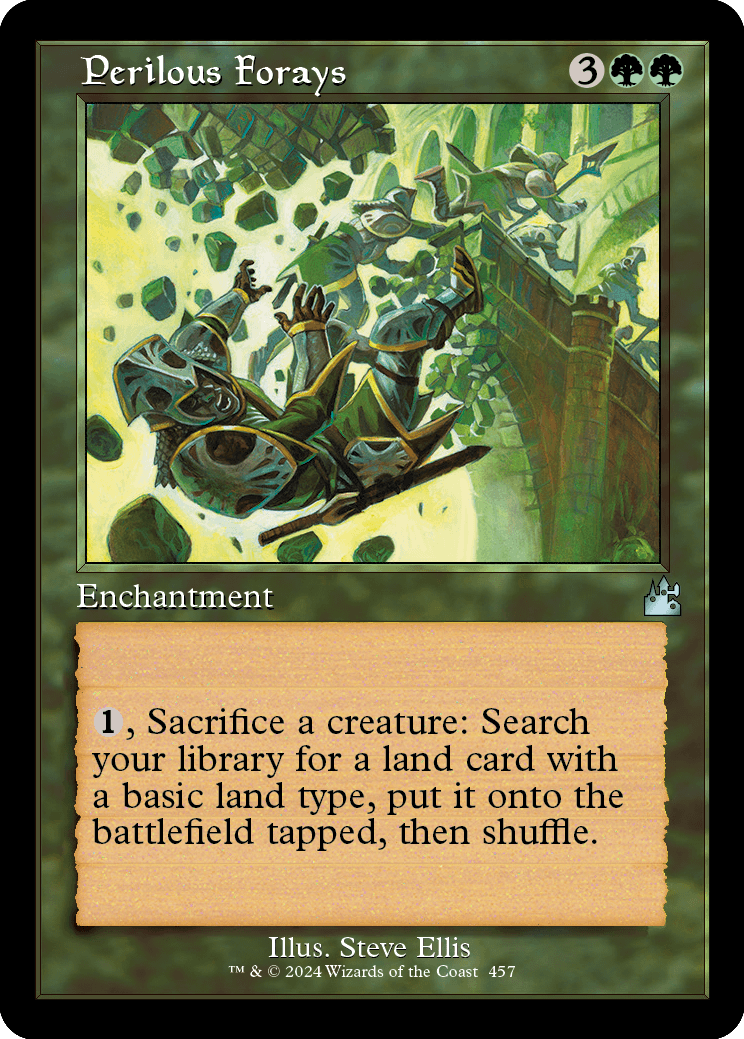
Perilous Forays
{3}{G}{G}
Enchantment
{1}, Sacrifice a creature: Search your library for a land card with a basic land type, put it onto the battlefield tapped, then shuffle.
- You may find any card with Plains, Island, Swamp, Mountain, or Forest on its type line. The land doesn't need to be a basic land, so you can find a land such as Overgrown Tomb or Tropical Island.
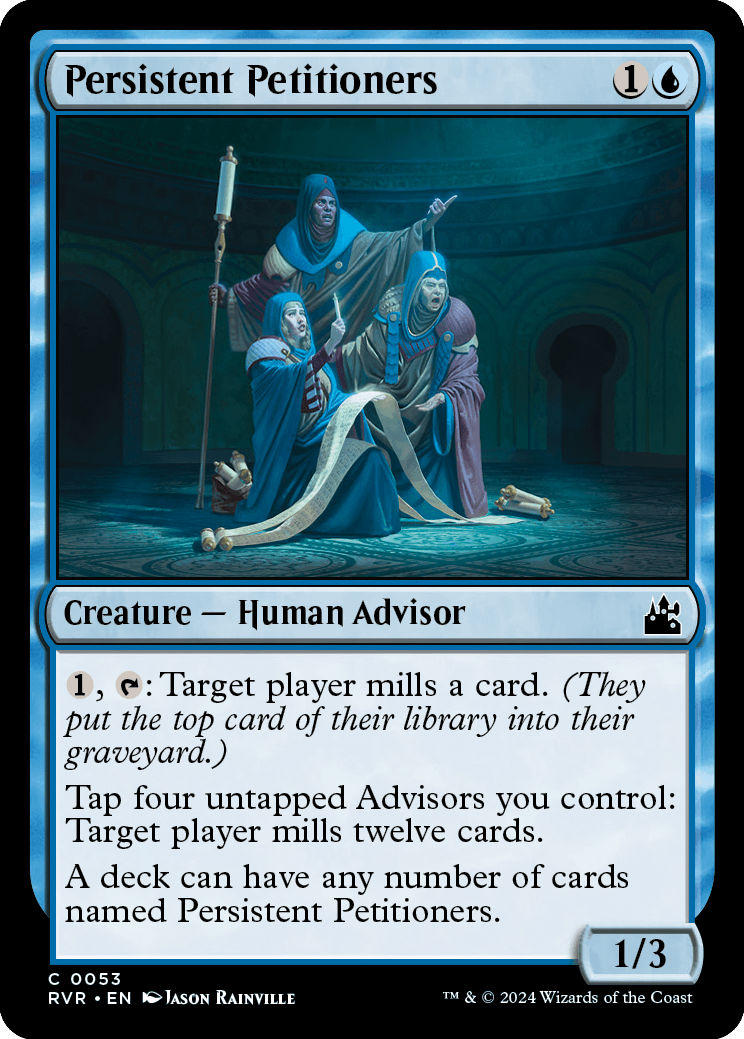
Persistent Petitioners
{1}{U}
Creature — Human Advisor
1/3
{1}, {T}: Target player mills a card. (They put the top card of their library into their graveyard.)
Tap four untapped Advisors you control: Target player mills twelve cards.
A deck can have any number of cards named Persistent Petitioners.
- Advisors that you haven't controlled continuously since your turn began may be tapped to pay for the second ability of Persistent Petitioners. This includes Persistent Petitioners itself on the turn it comes under your control.
- It's not possible to tap one Persistent Petitioners to activate both its first and second ability, or to activate its second ability and that of another Persistent Petitioners. This means that if you tap four Persistent Petitioners, the target player mills the top twelve cards of their library, not the top forty-eight.
- The last ability of Persistent Petitioners lets you ignore the "four-of" rule. It doesn't let you ignore format legality. For example, during a Ravnica Remastered Limited event, you can't add Persistent Petitioners from your personal collection, no matter how much they ask.
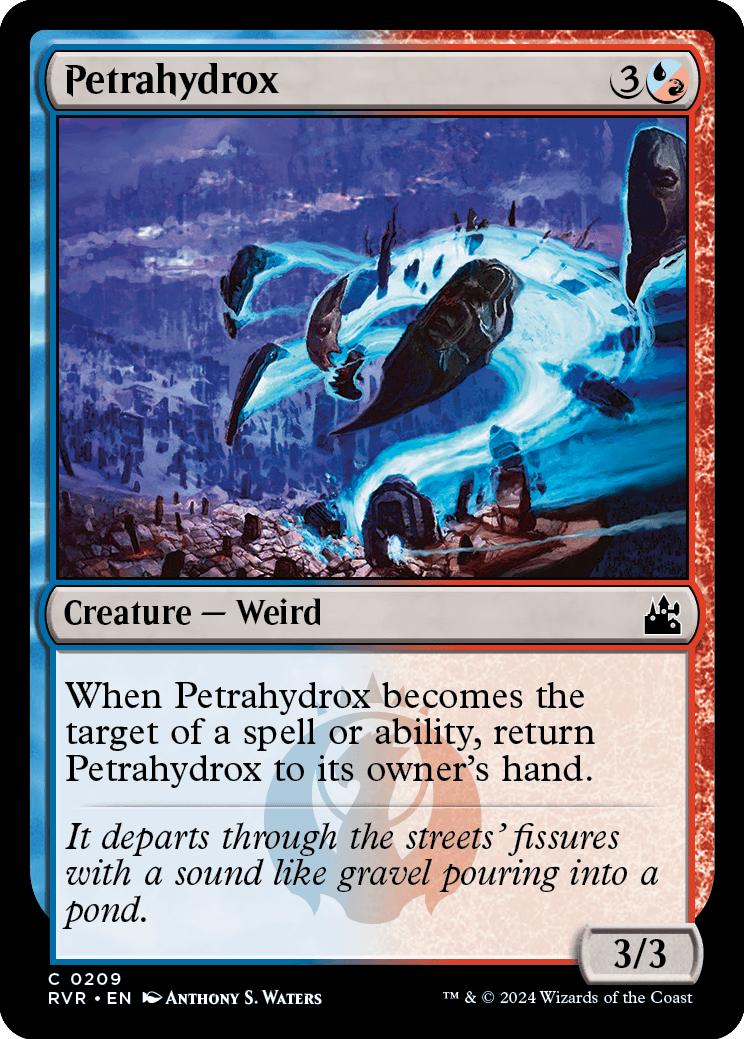
Petrahydrox
{3}{U/R}
Creature — Weird
3/3
When Petrahydrox becomes the target of a spell or ability, return Petrahydrox to its owner's hand.
- Petrahydrox's ability triggers only if it's on the battlefield when it becomes the target of a spell or ability.
- Petrahydrox's ability resolves before the spell or ability that caused it to trigger. It resolves even if that spell or ability is countered.
- If the spell or ability that targets Petrahydrox has no other targets, it won't resolve (because it no longer has a legal target after Petrahydrox has returned to its owner's hand).
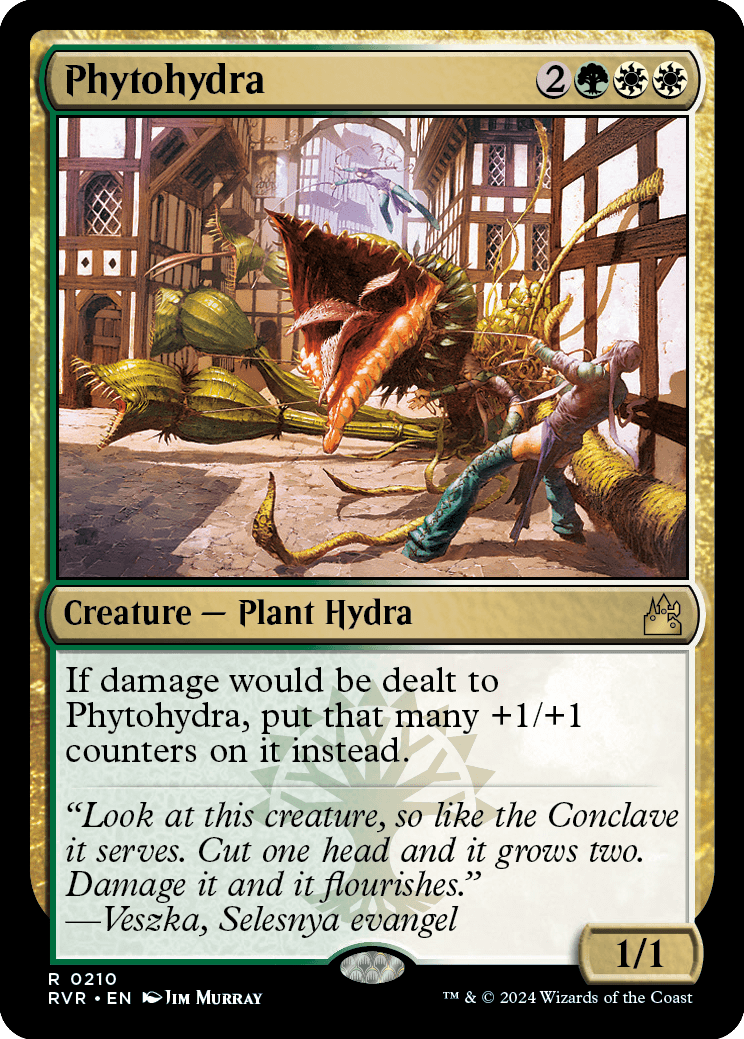
Phytohydra
{2}{G}{W}{W}
Creature — Plant Hydra
1/1
If damage would be dealt to Phytohydra, put that many +1/+1 counters on it instead.
- Phytohydra's ability doesn't prevent damage. Damage that can't be prevented will still be replaced by +1/+1 counters being put on Phytohydra.
- If another effect would prevent damage from being dealt to Phytohydra or replace it with something else, Phytohydra's controller chooses which effect to apply first.
- If Phytohydra blocks or is blocked by a creature with first strike or double strike, Phytohydra will get the counters during the first-strike combat damage step before it deals its own combat damage during the second combat damage step.
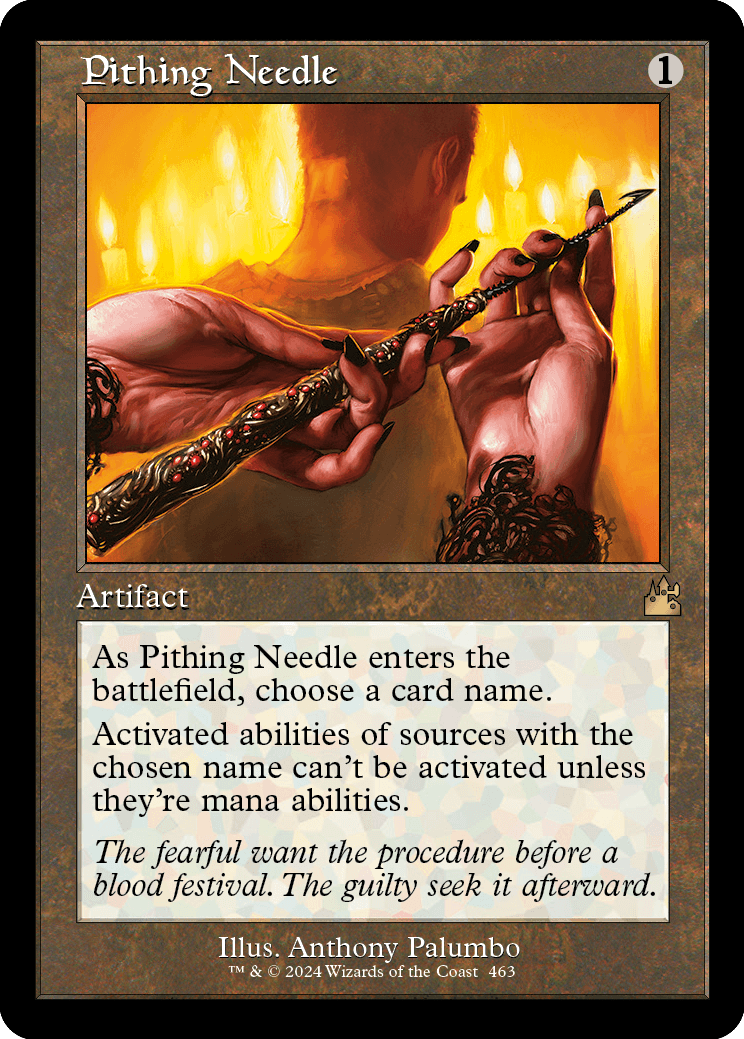
Pithing Needle
{1}
Artifact
As Pithing Needle enters the battlefield, choose a card name.
Activated abilities of sources with the chosen name can't be activated unless they're mana abilities.
- Pithing Needle affects cards regardless of what zone they're in. This includes cards in hand, cards in the graveyard, and exiled cards. For example, a player can't activate the transmute ability of Muddle the Mixture if Pithing Needle naming Muddle the Mixture is on the battlefield.
- You can name any card, even if that card doesn't normally have an activated ability. You can't name a token unless that token has the same name as a card.
- If you name a card that has both a mana ability and another activated ability, the mana ability can be activated but the other ability can't be activated.
- Once Pithing Needle has left the battlefield, activated abilities of sources with the chosen name can be activated again.
- Activated abilities contain a colon. They're generally written "[Cost]: [Effect]." Some keywords are activated abilities and will have colons in their reminder text. Loyalty abilities of planeswalkers are activated abilities. Triggered abilities (starting with "when," "whenever," or "at") are unaffected by Pithing Needle.
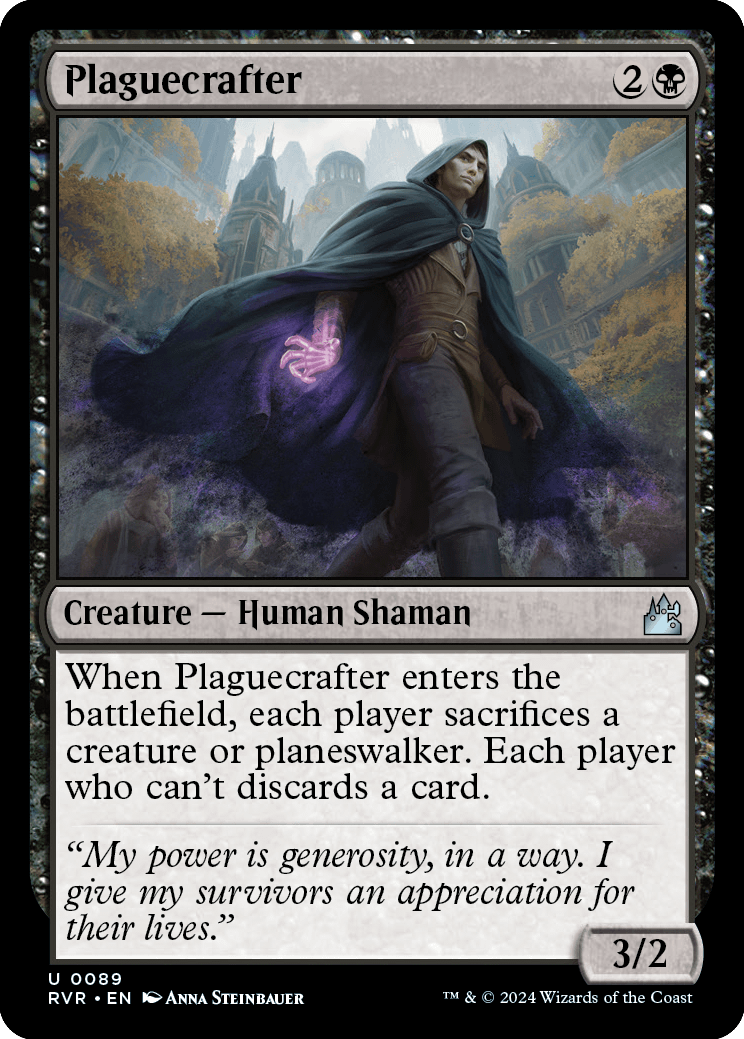
Plaguecrafter
{2}{B}
Creature — Human Shaman
3/2
When Plaguecrafter enters the battlefield, each player sacrifices a creature or planeswalker. Each player who can't discards a card.
- As Plaguecrafter's ability resolves, first the player whose turn it is chooses a creature or planeswalker they control, then each other player in turn order does the same, knowing the choices made before them. Then all the chosen permanents are sacrificed at the same time. Next, each player in the same order who couldn't sacrifice a permanent chooses a card in hand without revealing it, then the chosen cards are discarded at the same time.
- Each player chooses a permanent to sacrifice from among the creatures and planeswalkers they control. You don't choose which type of permanent any other player has to sacrifice.
- Plaguecrafter can be the creature its controller sacrifices for its own ability.
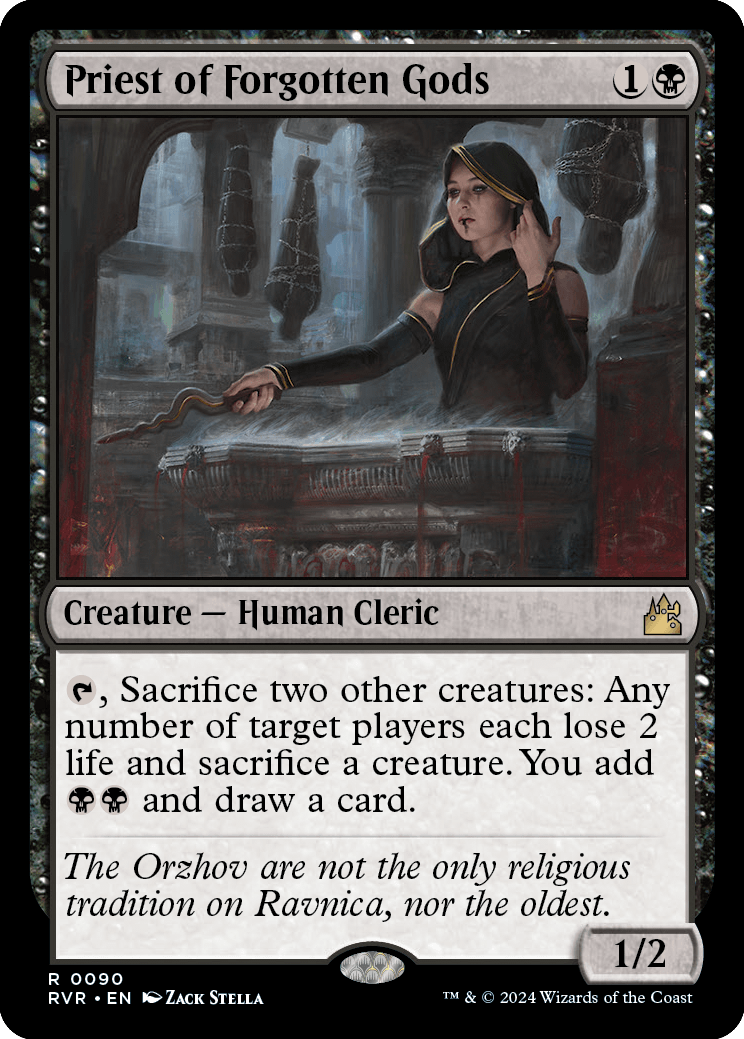
Priest of Forgotten Gods
{1}{B}
Creature — Human Cleric
1/2
{T}, Sacrifice two other creatures: Any number of target players each lose 2 life and sacrifice a creature. You add {B}{B} and draw a card.
- You can activate the ability of Priest of Forgotten Gods without choosing any targets if you wish. You'll still add {B}{B} and draw a card.
- You may target players who can't sacrifice a creature. Those players still lose 2 life.
- Because it may have targets, the ability of Priest of Forgotten Gods isn't a mana ability. It uses the stack and can be responded to, even if no targets were chosen.
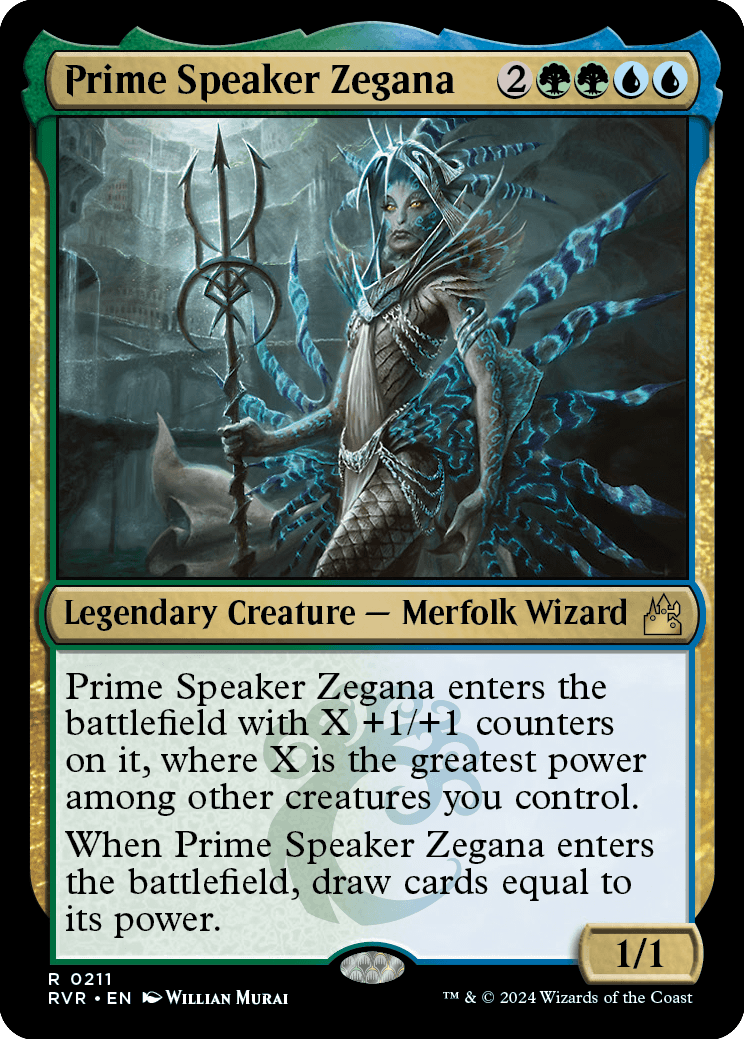
Prime Speaker Zegana
{2}{G}{G}{U}{U}
Legendary Creature — Merfolk Wizard
1/1
Prime Speaker Zegana enters the battlefield with X +1/+1 counters on it, where X is the greatest power among other creatures you control.
When Prime Speaker Zegana enters the battlefield, draw cards equal to its power.
- The value of X is the greatest power among creatures you control as Prime Speaker Zegana enters the battlefield. If you control no creatures at that time, X will be 0.
- The number of cards you draw equals Prime Speaker Zegana's power when the last ability resolves.
- If Prime Speaker Zegana enters the battlefield at the same time as another creature you control, you won't consider that creature when determining the greatest power among creatures you control.
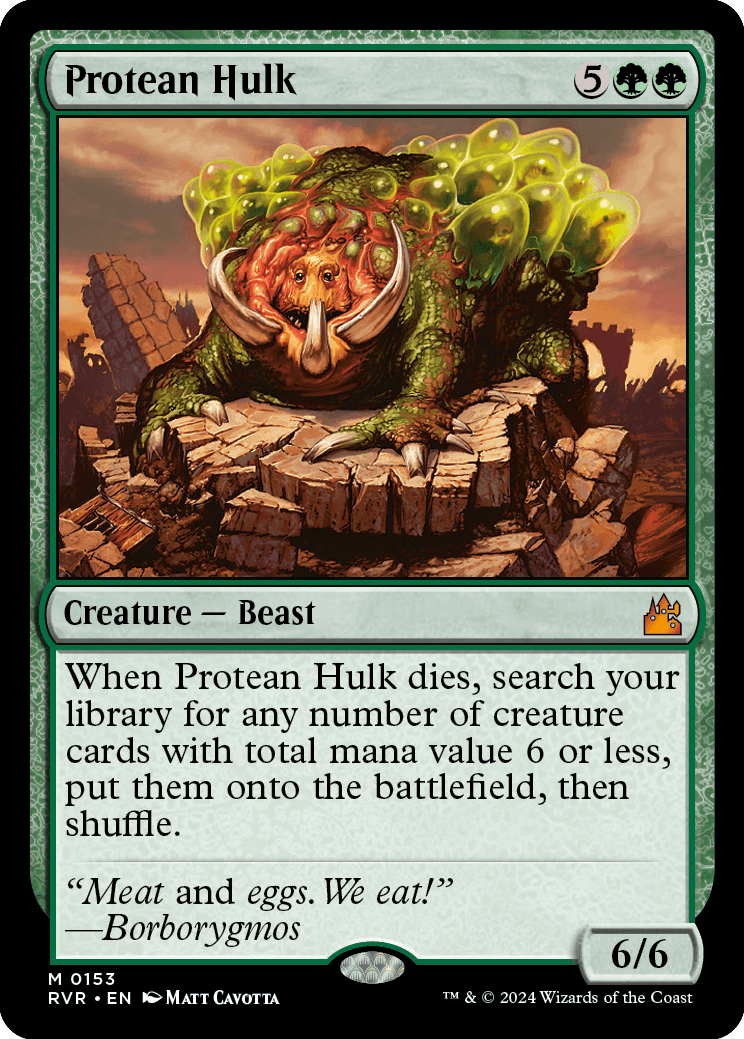
Protean Hulk
{5}{G}{G}
Creature — Beast
6/6
When Protean Hulk dies, search your library for any number of creature cards with total mana value 6 or less, put them onto the battlefield, then shuffle.
- If a card in your library has {X} in its mana cost, X is considered to be 0.
- You can find any number of creature cards, so long as their total mana value is 6 or less. For example, you could find eight creature cards with mana value 0 and three with mana value 2, but you couldn't find two with mana value 4.
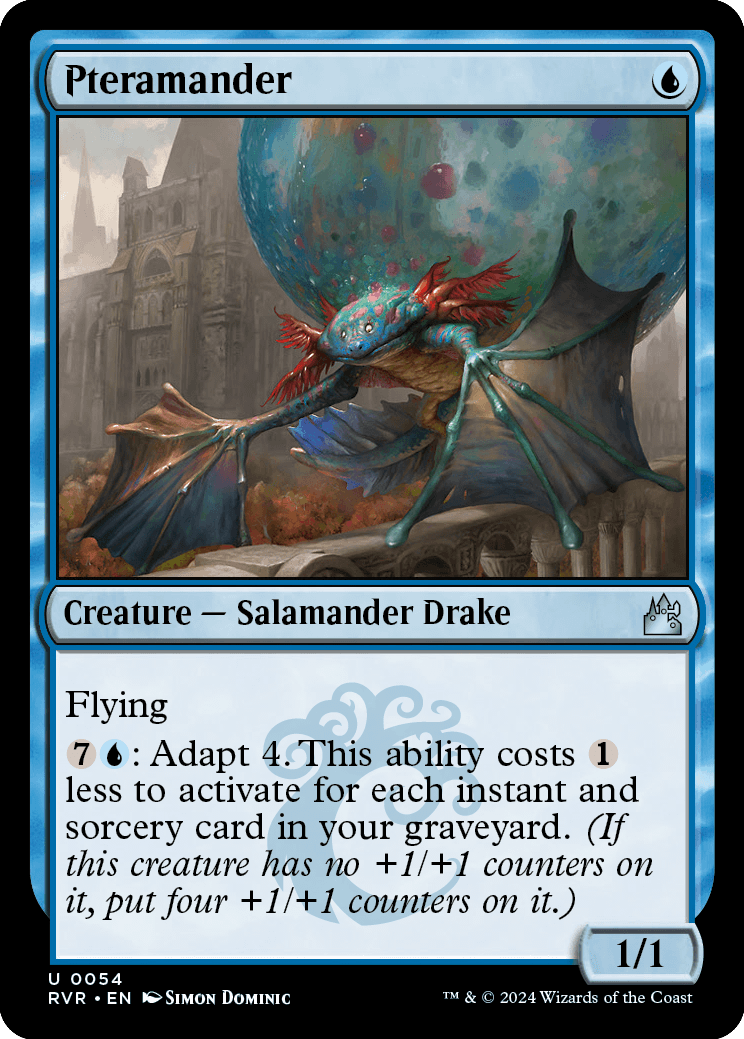
Pteramander
{U}
Creature — Salamander Drake
1/1
Flying
{7}{U}: Adapt 4. This ability costs {1} less to activate for each instant and sorcery card in your graveyard. (If this creature has no +1/+1 counters on it, put four +1/+1 counters on it.)
- Pteramander's activated ability can't reduce itself to less than {U} to activate.
- You can always activate an ability that will cause a creature to adapt. As that ability resolves, if the creature has a +1/+1 counter on it for any reason, you simply won't put any +1/+1 counters on it.
- If a creature somehow loses all of its +1/+1 counters, it can adapt again and get more +1/+1 counters.
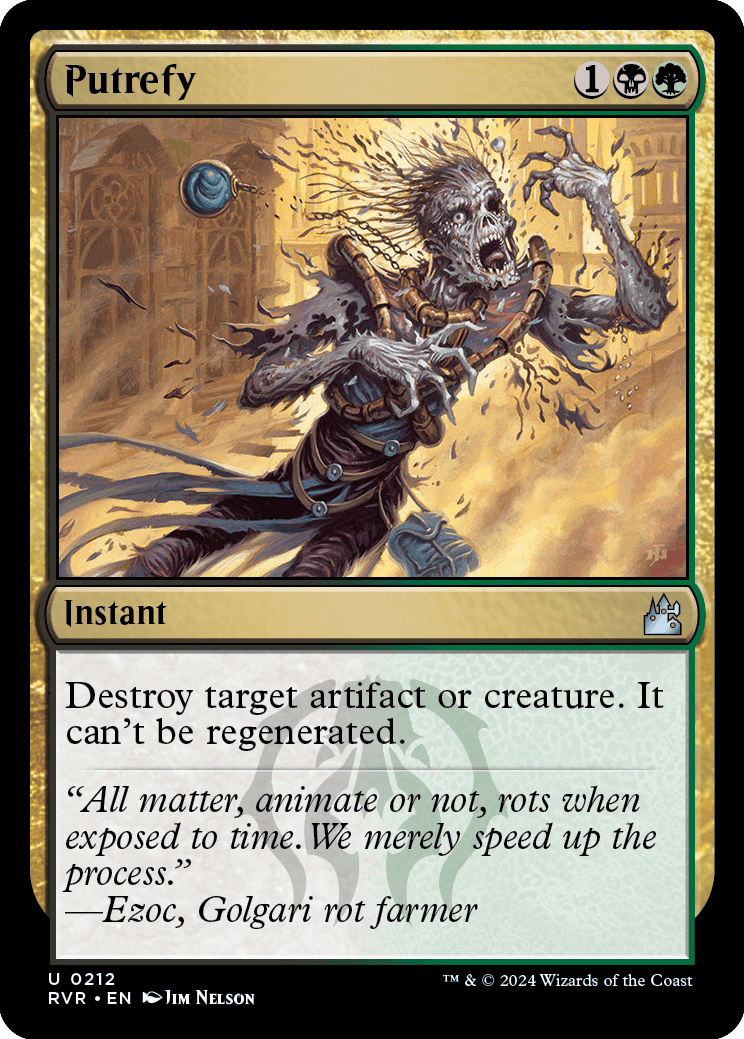
Putrefy
{1}{B}{G}
Instant
Destroy target artifact or creature. It can't be regenerated.
- This spell isn't modal. When it resolves, it will destroy the target if it's a creature or an artifact, even if it changed from one to the other between targeting and resolution.
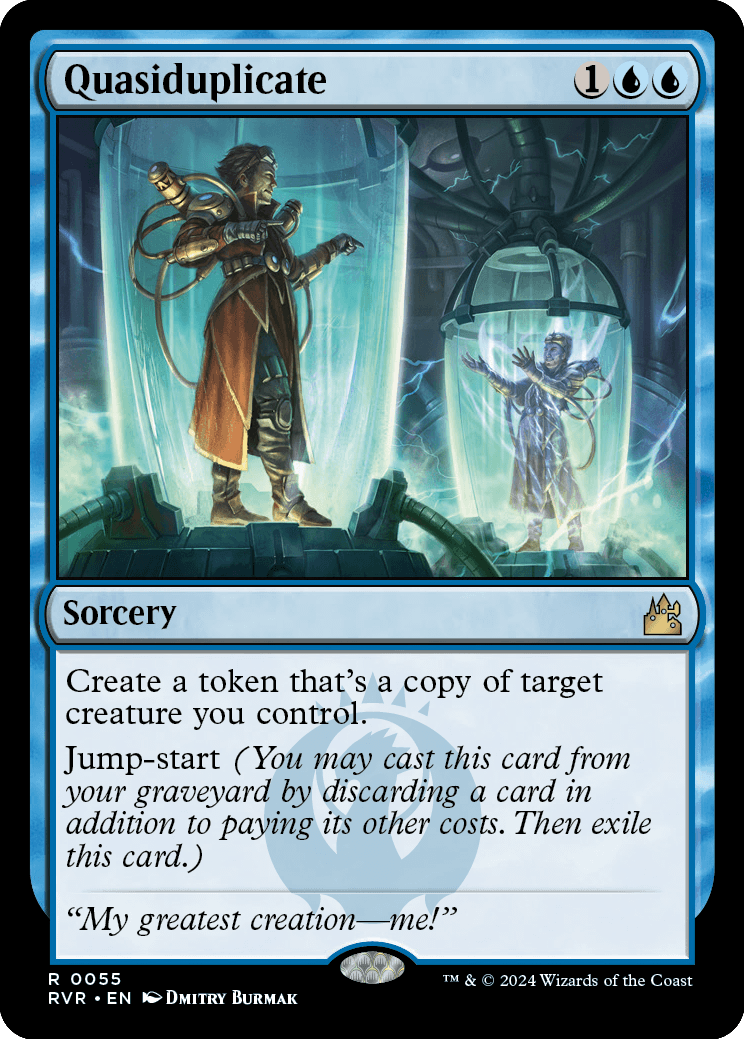
Quasiduplicate
{1}{U}{U}
Sorcery
Create a token that's a copy of target creature you control.
Jump-start (You may cast this card from your graveyard by discarding a card in addition to paying its other costs. Then exile this card.)
- The token copies exactly what is printed on the creature and nothing else (unless that creature is copying something else or is a token; see below). It doesn't copy whether that creature is tapped or untapped, whether it has any counters on it or Auras and/or Equipment attached to it, or any non-copy effects that changed its power, toughness, types, color, and so on.
- If the copied creature has {X} in its mana cost, X is 0.
- If the copied creature is copying something else, the token enters the battlefield as whatever that creature is copying.
- If the copied creature is itself a token, the token created by Quasiduplicate copies the original characteristics of that token as stated by the effect that created it.
- Any enters-the-battlefield abilities of the copied creature will trigger when the token enters the battlefield. Any "As [this creature] enters the battlefield" or "[This creature] enters the battlefield with" abilities of the copied creature will also work.
- You must still follow any timing restrictions and permissions when casting a spell with jump-start, including those based on the card's type. For instance, you can cast a sorcery using jump-start only when you could normally cast a sorcery.
- A spell cast using jump-start will always be exiled afterward, whether it resolves, it's countered, or it leaves the stack in some other way.
- If an effect allows you to pay an alternative cost rather than a spell's mana cost, you may pay that alternative cost when you jump-start a spell. You'll still discard a card as an additional cost to cast it.
- If a card with jump-start is put into your graveyard during your turn, you'll be able to cast it right away if it's legal to do so, before an opponent can take any actions.
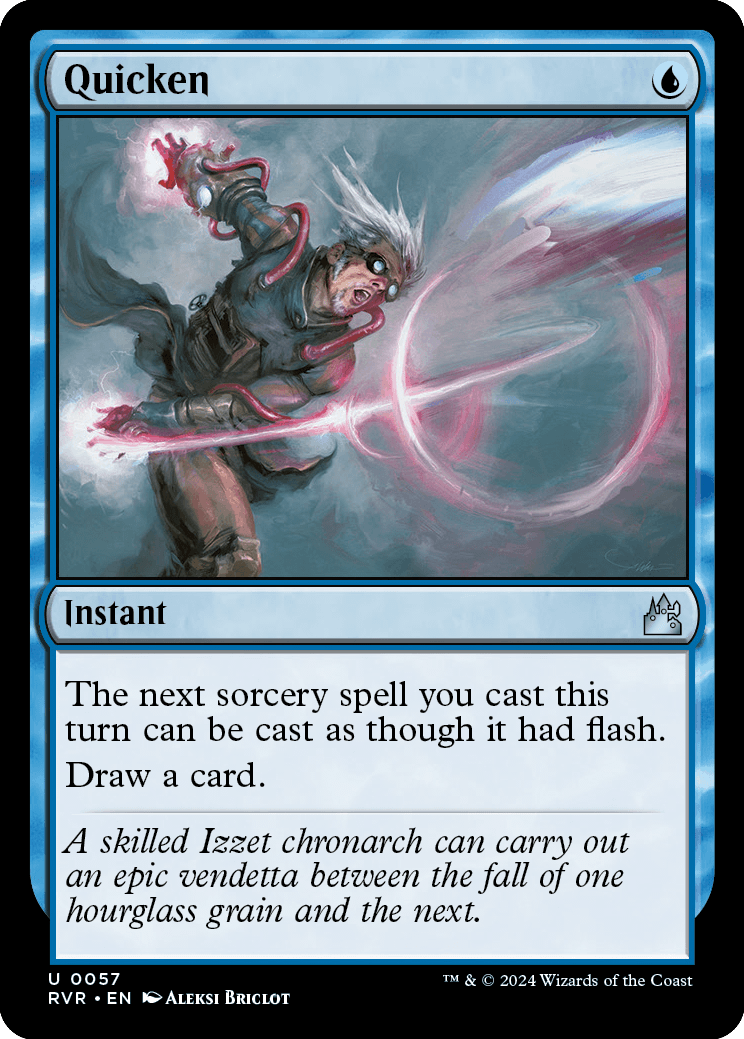
Quicken
{U}
Instant
The next sorcery spell you cast this turn can be cast as though it had flash.
Draw a card.
- You don't choose a sorcery spell when Quicken resolves. Rather, this sets up a rule that is true for you until the turn ends or until you cast a sorcery spell, even if you cast that sorcery at a time you normally couldn't.
- If you cast multiple Quickens on the same turn, they'll all apply to the very next sorcery spell you cast.
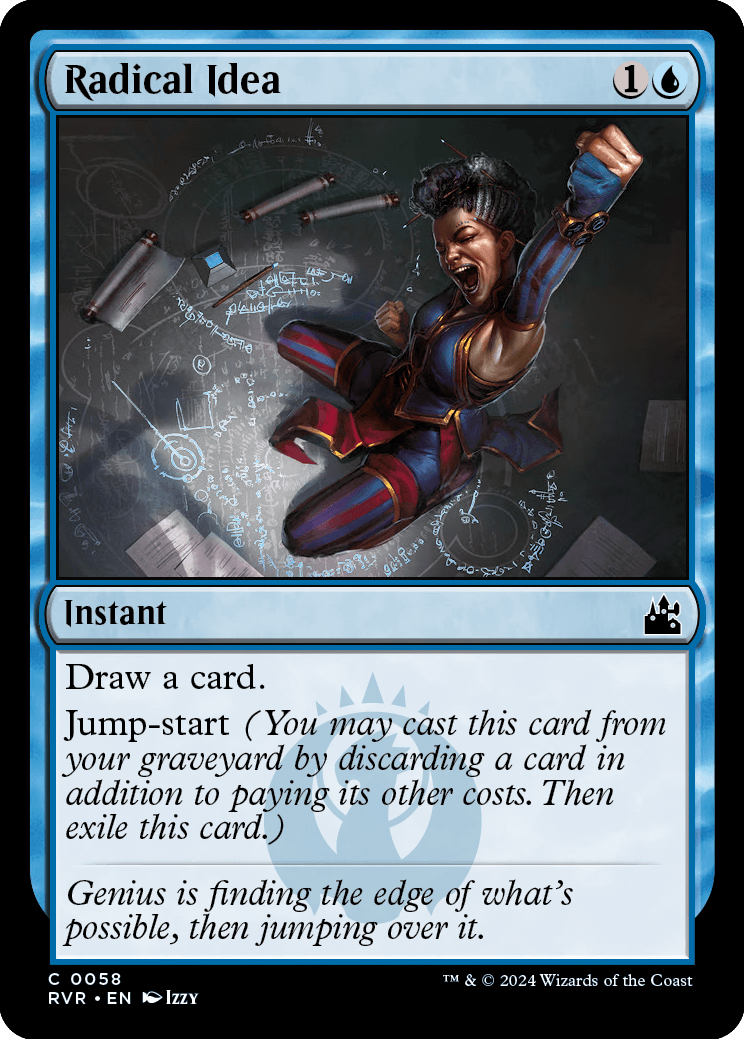
Radical Idea
{1}{U}
Instant
Draw a card.
Jump-start (You may cast this card from your graveyard by discarding a card in addition to paying its other costs. Then exile this card.)
- You must still follow any timing restrictions and permissions when casting a spell with jump-start, including those based on the card's type. For instance, you can cast a sorcery using jump-start only when you could normally cast a sorcery.
- A spell cast using jump-start will always be exiled afterward, whether it resolves, it's countered, or it leaves the stack in some other way.
- If an effect allows you to pay an alternative cost rather than a spell's mana cost, you may pay that alternative cost when you jump-start a spell. You'll still discard a card as an additional cost to cast it.
- If a card with jump-start is put into your graveyard during your turn, you'll be able to cast it right away if it's legal to do so, before an opponent can take any actions.
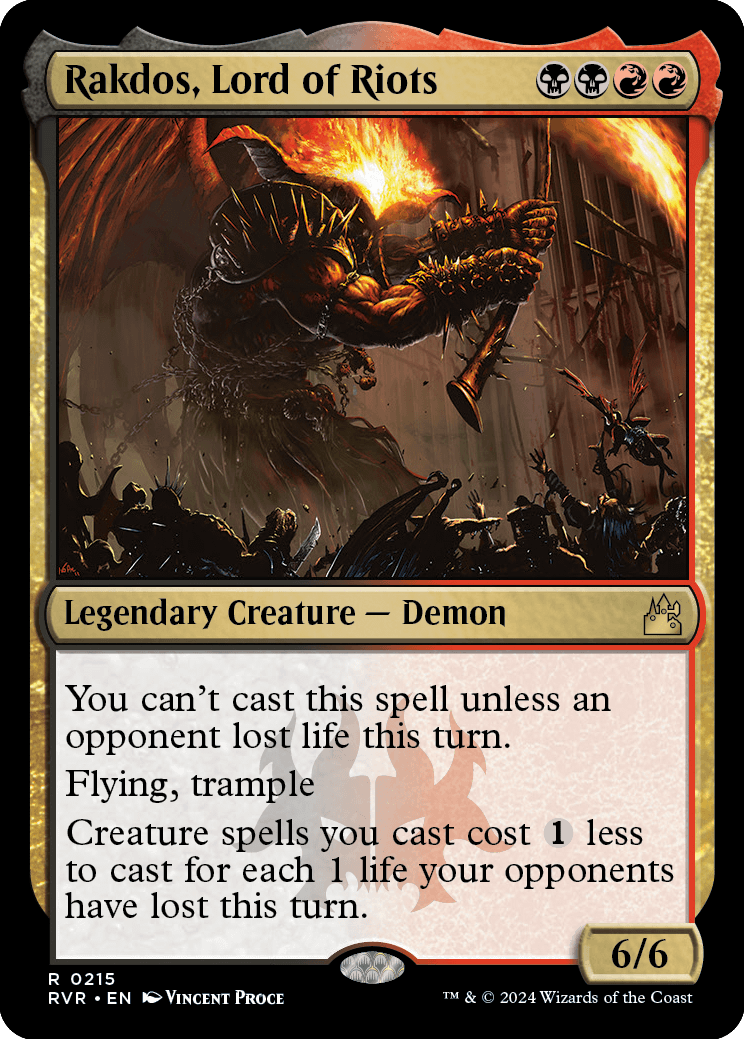
Rakdos, Lord of Riots
{B}{B}{R}{R}
Legendary Creature — Demon
6/6
You can't cast this spell unless an opponent lost life this turn.
Flying, trample
Creature spells you cast cost {1} less to cast for each 1 life your opponents have lost this turn.
- Damage dealt to a player causes that player to lose that much life.
- Rakdos can be put onto the battlefield by another spell or ability even if no opponent has lost life that turn.
- Rakdos's last ability cares about the total life lost, not necessarily what an opponent's life total is compared to what it was at the beginning of the turn. For example, if an opponent loses 5 life and then gains 10 life in a turn, creature spells you cast will cost {5} less to cast.
- If an opponent lost life and subsequently lost the game, Rakdos's first ability is satisfied, and its last ability counts that loss of life.
- Rakdos's last ability can't reduce the colored mana requirement of a creature spell you cast.
- If there are additional costs to cast a creature spell, such as a kicker cost or the commander tax, apply those increases before applying cost reductions.
- Rakdos's last ability won't reduce the cost to cast Rakdos itself. It applies only to creature spells you cast once Rakdos is on the battlefield.
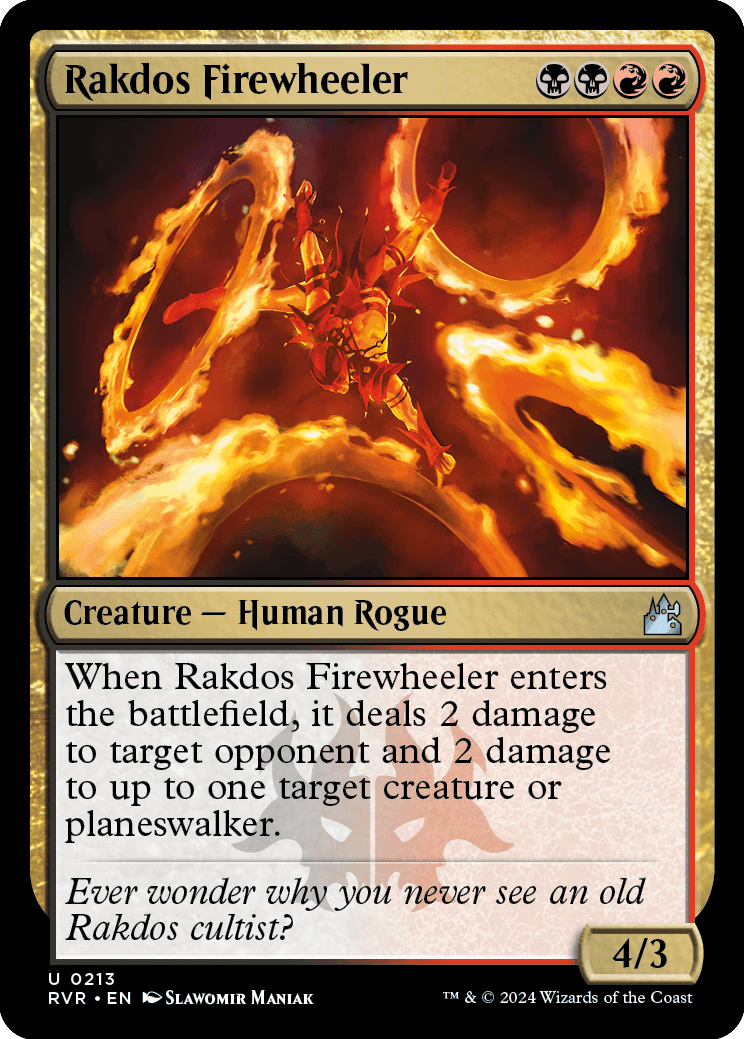
Rakdos Firewheeler
{B}{B}{R}{R}
Creature — Human Rogue
4/3
When Rakdos Firewheeler enters the battlefield, it deals 2 damage to target opponent and 2 damage to up to one target creature or planeswalker.
- If you can't target any opponent with Rakdos Firewheeler's ability, the ability doesn't go on the stack. You can't have it deal 2 damage to any creature or planeswalker. On the other hand, if you do choose two legal targets but either target is illegal when the ability tries to resolve, the other is still affected as appropriate.
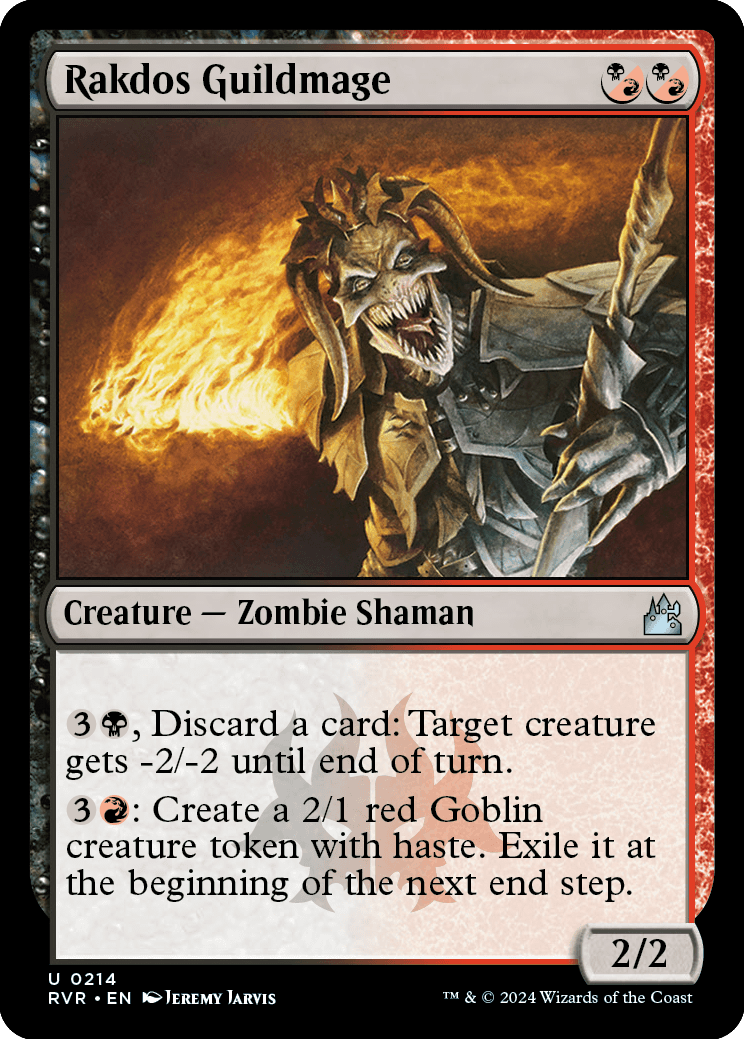
Rakdos Guildmage
{B/R}{B/R}
Creature — Zombie Shaman
2/2
{3}{B}, Discard a card: Target creature gets -2/-2 until end of turn.
{3}{R}: Create a 2/1 red Goblin creature token with haste. Exile it at the beginning of the next end step.
- If the second ability is activated during the end step, the token won't be exiled until the following turn's end step.
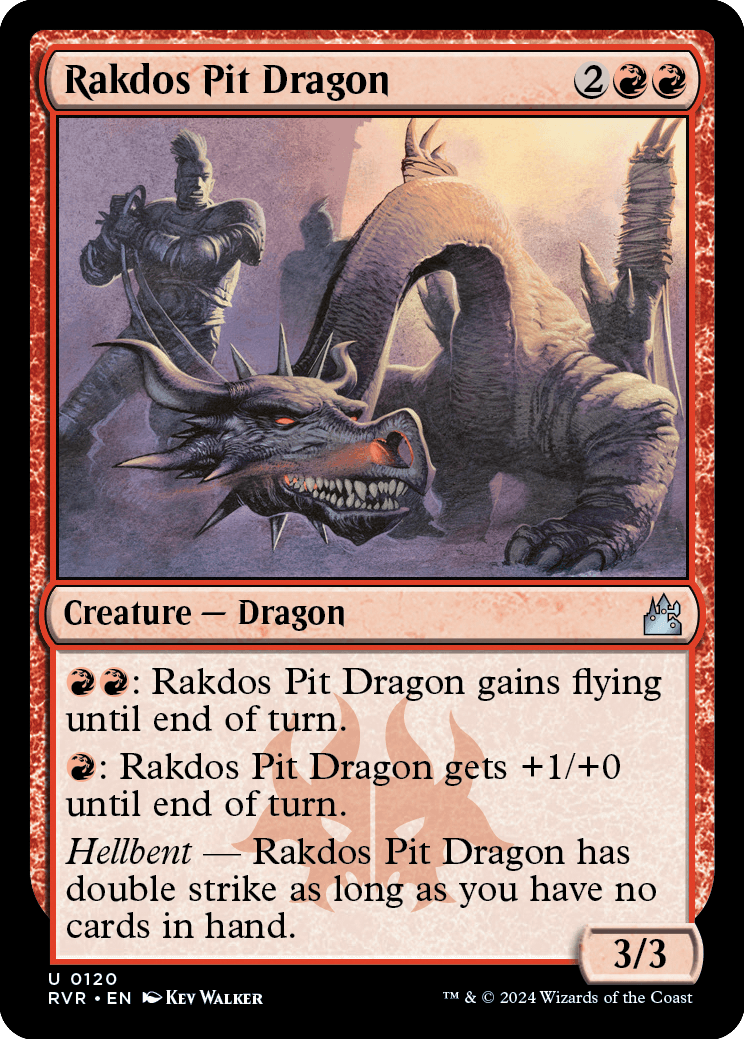
Rakdos Pit Dragon
{2}{R}{R}
Creature — Dragon
3/3
{R}{R}: Rakdos Pit Dragon gains flying until end of turn.
{R}: Rakdos Pit Dragon gets +1/+0 until end of turn.
Hellbent — Rakdos Pit Dragon has double strike as long as you have no cards in hand.
- If Rakdos Pit Dragon loses double strike after first strike combat damage has been dealt, it won't deal damage during the normal combat damage step.
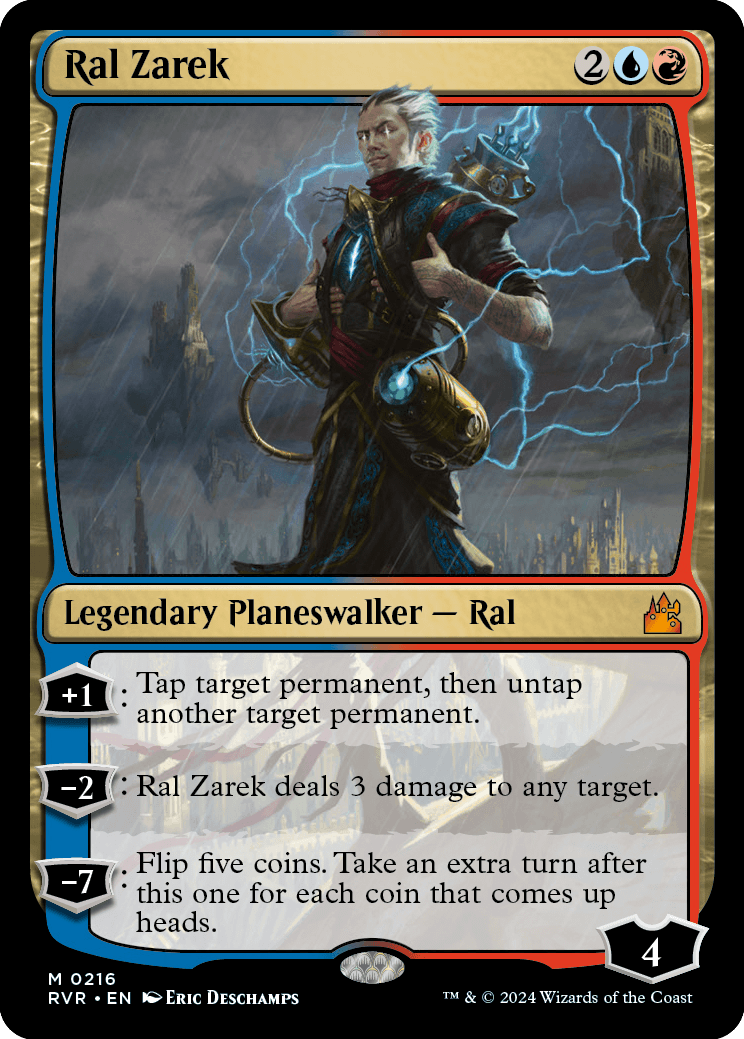
Ral Zarek
{2}{U}{R}
Legendary Planeswalker — Ral
4
+1: Tap target permanent, then untap another target permanent.
−2: Ral Zarek deals 3 damage to any target.
−7: Flip five coins. Take an extra turn after this one for each coin that comes up heads.
- Ral Zarek's first ability can target any two permanents. It doesn't matter whether they're tapped or untapped. If the first target is tapped as the ability resolves, it will just stay tapped. Similarly, if the second target is untapped as the ability resolves, it will stay untapped.
- The five coins you flip for Ral Zarek's last ability aren't called, and no one wins or loses these flips. Abilities that care about a player winning or losing a coin flip won't consider these flips.
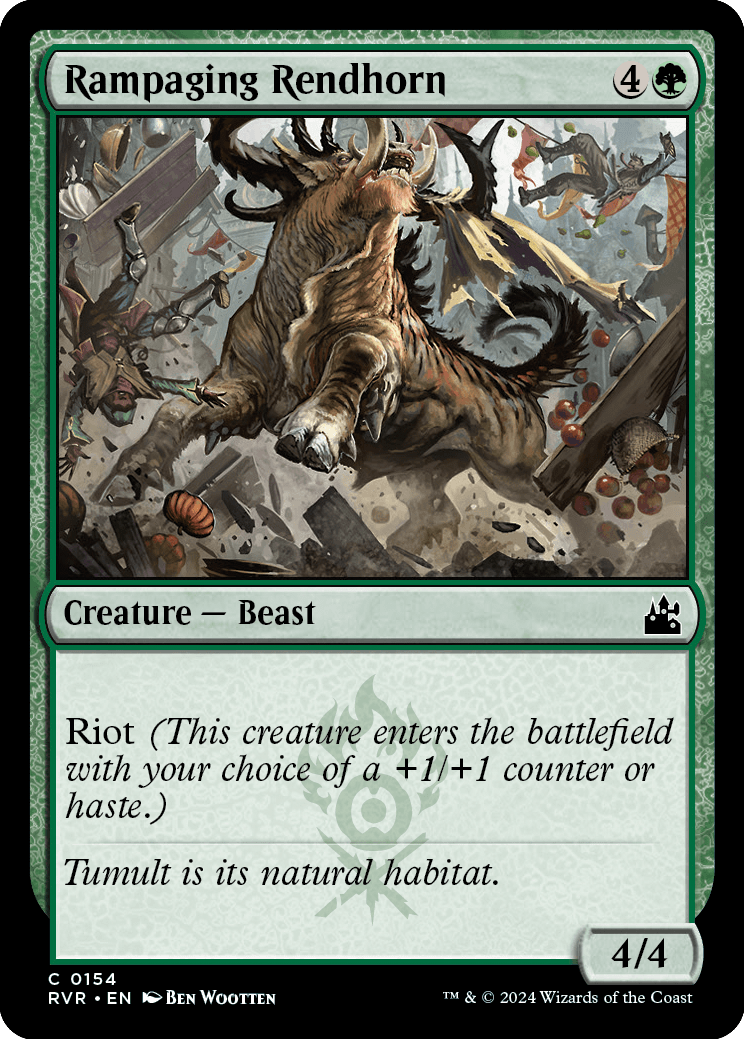
Rampaging Rendhorn
{4}{G}
Creature — Beast
4/4
Riot (This creature enters the battlefield with your choice of a +1/+1 counter or haste.)
- Riot is a replacement effect. Players can't respond to your choice of +1/+1 counter or haste, and they can't take actions while the creature is on the battlefield without one or the other.
- If a creature entering the battlefield has riot but can't have a +1/+1 counter put onto it, it gains haste.
- If you choose for the creature to gain haste, it gains haste indefinitely. It won't lose it as the turn ends or as another player gains control of it.
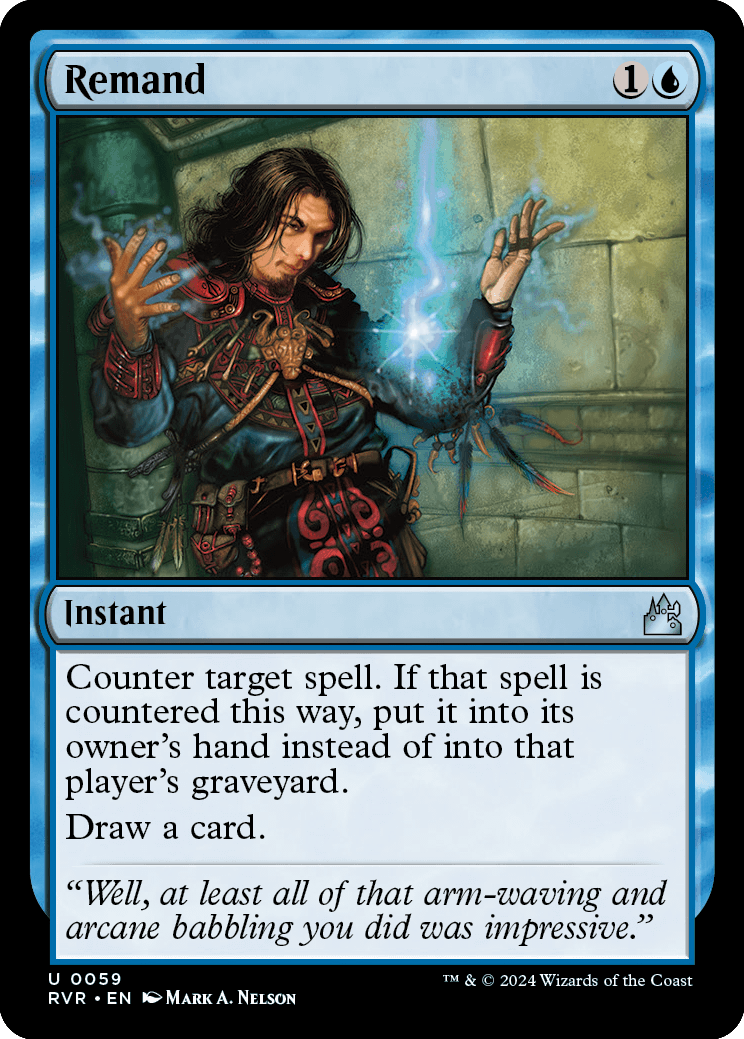
Remand
{1}{U}
Instant
Counter target spell. If that spell is countered this way, put it into its owner's hand instead of into that player's graveyard.
Draw a card.
- Remand can target a spell that can't be countered. That spell won't be countered or returned to its owner's hand, but you'll draw a card.
- If you target a card that was cast with flashback with Remand, the card will still be exiled.
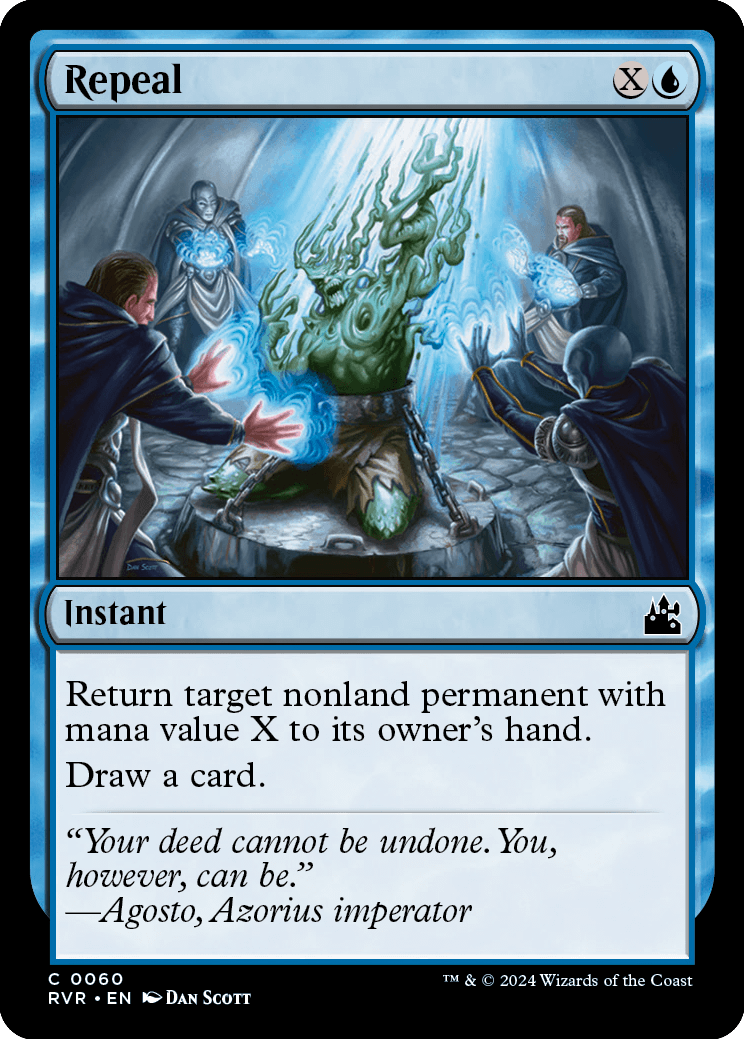
Repeal
{X}{U}
Instant
Return target nonland permanent with mana value X to its owner's hand.
Draw a card.
- If the target permanent is an illegal target by the time Repeal tries to resolve, the spell doesn't resolve. You don't draw a card.
- If a permanent on the battlefield has {X} in its mana cost, X is considered to be 0.
- Tokens that aren't a copy of something else don't have a mana cost. Anything without a mana cost normally has a mana value of 0.
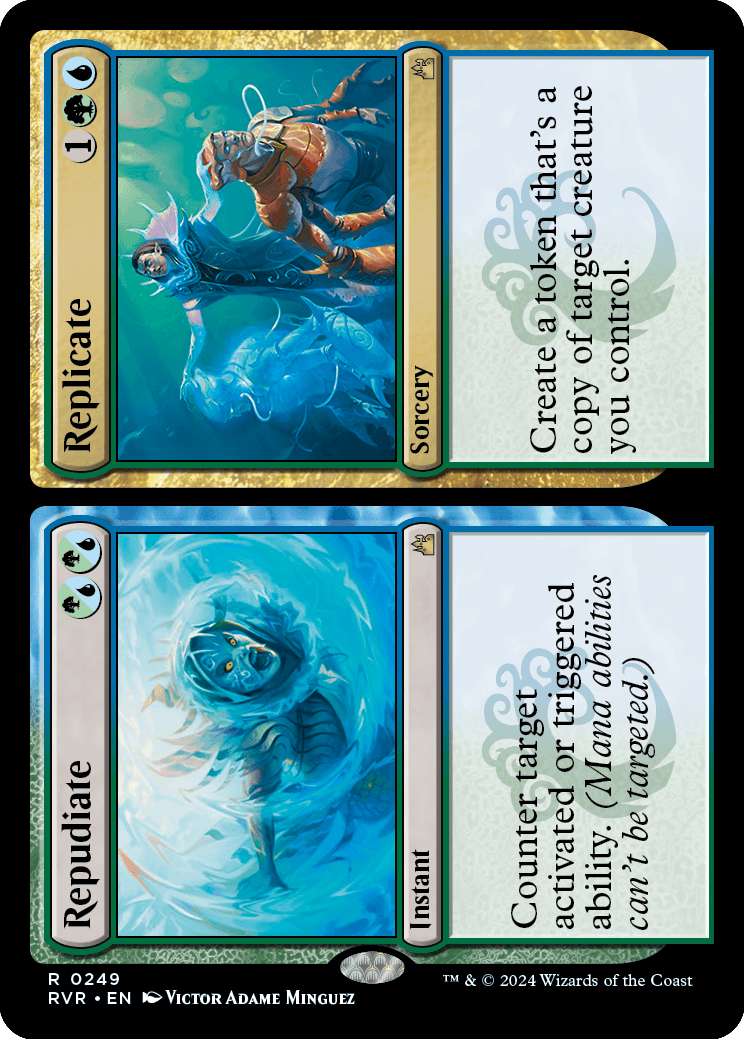
Repudiate
{G/U}{G/U}
Instant
Counter target activated or triggered ability. (Mana abilities can't be targeted.)
///
Replicate
{1}{G}{U}
Sorcery
Create a token that's a copy of target creature you control.
- Activated abilities are written in the form "[Cost]: [Effect]." Some keyword abilities, such as equip, are activated abilities and will have colons in their reminder texts. Loyalty abilities of planeswalkers are activated abilities.
- Triggered abilities use the word "when," "whenever," or "at." They're often written as "[Trigger condition], [effect]." Some keyword abilities, such as afterlife, are triggered abilities and will have "when," "whenever," or "at" in their reminder text.
- An activated mana ability is one that adds mana as it resolves, doesn't have a target, and isn't a loyalty ability. A triggered mana ability is one that adds mana and triggers on an activated mana ability.
- Abilities that create replacement effects, such as a permanent entering the battlefield tapped or with counters on it, can't be targeted. Abilities that apply "as [this creature] enters the battlefield" are also replacement effects and can't be targeted.
- If you counter a delayed triggered ability that triggered at the beginning of the "next" occurrence of a specified step or phase, that ability won't trigger again the following time that phase or step occurs.
- The token copies exactly what was printed on the original creature and nothing else (unless that creature is copying something else or is a token; see below). It doesn't copy whether that creature is tapped or untapped, whether it has any counters on it or Auras and Equipment attached to it, or any non-copy effects that have changed its power, toughness, types, color, or so on.
- If the copied creature has {X} in its mana cost, X is 0.
- If the copied creature is a token, the token that's created copies the original characteristics of that token as stated by the effect that created the token.
- If the copied creature is copying something else (for example, if the copied creature is a Mirror Image), then the token enters the battlefield as whatever that creature copied.
- Any enters-the-battlefield abilities of the copied creature will trigger when the token enters the battlefield. Any "as [this creature] enters the battlefield" or "[this creature] enters the battlefield with" abilities of the chosen creature will also work.
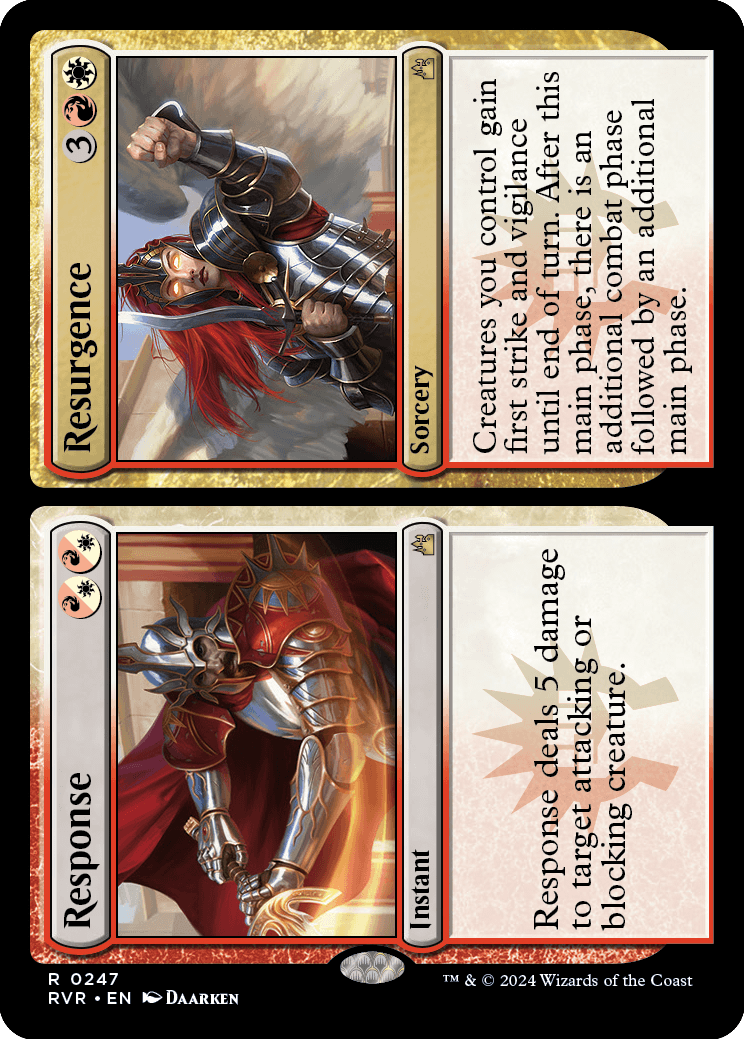
Response
{R/W}{R/W}
Instant
Response deals 5 damage to target attacking or blocking creature.
///
Resurgence
{3}{R}{W}
Sorcery
Creatures you control gain first strike and vigilance until end of turn. After this main phase, there is an additional combat phase followed by an additional main phase.
- An "attacking creature" is one that has been declared as an attacker or put onto the battlefield attacking during this combat. Unless that creature leaves combat, it continues to be an attacking creature through the end of combat step, even if the player it was attacking has left the game or the planeswalker it was attacking has left combat. Similarly, a "blocking creature" is one that has been declared as a blocker or put onto the battlefield blocking during this combat.
- Resurgence affects only creatures you control at the time it resolves. Creatures that come under your control later in the turn won't gain first strike and vigilance.
- If it's not a main phase as Resurgence resolves (perhaps because you cast it as though it had flash), there won't be an additional combat phase or an additional main phase.
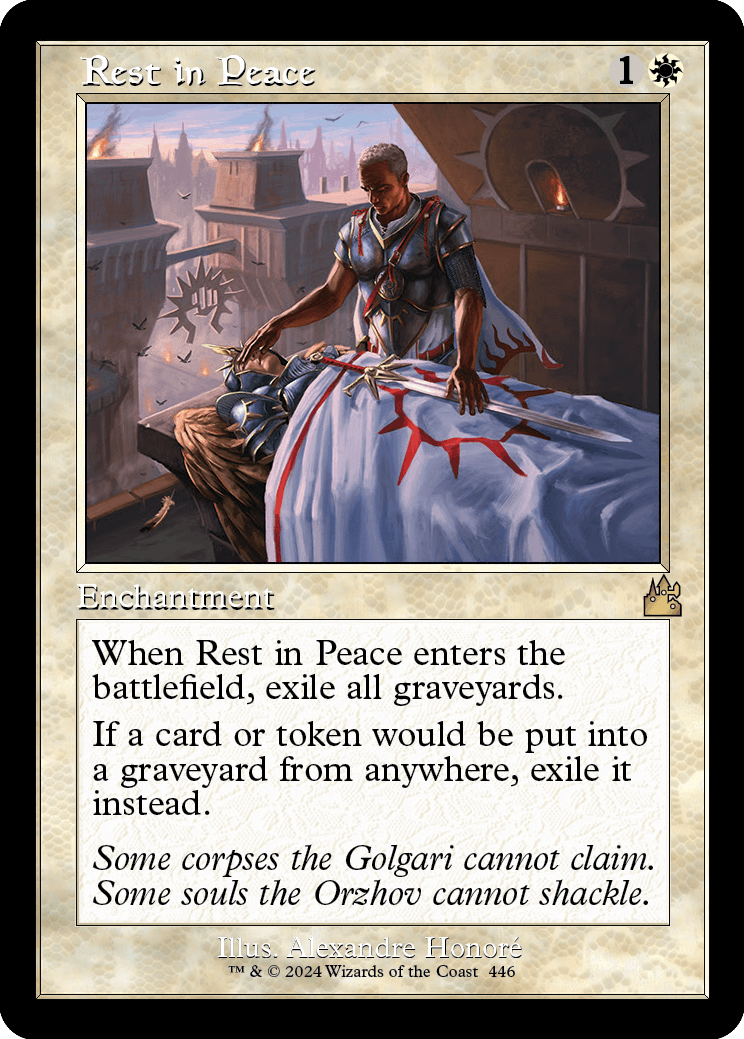
Rest in Peace
{1}{W}
Enchantment
When Rest in Peace enters the battlefield, exile all graveyards.
If a card or token would be put into a graveyard from anywhere, exile it instead.
- While Rest in Peace is on the battlefield, abilities that trigger whenever a creature dies won't trigger because cards and tokens are never put into a player's graveyard.
- If Rest in Peace is destroyed by a spell, Rest in Peace will be exiled and then the spell will be put into its owner's graveyard.
- If a card is discarded while Rest in Peace is on the battlefield, abilities that function when a card is discarded (such as madness) still work, even though that card never reaches a graveyard. In addition, spells or abilities that check the characteristics of a discarded card (such as Chandra Ablaze's first ability) can find that card in exile.
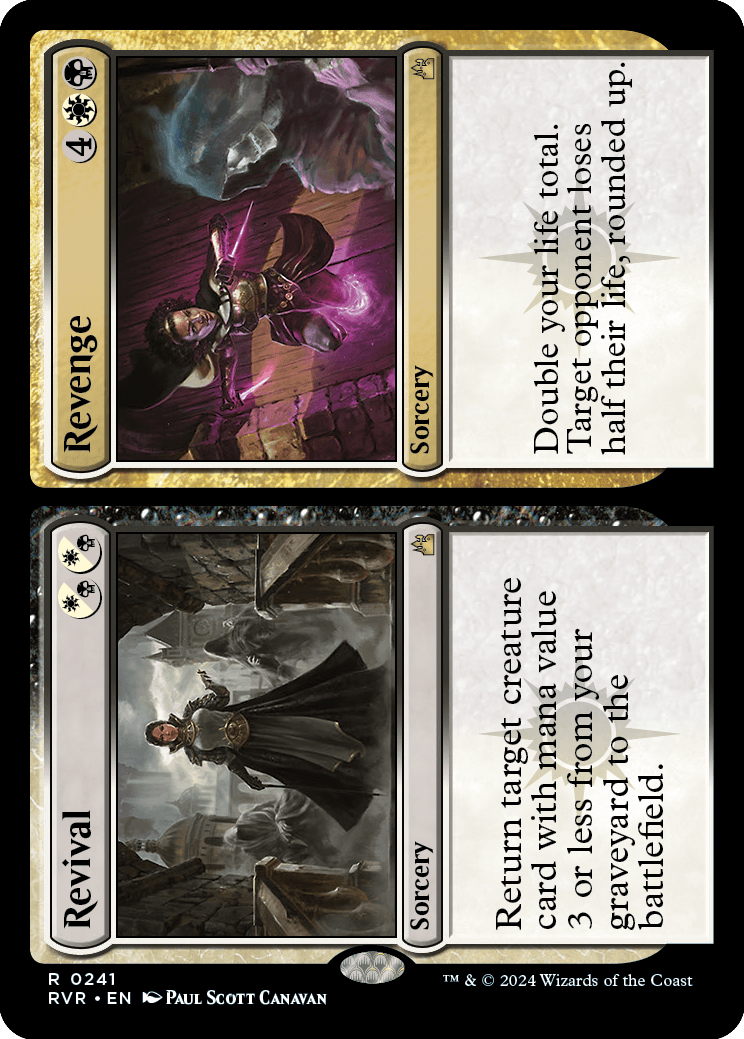
Revival
{W/B}{W/B}
Sorcery
Return target creature card with mana value 3 or less from your graveyard to the battlefield.
///
Revenge
{4}{W}{B}
Sorcery
Double your life total. Target opponent loses half their life, rounded up.
- If a card in a graveyard has {X} in its mana cost, X is considered to be 0.
- To double a player's life total, that player gains as much life as needed so that their life total is twice the number it was before. If their life total was negative, that player loses as much life as needed so that their life total is twice as far below 0 as it was before. Other effects interact with this life gain or loss accordingly.
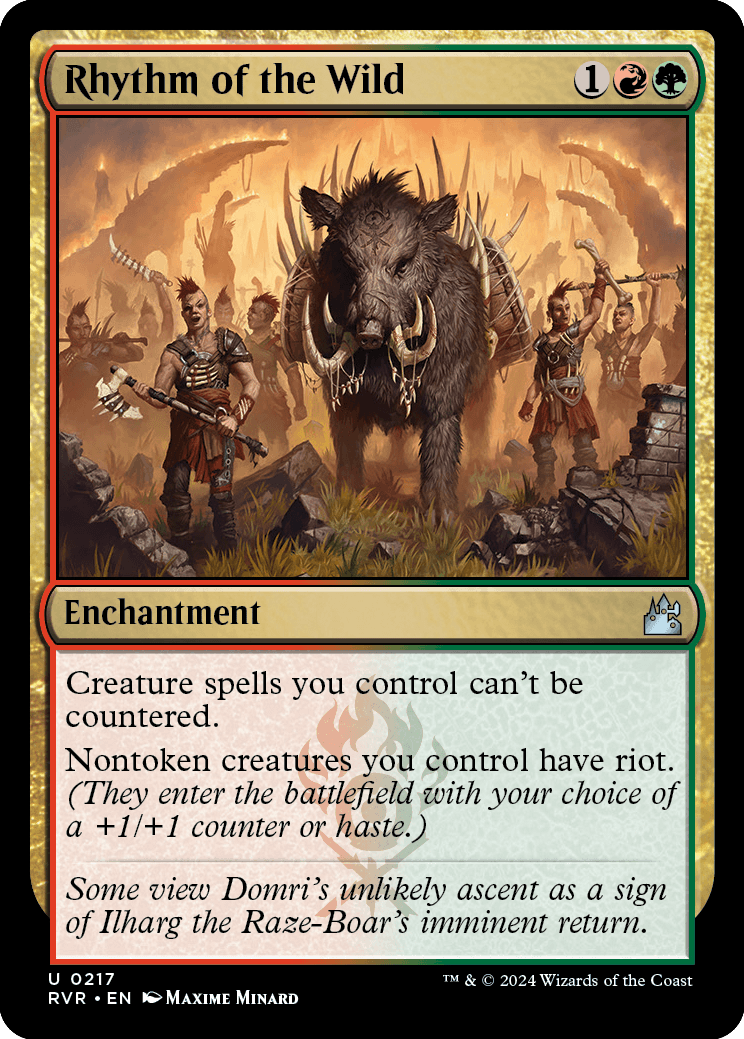
Rhythm of the Wild
{1}{R}{G}
Enchantment
Creature spells you control can't be countered.
Nontoken creatures you control have riot. (They enter the battlefield with your choice of a +1/+1 counter or haste.)
- A spell or ability that counters spells can still target a creature spell you control. When that spell or ability resolves, the creature spell won't be countered, but any additional effects of that spell or ability will still happen.
- Once a creature with riot has entered the battlefield, it keeps its +1/+1 counter or haste even if it loses riot.
- If a nontoken, noncreature permanent becomes a creature after it's already on the battlefield, it will have riot but it will be too late for the replacement effect to have any effect.
- A noncreature card that happens to be entering the battlefield as a creature will have riot (for example, Gideon Blackblade as long as it's your turn). Similarly, a creature card entering the battlefield as a noncreature permanent won't have riot (for example, Thassa, God of the Sea while your other permanents contribute only four to your devotion to blue).
- Riot is a replacement effect. Players can't respond to your choice of +1/+1 counter or haste, and they can't take actions while the creature is on the battlefield without one or the other.
- If a creature entering the battlefield has riot but can't have a +1/+1 counter put onto it, it gains haste.
- If you choose for the creature to gain haste, it gains haste indefinitely. It won't lose it as the turn ends or as another player gains control of it.
- If a creature enters the battlefield with two instances of riot, you may choose to have it get two +1/+1 counters, one +1/+1 counter and haste, or two instances of haste. Multiple instances of haste on the same creature are redundant, but we're not going to tell the Gruul how to live their lives.
- If Rhythm of the Wild leaves the battlefield at the same time that a nontoken creature enters the battlefield (most likely because that creature has a replacement effect, such as that of Rescuer Sphinx), that creature still gets a +1/+1 counter or haste.
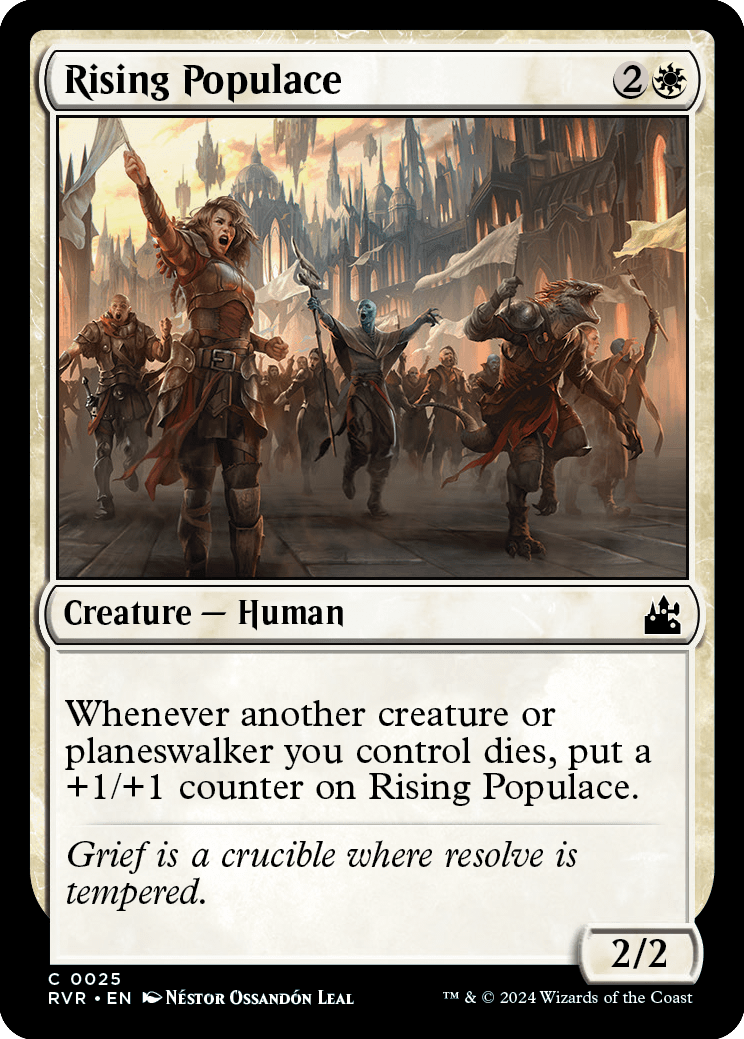
Rising Populace
{2}{W}
Creature — Human
2/2
Whenever another creature or planeswalker you control dies, put a +1/+1 counter on Rising Populace.
- If a planeswalker that's also a creature dies, Rising Populace's ability triggers only once.
- If Rising Populace and another creature you control die simultaneously (perhaps because they were both dealt lethal damage in combat), Rising Populace won't be on the battlefield as its triggered ability resolves. It can't be saved by the +1/+1 counter that would have been put on it.
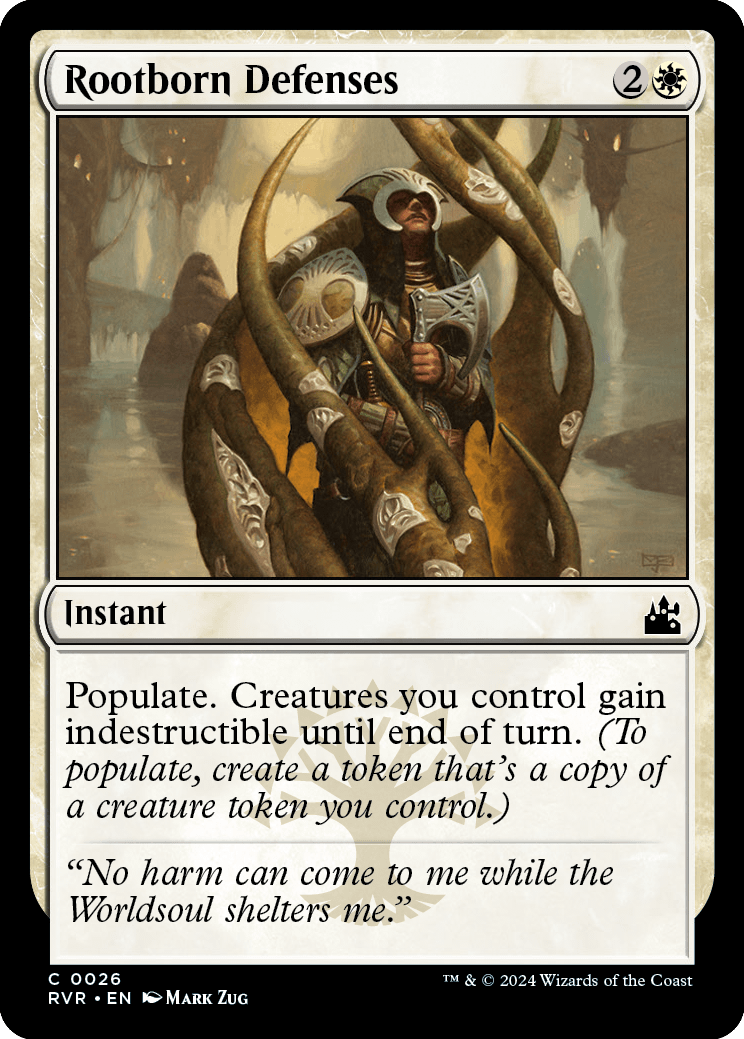
Rootborn Defenses
{2}{W}
Instant
Populate. Creatures you control gain indestructible until end of turn. (To populate, create a token that's a copy of a creature token you control.)
- Rootborn Defenses affects only creatures you control after populating at the time it resolves. The creature token you create will gain indestructible, but creatures you begin to control later in the turn will not.
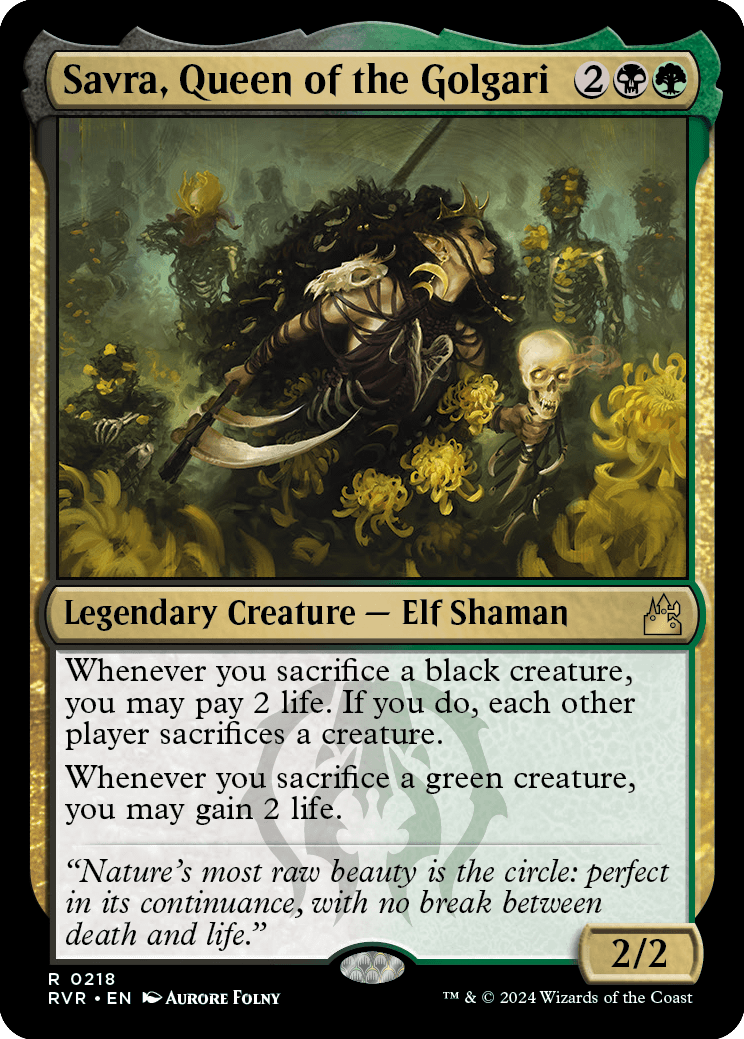
Savra, Queen of the Golgari
{2}{B}{G}
Legendary Creature — Elf Shaman
2/2
Whenever you sacrifice a black creature, you may pay 2 life. If you do, each other player sacrifices a creature.
Whenever you sacrifice a green creature, you may gain 2 life.
- Savra itself doesn't let you sacrifice creatures. Its abilities trigger whenever you sacrifice a black or green creature because some other spell, ability, or cost instructed you to do so.
- Sacrificing a creature that's both black and green will make both abilities trigger. You may put them on the stack in whichever order you want.
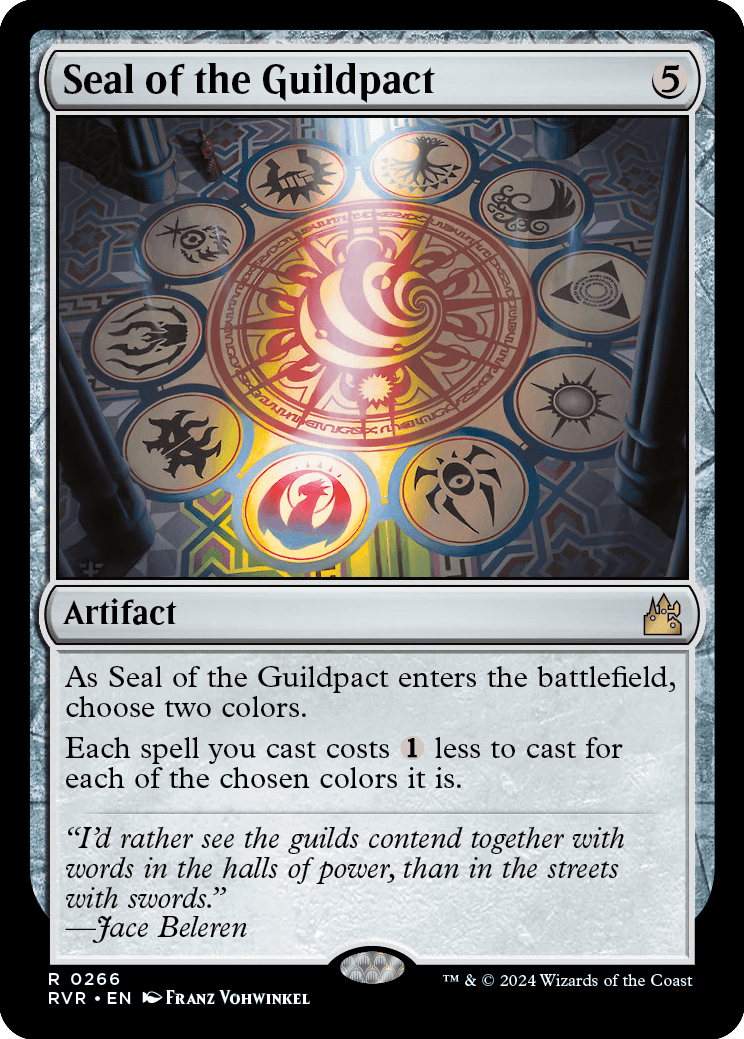
Seal of the Guildpact
{5}
Artifact
As Seal of the Guildpact enters the battlefield, choose two colors.
Each spell you cast costs {1} less to cast for each of the chosen colors it is.
- You must choose two different colors.
- Seal of the Guildpact's last ability doesn't change the mana cost or mana value of any spell. It changes only the total cost you pay.
- Seal of the Guildpact's last ability can't reduce the amount of colored mana you pay for a spell. It reduces only the generic component of that cost.
- If there are additional costs to cast a spell, or if the cost to cast a spell is increased by an effect (such as the one created by Thalia, Guardian of Thraben's ability), apply those increases before applying cost reductions.
- The cost reduction can apply to alternative costs such as evoke costs.
- If a spell you cast has {X} in its mana cost, you choose the value of X before calculating the spell's total cost. For example, if that spell's mana cost is {X}{R}{G} and you've chosen red and green, you could choose 5 as the value of X and pay {3}{R}{G} to cast the spell.
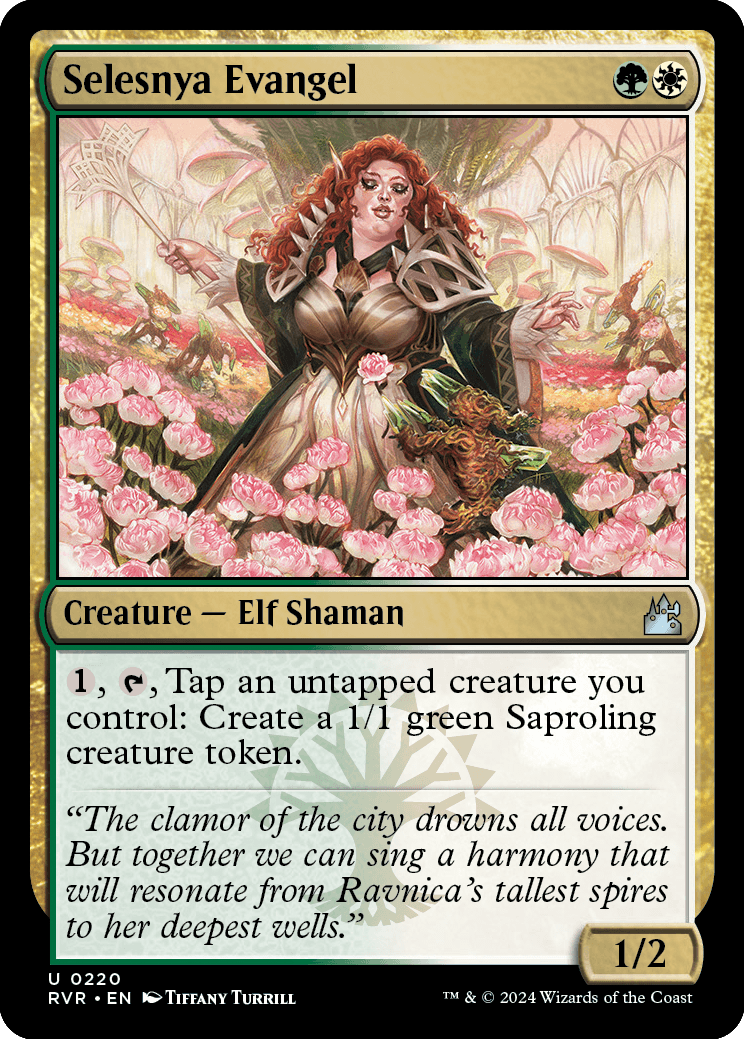
Selesnya Evangel
{G}{W}
Creature — Elf Shaman
1/2
{1}, {T}, Tap an untapped creature you control: Create a 1/1 green Saproling creature token.
- You can tap any untapped creature you control, including one you haven't controlled continuously since the beginning of your most recent turn, to pay the cost of Selesnya Evangel's activated ability. You must have controlled Selesnya Evangel continuously since the beginning of your most recent turn, however.
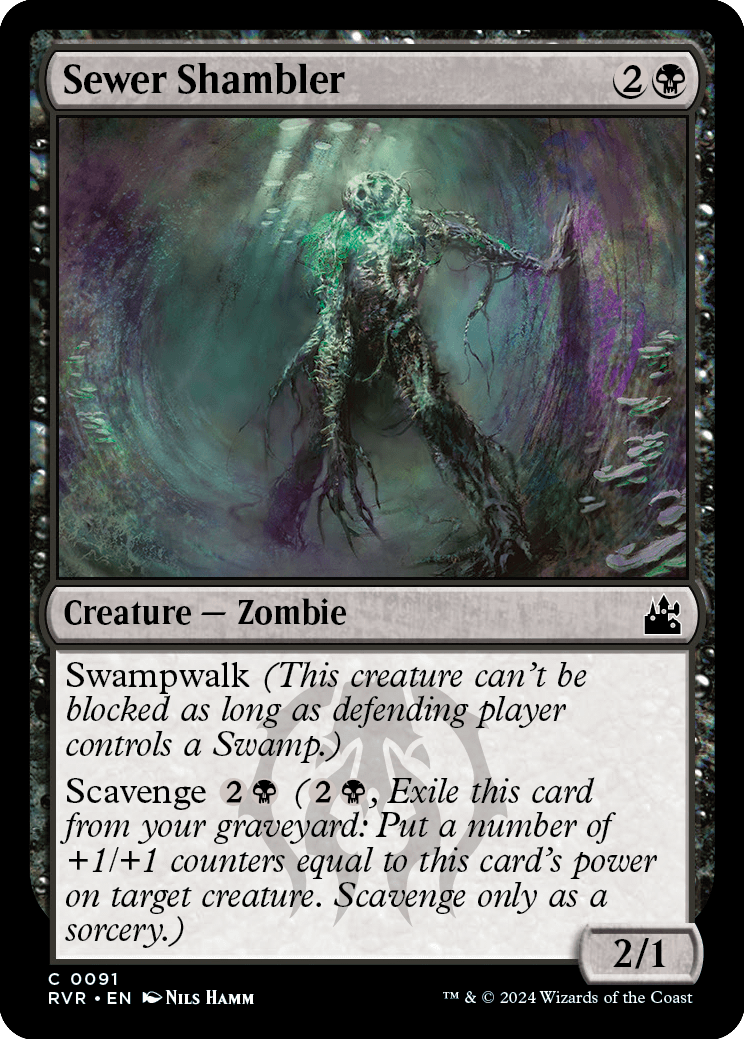
Sewer Shambler
{2}{B}
Creature — Zombie
2/1
Swampwalk (This creature can't be blocked as long as defending player controls a Swamp.)
Scavenge {2}{B} ({2}{B}, Exile this card from your graveyard: Put a number of +1/+1 counters equal to this card's power on target creature. Scavenge only as a sorcery.)
- Exiling the creature card with scavenge is part of the cost of activating the scavenge ability. Once the ability is activated and the cost is paid, it's too late to stop the ability from being activated by trying to remove the creature card from the graveyard.
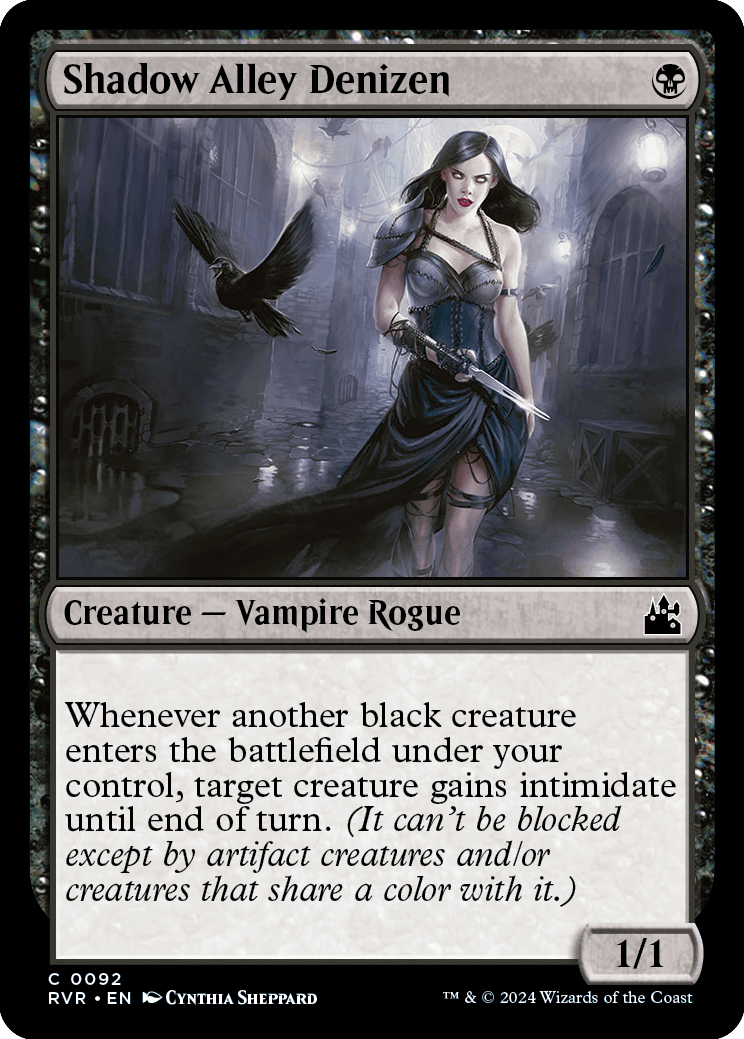
Shadow Alley Denizen
{B}
Creature — Vampire Rogue
1/1
Whenever another black creature enters the battlefield under your control, target creature gains intimidate until end of turn. (It can't be blocked except by artifact creatures and/or creatures that share a color with it.)
- The black creature that entered the battlefield can be chosen as the target of Shadow Alley Denizen's ability, but it won't be able to attack that turn unless it also has haste.
- Shadow Alley Denizen can be chosen as the target of its own ability.
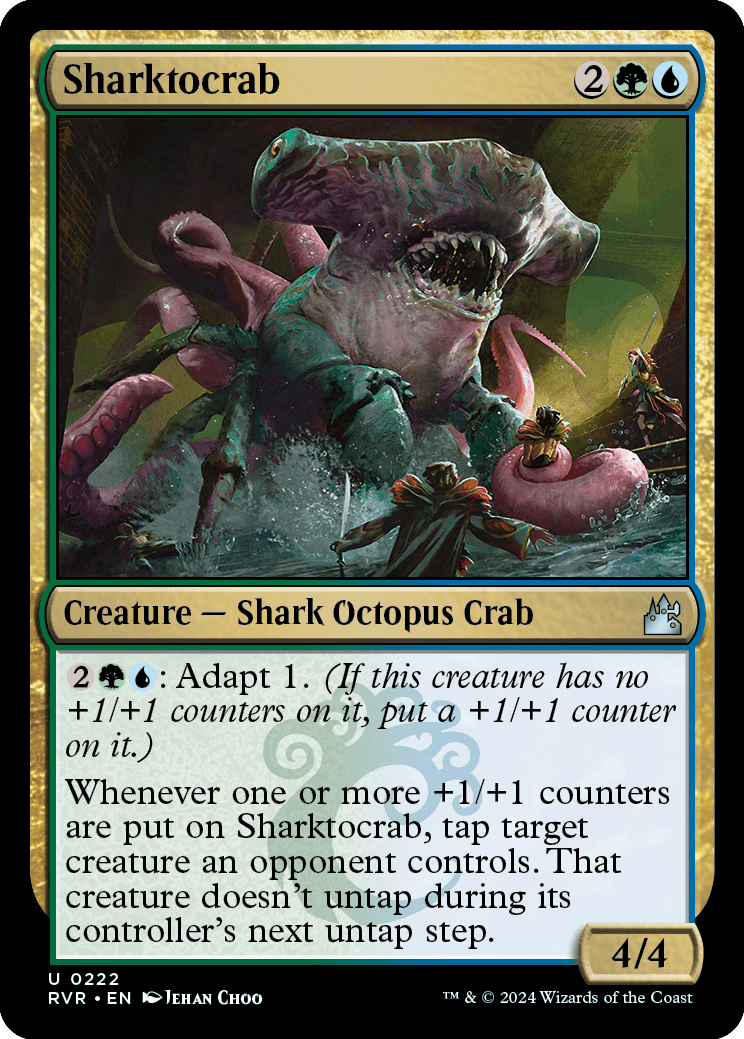
Sharktocrab
{2}{G}{U}
Creature — Shark Octopus Crab
4/4
{2}{G}{U}: Adapt 1. (If this creature has no +1/+1 counters on it, put a +1/+1 counter on it.)
Whenever one or more +1/+1 counters are put on Sharktocrab, tap target creature an opponent controls. That creature doesn't untap during its controller's next untap step.
- Sharktocrab's triggered ability can target a creature that's already tapped. That creature won't untap during its controller's next untap step.
- An ability that triggers when counters are put on a permanent will trigger if that permanent somehow enters the battlefield with those counters.
- You can always activate an ability that will cause a creature to adapt. As that ability resolves, if the creature has a +1/+1 counter on it for any reason, you simply won't put any +1/+1 counters on it.
- If a creature somehow loses all of its +1/+1 counters, it can adapt again and get more +1/+1 counters.
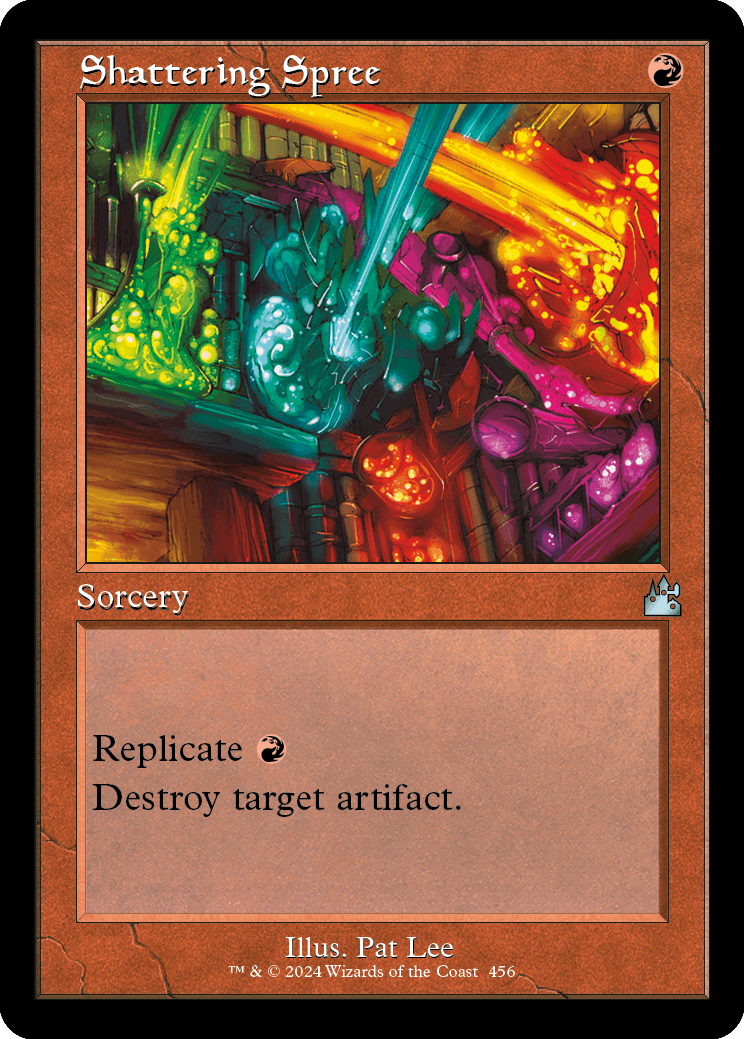
Shattering Spree
{R}
Sorcery
Replicate {R}
Destroy target artifact.
- As the replicate triggered ability resolves, you'll copy Shattering Spree for each time you paid its replicate cost, even if the original spell is no longer on the stack at that time (perhaps because it was countered).
- The copies that replicate creates are created on the stack, so they're not "cast." Abilities that trigger when a player casts a spell won't trigger.
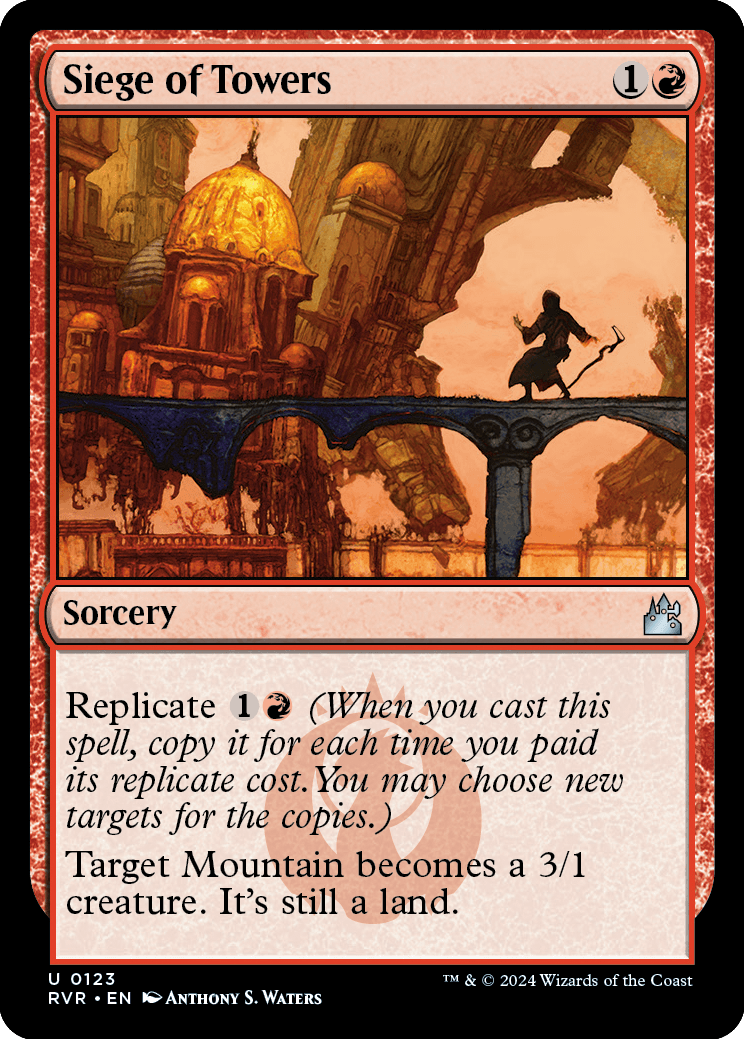
Siege of Towers
{1}{R}
Sorcery
Replicate {1}{R} (When you cast this spell, copy it for each time you paid its replicate cost. You may choose new targets for the copies.)
Target Mountain becomes a 3/1 creature. It's still a land.
- The Mountain will remain a creature for the rest of the game. It doesn't have a creature type.
- A noncreature permanent that turns into a creature can attack, and its {T} abilities can be activated, only if its controller has continuously controlled that permanent since the beginning of their most recent turn. It doesn't matter how long the permanent has been a creature.
- As the replicate triggered ability resolves, you'll copy Siege of Towers for each time you paid its replicate cost, even if the original spell is no longer on the stack at that time (perhaps because it was countered).
- The copies that replicate creates are created on the stack, so they're not "cast." Abilities that trigger when a player casts a spell won't trigger.
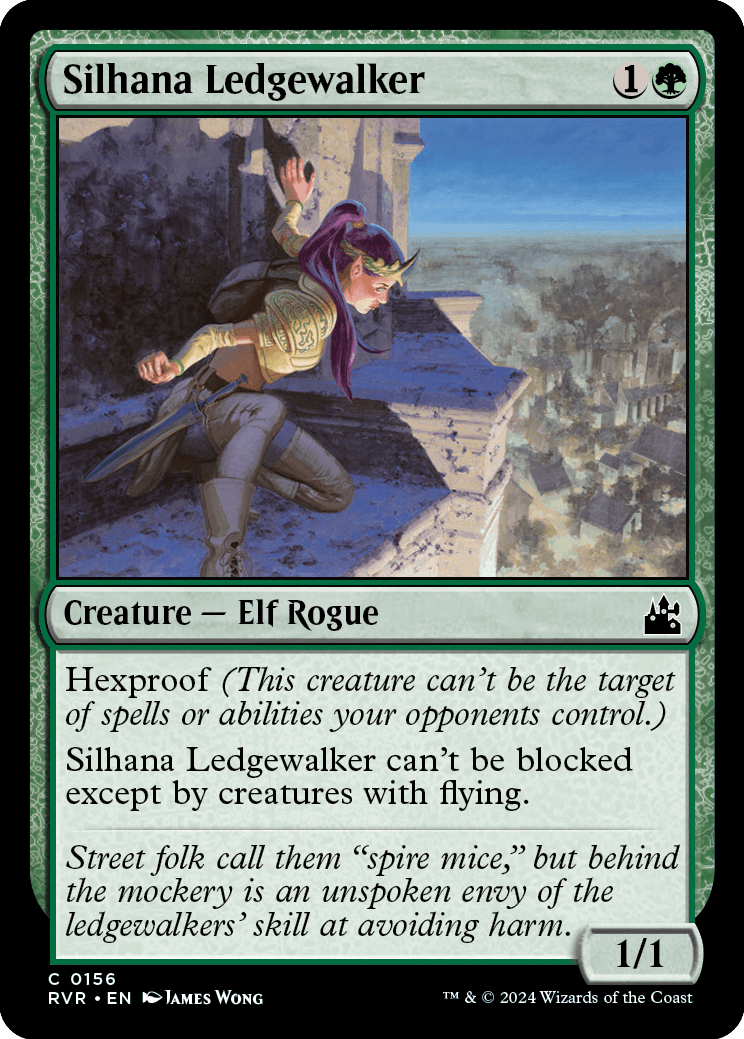
Silhana Ledgewalker
{1}{G}
Creature — Elf Rogue
1/1
Hexproof (This creature can't be the target of spells or abilities your opponents control.)
Silhana Ledgewalker can't be blocked except by creatures with flying.
- Creatures with reach don't actually have flying, so they can't block Silhana Ledgewalker.
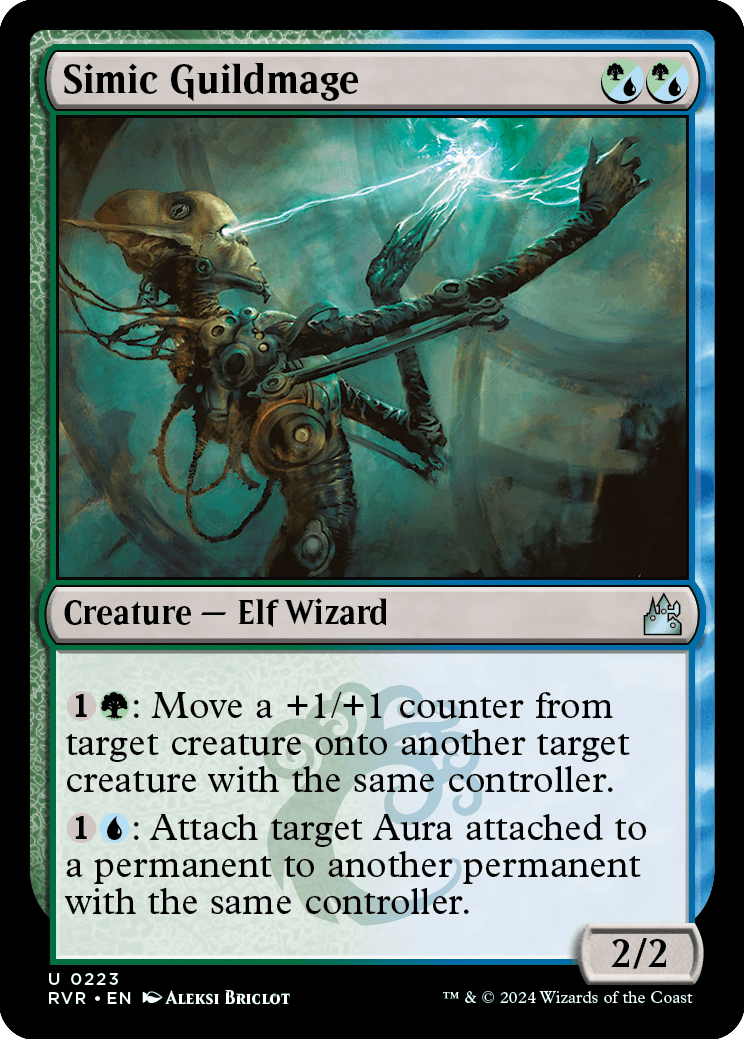
Simic Guildmage
{G/U}{G/U}
Creature — Elf Wizard
2/2
{1}{G}: Move a +1/+1 counter from target creature onto another target creature with the same controller.
{1}{U}: Attach target Aura attached to a permanent to another permanent with the same controller.
- For the first ability, the first target creature doesn't need to have a +1/+1 counter on it. If it doesn't, the ability does nothing.
- For the first ability, if the two target creatures aren't controlled by the same player when the ability resolves, the ability does nothing. The player who controls the two creatures doesn't have to be the same player who controlled them when the ability was activated, and that player doesn't have to be Simic Guildmage's controller.
- For the second ability, only the Aura is targeted. When the ability resolves, you choose a permanent to move the Aura onto. It can't be the permanent the Aura is already attached to, it must be controlled by the player who controls the permanent the Aura is attached to, and it must be able to be enchanted by the Aura. (It doesn't matter who controls the Aura or who controls Simic Guildmage.) If no such permanent exists, the Aura doesn't move.
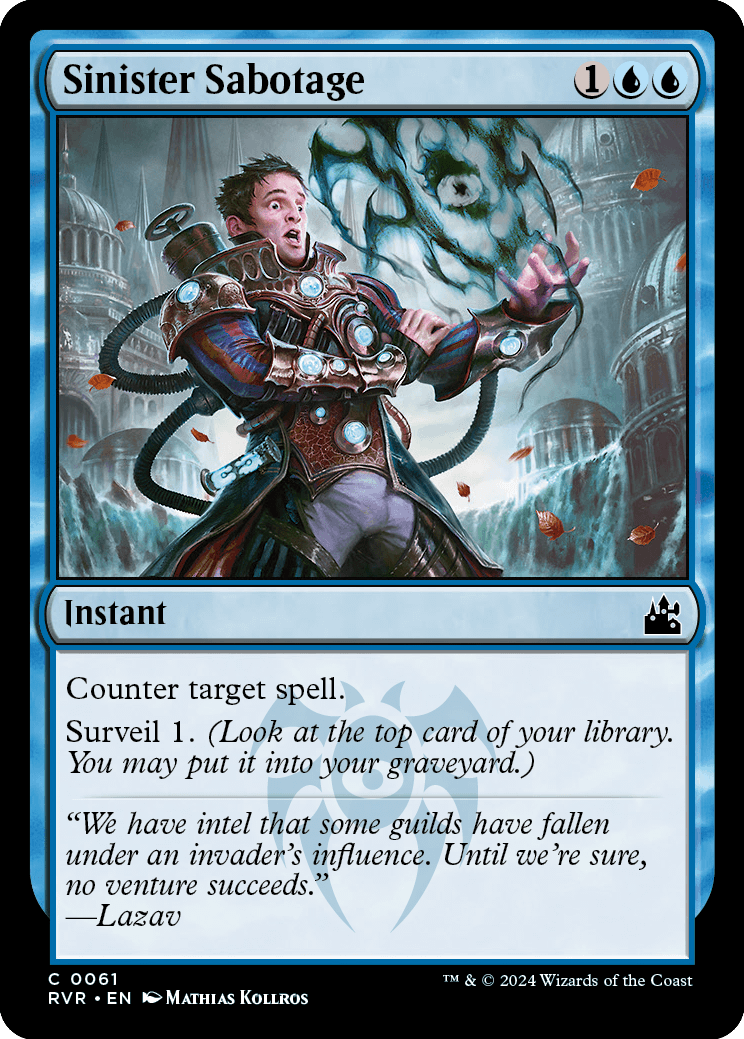
Sinister Sabotage
{1}{U}{U}
Instant
Counter target spell.
Surveil 1. (Look at the top card of your library. You may put it into your graveyard.)
- A spell that can't be countered is a legal target for Sinister Sabotage. The spell won't be countered when Sinister Sabotage resolves, but you'll still surveil 1.
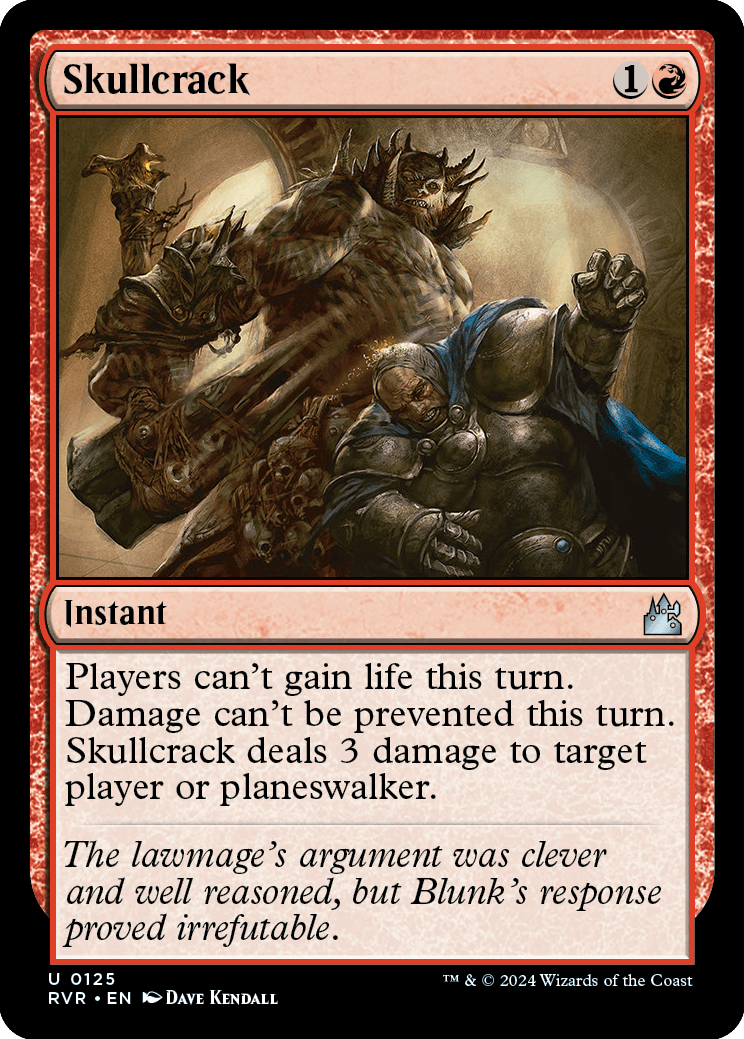
Skullcrack
{1}{R}
Instant
Players can't gain life this turn. Damage can't be prevented this turn. Skullcrack deals 3 damage to target player or planeswalker.
- Skullcrack targets only the player or planeswalker. If that player or planeswalker is an illegal target when Skullcrack tries to resolve, it won't resolve and none of its effects will happen.
- Spells and abilities that would cause a player to gain life or that would prevent damage still resolve, but the life-gain and damage-prevention parts have no effect.
- Effects that would replace gaining life with another effect won't apply because it's impossible for players to gain life.
- If an effect says to set a player's life total to a certain number and that number is higher than the player's current life total, that part of the effect won't do anything. (If the number is lower than the player's current life total, the effect will work as normal.)
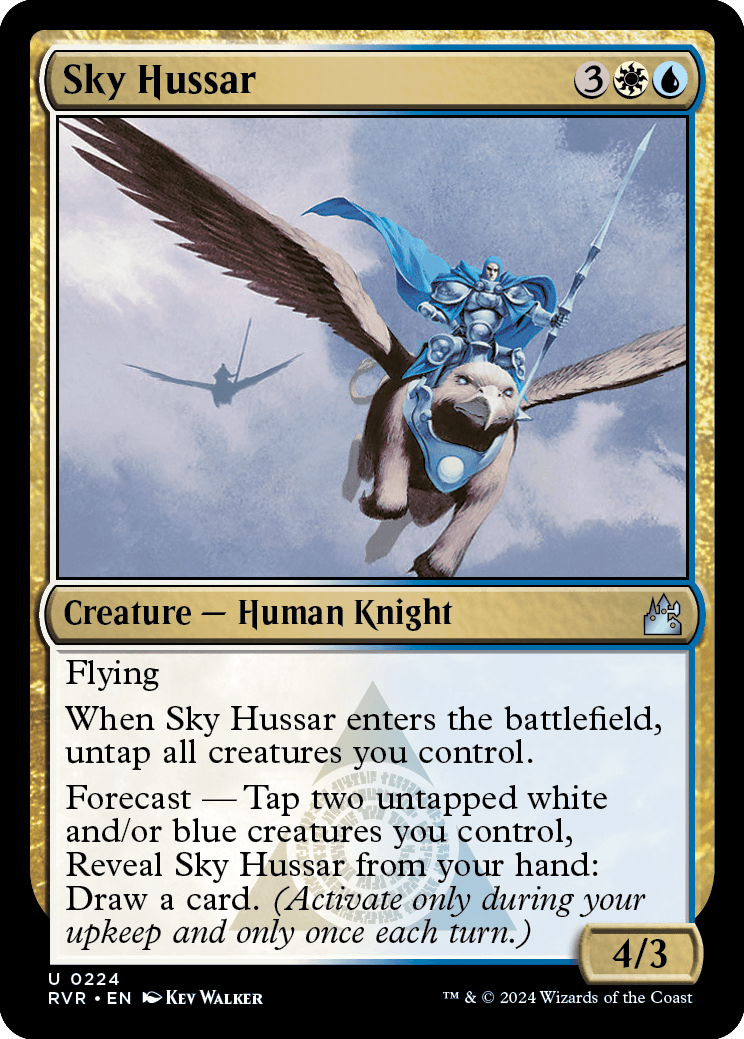
Sky Hussar
{3}{W}{U}
Creature — Human Knight
4/3
Flying
When Sky Hussar enters the battlefield, untap all creatures you control.
Forecast — Tap two untapped white and/or blue creatures you control, Reveal Sky Hussar from your hand: Draw a card. (Activate only during your upkeep and only once each turn.)
- You can tap any two untapped white and/or blue creatures you control, including ones you haven't controlled continuously since the beginning of your most recent turn, to pay the cost of Sky Hussar's forecast ability.
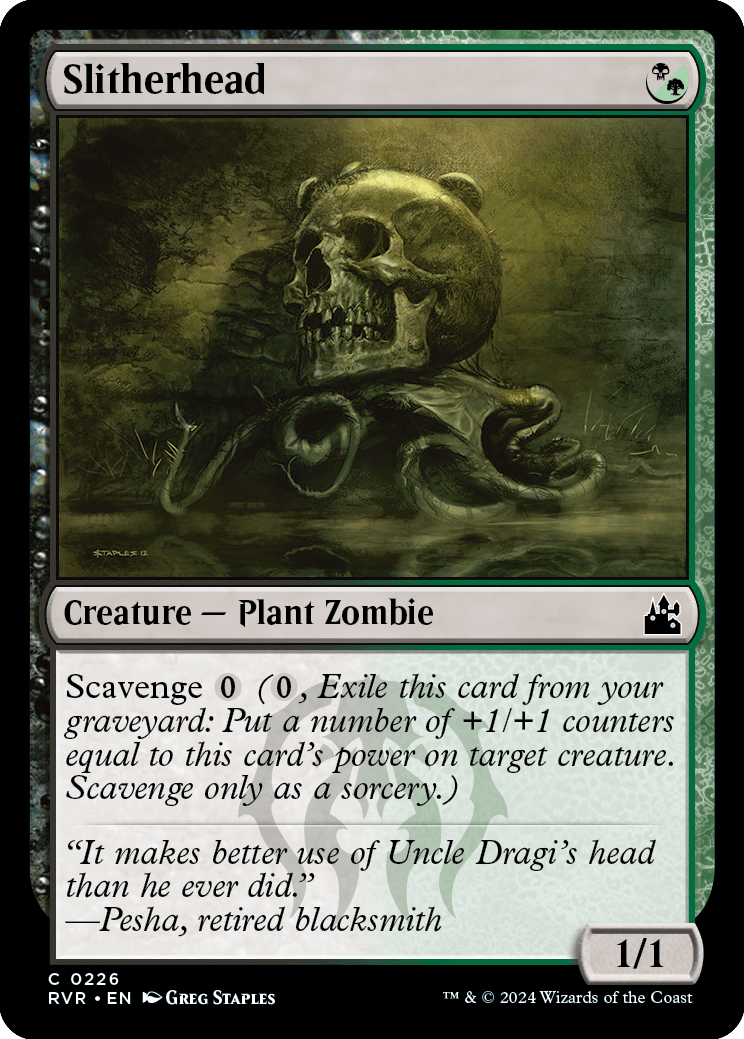
Slitherhead
{B/G}
Creature — Plant Zombie
1/1
Scavenge {0} ({0}, Exile this card from your graveyard: Put a number of +1/+1 counters equal to this card's power on target creature. Scavenge only as a sorcery.)
- Exiling the creature card with scavenge is part of the cost of activating the scavenge ability. Once the ability is activated and the cost is paid, it's too late to stop the ability from being activated by trying to remove the creature card from the graveyard.
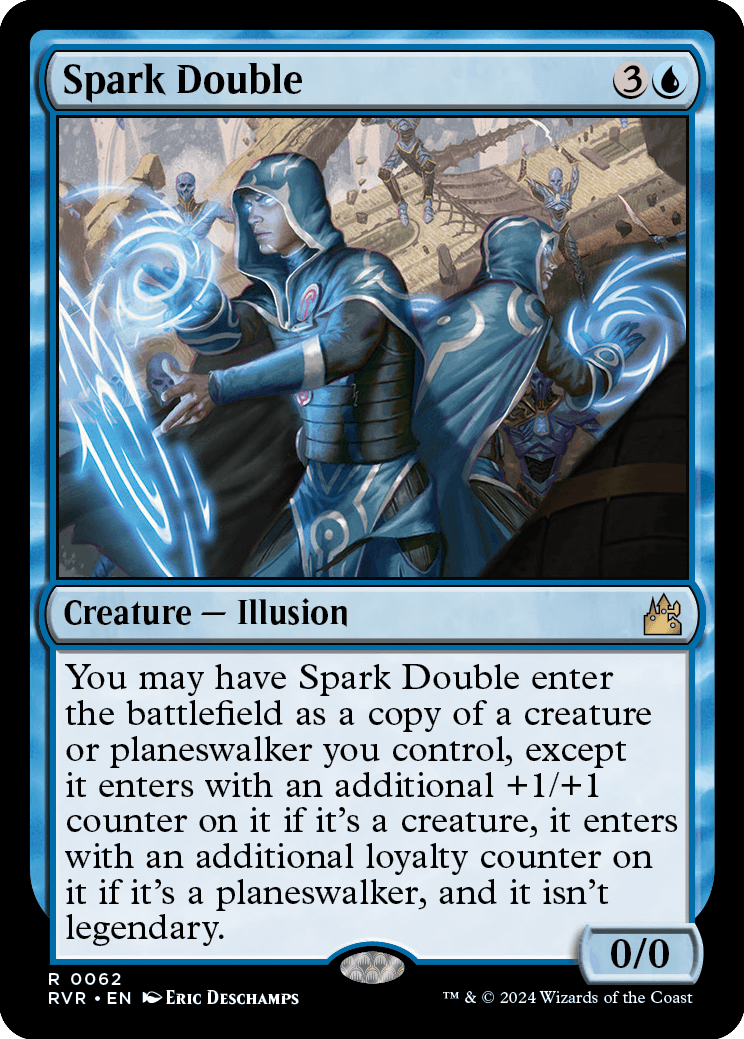
Spark Double
{3}{U}
Creature — Illusion
0/0
You may have Spark Double enter the battlefield as a copy of a creature or planeswalker you control, except it enters with an additional +1/+1 counter on it if it's a creature, it enters with an additional loyalty counter on it if it's a planeswalker, and it isn't legendary.
- Spark Double copies exactly what was printed on the original permanent (unless that permanent is copying something else or is a token; see below). It doesn't copy whether that permanent is tapped or untapped, whether it has any counters on it or any Auras and Equipment attached to it, or any non-copy effects that have changed its power, toughness, types, color, or so on.
- Spark Double isn't legendary if it copies a legendary permanent, and this exception is copiable. If something else copies Spark Double later, that copy also won't be legendary. If you control two or more permanents with the same name but only one is legendary, the "legend rule" doesn't apply.
- If the copied permanent has {X} in its mana cost, X is 0.
- If the chosen permanent is copying something else (for example, if the chosen permanent is another Spark Double), then Spark Double enters the battlefield as whatever the chosen permanent copied.
- If the chosen permanent is a token, Spark Double copies the original characteristics of that token as stated by the effect that created the token. Spark Double doesn't become a token in this case.
- Any enters-the-battlefield abilities of the copied permanent will trigger when Spark Double enters the battlefield. Any "as [this permanent] enters the battlefield" or "[this permanent] enters the battlefield with" abilities of the chosen permanent will also work.
- If it copies a planeswalker, Spark Double enters with the appropriate number of loyalty counters as printed on the card plus one. If it copies a creature, Spark Double enters with a +1/+1 counter on it, plus any counters that will be put on it from abilities it copied and other abilities of other objects.
- If the copied permanent is affected by a type-changing effect, Spark Double may enter the battlefield with different permanent types than the copied permanent currently has. Use the characteristics of Spark Double as it enters the battlefield, not of the copied permanent, to determine whether it enters with an additional counter on it. Notably, if Spark Double copies a Gideon planeswalker that's a creature because its loyalty ability caused it to become a planeswalker creature, Spark Double enters as a noncreature planeswalker and doesn't get a +1/+1 counter. On the other hand, if Spark Double copies Gideon Blackblade during your turn, Spark Double enters as a planeswalker creature and gets both kinds of counters.
- If Spark Double somehow enters the battlefield at the same time as another permanent, it can't become a copy of that permanent. You may choose only a creature or planeswalker that's already on the battlefield.
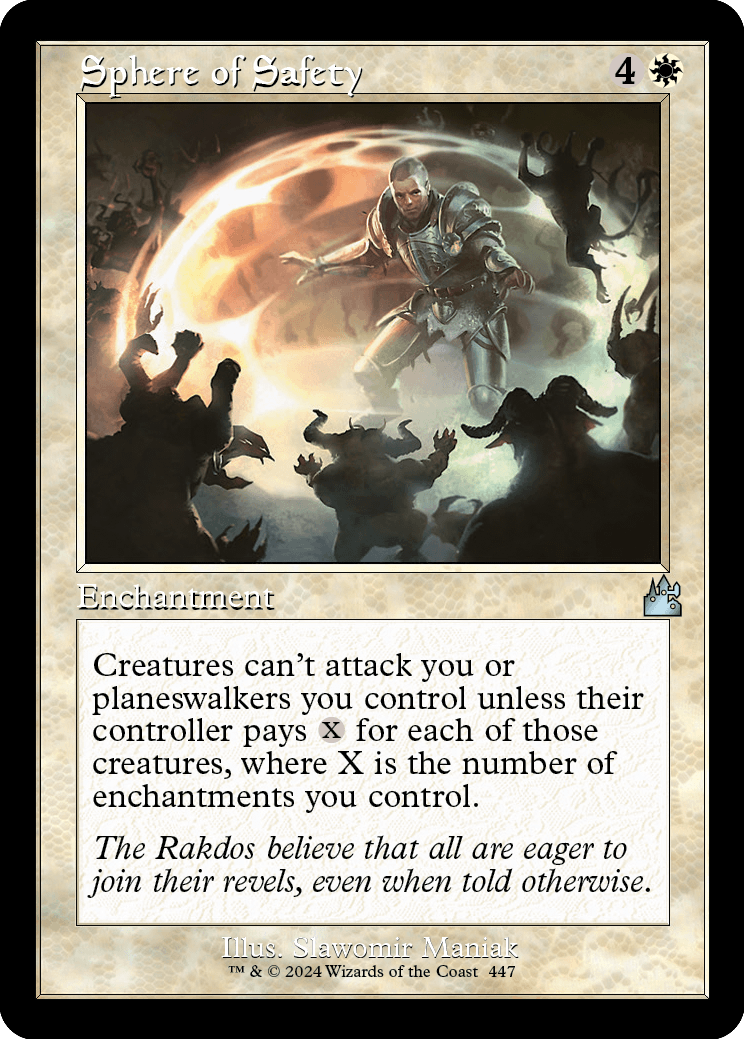
Sphere of Safety
{4}{W}
Enchantment
Creatures can't attack you or planeswalkers you control unless their controller pays {X} for each of those creatures, where X is the number of enchantments you control.
- If you control Sphere of Safety, your opponents can choose not to pay to attack with a creature that attacks "if able." If there's no other player or permanent to attack, that creature simply doesn't attack.
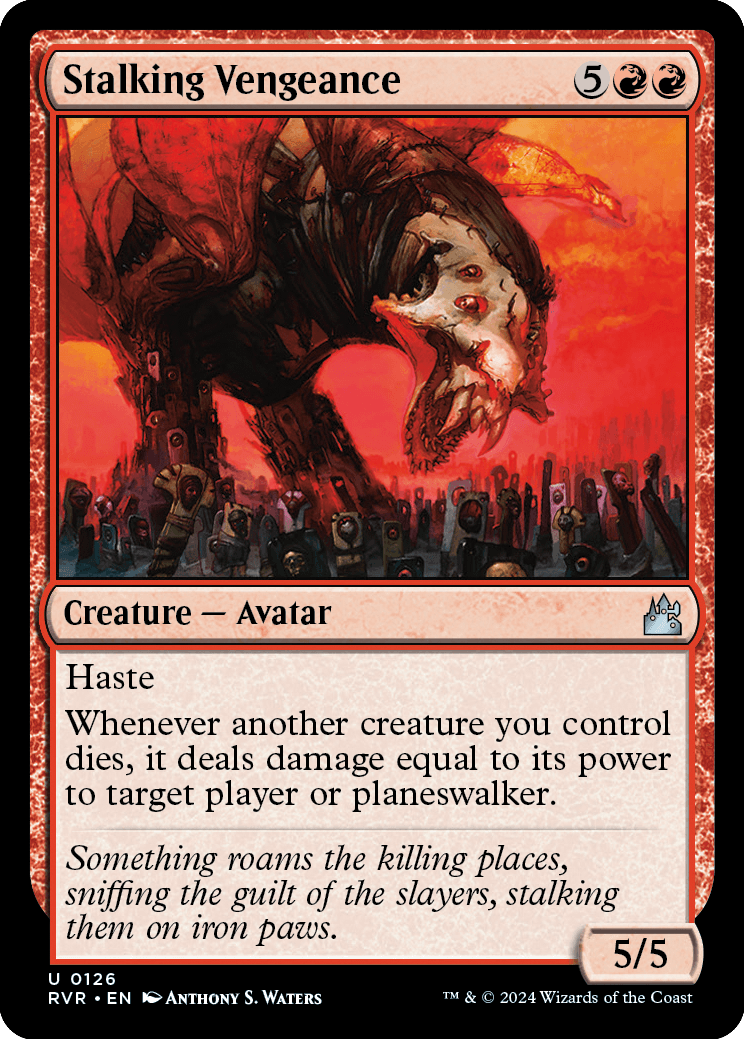
Stalking Vengeance
{5}{R}{R}
Creature — Avatar
5/5
Haste
Whenever another creature you control dies, it deals damage equal to its power to target player or planeswalker.
- Use the creature's power as it last existed on the battlefield to determine how much damage it deals.
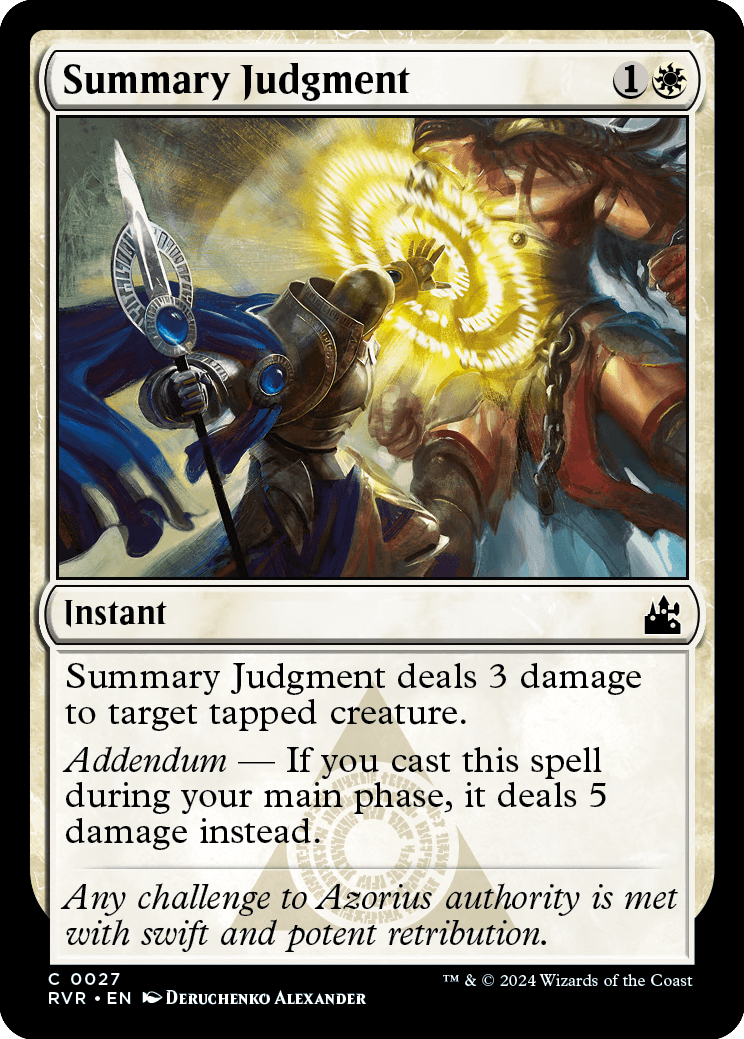
Summary Judgment
{1}{W}
Instant
Summary Judgment deals 3 damage to target tapped creature.
Addendum — If you cast this spell during your main phase, it deals 5 damage instead.
- Addendum abilities of instant spells apply while the spell is resolving, not immediately after casting it. If the spell is countered, you don't get the addendum bonus.
- If an effect copies a spell with an addendum ability while it's on the stack, the copy wasn't cast at all, so you won't get the addendum bonus.
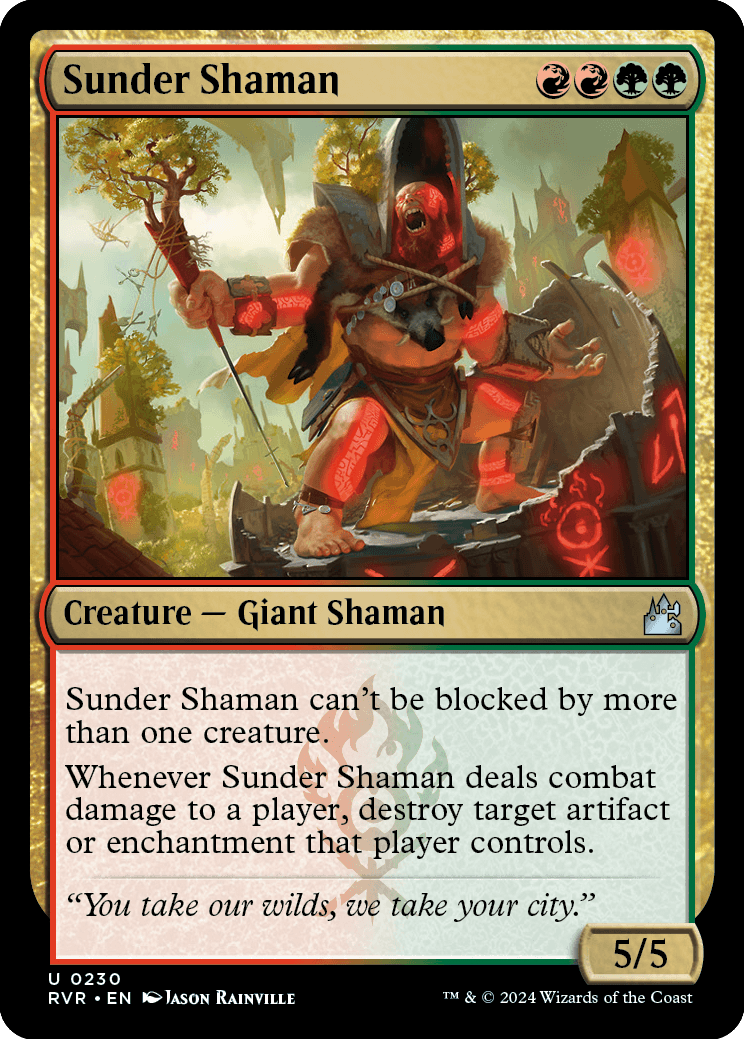
Sunder Shaman
{R}{R}{G}{G}
Creature — Giant Shaman
5/5
Sunder Shaman can't be blocked by more than one creature.
Whenever Sunder Shaman deals combat damage to a player, destroy target artifact or enchantment that player controls.
- If Sunder Shaman gains menace, it can't be blocked at all.
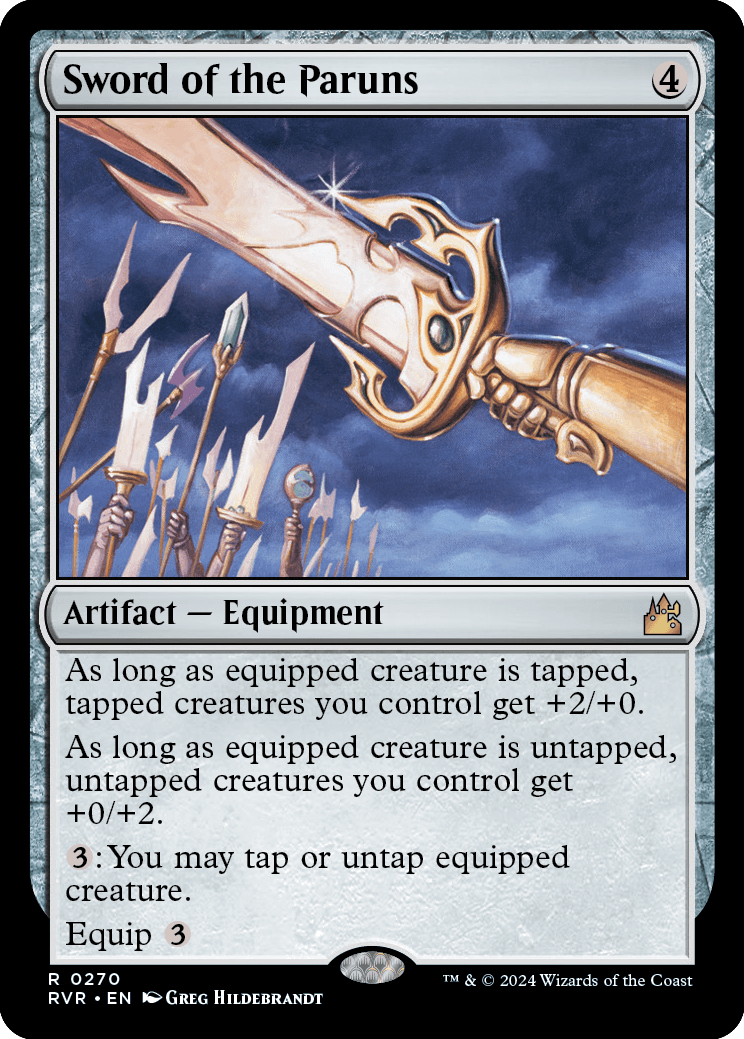
Sword of the Paruns
{4}
Artifact — Equipment
As long as equipped creature is tapped, tapped creatures you control get +2/+0.
As long as equipped creature is untapped, untapped creatures you control get +0/+2.
{3}: You may tap or untap equipped creature.
Equip {3}
- If equipped creature becomes tapped, untapped creatures you control will immediately lose the +0/+2 bonus. This may cause nonlethal damage already dealt to them that turn to become lethal. The Paruns would want you to be careful.
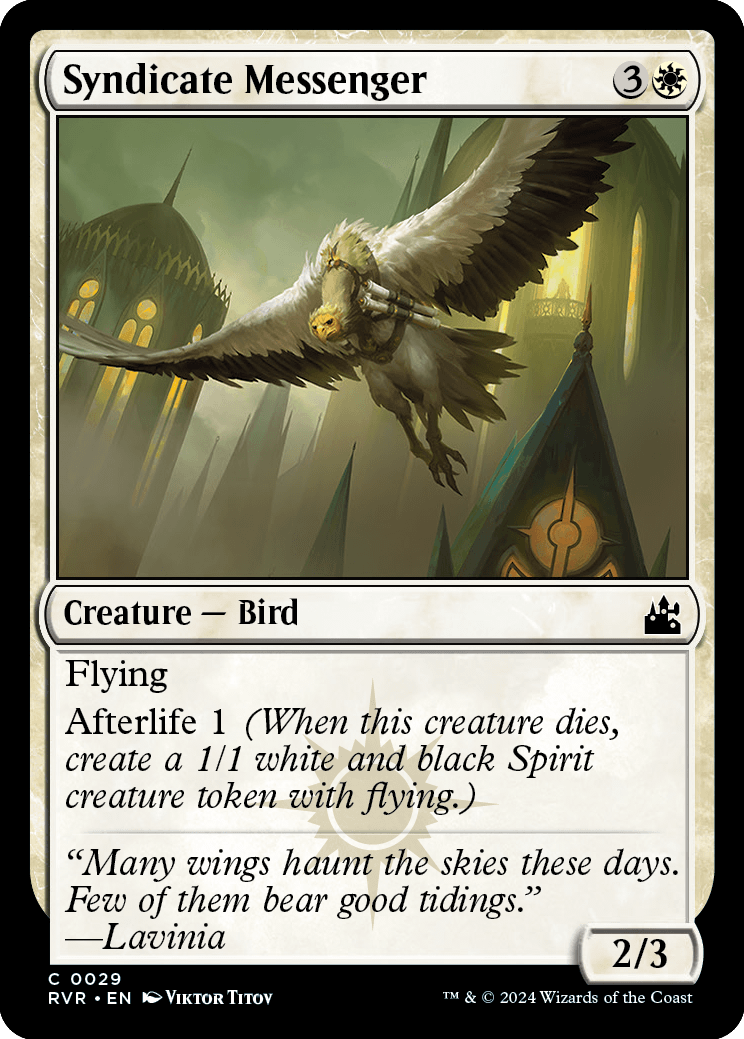
Syndicate Messenger
{3}{W}
Creature — Bird
2/3
Flying
Afterlife 1 (When this creature dies, create a 1/1 white and black Spirit creature token with flying.)
- Because blockers are chosen all at once, you can't block with a creature with afterlife, wait for it to die, then block with the resulting Spirit tokens.
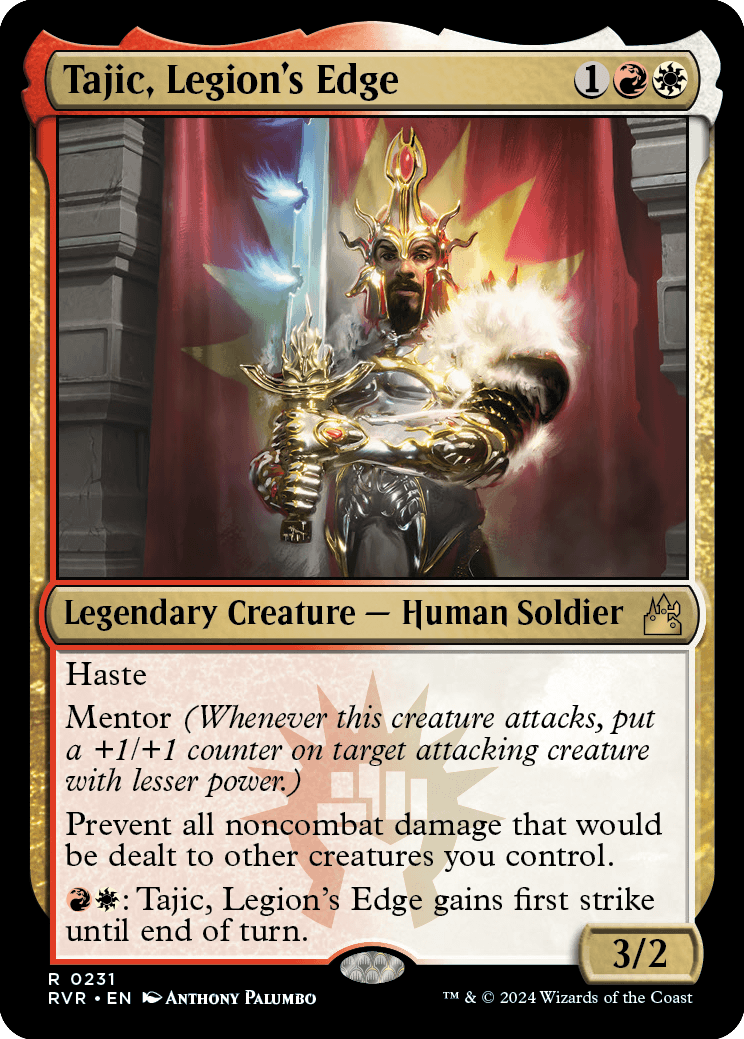
Tajic, Legion's Edge
{1}{R}{W}
Legendary Creature — Human Soldier
3/2
Haste
Mentor (Whenever this creature attacks, put a +1/+1 counter on target attacking creature with lesser power.)
Prevent all noncombat damage that would be dealt to other creatures you control.
{R}{W}: Tajic, Legion's Edge gains first strike until end of turn.
- If Tajic and other creatures you control would be dealt lethal noncombat damage at the same time, the damage that would be dealt to your other creatures is prevented.
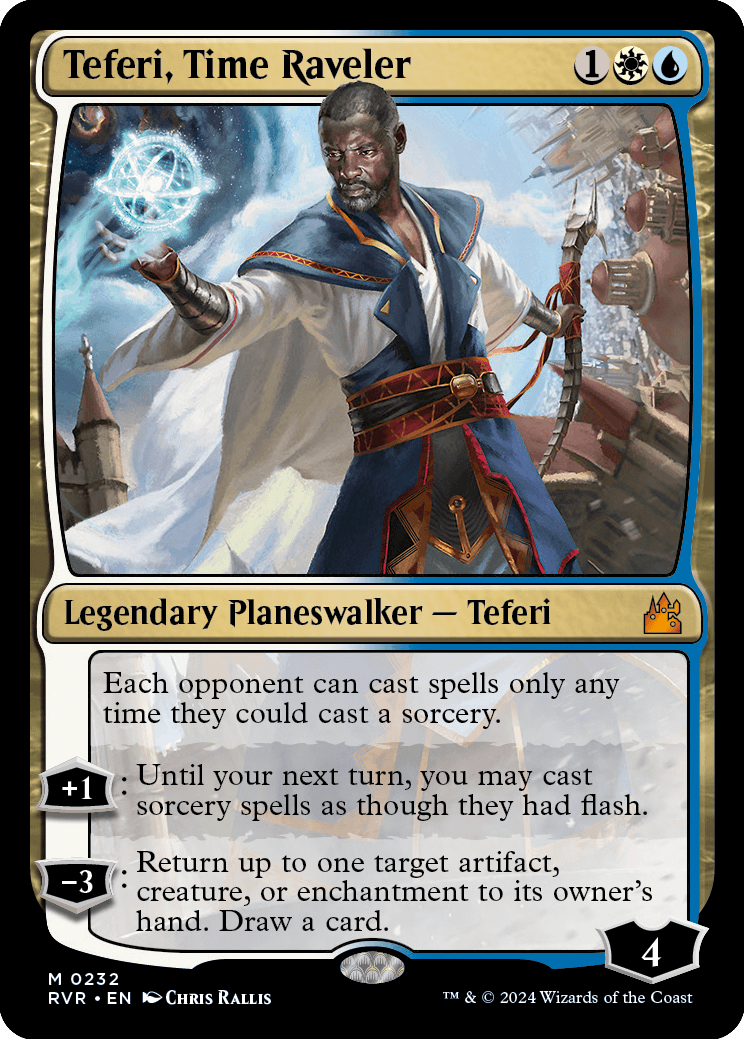
Teferi, Time Raveler
{1}{W}{U}
Legendary Planeswalker — Teferi
4
Each opponent can cast spells only any time they could cast a sorcery.
+1: Until your next turn, you may cast sorcery spells as though they had flash.
−3: Return up to one target artifact, creature, or enchantment to its owner's hand. Draw a card.
- If an effect allows an opponent to cast a spell as though it had flash (for example, if your opponent also controls a Teferi, Time Raveler and activates his +1 loyalty ability), the restriction of Teferi's first ability takes precedence over that permission.
- You may activate Teferi's last ability without choosing any target. You'll just draw a card. However, if you do choose a target and the target permanent is an illegal target by the time Teferi's last ability tries to resolve, the ability doesn't resolve. You don't draw a card.
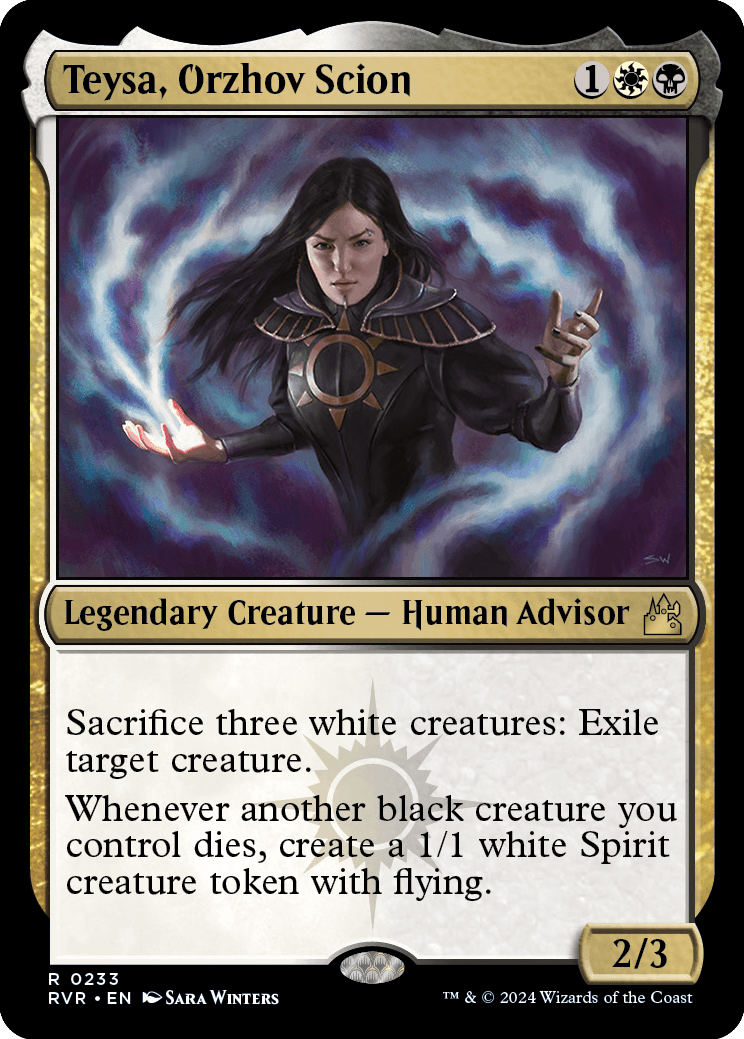
Teysa, Orzhov Scion
{1}{W}{B}
Legendary Creature — Human Advisor
2/3
Sacrifice three white creatures: Exile target creature.
Whenever another black creature you control dies, create a 1/1 white Spirit creature token with flying.
- You may sacrifice Teysa itself to help pay for its first ability, but Teysa dying won't cause its second ability to trigger. Any other white and black creatures you sacrifice to pay for the first ability will cause the second ability to trigger.
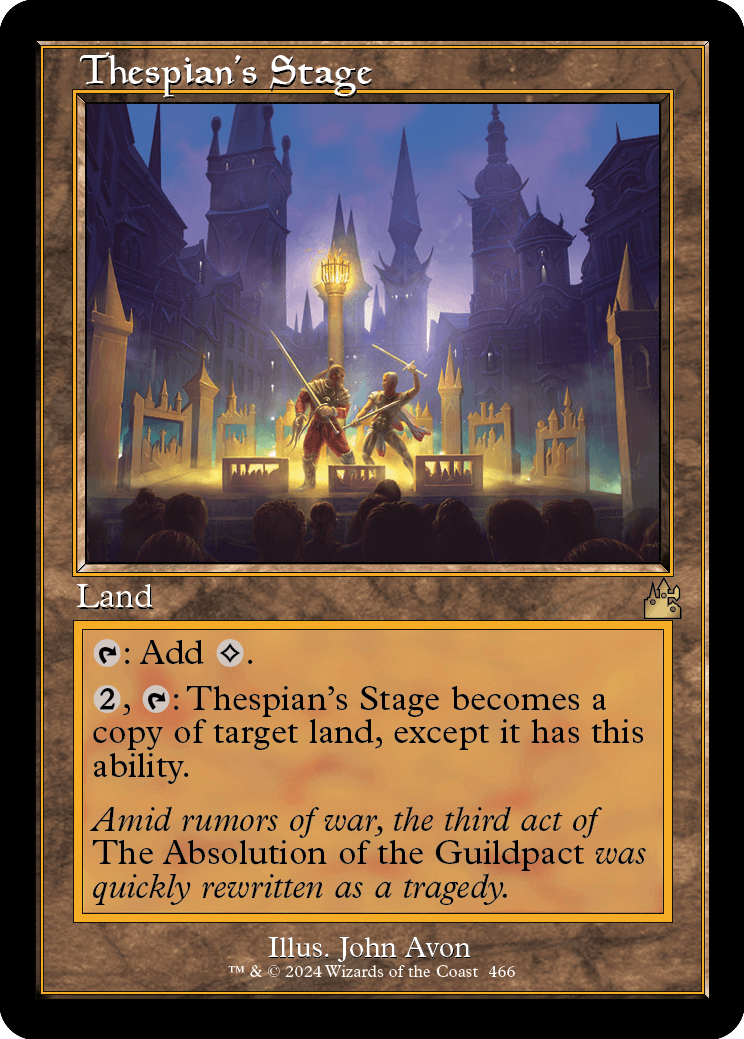
Thespian's Stage
Land
{T}: Add {C}.
{2}, {T}: Thespian's Stage becomes a copy of target land, except it has this ability.
- The copy effect created by the last activated ability doesn't have a duration. It will last until Thespian's Stage leaves the battlefield or another copy effect overwrites it. The permanent will no longer have the first ability of Thespian's Stage.
- A land's copiable values are those printed on it, as modified by other copy effects. Counters and other effects aren't copied. Notably, if you copy a land that is also a creature because of a temporary effect (such as Celestial Colonnade), Thespian's Stage will become just the "unanimated" land.
- Thespian's Stage doesn't become untapped when it becomes a copy, even if the target land is untapped.
- No enters-the-battlefield abilities of the land Thespian's Stage is copying will trigger. Thespian's Stage was already on the battlefield. Similarly, no "as this land enters the battlefield" or "this land enters the battlefield with" effects, such as that of Dark Depths, will apply.

Thrash
{R/G}{R/G}
Instant
Target creature you control deals damage equal to its power to target creature or planeswalker you don't control.
///
Threat
{2}{R}{G}
Sorcery
Create a 4/4 red and green Beast creature token with trample.
- If either target is an illegal target as Thrash tries to resolve, the creature you control won't deal damage.
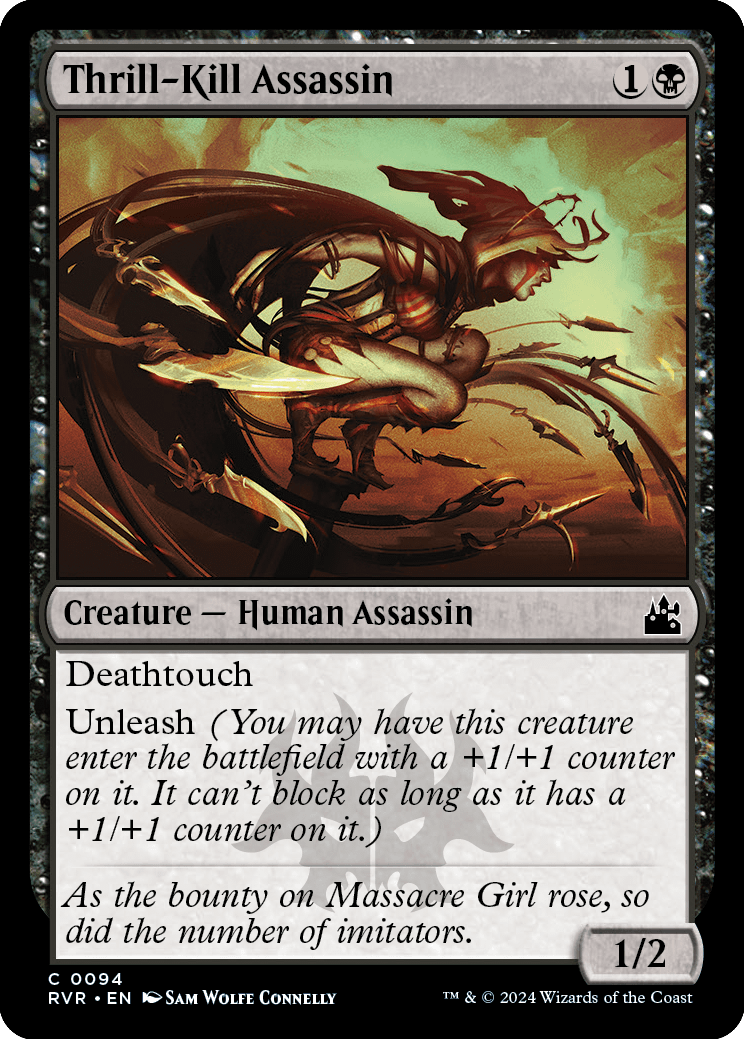
Thrill-Kill Assassin
{1}{B}
Creature — Human Assassin
1/2
Deathtouch
Unleash (You may have this creature enter the battlefield with a +1/+1 counter on it. It can't block as long as it has a +1/+1 counter on it.)
- You make the choice to have the creature with unleash enter the battlefield with a +1/+1 counter or not as it's entering the battlefield. At that point, it's too late for a player to respond to the creature spell by trying to counter it, for example.
- The unleash ability applies no matter where the creature is entering the battlefield from.
- A creature with unleash can't block if it has any +1/+1 counter on it, not just one put on it by the unleash ability.
- Putting a +1/+1 counter on a creature with unleash that's already blocking won't remove it from combat. It will continue to block.
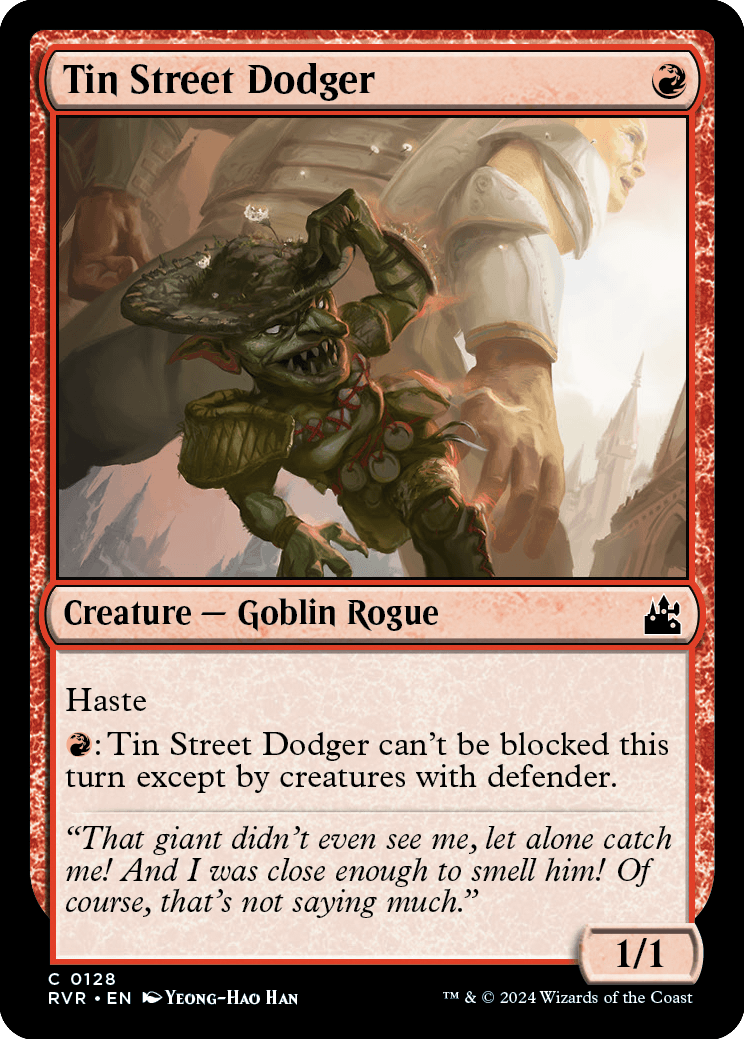
Tin Street Dodger
{R}
Creature — Goblin Rogue
1/1
Haste
{R}: Tin Street Dodger can't be blocked this turn except by creatures with defender.
- Activating Tin Street Dodger's ability after it has become blocked by a creature without defender won't cause it to become unblocked.
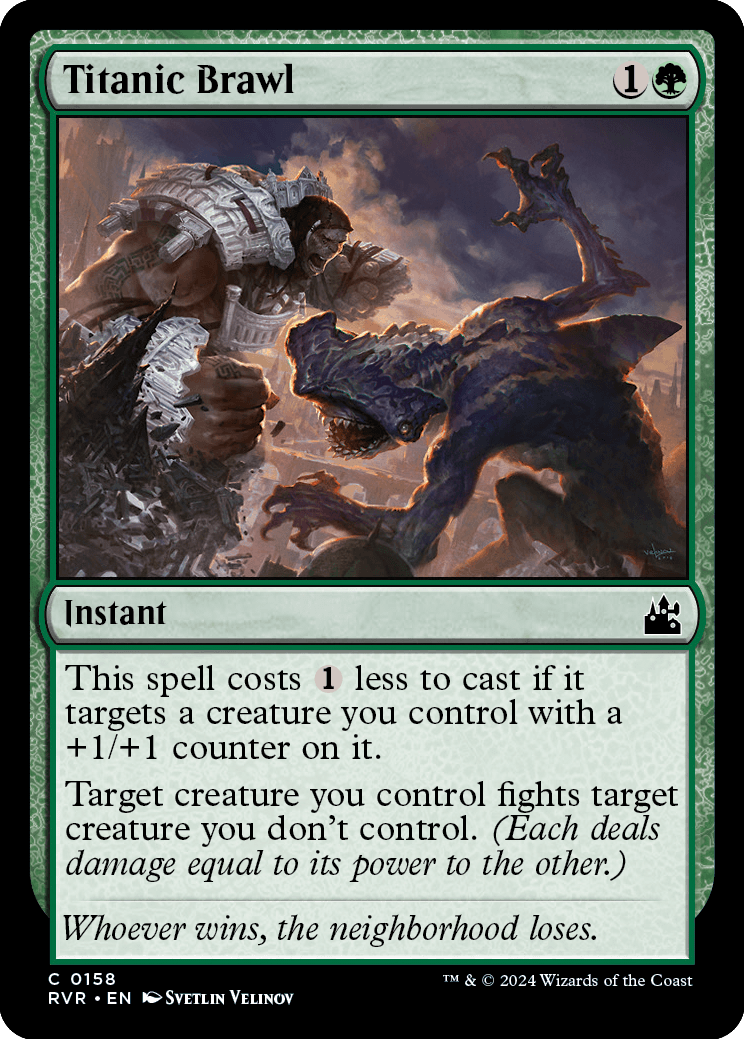
Titanic Brawl
{1}{G}
Instant
This spell costs {1} less to cast if it targets a creature you control with a +1/+1 counter on it.
Target creature you control fights target creature you don't control. (Each deals damage equal to its power to the other.)
- If either target is an illegal target as Titanic Brawl resolves, neither creature will deal or be dealt damage.
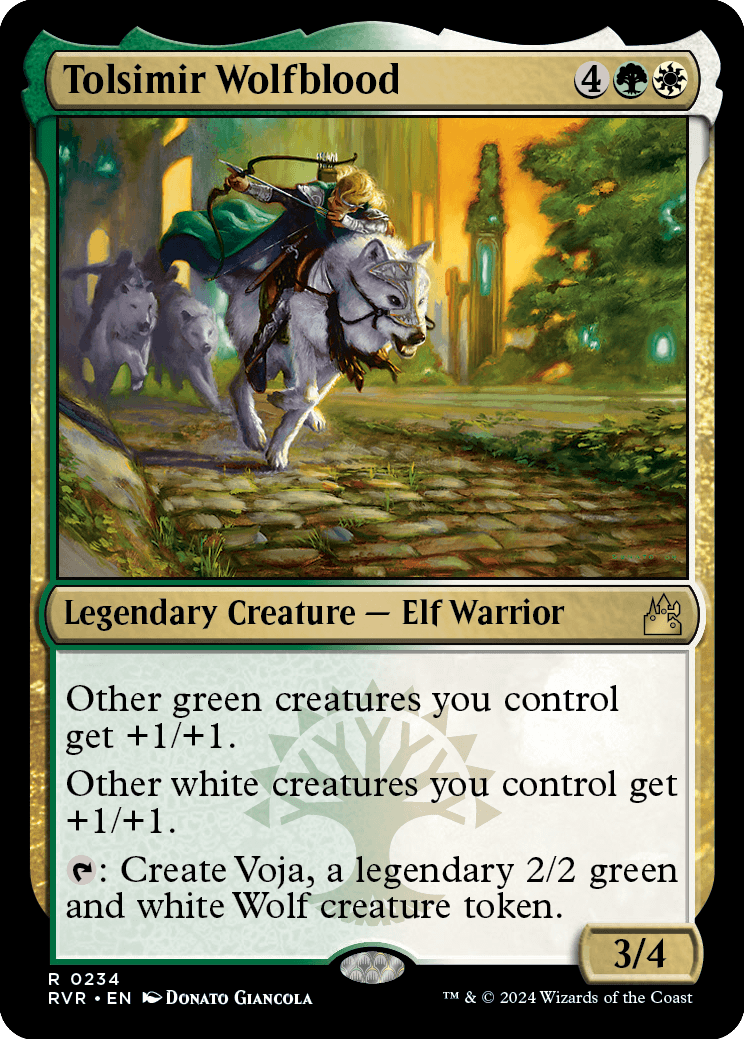
Tolsimir Wolfblood
{4}{G}{W}
Legendary Creature — Elf Warrior
3/4
Other green creatures you control get +1/+1.
Other white creatures you control get +1/+1.
{T}: Create Voja, a legendary 2/2 green and white Wolf creature token.
- Other creatures you control that are both green and white, including Voja, get +2/+2.
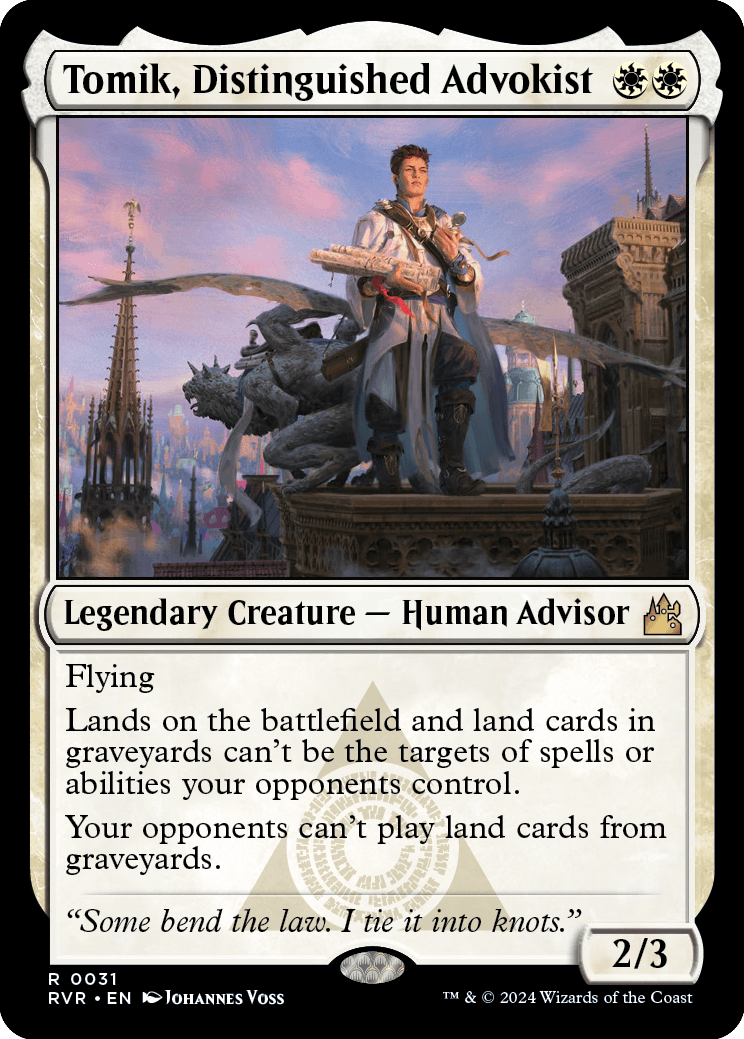
Tomik, Distinguished Advokist
{W}{W}
Legendary Creature — Human Advisor
2/3
Flying
Lands on the battlefield and land cards in graveyards can't be the targets of spells or abilities your opponents control.
Your opponents can't play land cards from graveyards.
- Tomik's middle ability is similar to hexproof, but effects that interact with hexproof don't count these lands or land cards as having hexproof.
- Players can't normally play a land card from a graveyard. If a player finds a way to do so, Tomik's last ability takes precedence over that permission.
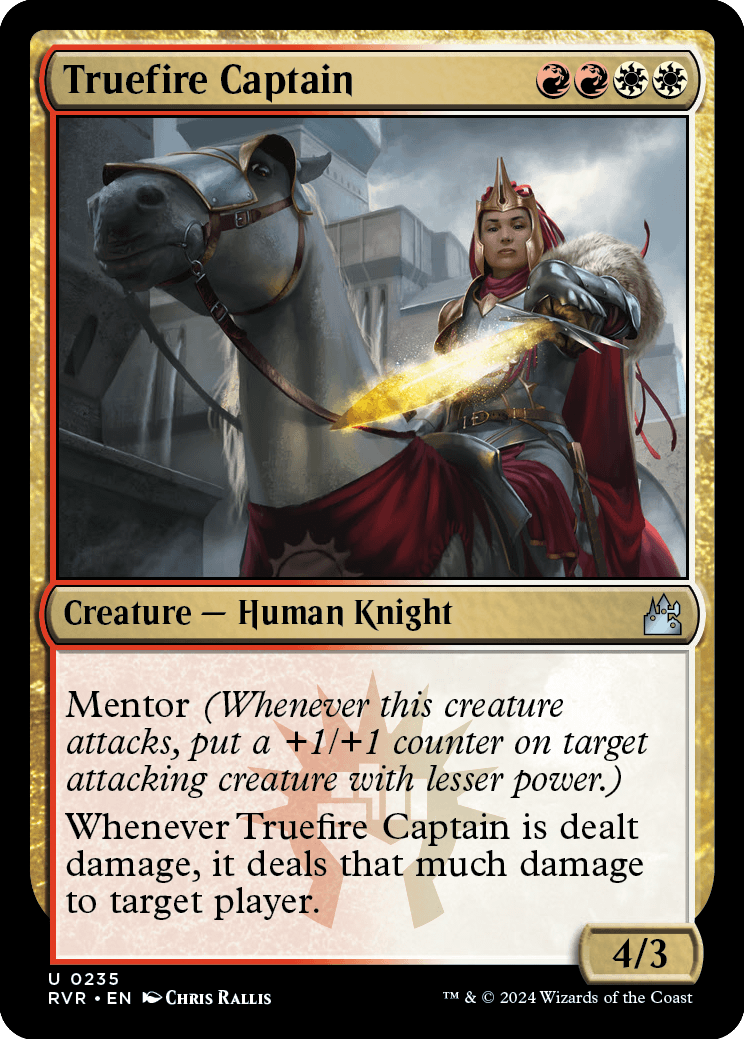
Truefire Captain
{R}{R}{W}{W}
Creature — Human Knight
4/3
Mentor (Whenever this creature attacks, put a +1/+1 counter on target attacking creature with lesser power.)
Whenever Truefire Captain is dealt damage, it deals that much damage to target player.
- Truefire Captain's last ability will trigger even if it is dealt lethal damage. For example, if it's dealt damage by a 7/7 creature it's blocking, its ability will trigger and Truefire Captain will deal 7 damage to the target player.
- If your life total is brought to 0 or less at the same time that Truefire Captain is dealt damage, you lose the game before its triggered ability goes on the stack.
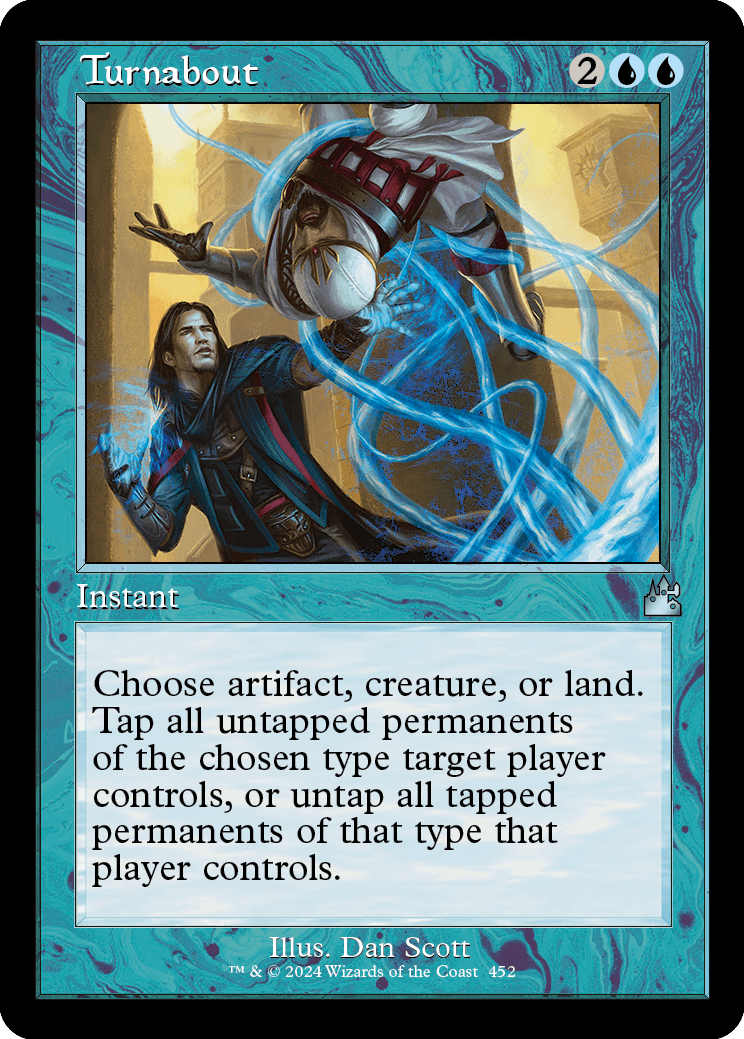
Turnabout
{2}{U}{U}
Instant
Choose artifact, creature, or land. Tap all untapped permanents of the chosen type target player controls, or untap all tapped permanents of that type that player controls.
- You decide on resolution if you are tapping or untapping, and which kind of permanent you are affecting.
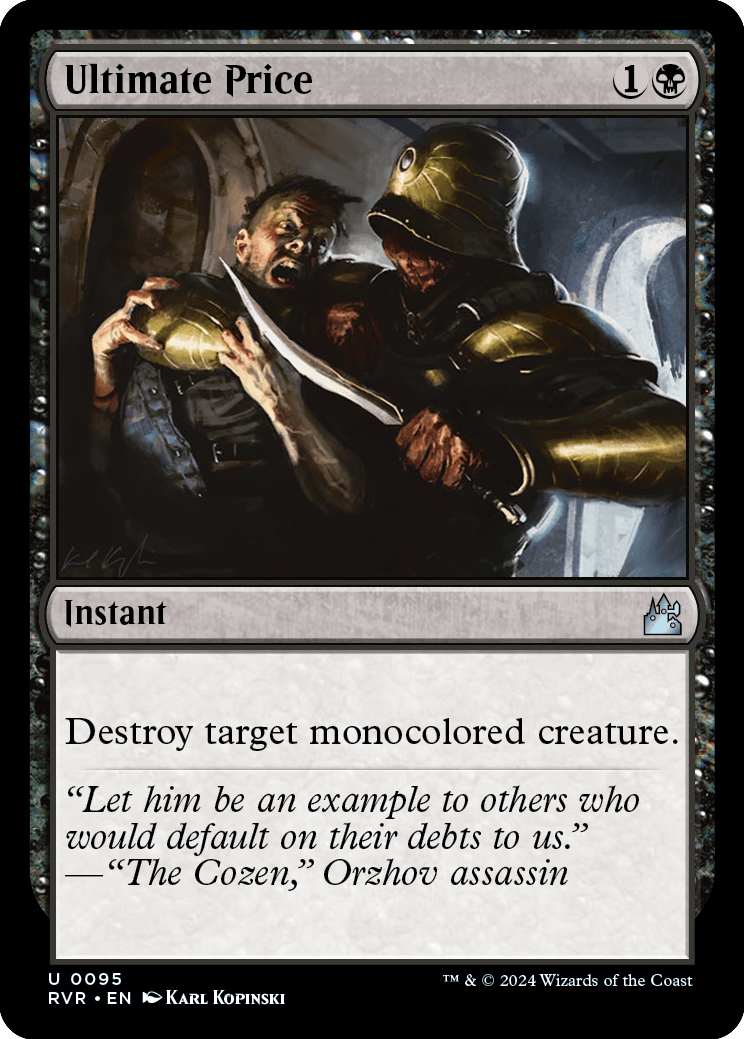
Ultimate Price
{1}{B}
Instant
Destroy target monocolored creature.
- A monocolored creature is exactly one color. Colorless creatures aren't monocolored.
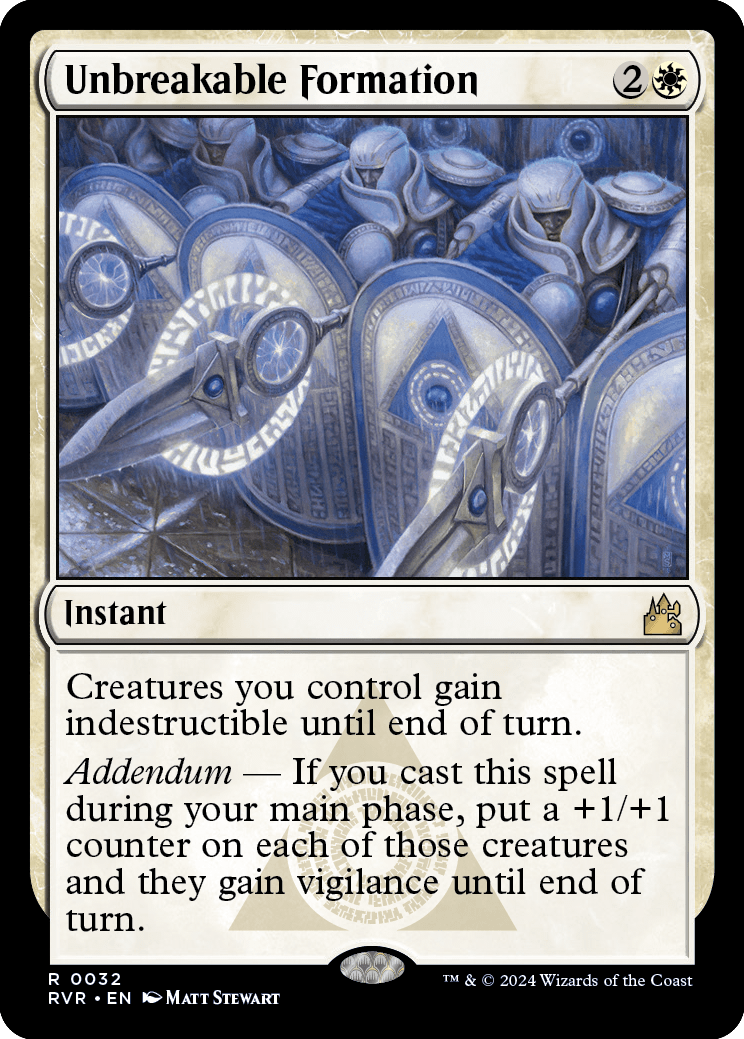
Unbreakable Formation
{2}{W}
Instant
Creatures you control gain indestructible until end of turn.
Addendum — If you cast this spell during your main phase, put a +1/+1 counter on each of those creatures and they gain vigilance until end of turn.
- Unbreakable Formation affects only creatures you control at the time it resolves. Creatures you begin to control later in the turn won't gain indestructible or vigilance and they won't get a +1/+1 counter.
- Addendum abilities of instant spells apply while the spell is resolving, not immediately after casting it. If the spell is countered, you don't get the addendum bonus.
- If an effect copies a spell with an addendum ability while it's on the stack, the copy wasn't cast at all, so you won't get the addendum bonus.
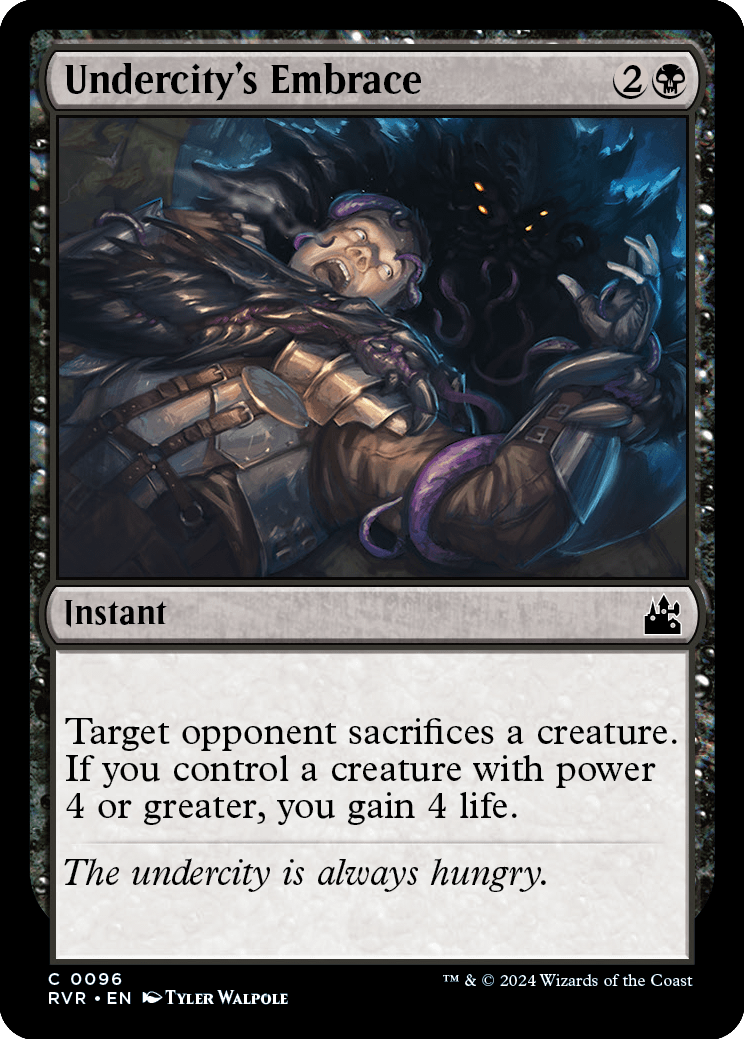
Undercity's Embrace
{2}{B}
Instant
Target opponent sacrifices a creature. If you control a creature with power 4 or greater, you gain 4 life.
- You can still gain 4 life even if the target opponent can't sacrifice a creature.
- Whether you control a creature with power 4 or greater is checked only after your opponent has sacrificed a creature. If a creature you own with power 4 or greater was exiled until the sacrificed creature left the battlefield, that creature will return to the battlefield before the check, so it will count. However, any abilities that trigger on the sacrificed creature's death won't have resolved yet when you check what creatures you control.
- You gain only 4 life, even if you control more than one creature with power 4 or greater.
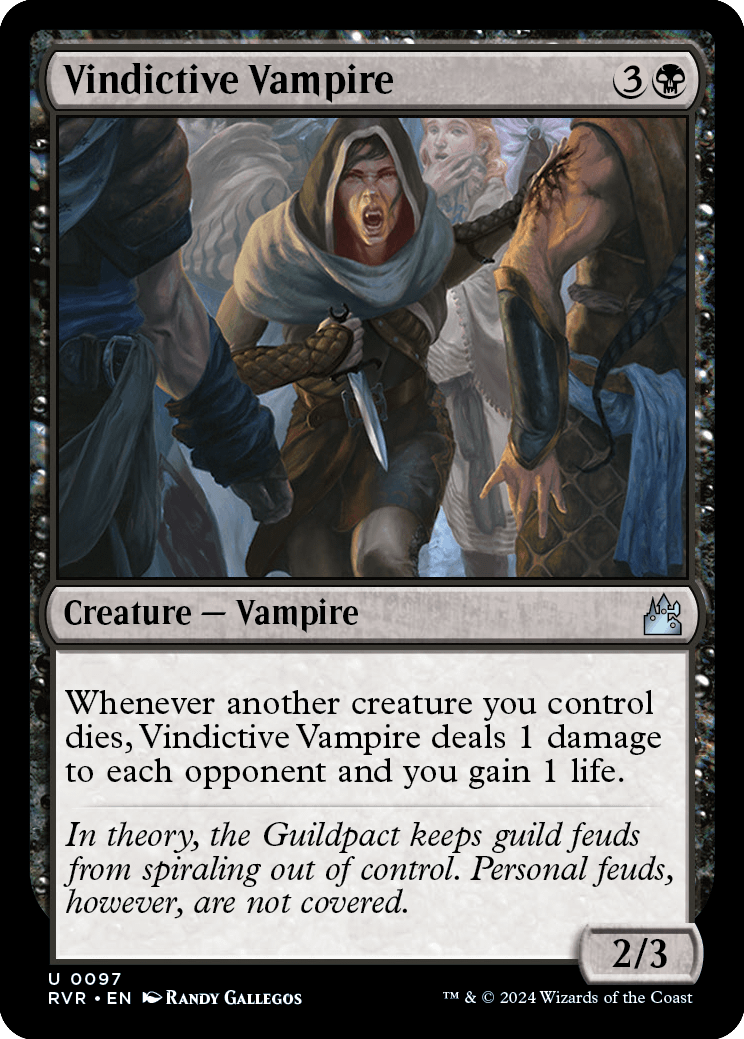
Vindictive Vampire
{3}{B}
Creature — Vampire
2/3
Whenever another creature you control dies, Vindictive Vampire deals 1 damage to each opponent and you gain 1 life.
- If Vindictive Vampire dies at the same time as one or more other creatures you control, Vindictive Vampire's ability triggers for each of those other creatures.
- If your life total is brought to 0 or less at the same time that creatures you control are dealt lethal damage, you lose the game before Vindictive Vampire's triggered ability goes on the stack.
- In a Two-Headed Giant game, Vindictive Vampire's ability causes the opposing team to lose 2 life and you gain 1 life.
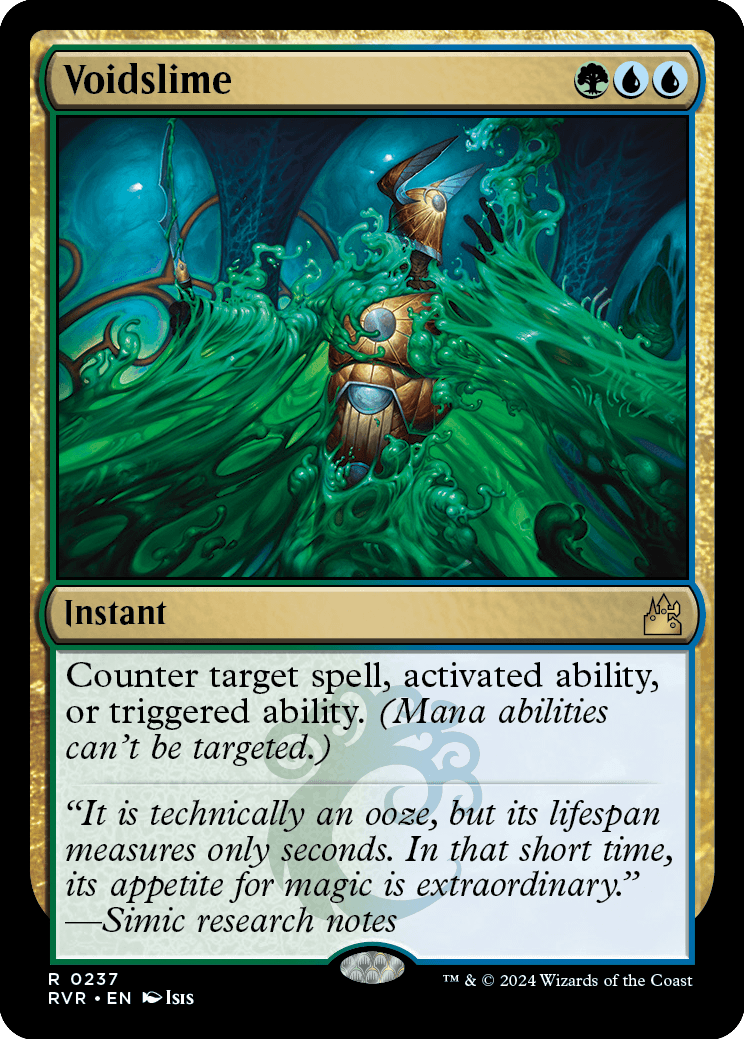
Voidslime
{G}{U}{U}
Instant
Counter target spell, activated ability, or triggered ability. (Mana abilities can't be targeted.)
- Activated abilities are written in the form "[Cost]: [Effect]." Some keyword abilities, such as equip, are activated abilities and will have colons in their reminder texts. Loyalty abilities of planeswalkers are activated abilities.
- Triggered abilities use the word "when," "whenever," or "at." They're often written as "[Trigger condition], [effect]." Some keyword abilities, such as afterlife, are triggered abilities and will have "when," "whenever," or "at" in their reminder text.
- An activated mana ability is one that adds mana as it resolves, doesn't have a target, and isn't a loyalty ability. A triggered mana ability is one that adds mana and triggers on an activated mana ability.
- Abilities that create replacement effects, such as a permanent entering the battlefield tapped or with counters on it, can't be targeted. Abilities that apply "as [this creature] enters the battlefield" are also replacement effects and can't be targeted.
- If you counter a delayed triggered ability that triggered at the beginning of the "next" occurrence of a specified step or phase, that ability won't trigger again the following time that phase or step occurs.
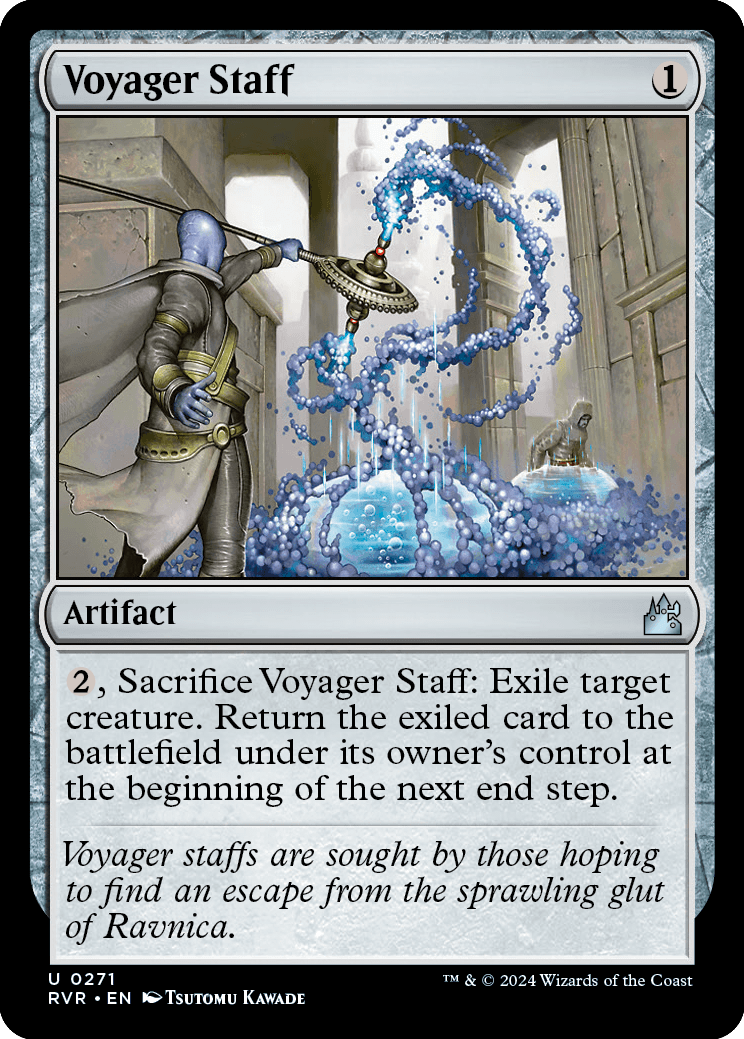
Voyager Staff
{1}
Artifact
{2}, Sacrifice Voyager Staff: Exile target creature. Return the exiled card to the battlefield under its owner's control at the beginning of the next end step.
- If a creature token is exiled by Voyager Staff's ability, it will cease to exist. It won't return to the battlefield.
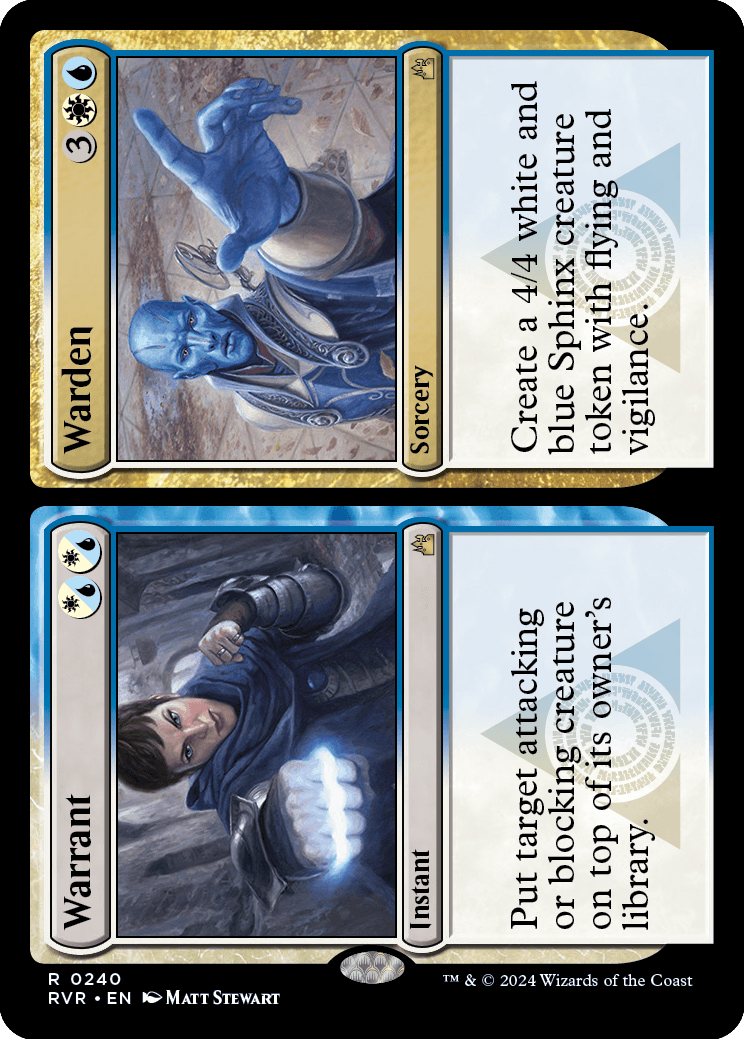
Warrant
{W/U}{W/U}
Instant
Put target attacking or blocking creature on top of its owner's library.
///
Warden
{3}{W}{U}
Sorcery
Create a 4/4 white and blue Sphinx creature token with flying and vigilance.
- An "attacking creature" is one that has been declared as an attacker or put onto the battlefield attacking during this combat. Unless that creature leaves combat, it continues to be an attacking creature through the end of combat step, even if the player it was attacking has left the game or the planeswalker it was attacking has left combat. Similarly, a "blocking creature" is one that has been declared as a blocker or put onto the battlefield blocking during this combat.
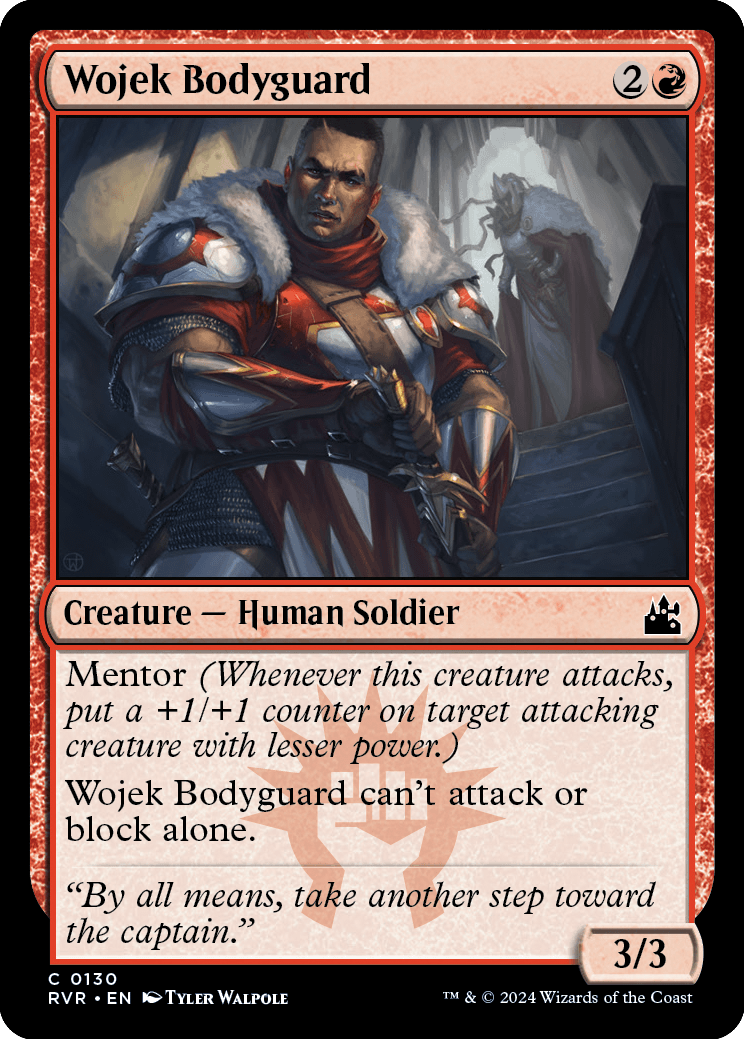
Wojek Bodyguard
{2}{R}
Creature — Human Soldier
3/3
Mentor (Whenever this creature attacks, put a +1/+1 counter on target attacking creature with lesser power.)
Wojek Bodyguard can't attack or block alone.
- If you control more than one Wojek Bodyguard, they can attack or block together, even if no other creatures attack or block.
- Although Wojek Bodyguard can't attack alone, other attacking creatures don't have to attack the same player, planeswalker, or battle. For example, Wojek Bodyguard could attack an opponent and another creature could attack a planeswalker that opponent controls. Similarly, other blocking creatures don't have to block the same creature that Wojek Bodyguard blocks.
- Once Wojek Bodyguard has attacked or blocked, it will remain in combat even if you no longer control another attacking or blocking creature.
- If an effect says that Wojek Bodyguard attacks or blocks if able and you control another creature able to attack or block, you must attack or block with Wojek Bodyguard and another creature.
- In a Two-Headed Giant game, Wojek Bodyguard can attack or block with a creature controlled by your teammate, even if no other creatures you control are attacking or blocking.
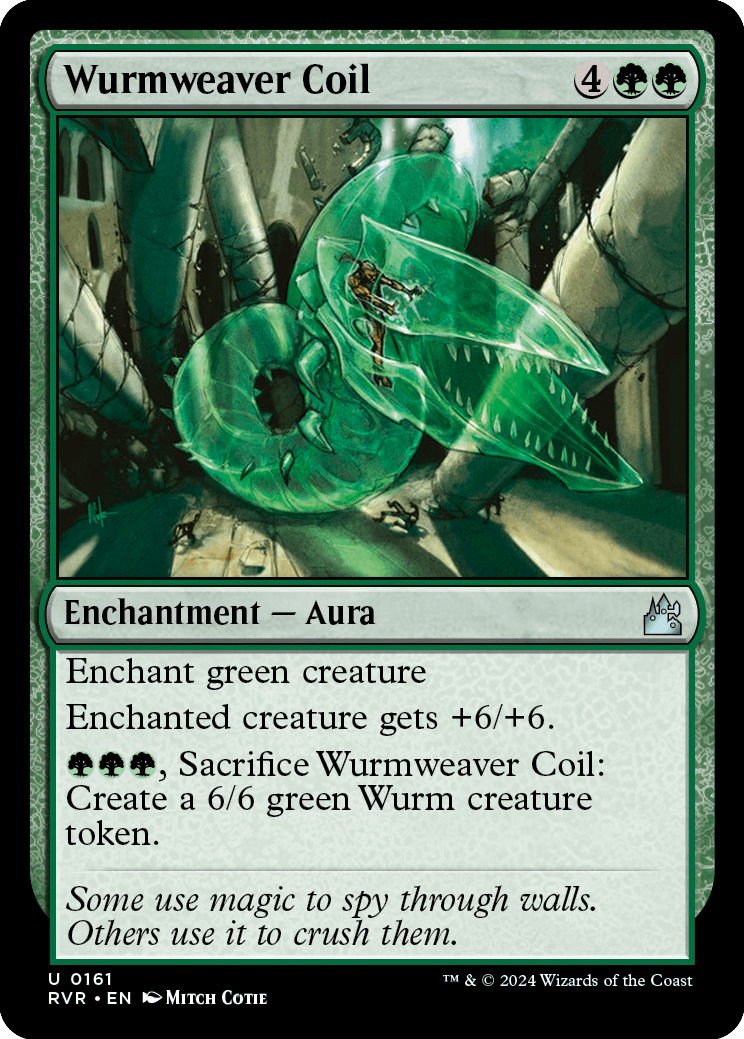
Wurmweaver Coil
{4}{G}{G}
Enchantment — Aura
Enchant green creature
Enchanted creature gets +6/+6.
{G}{G}{G}, Sacrifice Wurmweaver Coil: Create a 6/6 green Wurm creature token.
- Wurmweaver Coil can enchant only a green creature. It can't enter the battlefield attached to a nongreen creature, it can't be moved onto a nongreen creature, and if the creature it's attached to stops being green, the Aura is put into its owner's graveyard.
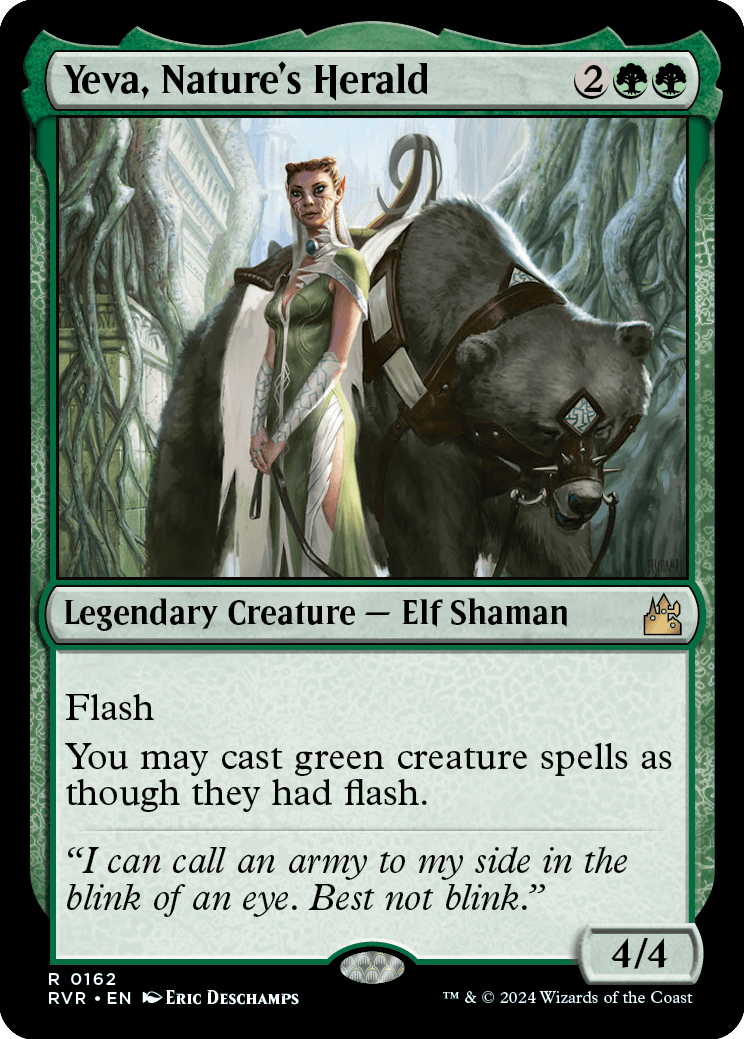
Yeva, Nature's Herald
{2}{G}{G}
Legendary Creature — Elf Shaman
4/4
Flash
You may cast green creature spells as though they had flash.
- You still pay the costs for green creature spells you cast.
- Yeva's ability applies to green creature cards in any zone, provided something is allowing you to cast them. For example, if the top card of your library is a green creature card and you control Garruk's Horde, you can cast that card as though it had flash.
©2023 Wizards of the Coast LLC Wizards of the Coast, Magic: The Gathering, their logos, Magic, and the WUBRGCT symbols are property of Wizards in the USA and other countries. U.S. Pat. No. RE 37,957.
